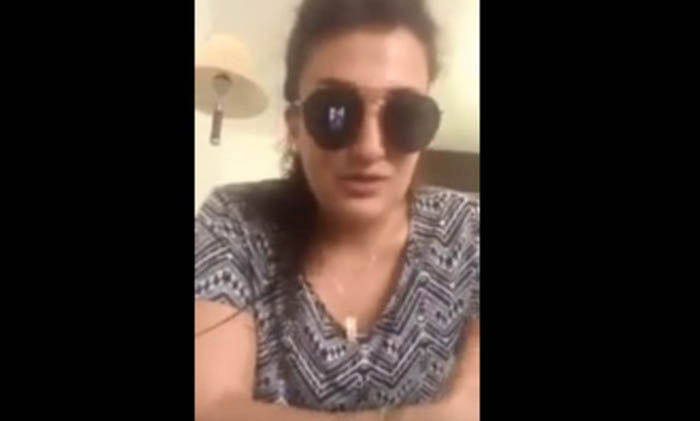This week at Index: Remembering Anna Politkovskaya
[vc_row][vc_column][vc_raw_html]JTNDJTIxZG9jdHlwZSUyMGh0bWwlM0UlMEElM0NodG1sJTIweG1sbnMlM0QlMjJodHRwJTNBJTJGJTJGd3d3LnczLm9yZyUyRjE5OTklMkZ4aHRtbCUyMiUyMHhtbG5zJTNBdiUzRCUyMnVybiUzQXNjaGVtYXMtbWljcm9zb2Z0LWNvbSUzQXZtbCUyMiUyMHhtbG5zJTNBbyUzRCUyMnVybiUzQXNjaGVtYXMtbWljcm9zb2Z0LWNvbSUzQW9mZmljZSUzQW9mZmljZSUyMiUzRSUwQSUwOSUzQ2hlYWQlM0UlMEElMDklMDklM0MlMjEtLSUyME5BTUUlM0ElMjAxJTIwQ09MVU1OJTIwLS0lM0UlMEElMDklMDklM0MlMjEtLSU1QmlmJTIwZ3RlJTIwbXNvJTIwMTUlNUQlM0UlMEElMDklMDklM0N4bWwlM0UlMEElMDklMDklMDklM0NvJTNBT2ZmaWNlRG9jdW1lbnRTZXR0aW5ncyUzRSUwQSUwOSUwOSUwOSUzQ28lM0FBbGxvd1BORyUyRiUzRSUwQSUwOSUwOSUwOSUzQ28lM0FQaXhlbHNQZXJJbmNoJTNFOTYlM0MlMkZvJTNBUGl4ZWxzUGVySW5jaCUzRSUwQSUwOSUwOSUwOSUzQyUyRm8lM0FPZmZpY2VEb2N1bWVudFNldHRpbmdzJTNFJTBBJTA5JTA5JTNDJTJGeG1sJTNFJTBBJTA5JTA5JTNDJTIxJTVCZW5kaWYlNUQtLSUzRSUwQSUwOSUwOSUzQ21ldGElMjBjaGFyc2V0JTNEJTIyVVRGLTglMjIlM0UlMEElMjAlMjAlMjAlMjAlMjAlMjAlMjAlMjAlM0NtZXRhJTIwaHR0cC1lcXVpdiUzRCUyMlgtVUEtQ29tcGF0aWJsZSUyMiUyMGNvbnRlbnQlM0QlMjJJRSUzRGVkZ2UlMjIlM0UlMEElMjAlMjAlMjAlMjAlMjAlMjAlMjAlMjAlM0NtZXRhJTIwbmFtZSUzRCUyMnZpZXdwb3J0JTIyJTIwY29udGVudCUzRCUyMndpZHRoJTNEZGV2aWNlLXdpZHRoJTJDJTIwaW5pdGlhbC1zY2FsZSUzRDElMjIlM0UlMEElMDklMDklM0N0aXRsZSUzRSUyQSU3Q01DJTNBU1VCSkVDVCU3QyUyQSUzQyUyRnRpdGxlJTNFJTBBJTIwJTIwJTIwJTIwJTIwJTIwJTIwJTIwJTBBJTIwJTIwJTIwJTIwJTNDc3R5bGUlMjB0eXBlJTNEJTIydGV4dCUyRmNzcyUyMiUzRSUwQSUwOSUwOXAlN0IlMEElMDklMDklMDltYXJnaW4lM0ExMHB4JTIwMCUzQiUwQSUwOSUwOSUwOXBhZGRpbmclM0EwJTNCJTBBJTA5JTA5JTdEJTBBJTA5JTA5dGFibGUlN0IlMEElMDklMDklMDlib3JkZXItY29sbGFwc2UlM0Fjb2xsYXBzZSUzQiUwQSUwOSUwOSU3RCUwQSUwOSUwOWgxJTJDaDIlMkNoMyUyQ2g0JTJDaDUlMkNoNiU3QiUwQSUwOSUwOSUwOWRpc3BsYXklM0FibG9jayUzQiUwQSUwOSUwOSUwOW1hcmdpbiUzQTAlM0IlMEElMDklMDklMDlwYWRkaW5nJTNBMCUzQiUwQSUwOSUwOSU3RCUwQSUwOSUwOWltZyUyQ2ElMjBpbWclN0IlMEElMDklMDklMDlib3JkZXIlM0EwJTNCJTBBJTA5JTA5JTA5aGVpZ2h0JTNBYXV0byUzQiUwQSUwOSUwOSUwOW91dGxpbmUlM0Fub25lJTNCJTBBJTA5JTA5JTA5dGV4dC1kZWNvcmF0aW9uJTNBbm9uZSUzQiUwQSUwOSUwOSU3RCUwQSUwOSUwOWJvZHklMkMlMjNib2R5VGFibGUlMkMlMjNib2R5Q2VsbCU3QiUwQSUwOSUwOSUwOWhlaWdodCUzQTEwMCUyNSUzQiUwQSUwOSUwOSUwOW1hcmdpbiUzQTAlM0IlMEElMDklMDklMDlwYWRkaW5nJTNBMCUzQiUwQSUwOSUwOSUwOXdpZHRoJTNBMTAwJTI1JTNCJTBBJTA5JTA5JTdEJTBBJTA5JTA5Lm1jblByZXZpZXdUZXh0JTdCJTBBJTA5JTA5JTA5ZGlzcGxheSUzQW5vbmUlMjAlMjFpbXBvcnRhbnQlM0IlMEElMDklMDklN0QlMEElMDklMDklMjNvdXRsb29rJTIwYSU3QiUwQSUwOSUwOSUwOXBhZGRpbmclM0EwJTNCJTBBJTA5JTA5JTdEJTBBJTA5JTA5aW1nJTdCJTBBJTA5JTA5JTA5LW1zLWludGVycG9sYXRpb24tbW9kZSUzQWJpY3ViaWMlM0IlMEElMDklMDklN0QlMEElMDklMDl0YWJsZSU3QiUwQSUwOSUwOSUwOW1zby10YWJsZS1sc3BhY2UlM0EwcHQlM0IlMEElMDklMDklMDltc28tdGFibGUtcnNwYWNlJTNBMHB0JTNCJTBBJTA5JTA5JTdEJTBBJTA5JTA5LlJlYWRNc2dCb2R5JTdCJTBBJTA5JTA5JTA5d2lkdGglM0ExMDAlMjUlM0IlMEElMDklMDklN0QlMEElMDklMDkuRXh0ZXJuYWxDbGFzcyU3QiUwQSUwOSUwOSUwOXdpZHRoJTNBMTAwJTI1JTNCJTBBJTA5JTA5JTdEJTBBJTA5JTA5cCUyQ2ElMkNsaSUyQ3RkJTJDYmxvY2txdW90ZSU3QiUwQSUwOSUwOSUwOW1zby1saW5lLWhlaWdodC1ydWxlJTNBZXhhY3RseSUzQiUwQSUwOSUwOSU3RCUwQSUwOSUwOWElNUJocmVmJTVFJTNEdGVsJTVEJTJDYSU1QmhyZWYlNUUlM0RzbXMlNUQlN0IlMEElMDklMDklMDljb2xvciUzQWluaGVyaXQlM0IlMEElMDklMDklMDljdXJzb3IlM0FkZWZhdWx0JTNCJTBBJTA5JTA5JTA5dGV4dC1kZWNvcmF0aW9uJTNBbm9uZSUzQiUwQSUwOSUwOSU3RCUwQSUwOSUwOXAlMkNhJTJDbGklMkN0ZCUyQ2JvZHklMkN0YWJsZSUyQ2Jsb2NrcXVvdGUlN0IlMEElMDklMDklMDktbXMtdGV4dC1zaXplLWFkanVzdCUzQTEwMCUyNSUzQiUwQSUwOSUwOSUwOS13ZWJraXQtdGV4dC1zaXplLWFkanVzdCUzQTEwMCUyNSUzQiUwQSUwOSUwOSU3RCUwQSUwOSUwOS5FeHRlcm5hbENsYXNzJTJDLkV4dGVybmFsQ2xhc3MlMjBwJTJDLkV4dGVybmFsQ2xhc3MlMjB0ZCUyQy5FeHRlcm5hbENsYXNzJTIwZGl2JTJDLkV4dGVybmFsQ2xhc3MlMjBzcGFuJTJDLkV4dGVybmFsQ2xhc3MlMjBmb250JTdCJTBBJTA5JTA5JTA5bGluZS1oZWlnaHQlM0ExMDAlMjUlM0IlMEElMDklMDklN0QlMEElMDklMDlhJTVCeC1hcHBsZS1kYXRhLWRldGVjdG9ycyU1RCU3QiUwQSUwOSUwOSUwOWNvbG9yJTNBaW5oZXJpdCUyMCUyMWltcG9ydGFudCUzQiUwQSUwOSUwOSUwOXRleHQtZGVjb3JhdGlvbiUzQW5vbmUlMjAlMjFpbXBvcnRhbnQlM0IlMEElMDklMDklMDlmb250LXNpemUlM0Fpbmhlcml0JTIwJTIxaW1wb3J0YW50JTNCJTBBJTA5JTA5JTA5Zm9udC1mYW1pbHklM0Fpbmhlcml0JTIwJTIxaW1wb3J0YW50JTNCJTBBJTA5JTA5JTA5Zm9udC13ZWlnaHQlM0Fpbmhlcml0JTIwJTIxaW1wb3J0YW50JTNCJTBBJTA5JTA5JTA5bGluZS1oZWlnaHQlM0Fpbmhlcml0JTIwJTIxaW1wb3J0YW50JTNCJTBBJTA5JTA5JTdEJTBBJTA5JTA5JTIzYm9keUNlbGwlN0IlMEElMDklMDklMDlwYWRkaW5nJTNBMTBweCUzQiUwQSUwOSUwOSU3RCUwQSUwOSUwOS50ZW1wbGF0ZUNvbnRhaW5lciU3QiUwQSUwOSUwOSUwOW1heC13aWR0aCUzQTYwMHB4JTIwJTIxaW1wb3J0YW50JTNCJTBBJTA5JTA5JTdEJTBBJTA5JTA5YS5tY25CdXR0b24lN0IlMEElMDklMDklMDlkaXNwbGF5JTNBYmxvY2slM0IlMEElMDklMDklN0QlMEElMDklMDkubWNuSW1hZ2UlMkMubWNuUmV0aW5hSW1hZ2UlN0IlMEElMDklMDklMDl2ZXJ0aWNhbC1hbGlnbiUzQWJvdHRvbSUzQiUwQSUwOSUwOSU3RCUwQSUwOSUwOS5tY25UZXh0Q29udGVudCU3QiUwQSUwOSUwOSUwOXdvcmQtYnJlYWslM0FicmVhay13b3JkJTNCJTBBJTA5JTA5JTdEJTBBJTA5JTA5Lm1jblRleHRDb250ZW50JTIwaW1nJTdCJTBBJTA5JTA5JTA5aGVpZ2h0JTNBYXV0byUyMCUyMWltcG9ydGFudCUzQiUwQSUwOSUwOSU3RCUwQSUwOSUwOS5tY25EaXZpZGVyQmxvY2slN0IlMEElMDklMDklMDl0YWJsZS1sYXlvdXQlM0FmaXhlZCUyMCUyMWltcG9ydGFudCUzQiUwQSUwOSUwOSU3RCUwQSUwOSUwOWJvZHklMkMlMjNib2R5VGFibGUlN0IlMEElMDklMDklMDliYWNrZ3JvdW5kLWNvbG9yJTNBJTIzRkFGQUZBJTNCJTBBJTA5JTA5JTdEJTBBJTA5JTA5JTIzYm9keUNlbGwlN0IlMEElMDklMDklMDlib3JkZXItdG9wJTNBMCUzQiUwQSUwOSUwOSU3RCUwQSUwOSUwOS50ZW1wbGF0ZUNvbnRhaW5lciU3QiUwQSUwOSUwOSUwOWJvcmRlciUzQTAlM0IlMEElMDklMDklN0QlMEElMDklMDloMSU3QiUwQSUwOSUwOSUwOWNvbG9yJTNBJTIzMjAyMDIwJTNCJTBBJTA5JTA5JTA5Zm9udC1mYW1pbHklM0FIZWx2ZXRpY2ElM0IlMEElMDklMDklMDlmb250LXNpemUlM0EyNnB4JTNCJTBBJTA5JTA5JTA5Zm9udC1zdHlsZSUzQW5vcm1hbCUzQiUwQSUwOSUwOSUwOWZvbnQtd2VpZ2h0JTNBYm9sZCUzQiUwQSUwOSUwOSUwOWxpbmUtaGVpZ2h0JTNBMTI1JTI1JTNCJTBBJTA5JTA5JTA5bGV0dGVyLXNwYWNpbmclM0Fub3JtYWwlM0IlMEElMDklMDklMDl0ZXh0LWFsaWduJTNBbGVmdCUzQiUwQSUwOSUwOSU3RCUwQSUwOSUwOWgyJTdCJTBBJTA5JTA5JTA5Y29sb3IlM0ElMjMyMDIwMjAlM0IlMEElMDklMDklMDlmb250LWZhbWlseSUzQUhlbHZldGljYSUzQiUwQSUwOSUwOSUwOWZvbnQtc2l6ZSUzQTIycHglM0IlMEElMDklMDklMDlmb250LXN0eWxlJTNBbm9ybWFsJTNCJTBBJTA5JTA5JTA5Zm9udC13ZWlnaHQlM0Fib2xkJTNCJTBBJTA5JTA5JTA5bGluZS1oZWlnaHQlM0ExMjUlMjUlM0IlMEElMDklMDklMDlsZXR0ZXItc3BhY2luZyUzQW5vcm1hbCUzQiUwQSUwOSUwOSUwOXRleHQtYWxpZ24lM0FsZWZ0JTNCJTBBJTA5JTA5JTdEJTBBJTA5JTA5aDMlN0IlMEElMDklMDklMDljb2xvciUzQSUyMzIwMjAyMCUzQiUwQSUwOSUwOSUwOWZvbnQtZmFtaWx5JTNBSGVsdmV0aWNhJTNCJTBBJTA5JTA5JTA5Zm9udC1zaXplJTNBMjBweCUzQiUwQSUwOSUwOSUwOWZvbnQtc3R5bGUlM0Fub3JtYWwlM0IlMEElMDklMDklMDlmb250LXdlaWdodCUzQWJvbGQlM0IlMEElMDklMDklMDlsaW5lLWhlaWdodCUzQTEyNSUyNSUzQiUwQSUwOSUwOSUwOWxldHRlci1zcGFjaW5nJTNBbm9ybWFsJTNCJTBBJTA5JTA5JTA5dGV4dC1hbGlnbiUzQWxlZnQlM0IlMEElMDklMDklN0QlMEElMDklMDloNCU3QiUwQSUwOSUwOSUwOWNvbG9yJTNBJTIzMjAyMDIwJTNCJTBBJTA5JTA5JTA5Zm9udC1mYW1pbHklM0FIZWx2ZXRpY2ElM0IlMEElMDklMDklMDlmb250LXNpemUlM0ExOHB4JTNCJTBBJTA5JTA5JTA5Zm9udC1zdHlsZSUzQW5vcm1hbCUzQiUwQSUwOSUwOSUwOWZvbnQtd2VpZ2h0JTNBYm9sZCUzQiUwQSUwOSUwOSUwOWxpbmUtaGVpZ2h0JTNBMTI1JTI1JTNCJTBBJTA5JTA5JTA5bGV0dGVyLXNwYWNpbmclM0Fub3JtYWwlM0IlMEElMDklMDklMDl0ZXh0LWFsaWduJTNBbGVmdCUzQiUwQSUwOSUwOSU3RCUwQSUwOSUwOSUyM3RlbXBsYXRlUHJlaGVhZGVyJTdCJTBBJTA5JTA5JTA5YmFja2dyb3VuZC1jb2xvciUzQSUyM2ZhZmFmYSUzQiUwQSUwOSUwOSUwOWJhY2tncm91bmQtaW1hZ2UlM0Fub25lJTNCJTBBJTA5JTA5JTA5YmFja2dyb3VuZC1yZXBlYXQlM0Fuby1yZXBlYXQlM0IlMEElMDklMDklMDliYWNrZ3JvdW5kLXBvc2l0aW9uJTNBY2VudGVyJTNCJTBBJTA5JTA5JTA5YmFja2dyb3VuZC1zaXplJTNBY292ZXIlM0IlMEElMDklMDklMDlib3JkZXItdG9wJTNBMCUzQiUwQSUwOSUwOSUwOWJvcmRlci1ib3R0b20lM0EwJTNCJTBBJTA5JTA5JTA5cGFkZGluZy10b3AlM0E5cHglM0IlMEElMDklMDklMDlwYWRkaW5nLWJvdHRvbSUzQTlweCUzQiUwQSUwOSUwOSU3RCUwQSUwOSUwOSUyM3RlbXBsYXRlUHJlaGVhZGVyJTIwLm1jblRleHRDb250ZW50JTJDJTIzdGVtcGxhdGVQcmVoZWFkZXIlMjAubWNuVGV4dENvbnRlbnQlMjBwJTdCJTBBJTA5JTA5JTA5Y29sb3IlM0ElMjM2NTY1NjUlM0IlMEElMDklMDklMDlmb250LWZhbWlseSUzQUhlbHZldGljYSUzQiUwQSUwOSUwOSUwOWZvbnQtc2l6ZSUzQTEycHglM0IlMEElMDklMDklMDlsaW5lLWhlaWdodCUzQTE1MCUyNSUzQiUwQSUwOSUwOSUwOXRleHQtYWxpZ24lM0FsZWZ0JTNCJTBBJTA5JTA5JTdEJTBBJTA5JTA5JTIzdGVtcGxhdGVQcmVoZWFkZXIlMjAubWNuVGV4dENvbnRlbnQlMjBhJTJDJTIzdGVtcGxhdGVQcmVoZWFkZXIlMjAubWNuVGV4dENvbnRlbnQlMjBwJTIwYSU3QiUwQSUwOSUwOSUwOWNvbG9yJTNBJTIzNjU2NTY1JTNCJTBBJTA5JTA5JTA5Zm9udC13ZWlnaHQlM0Fub3JtYWwlM0IlMEElMDklMDklMDl0ZXh0LWRlY29yYXRpb24lM0F1bmRlcmxpbmUlM0IlMEElMDklMDklN0QlMEElMDklMDklMjN0ZW1wbGF0ZUhlYWRlciU3QiUwQSUwOSUwOSUwOWJhY2tncm91bmQtY29sb3IlM0ElMjNmZmZmZmYlM0IlMEElMDklMDklMDliYWNrZ3JvdW5kLWltYWdlJTNBbm9uZSUzQiUwQSUwOSUwOSUwOWJhY2tncm91bmQtcmVwZWF0JTNBbm8tcmVwZWF0JTNCJTBBJTA5JTA5JTA5YmFja2dyb3VuZC1wb3NpdGlvbiUzQWNlbnRlciUzQiUwQSUwOSUwOSUwOWJhY2tncm91bmQtc2l6ZSUzQWNvdmVyJTNCJTBBJTA5JTA5JTA5Ym9yZGVyLXRvcCUzQTAlM0IlMEElMDklMDklMDlib3JkZXItYm90dG9tJTNBMCUzQiUwQSUwOSUwOSUwOXBhZGRpbmctdG9wJTNBOXB4JTNCJTBBJTA5JTA5JTA5cGFkZGluZy1ib3R0b20lM0EwJTNCJTBBJTA5JTA5JTdEJTBBJTA5JTA5JTIzdGVtcGxhdGVIZWFkZXIlMjAubWNuVGV4dENvbnRlbnQlMkMlMjN0ZW1wbGF0ZUhlYWRlciUyMC5tY25UZXh0Q29udGVudCUyMHAlN0IlMEElMDklMDklMDljb2xvciUzQSUyMzIwMjAyMCUzQiUwQSUwOSUwOSUwOWZvbnQtZmFtaWx5JTNBSGVsdmV0aWNhJTNCJTBBJTA5JTA5JTA5Zm9udC1zaXplJTNBMTZweCUzQiUwQSUwOSUwOSUwOWxpbmUtaGVpZ2h0JTNBMTUwJTI1JTNCJTBBJTA5JTA5JTA5dGV4dC1hbGlnbiUzQWxlZnQlM0IlMEElMDklMDklN0QlMEElMDklMDklMjN0ZW1wbGF0ZUhlYWRlciUyMC5tY25UZXh0Q29udGVudCUyMGElMkMlMjN0ZW1wbGF0ZUhlYWRlciUyMC5tY25UZXh0Q29udGVudCUyMHAlMjBhJTdCJTBBJTA5JTA5JTA5Y29sb3IlM0ElMjMyQkFBREYlM0IlMEElMDklMDklMDlmb250LXdlaWdodCUzQW5vcm1hbCUzQiUwQSUwOSUwOSUwOXRleHQtZGVjb3JhdGlvbiUzQXVuZGVybGluZSUzQiUwQSUwOSUwOSU3RCUwQSUwOSUwOSUyM3RlbXBsYXRlQm9keSU3QiUwQSUwOSUwOSUwOWJhY2tncm91bmQtY29sb3IlM0ElMjNmZmZmZmYlM0IlMEElMDklMDklMDliYWNrZ3JvdW5kLWltYWdlJTNBbm9uZSUzQiUwQSUwOSUwOSUwOWJhY2tncm91bmQtcmVwZWF0JTNBbm8tcmVwZWF0JTNCJTBBJTA5JTA5JTA5YmFja2dyb3VuZC1wb3NpdGlvbiUzQWNlbnRlciUzQiUwQSUwOSUwOSUwOWJhY2tncm91bmQtc2l6ZSUzQWNvdmVyJTNCJTBBJTA5JTA5JTA5Ym9yZGVyLXRvcCUzQTAlM0IlMEElMDklMDklMDlib3JkZXItYm90dG9tJTNBMnB4JTIwc29saWQlMjAlMjNFQUVBRUElM0IlMEElMDklMDklMDlwYWRkaW5nLXRvcCUzQTAlM0IlMEElMDklMDklMDlwYWRkaW5nLWJvdHRvbSUzQTlweCUzQiUwQSUwOSUwOSU3RCUwQSUwOSUwOSUyM3RlbXBsYXRlQm9keSUyMC5tY25UZXh0Q29udGVudCUyQyUyM3RlbXBsYXRlQm9keSUyMC5tY25UZXh0Q29udGVudCUyMHAlN0IlMEElMDklMDklMDljb2xvciUzQSUyMzIwMjAyMCUzQiUwQSUwOSUwOSUwOWZvbnQtZmFtaWx5JTNBSGVsdmV0aWNhJTNCJTBBJTA5JTA5JTA5Zm9udC1zaXplJTNBMTZweCUzQiUwQSUwOSUwOSUwOWxpbmUtaGVpZ2h0JTNBMTUwJTI1JTNCJTBBJTA5JTA5JTA5dGV4dC1hbGlnbiUzQWxlZnQlM0IlMEElMDklMDklN0QlMEElMDklMDklMjN0ZW1wbGF0ZUJvZHklMjAubWNuVGV4dENvbnRlbnQlMjBhJTJDJTIzdGVtcGxhdGVCb2R5JTIwLm1jblRleHRDb250ZW50JTIwcCUyMGElN0IlMEElMDklMDklMDljb2xvciUzQSUyMzJCQUFERiUzQiUwQSUwOSUwOSUwOWZvbnQtd2VpZ2h0JTNBbm9ybWFsJTNCJTBBJTA5JTA5JTA5dGV4dC1kZWNvcmF0aW9uJTNBdW5kZXJsaW5lJTNCJTBBJTA5JTA5JTdEJTBBJTA5JTA5JTIzdGVtcGxhdGVGb290ZXIlN0IlMEElMDklMDklMDliYWNrZ3JvdW5kLWNvbG9yJTNBJTIzNzg4NThkJTNCJTBBJTA5JTA5JTA5YmFja2dyb3VuZC1pbWFnZSUzQW5vbmUlM0IlMEElMDklMDklMDliYWNrZ3JvdW5kLXJlcGVhdCUzQW5vLXJlcGVhdCUzQiUwQSUwOSUwOSUwOWJhY2tncm91bmQtcG9zaXRpb24lM0FjZW50ZXIlM0IlMEElMDklMDklMDliYWNrZ3JvdW5kLXNpemUlM0Fjb3ZlciUzQiUwQSUwOSUwOSUwOWJvcmRlci10b3AlM0EwJTNCJTBBJTA5JTA5JTA5Ym9yZGVyLWJvdHRvbSUzQTAlM0IlMEElMDklMDklMDlwYWRkaW5nLXRvcCUzQTlweCUzQiUwQSUwOSUwOSUwOXBhZGRpbmctYm90dG9tJTNBOXB4JTNCJTBBJTA5JTA5JTdEJTBBJTA5JTA5JTIzdGVtcGxhdGVGb290ZXIlMjAubWNuVGV4dENvbnRlbnQlMkMlMjN0ZW1wbGF0ZUZvb3RlciUyMC5tY25UZXh0Q29udGVudCUyMHAlN0IlMEElMDklMDklMDljb2xvciUzQSUyMzY1NjU2NSUzQiUwQSUwOSUwOSUwOWZvbnQtZmFtaWx5JTNBSGVsdmV0aWNhJTNCJTBBJTA5JTA5JTA5Zm9udC1zaXplJTNBMTJweCUzQiUwQSUwOSUwOSUwOWxpbmUtaGVpZ2h0JTNBMTUwJTI1JTNCJTBBJTA5JTA5JTA5dGV4dC1hbGlnbiUzQWNlbnRlciUzQiUwQSUwOSUwOSU3RCUwQSUwOSUwOSUyM3RlbXBsYXRlRm9vdGVyJTIwLm1jblRleHRDb250ZW50JTIwYSUyQyUyM3RlbXBsYXRlRm9vdGVyJTIwLm1jblRleHRDb250ZW50JTIwcCUyMGElN0IlMEElMDklMDklMDljb2xvciUzQSUyMzY1NjU2NSUzQiUwQSUwOSUwOSUwOWZvbnQtd2VpZ2h0JTNBbm9ybWFsJTNCJTBBJTA5JTA5JTA5dGV4dC1kZWNvcmF0aW9uJTNBdW5kZXJsaW5lJTNCJTBBJTA5JTA5JTdEJTBBJTA5JTQwbWVkaWElMjBvbmx5JTIwc2NyZWVuJTIwYW5kJTIwJTI4bWluLXdpZHRoJTNBNzY4cHglMjklN0IlMEElMDklMDkudGVtcGxhdGVDb250YWluZXIlN0IlMEElMDklMDklMDl3aWR0aCUzQTYwMHB4JTIwJTIxaW1wb3J0YW50JTNCJTBBJTA5JTA5JTdEJTBBJTBBJTdEJTA5JTQwbWVkaWElMjBvbmx5JTIwc2NyZWVuJTIwYW5kJTIwJTI4bWF4LXdpZHRoJTNBJTIwNDgwcHglMjklN0IlMEElMDklMDlib2R5JTJDdGFibGUlMkN0ZCUyQ3AlMkNhJTJDbGklMkNibG9ja3F1b3RlJTdCJTBBJTA5JTA5JTA5LXdlYmtpdC10ZXh0LXNpemUtYWRqdXN0JTNBbm9uZSUyMCUyMWltcG9ydGFudCUzQiUwQSUwOSUwOSU3RCUwQSUwQSU3RCUwOSU0MG1lZGlhJTIwb25seSUyMHNjcmVlbiUyMGFuZCUyMCUyOG1heC13aWR0aCUzQSUyMDQ4MHB4JTI5JTdCJTBBJTA5JTA5Ym9keSU3QiUwQSUwOSUwOSUwOXdpZHRoJTNBMTAwJTI1JTIwJTIxaW1wb3J0YW50JTNCJTBBJTA5JTA5JTA5bWluLXdpZHRoJTNBMTAwJTI1JTIwJTIxaW1wb3J0YW50JTNCJTBBJTA5JTA5JTdEJTBBJTBBJTdEJTA5JTQwbWVkaWElMjBvbmx5JTIwc2NyZWVuJTIwYW5kJTIwJTI4bWF4LXdpZHRoJTNBJTIwNDgwcHglMjklN0IlMEElMDklMDklMjNib2R5Q2VsbCU3QiUwQSUwOSUwOSUwOXBhZGRpbmctdG9wJTNBMTBweCUyMCUyMWltcG9ydGFudCUzQiUwQSUwOSUwOSU3RCUwQSUwQSU3RCUwOSU0MG1lZGlhJTIwb25seSUyMHNjcmVlbiUyMGFuZCUyMCUyOG1heC13aWR0aCUzQSUyMDQ4MHB4JTI5JTdCJTBBJTA5JTA5Lm1jblJldGluYUltYWdlJTdCJTBBJTA5JTA5JTA5bWF4LXdpZHRoJTNBMTAwJTI1JTIwJTIxaW1wb3J0YW50JTNCJTBBJTA5JTA5JTdEJTBBJTBBJTdEJTA5JTQwbWVkaWElMjBvbmx5JTIwc2NyZWVuJTIwYW5kJTIwJTI4bWF4LXdpZHRoJTNBJTIwNDgwcHglMjklN0IlMEElMDklMDkubWNuSW1hZ2UlN0IlMEElMDklMDklMDl3aWR0aCUzQTEwMCUyNSUyMCUyMWltcG9ydGFudCUzQiUwQSUwOSUwOSU3RCUwQSUwQSU3RCUwOSU0MG1lZGlhJTIwb25seSUyMHNjcmVlbiUyMGFuZCUyMCUyOG1heC13aWR0aCUzQSUyMDQ4MHB4JTI5JTdCJTBBJTA5JTA5Lm1jbkNhcnRDb250YWluZXIlMkMubWNuQ2FwdGlvblRvcENvbnRlbnQlMkMubWNuUmVjQ29udGVudENvbnRhaW5lciUyQy5tY25DYXB0aW9uQm90dG9tQ29udGVudCUyQy5tY25UZXh0Q29udGVudENvbnRhaW5lciUyQy5tY25Cb3hlZFRleHRDb250ZW50Q29udGFpbmVyJTJDLm1jbkltYWdlR3JvdXBDb250ZW50Q29udGFpbmVyJTJDLm1jbkNhcHRpb25MZWZ0VGV4dENvbnRlbnRDb250YWluZXIlMkMubWNuQ2FwdGlvblJpZ2h0VGV4dENvbnRlbnRDb250YWluZXIlMkMubWNuQ2FwdGlvbkxlZnRJbWFnZUNvbnRlbnRDb250YWluZXIlMkMubWNuQ2FwdGlvblJpZ2h0SW1hZ2VDb250ZW50Q29udGFpbmVyJTJDLm1jbkltYWdlQ2FyZExlZnRUZXh0Q29udGVudENvbnRhaW5lciUyQy5tY25JbWFnZUNhcmRSaWdodFRleHRDb250ZW50Q29udGFpbmVyJTJDLm1jbkltYWdlQ2FyZExlZnRJbWFnZUNvbnRlbnRDb250YWluZXIlMkMubWNuSW1hZ2VDYXJkUmlnaHRJbWFnZUNvbnRlbnRDb250YWluZXIlN0IlMEElMDklMDklMDltYXgtd2lkdGglM0ExMDAlMjUlMjAlMjFpbXBvcnRhbnQlM0IlMEElMDklMDklMDl3aWR0aCUzQTEwMCUyNSUyMCUyMWltcG9ydGFudCUzQiUwQSUwOSUwOSU3RCUwQSUwQSU3RCUwOSU0MG1lZGlhJTIwb25seSUyMHNjcmVlbiUyMGFuZCUyMCUyOG1heC13aWR0aCUzQSUyMDQ4MHB4JTI5JTdCJTBBJTA5JTA5Lm1jbkJveGVkVGV4dENvbnRlbnRDb250YWluZXIlN0IlMEElMDklMDklMDltaW4td2lkdGglM0ExMDAlMjUlMjAlMjFpbXBvcnRhbnQlM0IlMEElMDklMDklN0QlMEElMEElN0QlMDklNDBtZWRpYSUyMG9ubHklMjBzY3JlZW4lMjBhbmQlMjAlMjhtYXgtd2lkdGglM0ElMjA0ODBweCUyOSU3QiUwQSUwOSUwOS5tY25JbWFnZUdyb3VwQ29udGVudCU3QiUwQSUwOSUwOSUwOXBhZGRpbmclM0E5cHglMjAlMjFpbXBvcnRhbnQlM0IlMEElMDklMDklN0QlMEElMEElN0QlMDklNDBtZWRpYSUyMG9ubHklMjBzY3JlZW4lMjBhbmQlMjAlMjhtYXgtd2lkdGglM0ElMjA0ODBweCUyOSU3QiUwQSUwOSUwOS5tY25DYXB0aW9uTGVmdENvbnRlbnRPdXRlciUyMC5tY25UZXh0Q29udGVudCUyQy5tY25DYXB0aW9uUmlnaHRDb250ZW50T3V0ZXIlMjAubWNuVGV4dENvbnRlbnQlN0IlMEElMDklMDklMDlwYWRkaW5nLXRvcCUzQTlweCUyMCUyMWltcG9ydGFudCUzQiUwQSUwOSUwOSU3RCUwQSUwQSU3RCUwOSU0MG1lZGlhJTIwb25seSUyMHNjcmVlbiUyMGFuZCUyMCUyOG1heC13aWR0aCUzQSUyMDQ4MHB4JTI5JTdCJTBBJTA5JTA5Lm1jbkltYWdlQ2FyZFRvcEltYWdlQ29udGVudCUyQy5tY25DYXB0aW9uQm90dG9tQ29udGVudCUzQWxhc3QtY2hpbGQlMjAubWNuQ2FwdGlvbkJvdHRvbUltYWdlQ29udGVudCUyQy5tY25DYXB0aW9uQmxvY2tJbm5lciUyMC5tY25DYXB0aW9uVG9wQ29udGVudCUzQWxhc3QtY2hpbGQlMjAubWNuVGV4dENvbnRlbnQlN0IlMEElMDklMDklMDlwYWRkaW5nLXRvcCUzQTE4cHglMjAlMjFpbXBvcnRhbnQlM0IlMEElMDklMDklN0QlMEElMEElN0QlMDklNDBtZWRpYSUyMG9ubHklMjBzY3JlZW4lMjBhbmQlMjAlMjhtYXgtd2lkdGglM0ElMjA0ODBweCUyOSU3QiUwQSUwOSUwOS5tY25JbWFnZUNhcmRCb3R0b21JbWFnZUNvbnRlbnQlN0IlMEElMDklMDklMDlwYWRkaW5nLWJvdHRvbSUzQTlweCUyMCUyMWltcG9ydGFudCUzQiUwQSUwOSUwOSU3RCUwQSUwQSU3RCUwOSU0MG1lZGlhJTIwb25seSUyMHNjcmVlbiUyMGFuZCUyMCUyOG1heC13aWR0aCUzQSUyMDQ4MHB4JTI5JTdCJTBBJTA5JTA5Lm1jbkltYWdlR3JvdXBCbG9ja0lubmVyJTdCJTBBJTA5JTA5JTA5cGFkZGluZy10b3AlM0EwJTIwJTIxaW1wb3J0YW50JTNCJTBBJTA5JTA5JTA5cGFkZGluZy1ib3R0b20lM0EwJTIwJTIxaW1wb3J0YW50JTNCJTBBJTA5JTA5JTdEJTBBJTBBJTdEJTA5JTQwbWVkaWElMjBvbmx5JTIwc2NyZWVuJTIwYW5kJTIwJTI4bWF4LXdpZHRoJTNBJTIwNDgwcHglMjklN0IlMEElMDklMDkubWNuSW1hZ2VHcm91cEJsb2NrT3V0ZXIlN0IlMEElMDklMDklMDlwYWRkaW5nLXRvcCUzQTlweCUyMCUyMWltcG9ydGFudCUzQiUwQSUwOSUwOSUwOXBhZGRpbmctYm90dG9tJTNBOXB4JTIwJTIxaW1wb3J0YW50JTNCJTBBJTA5JTA5JTdEJTBBJTBBJTdEJTA5JTQwbWVkaWElMjBvbmx5JTIwc2NyZWVuJTIwYW5kJTIwJTI4bWF4LXdpZHRoJTNBJTIwNDgwcHglMjklN0IlMEElMDklMDkubWNuVGV4dENvbnRlbnQlMkMubWNuQm94ZWRUZXh0Q29udGVudENvbHVtbiU3QiUwQSUwOSUwOSUwOXBhZGRpbmctcmlnaHQlM0ExOHB4JTIwJTIxaW1wb3J0YW50JTNCJTBBJTA5JTA5JTA5cGFkZGluZy1sZWZ0JTNBMThweCUyMCUyMWltcG9ydGFudCUzQiUwQSUwOSUwOSU3RCUwQSUwQSU3RCUwOSU0MG1lZGlhJTIwb25seSUyMHNjcmVlbiUyMGFuZCUyMCUyOG1heC13aWR0aCUzQSUyMDQ4MHB4JTI5JTdCJTBBJTA5JTA5Lm1jbkltYWdlQ2FyZExlZnRJbWFnZUNvbnRlbnQlMkMubWNuSW1hZ2VDYXJkUmlnaHRJbWFnZUNvbnRlbnQlN0IlMEElMDklMDklMDlwYWRkaW5nLXJpZ2h0JTNBMThweCUyMCUyMWltcG9ydGFudCUzQiUwQSUwOSUwOSUwOXBhZGRpbmctYm90dG9tJTNBMCUyMCUyMWltcG9ydGFudCUzQiUwQSUwOSUwOSUwOXBhZGRpbmctbGVmdCUzQTE4cHglMjAlMjFpbXBvcnRhbnQlM0IlMEElMDklMDklN0QlMEElMEElN0QlMDklNDBtZWRpYSUyMG9ubHklMjBzY3JlZW4lMjBhbmQlMjAlMjhtYXgtd2lkdGglM0ElMjA0ODBweCUyOSU3QiUwQSUwOSUwOS5tY3ByZXZpZXctaW1hZ2UtdXBsb2FkZXIlN0IlMEElMDklMDklMDlkaXNwbGF5JTNBbm9uZSUyMCUyMWltcG9ydGFudCUzQiUwQSUwOSUwOSUwOXdpZHRoJTNBMTAwJTI1JTIwJTIxaW1wb3J0YW50JTNCJTBBJTA5JTA5JTdEJTBBJTBBJTdEJTA5JTQwbWVkaWElMjBvbmx5JTIwc2NyZWVuJTIwYW5kJTIwJTI4bWF4LXdpZHRoJTNBJTIwNDgwcHglMjklN0IlMEElMDklMDloMSU3QiUwQSUwOSUwOSUwOWZvbnQtc2l6ZSUzQTIycHglMjAlMjFpbXBvcnRhbnQlM0IlMEElMDklMDklMDlsaW5lLWhlaWdodCUzQTEyNSUyNSUyMCUyMWltcG9ydGFudCUzQiUwQSUwOSUwOSU3RCUwQSUwQSU3RCUwOSU0MG1lZGlhJTIwb25seSUyMHNjcmVlbiUyMGFuZCUyMCUyOG1heC13aWR0aCUzQSUyMDQ4MHB4JTI5JTdCJTBBJTA5JTA5aDIlN0IlMEElMDklMDklMDlmb250LXNpemUlM0EyMHB4JTIwJTIxaW1wb3J0YW50JTNCJTBBJTA5JTA5JTA5bGluZS1oZWlnaHQlM0ExMjUlMjUlMjAlMjFpbXBvcnRhbnQlM0IlMEElMDklMDklN0QlMEElMEElN0QlMDklNDBtZWRpYSUyMG9ubHklMjBzY3JlZW4lMjBhbmQlMjAlMjhtYXgtd2lkdGglM0ElMjA0ODBweCUyOSU3QiUwQSUwOSUwOWgzJTdCJTBBJTA5JTA5JTA5Zm9udC1zaXplJTNBMThweCUyMCUyMWltcG9ydGFudCUzQiUwQSUwOSUwOSUwOWxpbmUtaGVpZ2h0JTNBMTI1JTI1JTIwJTIxaW1wb3J0YW50JTNCJTBBJTA5JTA5JTdEJTBBJTBBJTdEJTA5JTQwbWVkaWElMjBvbmx5JTIwc2NyZWVuJTIwYW5kJTIwJTI4bWF4LXdpZHRoJTNBJTIwNDgwcHglMjklN0IlMEElMDklMDloNCU3QiUwQSUwOSUwOSUwOWZvbnQtc2l6ZSUzQTE2cHglMjAlMjFpbXBvcnRhbnQlM0IlMEElMDklMDklMDlsaW5lLWhlaWdodCUzQTE1MCUyNSUyMCUyMWltcG9ydGFudCUzQiUwQSUwOSUwOSU3RCUwQSUwQSU3RCUwOSU0MG1lZGlhJTIwb25seSUyMHNjcmVlbiUyMGFuZCUyMCUyOG1heC13aWR0aCUzQSUyMDQ4MHB4JTI5JTdCJTBBJTA5JTA5Lm1jbkJveGVkVGV4dENvbnRlbnRDb250YWluZXIlMjAubWNuVGV4dENvbnRlbnQlMkMubWNuQm94ZWRUZXh0Q29udGVudENvbnRhaW5lciUyMC5tY25UZXh0Q29udGVudCUyMHAlN0IlMEElMDklMDklMDlmb250LXNpemUlM0ExNHB4JTIwJTIxaW1wb3J0YW50JTNCJTBBJTA5JTA5JTA5bGluZS1oZWlnaHQlM0ExNTAlMjUlMjAlMjFpbXBvcnRhbnQlM0IlMEElMDklMDklN0QlMEElMEElN0QlMDklNDBtZWRpYSUyMG9ubHklMjBzY3JlZW4lMjBhbmQlMjAlMjhtYXgtd2lkdGglM0ElMjA0ODBweCUyOSU3QiUwQSUwOSUwOSUyM3RlbXBsYXRlUHJlaGVhZGVyJTdCJTBBJTA5JTA5JTA5ZGlzcGxheSUzQWJsb2NrJTIwJTIxaW1wb3J0YW50JTNCJTBBJTA5JTA5JTdEJTBBJTBBJTdEJTA5JTQwbWVkaWElMjBvbmx5JTIwc2NyZWVuJTIwYW5kJTIwJTI4bWF4LXdpZHRoJTNBJTIwNDgwcHglMjklN0IlMEElMDklMDklMjN0ZW1wbGF0ZVByZWhlYWRlciUyMC5tY25UZXh0Q29udGVudCUyQyUyM3RlbXBsYXRlUHJlaGVhZGVyJTIwLm1jblRleHRDb250ZW50JTIwcCU3QiUwQSUwOSUwOSUwOWZvbnQtc2l6ZSUzQTE0cHglMjAlMjFpbXBvcnRhbnQlM0IlMEElMDklMDklMDlsaW5lLWhlaWdodCUzQTE1MCUyNSUyMCUyMWltcG9ydGFudCUzQiUwQSUwOSUwOSU3RCUwQSUwQSU3RCUwOSU0MG1lZGlhJTIwb25seSUyMHNjcmVlbiUyMGFuZCUyMCUyOG1heC13aWR0aCUzQSUyMDQ4MHB4JTI5JTdCJTBBJTA5JTA5JTIzdGVtcGxhdGVIZWFkZXIlMjAubWNuVGV4dENvbnRlbnQlMkMlMjN0ZW1wbGF0ZUhlYWRlciUyMC5tY25UZXh0Q29udGVudCUyMHAlN0IlMEElMDklMDklMDlmb250LXNpemUlM0ExNnB4JTIwJTIxaW1wb3J0YW50JTNCJTBBJTA5JTA5JTA5bGluZS1oZWlnaHQlM0ExNTAlMjUlMjAlMjFpbXBvcnRhbnQlM0IlMEElMDklMDklN0QlMEElMEElN0QlMDklNDBtZWRpYSUyMG9ubHklMjBzY3JlZW4lMjBhbmQlMjAlMjhtYXgtd2lkdGglM0ElMjA0ODBweCUyOSU3QiUwQSUwOSUwOSUyM3RlbXBsYXRlQm9keSUyMC5tY25UZXh0Q29udGVudCUyQyUyM3RlbXBsYXRlQm9keSUyMC5tY25UZXh0Q29udGVudCUyMHAlN0IlMEElMDklMDklMDlmb250LXNpemUlM0ExNnB4JTIwJTIxaW1wb3J0YW50JTNCJTBBJTA5JTA5JTA5bGluZS1oZWlnaHQlM0ExNTAlMjUlMjAlMjFpbXBvcnRhbnQlM0IlMEElMDklMDklN0QlMEElMEElN0QlMDklNDBtZWRpYSUyMG9ubHklMjBzY3JlZW4lMjBhbmQlMjAlMjhtYXgtd2lkdGglM0ElMjA0ODBweCUyOSU3QiUwQSUwOSUwOSUyM3RlbXBsYXRlRm9vdGVyJTIwLm1jblRleHRDb250ZW50JTJDJTIzdGVtcGxhdGVGb290ZXIlMjAubWNuVGV4dENvbnRlbnQlMjBwJTdCJTBBJTA5JTA5JTA5Zm9udC1zaXplJTNBMTRweCUyMCUyMWltcG9ydGFudCUzQiUwQSUwOSUwOSUwOWxpbmUtaGVpZ2h0JTNBMTUwJTI1JTIwJTIxaW1wb3J0YW50JTNCJTBBJTA5JTA5JTdEJTBBJTBBJTdEJTNDJTJGc3R5bGUlM0UlM0MlMkZoZWFkJTNFJTBBJTIwJTIwJTIwJTIwJTNDYm9keSUyMHN0eWxlJTNEJTIyaGVpZ2h0JTNBJTIwMTAwJTI1JTNCbWFyZ2luJTNBJTIwMCUzQnBhZGRpbmclM0ElMjAwJTNCd2lkdGglM0ElMjAxMDAlMjUlM0ItbXMtdGV4dC1zaXplLWFkanVzdCUzQSUyMDEwMCUyNSUzQi13ZWJraXQtdGV4dC1zaXplLWFkanVzdCUzQSUyMDEwMCUyNSUzQmJhY2tncm91bmQtY29sb3IlM0ElMjAlMjNGQUZBRkElM0IlMjIlM0UlMEElMDklMDklM0MlMjEtLSUyQSU3Q0lGJTNBTUNfUFJFVklFV19URVhUJTdDJTJBLS0lM0UlMEElMDklMDklM0MlMjEtLSU1QmlmJTIwJTIxZ3RlJTIwbXNvJTIwOSU1RCUzRSUzQyUyMS0tLS0lM0UlM0NzcGFuJTIwY2xhc3MlM0QlMjJtY25QcmV2aWV3VGV4dCUyMiUyMHN0eWxlJTNEJTIyZGlzcGxheSUzQW5vbmUlM0IlMjBmb250LXNpemUlM0EwcHglM0IlMjBsaW5lLWhlaWdodCUzQTBweCUzQiUyMG1heC1oZWlnaHQlM0EwcHglM0IlMjBtYXgtd2lkdGglM0EwcHglM0IlMjBvcGFjaXR5JTNBMCUzQiUyMG92ZXJmbG93JTNBaGlkZGVuJTNCJTIwdmlzaWJpbGl0eSUzQWhpZGRlbiUzQiUyMG1zby1oaWRlJTNBYWxsJTNCJTIyJTNFJTJBJTdDTUNfUFJFVklFV19URVhUJTdDJTJBJTNDJTJGc3BhbiUzRSUzQyUyMS0tJTNDJTIxJTVCZW5kaWYlNUQtLSUzRSUwQSUwOSUwOSUzQyUyMS0tJTJBJTdDRU5EJTNBSUYlN0MlMkEtLSUzRSUwQSUyMCUyMCUyMCUyMCUyMCUyMCUyMCUyMCUzQ2NlbnRlciUzRSUwQSUyMCUyMCUyMCUyMCUyMCUyMCUyMCUyMCUyMCUyMCUyMCUyMCUzQ3RhYmxlJTIwYWxpZ24lM0QlMjJjZW50ZXIlMjIlMjBib3JkZXIlM0QlMjIwJTIyJTIwY2VsbHBhZGRpbmclM0QlMjIwJTIyJTIwY2VsbHNwYWNpbmclM0QlMjIwJTIyJTIwaGVpZ2h0JTNEJTIyMTAwJTI1JTIyJTIwd2lkdGglM0QlMjIxMDAlMjUlMjIlMjBpZCUzRCUyMmJvZHlUYWJsZSUyMiUyMHN0eWxlJTNEJTIyYm9yZGVyLWNvbGxhcHNlJTNBJTIwY29sbGFwc2UlM0Jtc28tdGFibGUtbHNwYWNlJTNBJTIwMHB0JTNCbXNvLXRhYmxlLXJzcGFjZSUzQSUyMDBwdCUzQi1tcy10ZXh0LXNpemUtYWRqdXN0JTNBJTIwMTAwJTI1JTNCLXdlYmtpdC10ZXh0LXNpemUtYWRqdXN0JTNBJTIwMTAwJTI1JTNCaGVpZ2h0JTNBJTIwMTAwJTI1JTNCbWFyZ2luJTNBJTIwMCUzQnBhZGRpbmclM0ElMjAwJTNCd2lkdGglM0ElMjAxMDAlMjUlM0JiYWNrZ3JvdW5kLWNvbG9yJTNBJTIwJTIzRkFGQUZBJTNCJTIyJTNFJTBBJTIwJTIwJTIwJTIwJTIwJTIwJTIwJTIwJTIwJTIwJTIwJTIwJTIwJTIwJTIwJTIwJTNDdHIlM0UlMEElMjAlMjAlMjAlMjAlMjAlMjAlMjAlMjAlMjAlMjAlMjAlMjAlMjAlMjAlMjAlMjAlMjAlMjAlMjAlMjAlM0N0ZCUyMGFsaWduJTNEJTIyY2VudGVyJTIyJTIwdmFsaWduJTNEJTIydG9wJTIyJTIwaWQlM0QlMjJib2R5Q2VsbCUyMiUyMHN0eWxlJTNEJTIybXNvLWxpbmUtaGVpZ2h0LXJ1bGUlM0ElMjBleGFjdGx5JTNCLW1zLXRleHQtc2l6ZS1hZGp1c3QlM0ElMjAxMDAlMjUlM0Itd2Via2l0LXRleHQtc2l6ZS1hZGp1c3QlM0ElMjAxMDAlMjUlM0JoZWlnaHQlM0ElMjAxMDAlMjUlM0JtYXJnaW4lM0ElMjAwJTNCcGFkZGluZyUzQSUyMDEwcHglM0J3aWR0aCUzQSUyMDEwMCUyNSUzQmJvcmRlci10b3AlM0ElMjAwJTNCJTIyJTNFJTBBJTIwJTIwJTIwJTIwJTIwJTIwJTIwJTIwJTIwJTIwJTIwJTIwJTIwJTIwJTIwJTIwJTIwJTIwJTIwJTIwJTIwJTIwJTIwJTIwJTNDJTIxLS0lMjBCRUdJTiUyMFRFTVBMQVRFJTIwJTJGJTJGJTIwLS0lM0UlMEElMDklMDklMDklMDklMDklMDklM0MlMjEtLSU1QmlmJTIwJTI4Z3RlJTIwbXNvJTIwOSUyOSU3QyUyOElFJTI5JTVEJTNFJTBBJTA5JTA5JTA5JTA5JTA5JTA5JTNDdGFibGUlMjBhbGlnbiUzRCUyMmNlbnRlciUyMiUyMGJvcmRlciUzRCUyMjAlMjIlMjBjZWxsc3BhY2luZyUzRCUyMjAlMjIlMjBjZWxscGFkZGluZyUzRCUyMjAlMjIlMjB3aWR0aCUzRCUyMjYwMCUyMiUyMHN0eWxlJTNEJTIyd2lkdGglM0E2MDBweCUzQiUyMiUzRSUwQSUwOSUwOSUwOSUwOSUwOSUwOSUzQ3RyJTNFJTBBJTA5JTA5JTA5JTA5JTA5JTA5JTNDdGQlMjBhbGlnbiUzRCUyMmNlbnRlciUyMiUyMHZhbGlnbiUzRCUyMnRvcCUyMiUyMHdpZHRoJTNEJTIyNjAwJTIyJTIwc3R5bGUlM0QlMjJ3aWR0aCUzQTYwMHB4JTNCJTIyJTNFJTBBJTA5JTA5JTA5JTA5JTA5JTA5JTNDJTIxJTVCZW5kaWYlNUQtLSUzRSUwQSUyMCUyMCUyMCUyMCUyMCUyMCUyMCUyMCUyMCUyMCUyMCUyMCUyMCUyMCUyMCUyMCUyMCUyMCUyMCUyMCUyMCUyMCUyMCUyMCUzQ3RhYmxlJTIwYm9yZGVyJTNEJTIyMCUyMiUyMGNlbGxwYWRkaW5nJTNEJTIyMCUyMiUyMGNlbGxzcGFjaW5nJTNEJTIyMCUyMiUyMHdpZHRoJTNEJTIyMTAwJTI1JTIyJTIwY2xhc3MlM0QlMjJ0ZW1wbGF0ZUNvbnRhaW5lciUyMiUyMHN0eWxlJTNEJTIyYm9yZGVyLWNvbGxhcHNlJTNBJTIwY29sbGFwc2UlM0Jtc28tdGFibGUtbHNwYWNlJTNBJTIwMHB0JTNCbXNvLXRhYmxlLXJzcGFjZSUzQSUyMDBwdCUzQi1tcy10ZXh0LXNpemUtYWRqdXN0JTNBJTIwMTAwJTI1JTNCLXdlYmtpdC10ZXh0LXNpemUtYWRqdXN0JTNBJTIwMTAwJTI1JTNCYm9yZGVyJTNBJTIwMCUzQm1heC13aWR0aCUzQSUyMDYwMHB4JTIwJTIxaW1wb3J0YW50JTNCJTIyJTNFJTBBJTIwJTIwJTIwJTIwJTIwJTIwJTIwJTIwJTIwJTIwJTIwJTIwJTIwJTIwJTIwJTIwJTIwJTIwJTIwJTIwJTIwJTIwJTIwJTIwJTIwJTIwJTIwJTIwJTNDdHIlM0UlMEElMjAlMjAlMjAlMjAlMjAlMjAlMjAlMjAlMjAlMjAlMjAlMjAlMjAlMjAlMjAlMjAlMjAlMjAlMjAlMjAlMjAlMjAlMjAlMjAlMjAlMjAlMjAlMjAlMjAlMjAlMjAlMjAlM0N0ZCUyMHZhbGlnbiUzRCUyMnRvcCUyMiUyMGlkJTNEJTIydGVtcGxhdGVQcmVoZWFkZXIlMjIlMjBzdHlsZSUzRCUyMmJhY2tncm91bmQlM0ElMjNmYWZhZmElMjBub25lJTIwbm8tcmVwZWF0JTIwY2VudGVyJTJGY292ZXIlM0Jtc28tbGluZS1oZWlnaHQtcnVsZSUzQSUyMGV4YWN0bHklM0ItbXMtdGV4dC1zaXplLWFkanVzdCUzQSUyMDEwMCUyNSUzQi13ZWJraXQtdGV4dC1zaXplLWFkanVzdCUzQSUyMDEwMCUyNSUzQmJhY2tncm91bmQtY29sb3IlM0ElMjAlMjNmYWZhZmElM0JiYWNrZ3JvdW5kLWltYWdlJTNBJTIwbm9uZSUzQmJhY2tncm91bmQtcmVwZWF0JTNBJTIwbm8tcmVwZWF0JTNCYmFja2dyb3VuZC1wb3NpdGlvbiUzQSUyMGNlbnRlciUzQmJhY2tncm91bmQtc2l6ZSUzQSUyMGNvdmVyJTNCYm9yZGVyLXRvcCUzQSUyMDAlM0Jib3JkZXItYm90dG9tJTNBJTIwMCUzQnBhZGRpbmctdG9wJTNBJTIwOXB4JTNCcGFkZGluZy1ib3R0b20lM0ElMjA5cHglM0IlMjIlM0UlM0MlMkZ0ZCUzRSUwQSUyMCUyMCUyMCUyMCUyMCUyMCUyMCUyMCUyMCUyMCUyMCUyMCUyMCUyMCUyMCUyMCUyMCUyMCUyMCUyMCUyMCUyMCUyMCUyMCUyMCUyMCUyMCUyMCUzQyUyRnRyJTNFJTBBJTIwJTIwJTIwJTIwJTIwJTIwJTIwJTIwJTIwJTIwJTIwJTIwJTIwJTIwJTIwJTIwJTIwJTIwJTIwJTIwJTIwJTIwJTIwJTIwJTIwJTIwJTIwJTIwJTNDdHIlM0UlMEElMjAlMjAlMjAlMjAlMjAlMjAlMjAlMjAlMjAlMjAlMjAlMjAlMjAlMjAlMjAlMjAlMjAlMjAlMjAlMjAlMjAlMjAlMjAlMjAlMjAlMjAlMjAlMjAlMjAlMjAlMjAlMjAlM0N0ZCUyMHZhbGlnbiUzRCUyMnRvcCUyMiUyMGlkJTNEJTIydGVtcGxhdGVIZWFkZXIlMjIlMjBzdHlsZSUzRCUyMmJhY2tncm91bmQlM0ElMjNmZmZmZmYlMjBub25lJTIwbm8tcmVwZWF0JTIwY2VudGVyJTJGY292ZXIlM0Jtc28tbGluZS1oZWlnaHQtcnVsZSUzQSUyMGV4YWN0bHklM0ItbXMtdGV4dC1zaXplLWFkanVzdCUzQSUyMDEwMCUyNSUzQi13ZWJraXQtdGV4dC1zaXplLWFkanVzdCUzQSUyMDEwMCUyNSUzQmJhY2tncm91bmQtY29sb3IlM0ElMjAlMjNmZmZmZmYlM0JiYWNrZ3JvdW5kLWltYWdlJTNBJTIwbm9uZSUzQmJhY2tncm91bmQtcmVwZWF0JTNBJTIwbm8tcmVwZWF0JTNCYmFja2dyb3VuZC1wb3NpdGlvbiUzQSUyMGNlbnRlciUzQmJhY2tncm91bmQtc2l6ZSUzQSUyMGNvdmVyJTNCYm9yZGVyLXRvcCUzQSUyMDAlM0Jib3JkZXItYm90dG9tJTNBJTIwMCUzQnBhZGRpbmctdG9wJTNBJTIwOXB4JTNCcGFkZGluZy1ib3R0b20lM0ElMjAwJTNCJTIyJTNFJTNDdGFibGUlMjBib3JkZXIlM0QlMjIwJTIyJTIwY2VsbHBhZGRpbmclM0QlMjIwJTIyJTIwY2VsbHNwYWNpbmclM0QlMjIwJTIyJTIwd2lkdGglM0QlMjIxMDAlMjUlMjIlMjBjbGFzcyUzRCUyMm1jbkNvZGVCbG9jayUyMiUyMHN0eWxlJTNEJTIyYm9yZGVyLWNvbGxhcHNlJTNBJTIwY29sbGFwc2UlM0Jtc28tdGFibGUtbHNwYWNlJTNBJTIwMHB0JTNCbXNvLXRhYmxlLXJzcGFjZSUzQSUyMDBwdCUzQi1tcy10ZXh0LXNpemUtYWRqdXN0JTNBJTIwMTAwJTI1JTNCLXdlYmtpdC10ZXh0LXNpemUtYWRqdXN0JTNBJTIwMTAwJTI1JTNCJTIyJTNFJTBBJTIwJTIwJTIwJTIwJTNDdGJvZHklMjBjbGFzcyUzRCUyMm1jblRleHRCbG9ja091dGVyJTIyJTNFJTBBJTIwJTIwJTIwJTIwJTIwJTIwJTIwJTIwJTNDdHIlM0UlMEElMjAlMjAlMjAlMjAlMjAlMjAlMjAlMjAlMjAlMjAlMjAlMjAlM0N0ZCUyMHZhbGlnbiUzRCUyMnRvcCUyMiUyMGNsYXNzJTNEJTIybWNuVGV4dEJsb2NrSW5uZXIlMjIlMjBzdHlsZSUzRCUyMm1zby1saW5lLWhlaWdodC1ydWxlJTNBJTIwZXhhY3RseSUzQi1tcy10ZXh0LXNpemUtYWRqdXN0JTNBJTIwMTAwJTI1JTNCLXdlYmtpdC10ZXh0LXNpemUtYWRqdXN0JTNBJTIwMTAwJTI1JTNCJTIyJTNFJTBBJTIwJTIwJTIwJTIwJTIwJTIwJTIwJTIwJTIwJTIwJTIwJTIwJTIwJTIwJTIwJTIwJTNDZGl2JTIwc3R5bGUlM0QlMjJ3aWR0aCUzQTEwMCUyNSUzQiUyMGhlaWdodCUzQTUwcHglM0IlMjBwYWRkaW5nJTNBMTBweCUyMiUzRSUwQSUwOSUzQ2RpdiUyMHN0eWxlJTNEJTIyd2lkdGglM0EyOCUyNSUzQiUyMGZsb2F0JTNBbGVmdCUzQiUyMG1hcmdpbi1sZWZ0JTNBNXB4JTNCJTIyJTNFJTNDYSUyMGhyZWYlM0QlMjJodHRwcyUzQSUyRiUyRnd3dy5pbmRleG9uY2Vuc29yc2hpcC5vcmclMkYlMjIlMjBzdHlsZSUzRCUyMm1zby1saW5lLWhlaWdodC1ydWxlJTNBJTIwZXhhY3RseSUzQi1tcy10ZXh0LXNpemUtYWRqdXN0JTNBJTIwMTAwJTI1JTNCLXdlYmtpdC10ZXh0LXNpemUtYWRqdXN0JTNBJTIwMTAwJTI1JTNCJTIyJTNFJTNDaW1nJTIwc3JjJTNEJTIyaHR0cHMlM0ElMkYlMkZnYWxsZXJ5Lm1haWxjaGltcC5jb20lMkYyYjBjNGZlODNjMWEyMTE0MzExNTYzYjEzJTJGaW1hZ2VzJTJGZDAwMjAyNGItMjVmYS00NWNiLTg3YTItNjAwMTRiZGU5Yjk1LmpwZyUyMiUyMHdpZHRoJTNEJTIyMjAwcHglMjIlMjAlM0IlM0QlMjIlMjIlMjBhbHQlM0QlMjJJbmRleCUyMG9uJTIwQ2Vuc29yc2hpcCUyMiUyMHN0eWxlJTNEJTIyYm9yZGVyJTNBJTIwMCUzQmhlaWdodCUzQSUyMGF1dG8lM0JvdXRsaW5lJTNBJTIwbm9uZSUzQnRleHQtZGVjb3JhdGlvbiUzQSUyMG5vbmUlM0ItbXMtaW50ZXJwb2xhdGlvbi1tb2RlJTNBJTIwYmljdWJpYyUzQiUyMiUzRSUzQyUyRmElM0UlM0MlMkZkaXYlM0UlMEElMDklM0NkaXYlMjBzdHlsZSUzRCUyMndpZHRoJTNBNjklMjUlM0IlMjBkaXNwbGF5JTNBaW5saW5lLWJsb2NrJTNCJTIwZmxvYXQlM0ElMjByaWdodCUzQiUyMHBhZGRpbmctdG9wJTNBMTVweCUyMiUzRSUwQSUwOSUzQ2RpdiUyMHN0eWxlJTNEJTIyd2lkdGglM0EzMCUyNSUzQiUyMGRpc3BsYXklM0FpbmxpbmUtYmxvY2slM0JmbG9hdCUzQSUyMHJpZ2h0JTIyJTNFJTBBJTA5JTNDYSUyMGhyZWYlM0QlMjJodHRwcyUzQSUyRiUyRnd3dy5pbmRleG9uY2Vuc29yc2hpcC5vcmclMkZkb25hdGUlMkYlMjIlMjBzdHlsZSUzRCUyMm1zby1saW5lLWhlaWdodC1ydWxlJTNBJTIwZXhhY3RseSUzQi1tcy10ZXh0LXNpemUtYWRqdXN0JTNBJTIwMTAwJTI1JTNCLXdlYmtpdC10ZXh0LXNpemUtYWRqdXN0JTNBJTIwMTAwJTI1JTNCJTIyJTNFJTNDaW1nJTIwYWxpZ24lM0QlMjJhYnNtaWRkbGUlMjIlMjBzcmMlM0QlMjJodHRwcyUzQSUyRiUyRmdhbGxlcnkubWFpbGNoaW1wLmNvbSUyRjJiMGM0ZmU4M2MxYTIxMTQzMTE1NjNiMTMlMkZpbWFnZXMlMkZlZDdlZDM2MC1kODZkLTQ1NjMtYjM1Mi1kYjE0YmZiZWIzNDgucG5nJTIyJTIwc3R5bGUlM0QlMjJib3JkZXIlM0ElMjAwJTNCaGVpZ2h0JTNBJTIwYXV0byUzQm91dGxpbmUlM0ElMjBub25lJTNCdGV4dC1kZWNvcmF0aW9uJTNBJTIwbm9uZSUzQi1tcy1pbnRlcnBvbGF0aW9uLW1vZGUlM0ElMjBiaWN1YmljJTNCJTIyJTNFJTNDJTJGYSUzRSUzQ2ElMjBocmVmJTNEJTIyaHR0cHMlM0ElMkYlMkZ3d3cuaW5kZXhvbmNlbnNvcnNoaXAub3JnJTJGZG9uYXRlJTJGJTIyJTIwc3R5bGUlM0QlMjJjb2xvciUzQSUyMCUyMzAwMCUzQnRleHQtZGVjb3JhdGlvbiUzQSUyMG5vbmUlM0Jtc28tbGluZS1oZWlnaHQtcnVsZSUzQSUyMGV4YWN0bHklM0ItbXMtdGV4dC1zaXplLWFkanVzdCUzQSUyMDEwMCUyNSUzQi13ZWJraXQtdGV4dC1zaXplLWFkanVzdCUzQSUyMDEwMCUyNSUzQiUyMiUzRSUzQ2IlM0UlQzIlQTBEb25hdGUlM0MlMkZiJTNFJTNDJTJGYSUzRSUzQyUyRmRpdiUzRSUzQ2RpdiUyMHN0eWxlJTNEJTIyd2lkdGglM0EzMCUyNSUzQiUyMGRpc3BsYXklM0FpbmxpbmUtYmxvY2slM0JmbG9hdCUzQSUyMHJpZ2h0JTIyJTNFJTBBJTA5JTNDYSUyMGhyZWYlM0QlMjJodHRwcyUzQSUyRiUyRnd3dy5pbmRleG9uY2Vuc29yc2hpcC5vcmclMkZzdWJzY3JpYmUlMkYlMjIlMjBzdHlsZSUzRCUyMm1zby1saW5lLWhlaWdodC1ydWxlJTNBJTIwZXhhY3RseSUzQi1tcy10ZXh0LXNpemUtYWRqdXN0JTNBJTIwMTAwJTI1JTNCLXdlYmtpdC10ZXh0LXNpemUtYWRqdXN0JTNBJTIwMTAwJTI1JTNCJTIyJTNFJTNDaW1nJTIwYWxpZ24lM0QlMjJhYnNtaWRkbGUlMjIlMjBzcmMlM0QlMjJodHRwcyUzQSUyRiUyRmdhbGxlcnkubWFpbGNoaW1wLmNvbSUyRjJiMGM0ZmU4M2MxYTIxMTQzMTE1NjNiMTMlMkZpbWFnZXMlMkY0MzU1NmM3Mi0xMTg0LTRiOWMtYmZlOS1kOTllMjEzZjVmNzgucG5nJTIyJTIwc3R5bGUlM0QlMjJib3JkZXIlM0ElMjAwJTNCaGVpZ2h0JTNBJTIwYXV0byUzQm91dGxpbmUlM0ElMjBub25lJTNCdGV4dC1kZWNvcmF0aW9uJTNBJTIwbm9uZSUzQi1tcy1pbnRlcnBvbGF0aW9uLW1vZGUlM0ElMjBiaWN1YmljJTNCJTIyJTNFJTNDJTJGYSUzRSUwQSUyMCUyMCUyMCUzQ2ElMjBocmVmJTNEJTIyaHR0cHMlM0ElMkYlMkZ3d3cuaW5kZXhvbmNlbnNvcnNoaXAub3JnJTJGc3Vic2NyaWJlJTJGJTIyJTIwc3R5bGUlM0QlMjJjb2xvciUzQSUyMCUyMzAwMCUzQnRleHQtZGVjb3JhdGlvbiUzQSUyMG5vbmUlM0Jtc28tbGluZS1oZWlnaHQtcnVsZSUzQSUyMGV4YWN0bHklM0ItbXMtdGV4dC1zaXplLWFkanVzdCUzQSUyMDEwMCUyNSUzQi13ZWJraXQtdGV4dC1zaXplLWFkanVzdCUzQSUyMDEwMCUyNSUzQiUyMiUzRSUzQ2IlM0VTdWJzY3JpYmUlM0MlMkZiJTNFJTNDJTJGYSUzRSUzQyUyRmRpdiUzRSUwQSUwOSUzQyUyRmRpdiUzRSUwQSUzQyUyRmRpdiUzRSUwQSUwQSUwQSUwQSUwQSUyMCUyMCUyMCUyMCUyMCUyMCUyMCUyMCUyMCUyMCUyMCUyMCUzQyUyRnRkJTNFJTBBJTIwJTIwJTIwJTIwJTIwJTIwJTIwJTIwJTNDJTJGdHIlM0UlMEElMjAlMjAlMjAlMjAlM0MlMkZ0Ym9keSUzRSUwQSUzQyUyRnRhYmxlJTNFJTNDdGFibGUlMjBib3JkZXIlM0QlMjIwJTIyJTIwY2VsbHBhZGRpbmclM0QlMjIwJTIyJTIwY2VsbHNwYWNpbmclM0QlMjIwJTIyJTIwd2lkdGglM0QlMjIxMDAlMjUlMjIlMjBjbGFzcyUzRCUyMm1jbkNvZGVCbG9jayUyMiUyMHN0eWxlJTNEJTIyYm9yZGVyLWNvbGxhcHNlJTNBJTIwY29sbGFwc2UlM0Jtc28tdGFibGUtbHNwYWNlJTNBJTIwMHB0JTNCbXNvLXRhYmxlLXJzcGFjZSUzQSUyMDBwdCUzQi1tcy10ZXh0LXNpemUtYWRqdXN0JTNBJTIwMTAwJTI1JTNCLXdlYmtpdC10ZXh0LXNpemUtYWRqdXN0JTNBJTIwMTAwJTI1JTNCJTIyJTNFJTBBJTIwJTIwJTIwJTIwJTNDdGJvZHklMjBjbGFzcyUzRCUyMm1jblRleHRCbG9ja091dGVyJTIyJTNFJTBBJTIwJTIwJTIwJTIwJTIwJTIwJTIwJTIwJTNDdHIlM0UlMEElMjAlMjAlMjAlMjAlMjAlMjAlMjAlMjAlMjAlMjAlMjAlMjAlM0N0ZCUyMHZhbGlnbiUzRCUyMnRvcCUyMiUyMGNsYXNzJTNEJTIybWNuVGV4dEJsb2NrSW5uZXIlMjIlMjBzdHlsZSUzRCUyMm1zby1saW5lLWhlaWdodC1ydWxlJTNBJTIwZXhhY3RseSUzQi1tcy10ZXh0LXNpemUtYWRqdXN0JTNBJTIwMTAwJTI1JTNCLXdlYmtpdC10ZXh0LXNpemUtYWRqdXN0JTNBJTIwMTAwJTI1JTNCJTIyJTNFJTBBJTIwJTIwJTIwJTIwJTIwJTIwJTIwJTIwJTIwJTIwJTIwJTIwJTIwJTIwJTIwJTIwJTNDYnIlM0UlM0NkaXYlMjBzdHlsZSUzRCUyMmJhY2tncm91bmQtY29sb3IlM0ElMjAlMjM0NTU1NjAlM0IlMjB3aWR0aCUzQTEwMCUyNSUzQmhlaWdodCUzQTVweCUzQiUyMiUzRSUzQyUyRmRpdiUzRSUwQSUyMCUyMCUyMCUyMCUyMCUyMCUyMCUyMCUyMCUyMCUyMCUyMCUzQyUyRnRkJTNFJTBBJTIwJTIwJTIwJTIwJTIwJTIwJTIwJTIwJTNDJTJGdHIlM0UlMEElMjAlMjAlMjAlMjAlM0MlMkZ0Ym9keSUzRSUwQSUzQyUyRnRhYmxlJTNFJTNDdGFibGUlMjBib3JkZXIlM0QlMjIwJTIyJTIwY2VsbHBhZGRpbmclM0QlMjIwJTIyJTIwY2VsbHNwYWNpbmclM0QlMjIwJTIyJTIwd2lkdGglM0QlMjIxMDAlMjUlMjIlMjBjbGFzcyUzRCUyMm1jblRleHRCbG9jayUyMiUyMHN0eWxlJTNEJTIybWluLXdpZHRoJTNBJTIwMTAwJTI1JTNCYm9yZGVyLWNvbGxhcHNlJTNBJTIwY29sbGFwc2UlM0Jtc28tdGFibGUtbHNwYWNlJTNBJTIwMHB0JTNCbXNvLXRhYmxlLXJzcGFjZSUzQSUyMDBwdCUzQi1tcy10ZXh0LXNpemUtYWRqdXN0JTNBJTIwMTAwJTI1JTNCLXdlYmtpdC10ZXh0LXNpemUtYWRqdXN0JTNBJTIwMTAwJTI1JTNCJTIyJTNFJTBBJTIwJTIwJTIwJTIwJTNDdGJvZHklMjBjbGFzcyUzRCUyMm1jblRleHRCbG9ja091dGVyJTIyJTNFJTBBJTIwJTIwJTIwJTIwJTIwJTIwJTIwJTIwJTNDdHIlM0UlMEElMjAlMjAlMjAlMjAlMjAlMjAlMjAlMjAlMjAlMjAlMjAlMjAlM0N0ZCUyMHZhbGlnbiUzRCUyMnRvcCUyMiUyMGNsYXNzJTNEJTIybWNuVGV4dEJsb2NrSW5uZXIlMjIlMjBzdHlsZSUzRCUyMnBhZGRpbmctdG9wJTNBJTIwOXB4JTNCbXNvLWxpbmUtaGVpZ2h0LXJ1bGUlM0ElMjBleGFjdGx5JTNCLW1zLXRleHQtc2l6ZS1hZGp1c3QlM0ElMjAxMDAlMjUlM0Itd2Via2l0LXRleHQtc2l6ZS1hZGp1c3QlM0ElMjAxMDAlMjUlM0IlMjIlM0UlMEElMjAlMjAlMjAlMjAlMjAlMjAlMjAlMjAlMjAlMjAlMjAlMjAlMjAlMjAlMDklM0MlMjEtLSU1QmlmJTIwbXNvJTVEJTNFJTBBJTA5JTA5JTA5JTA5JTNDdGFibGUlMjBhbGlnbiUzRCUyMmxlZnQlMjIlMjBib3JkZXIlM0QlMjIwJTIyJTIwY2VsbHNwYWNpbmclM0QlMjIwJTIyJTIwY2VsbHBhZGRpbmclM0QlMjIwJTIyJTIwd2lkdGglM0QlMjIxMDAlMjUlMjIlMjBzdHlsZSUzRCUyMndpZHRoJTNBMTAwJTI1JTNCJTIyJTNFJTBBJTA5JTA5JTA5JTA5JTNDdHIlM0UlMEElMDklMDklMDklMDklM0MlMjElNUJlbmRpZiU1RC0tJTNFJTBBJTA5JTA5JTA5JTIwJTIwJTIwJTIwJTBBJTA5JTA5JTA5JTA5JTNDJTIxLS0lNUJpZiUyMG1zbyU1RCUzRSUwQSUwOSUwOSUwOSUwOSUzQ3RkJTIwdmFsaWduJTNEJTIydG9wJTIyJTIwd2lkdGglM0QlMjI2MDAlMjIlMjBzdHlsZSUzRCUyMndpZHRoJTNBNjAwcHglM0IlMjIlM0UlMEElMDklMDklMDklMDklM0MlMjElNUJlbmRpZiU1RC0tJTNFJTBBJTIwJTIwJTIwJTIwJTIwJTIwJTIwJTIwJTIwJTIwJTIwJTIwJTIwJTIwJTIwJTIwJTNDdGFibGUlMjBhbGlnbiUzRCUyMmxlZnQlMjIlMjBib3JkZXIlM0QlMjIwJTIyJTIwY2VsbHBhZGRpbmclM0QlMjIwJTIyJTIwY2VsbHNwYWNpbmclM0QlMjIwJTIyJTIwc3R5bGUlM0QlMjJtYXgtd2lkdGglM0ElMjAxMDAlMjUlM0JtaW4td2lkdGglM0ElMjAxMDAlMjUlM0Jib3JkZXItY29sbGFwc2UlM0ElMjBjb2xsYXBzZSUzQm1zby10YWJsZS1sc3BhY2UlM0ElMjAwcHQlM0Jtc28tdGFibGUtcnNwYWNlJTNBJTIwMHB0JTNCLW1zLXRleHQtc2l6ZS1hZGp1c3QlM0ElMjAxMDAlMjUlM0Itd2Via2l0LXRleHQtc2l6ZS1hZGp1c3QlM0ElMjAxMDAlMjUlM0IlMjIlMjB3aWR0aCUzRCUyMjEwMCUyNSUyMiUyMGNsYXNzJTNEJTIybWNuVGV4dENvbnRlbnRDb250YWluZXIlMjIlM0UlMEElMjAlMjAlMjAlMjAlMjAlMjAlMjAlMjAlMjAlMjAlMjAlMjAlMjAlMjAlMjAlMjAlMjAlMjAlMjAlMjAlM0N0Ym9keSUzRSUzQ3RyJTNFJTBBJTIwJTIwJTIwJTIwJTIwJTIwJTIwJTIwJTIwJTIwJTIwJTIwJTIwJTIwJTIwJTIwJTIwJTIwJTIwJTIwJTIwJTIwJTIwJTIwJTBBJTIwJTIwJTIwJTIwJTIwJTIwJTIwJTIwJTIwJTIwJTIwJTIwJTIwJTIwJTIwJTIwJTIwJTIwJTIwJTIwJTIwJTIwJTIwJTIwJTNDdGQlMjB2YWxpZ24lM0QlMjJ0b3AlMjIlMjBjbGFzcyUzRCUyMm1jblRleHRDb250ZW50JTIyJTIwc3R5bGUlM0QlMjJwYWRkaW5nLXRvcCUzQSUyMDAlM0JwYWRkaW5nLXJpZ2h0JTNBJTIwMThweCUzQnBhZGRpbmctYm90dG9tJTNBJTIwOXB4JTNCcGFkZGluZy1sZWZ0JTNBJTIwMThweCUzQm1zby1saW5lLWhlaWdodC1ydWxlJTNBJTIwZXhhY3RseSUzQi1tcy10ZXh0LXNpemUtYWRqdXN0JTNBJTIwMTAwJTI1JTNCLXdlYmtpdC10ZXh0LXNpemUtYWRqdXN0JTNBJTIwMTAwJTI1JTNCd29yZC1icmVhayUzQSUyMGJyZWFrLXdvcmQlM0Jjb2xvciUzQSUyMCUyMzIwMjAyMCUzQmZvbnQtZmFtaWx5JTNBJTIwSGVsdmV0aWNhJTNCZm9udC1zaXplJTNBJTIwMTZweCUzQmxpbmUtaGVpZ2h0JTNBJTIwMTUwJTI1JTNCdGV4dC1hbGlnbiUzQSUyMGxlZnQlM0IlMjIlM0UlMEElMjAlMjAlMjAlMjAlMjAlMjAlMjAlMjAlMjAlMjAlMjAlMjAlMjAlMjAlMjAlMjAlMjAlMjAlMjAlMjAlMjAlMjAlMjAlMjAlMEElMjAlMjAlMjAlMjAlMjAlMjAlMjAlMjAlMjAlMjAlMjAlMjAlMjAlMjAlMjAlMjAlMjAlMjAlMjAlMjAlMjAlMjAlMjAlMjAlMjAlMjAlMjAlMjBGcmlkYXklMjAzMSUyMEF1Z3VzdCUyMDIwMTglMEElMjAlMjAlMjAlMjAlMjAlMjAlMjAlMjAlMjAlMjAlMjAlMjAlMjAlMjAlMjAlMjAlMjAlMjAlMjAlMjAlMjAlMjAlMjAlMjAlM0MlMkZ0ZCUzRSUwQSUyMCUyMCUyMCUyMCUyMCUyMCUyMCUyMCUyMCUyMCUyMCUyMCUyMCUyMCUyMCUyMCUyMCUyMCUyMCUyMCUzQyUyRnRyJTNFJTBBJTIwJTIwJTIwJTIwJTIwJTIwJTIwJTIwJTIwJTIwJTIwJTIwJTIwJTIwJTIwJTIwJTNDJTJGdGJvZHklM0UlM0MlMkZ0YWJsZSUzRSUwQSUwOSUwOSUwOSUwOSUzQyUyMS0tJTVCaWYlMjBtc28lNUQlM0UlMEElMDklMDklMDklMDklM0MlMkZ0ZCUzRSUwQSUwOSUwOSUwOSUwOSUzQyUyMSU1QmVuZGlmJTVELS0lM0UlMEElMjAlMjAlMjAlMjAlMjAlMjAlMjAlMjAlMjAlMjAlMjAlMjAlMjAlMjAlMjAlMjAlMEElMDklMDklMDklMDklM0MlMjEtLSU1QmlmJTIwbXNvJTVEJTNFJTBBJTA5JTA5JTA5JTA5JTNDJTJGdHIlM0UlMEElMDklMDklMDklMDklM0MlMkZ0YWJsZSUzRSUwQSUwOSUwOSUwOSUwOSUzQyUyMSU1QmVuZGlmJTVELS0lM0UlMEElMjAlMjAlMjAlMjAlMjAlMjAlMjAlMjAlMjAlMjAlMjAlMjAlM0MlMkZ0ZCUzRSUwQSUyMCUyMCUyMCUyMCUyMCUyMCUyMCUyMCUzQyUyRnRyJTNFJTBBJTIwJTIwJTIwJTIwJTNDJTJGdGJvZHklM0UlMEElM0MlMkZ0YWJsZSUzRSUzQ3RhYmxlJTIwYm9yZGVyJTNEJTIyMCUyMiUyMGNlbGxwYWRkaW5nJTNEJTIyMCUyMiUyMGNlbGxzcGFjaW5nJTNEJTIyMCUyMiUyMHdpZHRoJTNEJTIyMTAwJTI1JTIyJTIwY2xhc3MlM0QlMjJtY25TaGFyZUJsb2NrJTIyJTIwc3R5bGUlM0QlMjJtaW4td2lkdGglM0ElMjAxMDAlMjUlM0Jib3JkZXItY29sbGFwc2UlM0ElMjBjb2xsYXBzZSUzQm1zby10YWJsZS1sc3BhY2UlM0ElMjAwcHQlM0Jtc28tdGFibGUtcnNwYWNlJTNBJTIwMHB0JTNCLW1zLXRleHQtc2l6ZS1hZGp1c3QlM0ElMjAxMDAlMjUlM0Itd2Via2l0LXRleHQtc2l6ZS1hZGp1c3QlM0ElMjAxMDAlMjUlM0IlMjIlM0UlMEElMjAlMjAlMjAlMjAlM0N0Ym9keSUyMGNsYXNzJTNEJTIybWNuU2hhcmVCbG9ja091dGVyJTIyJTNFJTBBJTIwJTIwJTIwJTIwJTIwJTIwJTIwJTIwJTIwJTIwJTIwJTIwJTNDdHIlM0UlMEElMjAlMjAlMjAlMjAlMjAlMjAlMjAlMjAlMjAlMjAlMjAlMjAlMjAlMjAlMjAlMjAlM0N0ZCUyMHZhbGlnbiUzRCUyMnRvcCUyMiUyMHN0eWxlJTNEJTIycGFkZGluZyUzQSUyMDlweCUzQm1zby1saW5lLWhlaWdodC1ydWxlJTNBJTIwZXhhY3RseSUzQi1tcy10ZXh0LXNpemUtYWRqdXN0JTNBJTIwMTAwJTI1JTNCLXdlYmtpdC10ZXh0LXNpemUtYWRqdXN0JTNBJTIwMTAwJTI1JTNCJTIyJTIwY2xhc3MlM0QlMjJtY25TaGFyZUJsb2NrSW5uZXIlMjIlM0UlMEElMjAlMjAlMjAlMjAlMjAlMjAlMjAlMjAlMjAlMjAlMjAlMjAlMjAlMjAlMjAlMjAlMjAlMjAlMjAlMjAlM0N0YWJsZSUyMGJvcmRlciUzRCUyMjAlMjIlMjBjZWxscGFkZGluZyUzRCUyMjAlMjIlMjBjZWxsc3BhY2luZyUzRCUyMjAlMjIlMjB3aWR0aCUzRCUyMjEwMCUyNSUyMiUyMGNsYXNzJTNEJTIybWNuU2hhcmVDb250ZW50Q29udGFpbmVyJTIyJTIwc3R5bGUlM0QlMjJtaW4td2lkdGglM0ElMjAxMDAlMjUlM0Jib3JkZXItY29sbGFwc2UlM0ElMjBjb2xsYXBzZSUzQm1zby10YWJsZS1sc3BhY2UlM0ElMjAwcHQlM0Jtc28tdGFibGUtcnNwYWNlJTNBJTIwMHB0JTNCLW1zLXRleHQtc2l6ZS1hZGp1c3QlM0ElMjAxMDAlMjUlM0Itd2Via2l0LXRleHQtc2l6ZS1hZGp1c3QlM0ElMjAxMDAlMjUlM0IlMjIlM0UlMEElMjAlMjAlMjAlMjAlM0N0Ym9keSUzRSUzQ3RyJTNFJTBBJTIwJTIwJTIwJTIwJTIwJTIwJTIwJTIwJTNDdGQlMjBhbGlnbiUzRCUyMmxlZnQlMjIlMjBzdHlsZSUzRCUyMnBhZGRpbmctdG9wJTNBJTIwMCUzQnBhZGRpbmctbGVmdCUzQSUyMDlweCUzQnBhZGRpbmctYm90dG9tJTNBJTIwMCUzQnBhZGRpbmctcmlnaHQlM0ElMjA5cHglM0Jtc28tbGluZS1oZWlnaHQtcnVsZSUzQSUyMGV4YWN0bHklM0ItbXMtdGV4dC1zaXplLWFkanVzdCUzQSUyMDEwMCUyNSUzQi13ZWJraXQtdGV4dC1zaXplLWFkanVzdCUzQSUyMDEwMCUyNSUzQiUyMiUzRSUwQSUyMCUyMCUyMCUyMCUyMCUyMCUyMCUyMCUyMCUyMCUyMCUyMCUzQ3RhYmxlJTIwYWxpZ24lM0QlMjJsZWZ0JTIyJTIwYm9yZGVyJTNEJTIyMCUyMiUyMGNlbGxwYWRkaW5nJTNEJTIyMCUyMiUyMGNlbGxzcGFjaW5nJTNEJTIyMCUyMiUyMHdpZHRoJTNEJTIyMTAwJTI1JTIyJTIwc3R5bGUlM0QlMjJtaW4td2lkdGglM0ElMjAxMDAlMjUlM0Jib3JkZXItY29sbGFwc2UlM0ElMjBjb2xsYXBzZSUzQm1zby10YWJsZS1sc3BhY2UlM0ElMjAwcHQlM0Jtc28tdGFibGUtcnNwYWNlJTNBJTIwMHB0JTNCLW1zLXRleHQtc2l6ZS1hZGp1c3QlM0ElMjAxMDAlMjUlM0Itd2Via2l0LXRleHQtc2l6ZS1hZGp1c3QlM0ElMjAxMDAlMjUlM0IlMjIlMjBjbGFzcyUzRCUyMm1jblNoYXJlQ29udGVudCUyMiUzRSUwQSUyMCUyMCUyMCUyMCUyMCUyMCUyMCUyMCUyMCUyMCUyMCUyMCUyMCUyMCUyMCUyMCUzQ3Rib2R5JTNFJTNDdHIlM0UlMEElMjAlMjAlMjAlMjAlMjAlMjAlMjAlMjAlMjAlMjAlMjAlMjAlMjAlMjAlMjAlMjAlMjAlMjAlMjAlMjAlM0N0ZCUyMGFsaWduJTNEJTIybGVmdCUyMiUyMHZhbGlnbiUzRCUyMnRvcCUyMiUyMGNsYXNzJTNEJTIybWNuU2hhcmVDb250ZW50SXRlbUNvbnRhaW5lciUyMiUyMHN0eWxlJTNEJTIycGFkZGluZy10b3AlM0ElMjA5cHglM0JwYWRkaW5nLXJpZ2h0JTNBJTIwOXB4JTNCcGFkZGluZy1sZWZ0JTNBJTIwOXB4JTNCbXNvLWxpbmUtaGVpZ2h0LXJ1bGUlM0ElMjBleGFjdGx5JTNCLW1zLXRleHQtc2l6ZS1hZGp1c3QlM0ElMjAxMDAlMjUlM0Itd2Via2l0LXRleHQtc2l6ZS1hZGp1c3QlM0ElMjAxMDAlMjUlM0IlMjIlM0UlMEElMjAlMjAlMjAlMjAlMjAlMjAlMjAlMjAlMjAlMjAlMjAlMjAlMjAlMjAlMjAlMjAlMjAlMjAlMjAlMjAlMjAlMjAlMjAlMjAlM0N0YWJsZSUyMGFsaWduJTNEJTIybGVmdCUyMiUyMGJvcmRlciUzRCUyMjAlMjIlMjBjZWxscGFkZGluZyUzRCUyMjAlMjIlMjBjZWxsc3BhY2luZyUzRCUyMjAlMjIlMjBzdHlsZSUzRCUyMmJvcmRlci1jb2xsYXBzZSUzQSUyMGNvbGxhcHNlJTNCbXNvLXRhYmxlLWxzcGFjZSUzQSUyMDBwdCUzQm1zby10YWJsZS1yc3BhY2UlM0ElMjAwcHQlM0ItbXMtdGV4dC1zaXplLWFkanVzdCUzQSUyMDEwMCUyNSUzQi13ZWJraXQtdGV4dC1zaXplLWFkanVzdCUzQSUyMDEwMCUyNSUzQiUyMiUzRSUwQSUyMCUyMCUyMCUyMCUyMCUyMCUyMCUyMCUyMCUyMCUyMCUyMCUyMCUyMCUyMCUyMCUyMCUyMCUyMCUyMCUyMCUyMCUyMCUyMCUyMCUyMCUyMCUyMCUzQ3Rib2R5JTNFJTNDdHIlM0UlMEElMjAlMjAlMjAlMjAlMjAlMjAlMjAlMjAlMjAlMjAlMjAlMjAlMjAlMjAlMjAlMjAlMjAlMjAlMjAlMjAlMjAlMjAlMjAlMjAlMjAlMjAlMjAlMjAlMjAlMjAlMjAlMjAlM0N0ZCUyMGFsaWduJTNEJTIybGVmdCUyMiUyMHZhbGlnbiUzRCUyMnRvcCUyMiUyMHN0eWxlJTNEJTIybXNvLWxpbmUtaGVpZ2h0LXJ1bGUlM0ElMjBleGFjdGx5JTNCLW1zLXRleHQtc2l6ZS1hZGp1c3QlM0ElMjAxMDAlMjUlM0Itd2Via2l0LXRleHQtc2l6ZS1hZGp1c3QlM0ElMjAxMDAlMjUlM0IlMjIlM0UlMEElMjAlMjAlMjAlMjAlMjAlMjAlMjAlMjAlMjAlMjAlMjAlMjAlMjAlMjAlMjAlMjAlMjAlMjAlMjAlMjAlMjAlMjAlMjAlMjAlMjAlMjAlMjAlMjAlMjAlMjAlMjAlMjAlMjAlMjAlMjAlMjAlM0MlMjEtLSU1QmlmJTIwbXNvJTVEJTNFJTBBJTIwJTIwJTIwJTIwJTIwJTIwJTIwJTIwJTIwJTIwJTIwJTIwJTIwJTIwJTIwJTIwJTIwJTIwJTIwJTIwJTIwJTIwJTIwJTIwJTIwJTIwJTIwJTIwJTIwJTIwJTIwJTIwJTIwJTIwJTIwJTIwJTNDdGFibGUlMjBhbGlnbiUzRCUyMmxlZnQlMjIlMjBib3JkZXIlM0QlMjIwJTIyJTIwY2VsbHNwYWNpbmclM0QlMjIwJTIyJTIwY2VsbHBhZGRpbmclM0QlMjIwJTIyJTNFJTBBJTIwJTIwJTIwJTIwJTIwJTIwJTIwJTIwJTIwJTIwJTIwJTIwJTIwJTIwJTIwJTIwJTIwJTIwJTIwJTIwJTIwJTIwJTIwJTIwJTIwJTIwJTIwJTIwJTIwJTIwJTIwJTIwJTIwJTIwJTIwJTIwJTNDdHIlM0UlMEElMjAlMjAlMjAlMjAlMjAlMjAlMjAlMjAlMjAlMjAlMjAlMjAlMjAlMjAlMjAlMjAlMjAlMjAlMjAlMjAlMjAlMjAlMjAlMjAlMjAlMjAlMjAlMjAlMjAlMjAlMjAlMjAlMjAlMjAlMjAlMjAlM0MlMjElNUJlbmRpZiU1RC0tJTNFJTBBJTIwJTIwJTIwJTIwJTIwJTIwJTIwJTIwJTIwJTIwJTIwJTIwJTIwJTIwJTIwJTIwJTIwJTIwJTIwJTIwJTIwJTIwJTIwJTIwJTIwJTIwJTIwJTIwJTIwJTIwJTIwJTIwJTIwJTIwJTIwJTIwJTBBJTIwJTIwJTIwJTIwJTIwJTIwJTIwJTIwJTIwJTIwJTIwJTIwJTIwJTIwJTIwJTIwJTIwJTIwJTIwJTIwJTIwJTIwJTIwJTIwJTIwJTIwJTIwJTIwJTIwJTIwJTIwJTIwJTIwJTIwJTIwJTIwJTIwJTIwJTIwJTIwJTNDJTIxLS0lNUJpZiUyMG1zbyU1RCUzRSUwQSUyMCUyMCUyMCUyMCUyMCUyMCUyMCUyMCUyMCUyMCUyMCUyMCUyMCUyMCUyMCUyMCUyMCUyMCUyMCUyMCUyMCUyMCUyMCUyMCUyMCUyMCUyMCUyMCUyMCUyMCUyMCUyMCUyMCUyMCUyMCUyMCUyMCUyMCUyMCUyMCUzQ3RkJTIwYWxpZ24lM0QlMjJjZW50ZXIlMjIlMjB2YWxpZ24lM0QlMjJ0b3AlMjIlM0UlMEElMjAlMjAlMjAlMjAlMjAlMjAlMjAlMjAlMjAlMjAlMjAlMjAlMjAlMjAlMjAlMjAlMjAlMjAlMjAlMjAlMjAlMjAlMjAlMjAlMjAlMjAlMjAlMjAlMjAlMjAlMjAlMjAlMjAlMjAlMjAlMjAlMjAlMjAlMjAlMjAlM0MlMjElNUJlbmRpZiU1RC0tJTNFJTBBJTIwJTIwJTIwJTIwJTIwJTIwJTIwJTIwJTIwJTIwJTIwJTIwJTIwJTIwJTIwJTIwJTIwJTIwJTIwJTIwJTIwJTIwJTIwJTIwJTIwJTIwJTIwJTIwJTIwJTIwJTIwJTIwJTIwJTIwJTIwJTIwJTIwJTIwJTIwJTIwJTNDdGFibGUlMjBhbGlnbiUzRCUyMmxlZnQlMjIlMjBib3JkZXIlM0QlMjIwJTIyJTIwY2VsbHBhZGRpbmclM0QlMjIwJTIyJTIwY2VsbHNwYWNpbmclM0QlMjIwJTIyJTIwc3R5bGUlM0QlMjJib3JkZXItY29sbGFwc2UlM0ElMjBjb2xsYXBzZSUzQm1zby10YWJsZS1sc3BhY2UlM0ElMjAwcHQlM0Jtc28tdGFibGUtcnNwYWNlJTNBJTIwMHB0JTNCLW1zLXRleHQtc2l6ZS1hZGp1c3QlM0ElMjAxMDAlMjUlM0Itd2Via2l0LXRleHQtc2l6ZS1hZGp1c3QlM0ElMjAxMDAlMjUlM0IlMjIlM0UlMEElMjAlMjAlMjAlMjAlMjAlMjAlMjAlMjAlMjAlMjAlMjAlMjAlMjAlMjAlMjAlMjAlMjAlMjAlMjAlMjAlMjAlMjAlMjAlMjAlMjAlMjAlMjAlMjAlMjAlMjAlMjAlMjAlMjAlMjAlMjAlMjAlMjAlMjAlMjAlMjAlMjAlMjAlMjAlMjAlM0N0Ym9keSUzRSUzQ3RyJTNFJTBBJTIwJTIwJTIwJTIwJTIwJTIwJTIwJTIwJTIwJTIwJTIwJTIwJTIwJTIwJTIwJTIwJTIwJTIwJTIwJTIwJTIwJTIwJTIwJTIwJTIwJTIwJTIwJTIwJTIwJTIwJTIwJTIwJTIwJTIwJTIwJTIwJTIwJTIwJTIwJTIwJTIwJTIwJTIwJTIwJTIwJTIwJTIwJTIwJTNDdGQlMjB2YWxpZ24lM0QlMjJ0b3AlMjIlMjBzdHlsZSUzRCUyMnBhZGRpbmctcmlnaHQlM0ElMjA5cHglM0JwYWRkaW5nLWJvdHRvbSUzQSUyMDlweCUzQm1zby1saW5lLWhlaWdodC1ydWxlJTNBJTIwZXhhY3RseSUzQi1tcy10ZXh0LXNpemUtYWRqdXN0JTNBJTIwMTAwJTI1JTNCLXdlYmtpdC10ZXh0LXNpemUtYWRqdXN0JTNBJTIwMTAwJTI1JTNCJTIyJTIwY2xhc3MlM0QlMjJtY25TaGFyZUNvbnRlbnRJdGVtQ29udGFpbmVyJTIyJTNFJTBBJTIwJTIwJTIwJTIwJTIwJTIwJTIwJTIwJTIwJTIwJTIwJTIwJTIwJTIwJTIwJTIwJTIwJTIwJTIwJTIwJTIwJTIwJTIwJTIwJTIwJTIwJTIwJTIwJTIwJTIwJTIwJTIwJTIwJTIwJTIwJTIwJTIwJTIwJTIwJTIwJTIwJTIwJTIwJTIwJTIwJTIwJTIwJTIwJTIwJTIwJTIwJTIwJTNDdGFibGUlMjBib3JkZXIlM0QlMjIwJTIyJTIwY2VsbHBhZGRpbmclM0QlMjIwJTIyJTIwY2VsbHNwYWNpbmclM0QlMjIwJTIyJTIwd2lkdGglM0QlMjIlMjIlMjBjbGFzcyUzRCUyMm1jblNoYXJlQ29udGVudEl0ZW0lMjIlMjBzdHlsZSUzRCUyMmJvcmRlci1jb2xsYXBzZSUzQSUyMHNlcGFyYXRlJTNCYm9yZGVyLXJhZGl1cyUzQSUyMDNweCUzQm1zby10YWJsZS1sc3BhY2UlM0ElMjAwcHQlM0Jtc28tdGFibGUtcnNwYWNlJTNBJTIwMHB0JTNCLW1zLXRleHQtc2l6ZS1hZGp1c3QlM0ElMjAxMDAlMjUlM0Itd2Via2l0LXRleHQtc2l6ZS1hZGp1c3QlM0ElMjAxMDAlMjUlM0IlMjIlM0UlMEElMjAlMjAlMjAlMjAlMjAlMjAlMjAlMjAlMjAlMjAlMjAlMjAlMjAlMjAlMjAlMjAlMjAlMjAlMjAlMjAlMjAlMjAlMjAlMjAlMjAlMjAlMjAlMjAlMjAlMjAlMjAlMjAlMjAlMjAlMjAlMjAlMjAlMjAlMjAlMjAlMjAlMjAlMjAlMjAlMjAlMjAlMjAlMjAlMjAlMjAlMjAlMjAlMjAlMjAlMjAlMjAlM0N0Ym9keSUzRSUzQ3RyJTNFJTBBJTIwJTIwJTIwJTIwJTIwJTIwJTIwJTIwJTIwJTIwJTIwJTIwJTIwJTIwJTIwJTIwJTIwJTIwJTIwJTIwJTIwJTIwJTIwJTIwJTIwJTIwJTIwJTIwJTIwJTIwJTIwJTIwJTIwJTIwJTIwJTIwJTIwJTIwJTIwJTIwJTIwJTIwJTIwJTIwJTIwJTIwJTIwJTIwJTIwJTIwJTIwJTIwJTIwJTIwJTIwJTIwJTIwJTIwJTIwJTIwJTNDdGQlMjBhbGlnbiUzRCUyMmxlZnQlMjIlMjB2YWxpZ24lM0QlMjJtaWRkbGUlMjIlMjBzdHlsZSUzRCUyMnBhZGRpbmctdG9wJTNBJTIwNXB4JTNCcGFkZGluZy1yaWdodCUzQSUyMDlweCUzQnBhZGRpbmctYm90dG9tJTNBJTIwNXB4JTNCcGFkZGluZy1sZWZ0JTNBJTIwOXB4JTNCbXNvLWxpbmUtaGVpZ2h0LXJ1bGUlM0ElMjBleGFjdGx5JTNCLW1zLXRleHQtc2l6ZS1hZGp1c3QlM0ElMjAxMDAlMjUlM0Itd2Via2l0LXRleHQtc2l6ZS1hZGp1c3QlM0ElMjAxMDAlMjUlM0IlMjIlM0UlMEElMjAlMjAlMjAlMjAlMjAlMjAlMjAlMjAlMjAlMjAlMjAlMjAlMjAlMjAlMjAlMjAlMjAlMjAlMjAlMjAlMjAlMjAlMjAlMjAlMjAlMjAlMjAlMjAlMjAlMjAlMjAlMjAlMjAlMjAlMjAlMjAlMjAlMjAlMjAlMjAlMjAlMjAlMjAlMjAlMjAlMjAlMjAlMjAlMjAlMjAlMjAlMjAlMjAlMjAlMjAlMjAlMjAlMjAlMjAlMjAlMjAlMjAlMjAlMjAlM0N0YWJsZSUyMGFsaWduJTNEJTIybGVmdCUyMiUyMGJvcmRlciUzRCUyMjAlMjIlMjBjZWxscGFkZGluZyUzRCUyMjAlMjIlMjBjZWxsc3BhY2luZyUzRCUyMjAlMjIlMjB3aWR0aCUzRCUyMiUyMiUyMHN0eWxlJTNEJTIyYm9yZGVyLWNvbGxhcHNlJTNBJTIwY29sbGFwc2UlM0Jtc28tdGFibGUtbHNwYWNlJTNBJTIwMHB0JTNCbXNvLXRhYmxlLXJzcGFjZSUzQSUyMDBwdCUzQi1tcy10ZXh0LXNpemUtYWRqdXN0JTNBJTIwMTAwJTI1JTNCLXdlYmtpdC10ZXh0LXNpemUtYWRqdXN0JTNBJTIwMTAwJTI1JTNCJTIyJTNFJTBBJTIwJTIwJTIwJTIwJTIwJTIwJTIwJTIwJTIwJTIwJTIwJTIwJTIwJTIwJTIwJTIwJTIwJTIwJTIwJTIwJTIwJTIwJTIwJTIwJTIwJTIwJTIwJTIwJTIwJTIwJTIwJTIwJTIwJTIwJTIwJTIwJTIwJTIwJTIwJTIwJTIwJTIwJTIwJTIwJTIwJTIwJTIwJTIwJTIwJTIwJTIwJTIwJTIwJTIwJTIwJTIwJTIwJTIwJTIwJTIwJTIwJTIwJTIwJTIwJTIwJTIwJTIwJTIwJTNDdGJvZHklM0UlM0N0ciUzRSUwQSUyMCUyMCUyMCUyMCUyMCUyMCUyMCUyMCUyMCUyMCUyMCUyMCUyMCUyMCUyMCUyMCUyMCUyMCUyMCUyMCUyMCUyMCUyMCUyMCUyMCUyMCUyMCUyMCUyMCUyMCUyMCUyMCUyMCUyMCUyMCUyMCUyMCUyMCUyMCUyMCUyMCUyMCUyMCUyMCUyMCUyMCUyMCUyMCUyMCUyMCUyMCUyMCUyMCUyMCUyMCUyMCUyMCUyMCUyMCUyMCUyMCUyMCUyMCUyMCUyMCUyMCUyMCUyMCUyMCUyMCUyMCUyMCUzQ3RkJTIwYWxpZ24lM0QlMjJjZW50ZXIlMjIlMjB2YWxpZ24lM0QlMjJtaWRkbGUlMjIlMjB3aWR0aCUzRCUyMjI0JTIyJTIwY2xhc3MlM0QlMjJtY25TaGFyZUljb25Db250ZW50JTIyJTIwc3R5bGUlM0QlMjJtc28tbGluZS1oZWlnaHQtcnVsZSUzQSUyMGV4YWN0bHklM0ItbXMtdGV4dC1zaXplLWFkanVzdCUzQSUyMDEwMCUyNSUzQi13ZWJraXQtdGV4dC1zaXplLWFkanVzdCUzQSUyMDEwMCUyNSUzQiUyMiUzRSUwQSUyMCUyMCUyMCUyMCUyMCUyMCUyMCUyMCUyMCUyMCUyMCUyMCUyMCUyMCUyMCUyMCUyMCUyMCUyMCUyMCUyMCUyMCUyMCUyMCUyMCUyMCUyMCUyMCUyMCUyMCUyMCUyMCUyMCUyMCUyMCUyMCUyMCUyMCUyMCUyMCUyMCUyMCUyMCUyMCUyMCUyMCUyMCUyMCUyMCUyMCUyMCUyMCUyMCUyMCUyMCUyMCUyMCUyMCUyMCUyMCUyMCUyMCUyMCUyMCUyMCUyMCUyMCUyMCUyMCUyMCUyMCUyMCUyMCUyMCUyMCUyMCUzQ2ElMjBocmVmJTNEJTIyaHR0cCUzQSUyRiUyRnd3dy5mYWNlYm9vay5jb20lMkZzaGFyZXIlMkZzaGFyZXIucGhwJTNGdSUzRCUyQSU3Q1VSTCUzQUFSQ0hJVkVfTElOS19TSE9SVCU3QyUyQSUyMiUyMHRhcmdldCUzRCUyMl9ibGFuayUyMiUyMHN0eWxlJTNEJTIybXNvLWxpbmUtaGVpZ2h0LXJ1bGUlM0ElMjBleGFjdGx5JTNCLW1zLXRleHQtc2l6ZS1hZGp1c3QlM0ElMjAxMDAlMjUlM0Itd2Via2l0LXRleHQtc2l6ZS1hZGp1c3QlM0ElMjAxMDAlMjUlM0IlMjIlM0UlM0NpbWclMjBzcmMlM0QlMjJodHRwcyUzQSUyRiUyRmNkbi1pbWFnZXMubWFpbGNoaW1wLmNvbSUyRmljb25zJTJGc29jaWFsLWJsb2NrLXYyJTJGb3V0bGluZS1kYXJrLWZhY2Vib29rLTQ4LnBuZyUyMiUyMHN0eWxlJTNEJTIyZGlzcGxheSUzQSUyMGJsb2NrJTNCYm9yZGVyJTNBJTIwMCUzQmhlaWdodCUzQSUyMGF1dG8lM0JvdXRsaW5lJTNBJTIwbm9uZSUzQnRleHQtZGVjb3JhdGlvbiUzQSUyMG5vbmUlM0ItbXMtaW50ZXJwb2xhdGlvbi1tb2RlJTNBJTIwYmljdWJpYyUzQiUyMiUyMGhlaWdodCUzRCUyMjI0JTIyJTIwd2lkdGglM0QlMjIyNCUyMiUyMGNsYXNzJTNEJTIyJTIyJTNFJTNDJTJGYSUzRSUwQSUyMCUyMCUyMCUyMCUyMCUyMCUyMCUyMCUyMCUyMCUyMCUyMCUyMCUyMCUyMCUyMCUyMCUyMCUyMCUyMCUyMCUyMCUyMCUyMCUyMCUyMCUyMCUyMCUyMCUyMCUyMCUyMCUyMCUyMCUyMCUyMCUyMCUyMCUyMCUyMCUyMCUyMCUyMCUyMCUyMCUyMCUyMCUyMCUyMCUyMCUyMCUyMCUyMCUyMCUyMCUyMCUyMCUyMCUyMCUyMCUyMCUyMCUyMCUyMCUyMCUyMCUyMCUyMCUyMCUyMCUyMCUyMCUzQyUyRnRkJTNFJTBBJTIwJTIwJTIwJTIwJTIwJTIwJTIwJTIwJTIwJTIwJTIwJTIwJTIwJTIwJTIwJTIwJTIwJTIwJTIwJTIwJTIwJTIwJTIwJTIwJTIwJTIwJTIwJTIwJTIwJTIwJTIwJTIwJTIwJTIwJTIwJTIwJTIwJTIwJTIwJTIwJTIwJTIwJTIwJTIwJTIwJTIwJTIwJTIwJTIwJTIwJTIwJTIwJTIwJTIwJTIwJTIwJTIwJTIwJTIwJTIwJTIwJTIwJTIwJTIwJTIwJTIwJTIwJTIwJTIwJTIwJTIwJTIwJTNDdGQlMjBhbGlnbiUzRCUyMmxlZnQlMjIlMjB2YWxpZ24lM0QlMjJtaWRkbGUlMjIlMjBjbGFzcyUzRCUyMm1jblNoYXJlVGV4dENvbnRlbnQlMjIlMjBzdHlsZSUzRCUyMnBhZGRpbmctbGVmdCUzQSUyMDVweCUzQm1zby1saW5lLWhlaWdodC1ydWxlJTNBJTIwZXhhY3RseSUzQi1tcy10ZXh0LXNpemUtYWRqdXN0JTNBJTIwMTAwJTI1JTNCLXdlYmtpdC10ZXh0LXNpemUtYWRqdXN0JTNBJTIwMTAwJTI1JTNCJTIyJTNFJTBBJTIwJTIwJTIwJTIwJTIwJTIwJTIwJTIwJTIwJTIwJTIwJTIwJTIwJTIwJTIwJTIwJTIwJTIwJTIwJTIwJTIwJTIwJTIwJTIwJTIwJTIwJTIwJTIwJTIwJTIwJTIwJTIwJTIwJTIwJTIwJTIwJTIwJTIwJTIwJTIwJTIwJTIwJTIwJTIwJTIwJTIwJTIwJTIwJTIwJTIwJTIwJTIwJTIwJTIwJTIwJTIwJTIwJTIwJTIwJTIwJTIwJTIwJTIwJTIwJTIwJTIwJTIwJTIwJTIwJTIwJTIwJTIwJTIwJTIwJTIwJTIwJTNDYSUyMGhyZWYlM0QlMjJodHRwJTNBJTJGJTJGd3d3LmZhY2Vib29rLmNvbSUyRnNoYXJlciUyRnNoYXJlci5waHAlM0Z1JTNEJTJBJTdDVVJMJTNBQVJDSElWRV9MSU5LX1NIT1JUJTdDJTJBJTIyJTIwdGFyZ2V0JTNEJTIyJTIyJTIwc3R5bGUlM0QlMjJjb2xvciUzQSUyMCUyMzIwMjAyMCUzQmZvbnQtZmFtaWx5JTNBJTIwQXJpYWwlM0Jmb250LXNpemUlM0ElMjAxMnB4JTNCZm9udC13ZWlnaHQlM0ElMjBub3JtYWwlM0JsaW5lLWhlaWdodCUzQSUyMG5vcm1hbCUzQnRleHQtYWxpZ24lM0ElMjBjZW50ZXIlM0J0ZXh0LWRlY29yYXRpb24lM0ElMjBub25lJTNCbXNvLWxpbmUtaGVpZ2h0LXJ1bGUlM0ElMjBleGFjdGx5JTNCLW1zLXRleHQtc2l6ZS1hZGp1c3QlM0ElMjAxMDAlMjUlM0Itd2Via2l0LXRleHQtc2l6ZS1hZGp1c3QlM0ElMjAxMDAlMjUlM0IlMjIlM0VTaGFyZSUzQyUyRmElM0UlMEElMjAlMjAlMjAlMjAlMjAlMjAlMjAlMjAlMjAlMjAlMjAlMjAlMjAlMjAlMjAlMjAlMjAlMjAlMjAlMjAlMjAlMjAlMjAlMjAlMjAlMjAlMjAlMjAlMjAlMjAlMjAlMjAlMjAlMjAlMjAlMjAlMjAlMjAlMjAlMjAlMjAlMjAlMjAlMjAlMjAlMjAlMjAlMjAlMjAlMjAlMjAlMjAlMjAlMjAlMjAlMjAlMjAlMjAlMjAlMjAlMjAlMjAlMjAlMjAlMjAlMjAlMjAlMjAlMjAlMjAlMjAlMjAlM0MlMkZ0ZCUzRSUwQSUyMCUyMCUyMCUyMCUyMCUyMCUyMCUyMCUyMCUyMCUyMCUyMCUyMCUyMCUyMCUyMCUyMCUyMCUyMCUyMCUyMCUyMCUyMCUyMCUyMCUyMCUyMCUyMCUyMCUyMCUyMCUyMCUyMCUyMCUyMCUyMCUyMCUyMCUyMCUyMCUyMCUyMCUyMCUyMCUyMCUyMCUyMCUyMCUyMCUyMCUyMCUyMCUyMCUyMCUyMCUyMCUyMCUyMCUyMCUyMCUyMCUyMCUyMCUyMCUyMCUyMCUyMCUyMCUzQyUyRnRyJTNFJTBBJTIwJTIwJTIwJTIwJTIwJTIwJTIwJTIwJTIwJTIwJTIwJTIwJTIwJTIwJTIwJTIwJTIwJTIwJTIwJTIwJTIwJTIwJTIwJTIwJTIwJTIwJTIwJTIwJTIwJTIwJTIwJTIwJTIwJTIwJTIwJTIwJTIwJTIwJTIwJTIwJTIwJTIwJTIwJTIwJTIwJTIwJTIwJTIwJTIwJTIwJTIwJTIwJTIwJTIwJTIwJTIwJTIwJTIwJTIwJTIwJTIwJTIwJTIwJTIwJTNDJTJGdGJvZHklM0UlM0MlMkZ0YWJsZSUzRSUwQSUyMCUyMCUyMCUyMCUyMCUyMCUyMCUyMCUyMCUyMCUyMCUyMCUyMCUyMCUyMCUyMCUyMCUyMCUyMCUyMCUyMCUyMCUyMCUyMCUyMCUyMCUyMCUyMCUyMCUyMCUyMCUyMCUyMCUyMCUyMCUyMCUyMCUyMCUyMCUyMCUyMCUyMCUyMCUyMCUyMCUyMCUyMCUyMCUyMCUyMCUyMCUyMCUyMCUyMCUyMCUyMCUyMCUyMCUyMCUyMCUzQyUyRnRkJTNFJTBBJTIwJTIwJTIwJTIwJTIwJTIwJTIwJTIwJTIwJTIwJTIwJTIwJTIwJTIwJTIwJTIwJTIwJTIwJTIwJTIwJTIwJTIwJTIwJTIwJTIwJTIwJTIwJTIwJTIwJTIwJTIwJTIwJTIwJTIwJTIwJTIwJTIwJTIwJTIwJTIwJTIwJTIwJTIwJTIwJTIwJTIwJTIwJTIwJTIwJTIwJTIwJTIwJTIwJTIwJTIwJTIwJTNDJTJGdHIlM0UlMEElMjAlMjAlMjAlMjAlMjAlMjAlMjAlMjAlMjAlMjAlMjAlMjAlMjAlMjAlMjAlMjAlMjAlMjAlMjAlMjAlMjAlMjAlMjAlMjAlMjAlMjAlMjAlMjAlMjAlMjAlMjAlMjAlMjAlMjAlMjAlMjAlMjAlMjAlMjAlMjAlMjAlMjAlMjAlMjAlMjAlMjAlMjAlMjAlMjAlMjAlMjAlMjAlM0MlMkZ0Ym9keSUzRSUzQyUyRnRhYmxlJTNFJTBBJTIwJTIwJTIwJTIwJTIwJTIwJTIwJTIwJTIwJTIwJTIwJTIwJTIwJTIwJTIwJTIwJTIwJTIwJTIwJTIwJTIwJTIwJTIwJTIwJTIwJTIwJTIwJTIwJTIwJTIwJTIwJTIwJTIwJTIwJTIwJTIwJTIwJTIwJTIwJTIwJTIwJTIwJTIwJTIwJTIwJTIwJTIwJTIwJTNDJTJGdGQlM0UlMEElMjAlMjAlMjAlMjAlMjAlMjAlMjAlMjAlMjAlMjAlMjAlMjAlMjAlMjAlMjAlMjAlMjAlMjAlMjAlMjAlMjAlMjAlMjAlMjAlMjAlMjAlMjAlMjAlMjAlMjAlMjAlMjAlMjAlMjAlMjAlMjAlMjAlMjAlMjAlMjAlMjAlMjAlMjAlMjAlM0MlMkZ0ciUzRSUwQSUyMCUyMCUyMCUyMCUyMCUyMCUyMCUyMCUyMCUyMCUyMCUyMCUyMCUyMCUyMCUyMCUyMCUyMCUyMCUyMCUyMCUyMCUyMCUyMCUyMCUyMCUyMCUyMCUyMCUyMCUyMCUyMCUyMCUyMCUyMCUyMCUyMCUyMCUyMCUyMCUzQyUyRnRib2R5JTNFJTNDJTJGdGFibGUlM0UlMEElMjAlMjAlMjAlMjAlMjAlMjAlMjAlMjAlMjAlMjAlMjAlMjAlMjAlMjAlMjAlMjAlMjAlMjAlMjAlMjAlMjAlMjAlMjAlMjAlMjAlMjAlMjAlMjAlMjAlMjAlMjAlMjAlMjAlMjAlMjAlMjAlMjAlMjAlMjAlMjAlM0MlMjEtLSU1QmlmJTIwbXNvJTVEJTNFJTBBJTIwJTIwJTIwJTIwJTIwJTIwJTIwJTIwJTIwJTIwJTIwJTIwJTIwJTIwJTIwJTIwJTIwJTIwJTIwJTIwJTIwJTIwJTIwJTIwJTIwJTIwJTIwJTIwJTIwJTIwJTIwJTIwJTIwJTIwJTIwJTIwJTIwJTIwJTIwJTIwJTNDJTJGdGQlM0UlMEElMjAlMjAlMjAlMjAlMjAlMjAlMjAlMjAlMjAlMjAlMjAlMjAlMjAlMjAlMjAlMjAlMjAlMjAlMjAlMjAlMjAlMjAlMjAlMjAlMjAlMjAlMjAlMjAlMjAlMjAlMjAlMjAlMjAlMjAlMjAlMjAlMjAlMjAlMjAlMjAlM0MlMjElNUJlbmRpZiU1RC0tJTNFJTBBJTIwJTIwJTIwJTIwJTIwJTIwJTIwJTIwJTIwJTIwJTIwJTIwJTIwJTIwJTIwJTIwJTIwJTIwJTIwJTIwJTIwJTIwJTIwJTIwJTIwJTIwJTIwJTIwJTIwJTIwJTIwJTIwJTIwJTIwJTIwJTIwJTBBJTIwJTIwJTIwJTIwJTIwJTIwJTIwJTIwJTIwJTIwJTIwJTIwJTIwJTIwJTIwJTIwJTIwJTIwJTIwJTIwJTIwJTIwJTIwJTIwJTIwJTIwJTIwJTIwJTIwJTIwJTIwJTIwJTIwJTIwJTIwJTIwJTIwJTIwJTIwJTIwJTNDJTIxLS0lNUJpZiUyMG1zbyU1RCUzRSUwQSUyMCUyMCUyMCUyMCUyMCUyMCUyMCUyMCUyMCUyMCUyMCUyMCUyMCUyMCUyMCUyMCUyMCUyMCUyMCUyMCUyMCUyMCUyMCUyMCUyMCUyMCUyMCUyMCUyMCUyMCUyMCUyMCUyMCUyMCUyMCUyMCUyMCUyMCUyMCUyMCUzQ3RkJTIwYWxpZ24lM0QlMjJjZW50ZXIlMjIlMjB2YWxpZ24lM0QlMjJ0b3AlMjIlM0UlMEElMjAlMjAlMjAlMjAlMjAlMjAlMjAlMjAlMjAlMjAlMjAlMjAlMjAlMjAlMjAlMjAlMjAlMjAlMjAlMjAlMjAlMjAlMjAlMjAlMjAlMjAlMjAlMjAlMjAlMjAlMjAlMjAlMjAlMjAlMjAlMjAlMjAlMjAlMjAlMjAlM0MlMjElNUJlbmRpZiU1RC0tJTNFJTBBJTIwJTIwJTIwJTIwJTIwJTIwJTIwJTIwJTIwJTIwJTIwJTIwJTIwJTIwJTIwJTIwJTIwJTIwJTIwJTIwJTIwJTIwJTIwJTIwJTIwJTIwJTIwJTIwJTIwJTIwJTIwJTIwJTIwJTIwJTIwJTIwJTIwJTIwJTIwJTIwJTNDdGFibGUlMjBhbGlnbiUzRCUyMmxlZnQlMjIlMjBib3JkZXIlM0QlMjIwJTIyJTIwY2VsbHBhZGRpbmclM0QlMjIwJTIyJTIwY2VsbHNwYWNpbmclM0QlMjIwJTIyJTIwc3R5bGUlM0QlMjJib3JkZXItY29sbGFwc2UlM0ElMjBjb2xsYXBzZSUzQm1zby10YWJsZS1sc3BhY2UlM0ElMjAwcHQlM0Jtc28tdGFibGUtcnNwYWNlJTNBJTIwMHB0JTNCLW1zLXRleHQtc2l6ZS1hZGp1c3QlM0ElMjAxMDAlMjUlM0Itd2Via2l0LXRleHQtc2l6ZS1hZGp1c3QlM0ElMjAxMDAlMjUlM0IlMjIlM0UlMEElMjAlMjAlMjAlMjAlMjAlMjAlMjAlMjAlMjAlMjAlMjAlMjAlMjAlMjAlMjAlMjAlMjAlMjAlMjAlMjAlMjAlMjAlMjAlMjAlMjAlMjAlMjAlMjAlMjAlMjAlMjAlMjAlMjAlMjAlMjAlMjAlMjAlMjAlMjAlMjAlMjAlMjAlMjAlMjAlM0N0Ym9keSUzRSUzQ3RyJTNFJTBBJTIwJTIwJTIwJTIwJTIwJTIwJTIwJTIwJTIwJTIwJTIwJTIwJTIwJTIwJTIwJTIwJTIwJTIwJTIwJTIwJTIwJTIwJTIwJTIwJTIwJTIwJTIwJTIwJTIwJTIwJTIwJTIwJTIwJTIwJTIwJTIwJTIwJTIwJTIwJTIwJTIwJTIwJTIwJTIwJTIwJTIwJTIwJTIwJTNDdGQlMjB2YWxpZ24lM0QlMjJ0b3AlMjIlMjBzdHlsZSUzRCUyMnBhZGRpbmctcmlnaHQlM0ElMjA5cHglM0JwYWRkaW5nLWJvdHRvbSUzQSUyMDlweCUzQm1zby1saW5lLWhlaWdodC1ydWxlJTNBJTIwZXhhY3RseSUzQi1tcy10ZXh0LXNpemUtYWRqdXN0JTNBJTIwMTAwJTI1JTNCLXdlYmtpdC10ZXh0LXNpemUtYWRqdXN0JTNBJTIwMTAwJTI1JTNCJTIyJTIwY2xhc3MlM0QlMjJtY25TaGFyZUNvbnRlbnRJdGVtQ29udGFpbmVyJTIyJTNFJTBBJTIwJTIwJTIwJTIwJTIwJTIwJTIwJTIwJTIwJTIwJTIwJTIwJTIwJTIwJTIwJTIwJTIwJTIwJTIwJTIwJTIwJTIwJTIwJTIwJTIwJTIwJTIwJTIwJTIwJTIwJTIwJTIwJTIwJTIwJTIwJTIwJTIwJTIwJTIwJTIwJTIwJTIwJTIwJTIwJTIwJTIwJTIwJTIwJTIwJTIwJTIwJTIwJTNDdGFibGUlMjBib3JkZXIlM0QlMjIwJTIyJTIwY2VsbHBhZGRpbmclM0QlMjIwJTIyJTIwY2VsbHNwYWNpbmclM0QlMjIwJTIyJTIwd2lkdGglM0QlMjIlMjIlMjBjbGFzcyUzRCUyMm1jblNoYXJlQ29udGVudEl0ZW0lMjIlMjBzdHlsZSUzRCUyMmJvcmRlci1jb2xsYXBzZSUzQSUyMHNlcGFyYXRlJTNCYm9yZGVyLXJhZGl1cyUzQSUyMDNweCUzQm1zby10YWJsZS1sc3BhY2UlM0ElMjAwcHQlM0Jtc28tdGFibGUtcnNwYWNlJTNBJTIwMHB0JTNCLW1zLXRleHQtc2l6ZS1hZGp1c3QlM0ElMjAxMDAlMjUlM0Itd2Via2l0LXRleHQtc2l6ZS1hZGp1c3QlM0ElMjAxMDAlMjUlM0IlMjIlM0UlMEElMjAlMjAlMjAlMjAlMjAlMjAlMjAlMjAlMjAlMjAlMjAlMjAlMjAlMjAlMjAlMjAlMjAlMjAlMjAlMjAlMjAlMjAlMjAlMjAlMjAlMjAlMjAlMjAlMjAlMjAlMjAlMjAlMjAlMjAlMjAlMjAlMjAlMjAlMjAlMjAlMjAlMjAlMjAlMjAlMjAlMjAlMjAlMjAlMjAlMjAlMjAlMjAlMjAlMjAlMjAlMjAlM0N0Ym9keSUzRSUzQ3RyJTNFJTBBJTIwJTIwJTIwJTIwJTIwJTIwJTIwJTIwJTIwJTIwJTIwJTIwJTIwJTIwJTIwJTIwJTIwJTIwJTIwJTIwJTIwJTIwJTIwJTIwJTIwJTIwJTIwJTIwJTIwJTIwJTIwJTIwJTIwJTIwJTIwJTIwJTIwJTIwJTIwJTIwJTIwJTIwJTIwJTIwJTIwJTIwJTIwJTIwJTIwJTIwJTIwJTIwJTIwJTIwJTIwJTIwJTIwJTIwJTIwJTIwJTNDdGQlMjBhbGlnbiUzRCUyMmxlZnQlMjIlMjB2YWxpZ24lM0QlMjJtaWRkbGUlMjIlMjBzdHlsZSUzRCUyMnBhZGRpbmctdG9wJTNBJTIwNXB4JTNCcGFkZGluZy1yaWdodCUzQSUyMDlweCUzQnBhZGRpbmctYm90dG9tJTNBJTIwNXB4JTNCcGFkZGluZy1sZWZ0JTNBJTIwOXB4JTNCbXNvLWxpbmUtaGVpZ2h0LXJ1bGUlM0ElMjBleGFjdGx5JTNCLW1zLXRleHQtc2l6ZS1hZGp1c3QlM0ElMjAxMDAlMjUlM0Itd2Via2l0LXRleHQtc2l6ZS1hZGp1c3QlM0ElMjAxMDAlMjUlM0IlMjIlM0UlMEElMjAlMjAlMjAlMjAlMjAlMjAlMjAlMjAlMjAlMjAlMjAlMjAlMjAlMjAlMjAlMjAlMjAlMjAlMjAlMjAlMjAlMjAlMjAlMjAlMjAlMjAlMjAlMjAlMjAlMjAlMjAlMjAlMjAlMjAlMjAlMjAlMjAlMjAlMjAlMjAlMjAlMjAlMjAlMjAlMjAlMjAlMjAlMjAlMjAlMjAlMjAlMjAlMjAlMjAlMjAlMjAlMjAlMjAlMjAlMjAlMjAlMjAlMjAlMjAlM0N0YWJsZSUyMGFsaWduJTNEJTIybGVmdCUyMiUyMGJvcmRlciUzRCUyMjAlMjIlMjBjZWxscGFkZGluZyUzRCUyMjAlMjIlMjBjZWxsc3BhY2luZyUzRCUyMjAlMjIlMjB3aWR0aCUzRCUyMiUyMiUyMHN0eWxlJTNEJTIyYm9yZGVyLWNvbGxhcHNlJTNBJTIwY29sbGFwc2UlM0Jtc28tdGFibGUtbHNwYWNlJTNBJTIwMHB0JTNCbXNvLXRhYmxlLXJzcGFjZSUzQSUyMDBwdCUzQi1tcy10ZXh0LXNpemUtYWRqdXN0JTNBJTIwMTAwJTI1JTNCLXdlYmtpdC10ZXh0LXNpemUtYWRqdXN0JTNBJTIwMTAwJTI1JTNCJTIyJTNFJTBBJTIwJTIwJTIwJTIwJTIwJTIwJTIwJTIwJTIwJTIwJTIwJTIwJTIwJTIwJTIwJTIwJTIwJTIwJTIwJTIwJTIwJTIwJTIwJTIwJTIwJTIwJTIwJTIwJTIwJTIwJTIwJTIwJTIwJTIwJTIwJTIwJTIwJTIwJTIwJTIwJTIwJTIwJTIwJTIwJTIwJTIwJTIwJTIwJTIwJTIwJTIwJTIwJTIwJTIwJTIwJTIwJTIwJTIwJTIwJTIwJTIwJTIwJTIwJTIwJTIwJTIwJTIwJTIwJTNDdGJvZHklM0UlM0N0ciUzRSUwQSUyMCUyMCUyMCUyMCUyMCUyMCUyMCUyMCUyMCUyMCUyMCUyMCUyMCUyMCUyMCUyMCUyMCUyMCUyMCUyMCUyMCUyMCUyMCUyMCUyMCUyMCUyMCUyMCUyMCUyMCUyMCUyMCUyMCUyMCUyMCUyMCUyMCUyMCUyMCUyMCUyMCUyMCUyMCUyMCUyMCUyMCUyMCUyMCUyMCUyMCUyMCUyMCUyMCUyMCUyMCUyMCUyMCUyMCUyMCUyMCUyMCUyMCUyMCUyMCUyMCUyMCUyMCUyMCUyMCUyMCUyMCUyMCUzQ3RkJTIwYWxpZ24lM0QlMjJjZW50ZXIlMjIlMjB2YWxpZ24lM0QlMjJtaWRkbGUlMjIlMjB3aWR0aCUzRCUyMjI0JTIyJTIwY2xhc3MlM0QlMjJtY25TaGFyZUljb25Db250ZW50JTIyJTIwc3R5bGUlM0QlMjJtc28tbGluZS1oZWlnaHQtcnVsZSUzQSUyMGV4YWN0bHklM0ItbXMtdGV4dC1zaXplLWFkanVzdCUzQSUyMDEwMCUyNSUzQi13ZWJraXQtdGV4dC1zaXplLWFkanVzdCUzQSUyMDEwMCUyNSUzQiUyMiUzRSUwQSUyMCUyMCUyMCUyMCUyMCUyMCUyMCUyMCUyMCUyMCUyMCUyMCUyMCUyMCUyMCUyMCUyMCUyMCUyMCUyMCUyMCUyMCUyMCUyMCUyMCUyMCUyMCUyMCUyMCUyMCUyMCUyMCUyMCUyMCUyMCUyMCUyMCUyMCUyMCUyMCUyMCUyMCUyMCUyMCUyMCUyMCUyMCUyMCUyMCUyMCUyMCUyMCUyMCUyMCUyMCUyMCUyMCUyMCUyMCUyMCUyMCUyMCUyMCUyMCUyMCUyMCUyMCUyMCUyMCUyMCUyMCUyMCUyMCUyMCUyMCUyMCUzQ2ElMjBocmVmJTNEJTIyaHR0cCUzQSUyRiUyRnR3aXR0ZXIuY29tJTJGaW50ZW50JTJGdHdlZXQlM0Z0ZXh0JTNEJTJBJTdDVVJMJTNBTUNfU1VCSkVDVCU3QyUyQSUzQSUyMCUyQSU3Q1VSTCUzQUFSQ0hJVkVfTElOS19TSE9SVCU3QyUyQSUyMiUyMHRhcmdldCUzRCUyMl9ibGFuayUyMiUyMHN0eWxlJTNEJTIybXNvLWxpbmUtaGVpZ2h0LXJ1bGUlM0ElMjBleGFjdGx5JTNCLW1zLXRleHQtc2l6ZS1hZGp1c3QlM0ElMjAxMDAlMjUlM0Itd2Via2l0LXRleHQtc2l6ZS1hZGp1c3QlM0ElMjAxMDAlMjUlM0IlMjIlM0UlM0NpbWclMjBzcmMlM0QlMjJodHRwcyUzQSUyRiUyRmNkbi1pbWFnZXMubWFpbGNoaW1wLmNvbSUyRmljb25zJTJGc29jaWFsLWJsb2NrLXYyJTJGb3V0bGluZS1kYXJrLXR3aXR0ZXItNDgucG5nJTIyJTIwc3R5bGUlM0QlMjJkaXNwbGF5JTNBJTIwYmxvY2slM0Jib3JkZXIlM0ElMjAwJTNCaGVpZ2h0JTNBJTIwYXV0byUzQm91dGxpbmUlM0ElMjBub25lJTNCdGV4dC1kZWNvcmF0aW9uJTNBJTIwbm9uZSUzQi1tcy1pbnRlcnBvbGF0aW9uLW1vZGUlM0ElMjBiaWN1YmljJTNCJTIyJTIwaGVpZ2h0JTNEJTIyMjQlMjIlMjB3aWR0aCUzRCUyMjI0JTIyJTIwY2xhc3MlM0QlMjIlMjIlM0UlM0MlMkZhJTNFJTBBJTIwJTIwJTIwJTIwJTIwJTIwJTIwJTIwJTIwJTIwJTIwJTIwJTIwJTIwJTIwJTIwJTIwJTIwJTIwJTIwJTIwJTIwJTIwJTIwJTIwJTIwJTIwJTIwJTIwJTIwJTIwJTIwJTIwJTIwJTIwJTIwJTIwJTIwJTIwJTIwJTIwJTIwJTIwJTIwJTIwJTIwJTIwJTIwJTIwJTIwJTIwJTIwJTIwJTIwJTIwJTIwJTIwJTIwJTIwJTIwJTIwJTIwJTIwJTIwJTIwJTIwJTIwJTIwJTIwJTIwJTIwJTIwJTNDJTJGdGQlM0UlMEElMjAlMjAlMjAlMjAlMjAlMjAlMjAlMjAlMjAlMjAlMjAlMjAlMjAlMjAlMjAlMjAlMjAlMjAlMjAlMjAlMjAlMjAlMjAlMjAlMjAlMjAlMjAlMjAlMjAlMjAlMjAlMjAlMjAlMjAlMjAlMjAlMjAlMjAlMjAlMjAlMjAlMjAlMjAlMjAlMjAlMjAlMjAlMjAlMjAlMjAlMjAlMjAlMjAlMjAlMjAlMjAlMjAlMjAlMjAlMjAlMjAlMjAlMjAlMjAlMjAlMjAlMjAlMjAlMjAlMjAlMjAlMjAlM0N0ZCUyMGFsaWduJTNEJTIybGVmdCUyMiUyMHZhbGlnbiUzRCUyMm1pZGRsZSUyMiUyMGNsYXNzJTNEJTIybWNuU2hhcmVUZXh0Q29udGVudCUyMiUyMHN0eWxlJTNEJTIycGFkZGluZy1sZWZ0JTNBJTIwNXB4JTNCbXNvLWxpbmUtaGVpZ2h0LXJ1bGUlM0ElMjBleGFjdGx5JTNCLW1zLXRleHQtc2l6ZS1hZGp1c3QlM0ElMjAxMDAlMjUlM0Itd2Via2l0LXRleHQtc2l6ZS1hZGp1c3QlM0ElMjAxMDAlMjUlM0IlMjIlM0UlMEElMjAlMjAlMjAlMjAlMjAlMjAlMjAlMjAlMjAlMjAlMjAlMjAlMjAlMjAlMjAlMjAlMjAlMjAlMjAlMjAlMjAlMjAlMjAlMjAlMjAlMjAlMjAlMjAlMjAlMjAlMjAlMjAlMjAlMjAlMjAlMjAlMjAlMjAlMjAlMjAlMjAlMjAlMjAlMjAlMjAlMjAlMjAlMjAlMjAlMjAlMjAlMjAlMjAlMjAlMjAlMjAlMjAlMjAlMjAlMjAlMjAlMjAlMjAlMjAlMjAlMjAlMjAlMjAlMjAlMjAlMjAlMjAlMjAlMjAlMjAlMjAlM0NhJTIwaHJlZiUzRCUyMmh0dHAlM0ElMkYlMkZ0d2l0dGVyLmNvbSUyRmludGVudCUyRnR3ZWV0JTNGdGV4dCUzRCUyQSU3Q1VSTCUzQU1DX1NVQkpFQ1QlN0MlMkElM0ElMjAlMkElN0NVUkwlM0FBUkNISVZFX0xJTktfU0hPUlQlN0MlMkElMjIlMjB0YXJnZXQlM0QlMjIlMjIlMjBzdHlsZSUzRCUyMmNvbG9yJTNBJTIwJTIzMjAyMDIwJTNCZm9udC1mYW1pbHklM0ElMjBBcmlhbCUzQmZvbnQtc2l6ZSUzQSUyMDEycHglM0Jmb250LXdlaWdodCUzQSUyMG5vcm1hbCUzQmxpbmUtaGVpZ2h0JTNBJTIwbm9ybWFsJTNCdGV4dC1hbGlnbiUzQSUyMGNlbnRlciUzQnRleHQtZGVjb3JhdGlvbiUzQSUyMG5vbmUlM0Jtc28tbGluZS1oZWlnaHQtcnVsZSUzQSUyMGV4YWN0bHklM0ItbXMtdGV4dC1zaXplLWFkanVzdCUzQSUyMDEwMCUyNSUzQi13ZWJraXQtdGV4dC1zaXplLWFkanVzdCUzQSUyMDEwMCUyNSUzQiUyMiUzRVR3ZWV0JTNDJTJGYSUzRSUwQSUyMCUyMCUyMCUyMCUyMCUyMCUyMCUyMCUyMCUyMCUyMCUyMCUyMCUyMCUyMCUyMCUyMCUyMCUyMCUyMCUyMCUyMCUyMCUyMCUyMCUyMCUyMCUyMCUyMCUyMCUyMCUyMCUyMCUyMCUyMCUyMCUyMCUyMCUyMCUyMCUyMCUyMCUyMCUyMCUyMCUyMCUyMCUyMCUyMCUyMCUyMCUyMCUyMCUyMCUyMCUyMCUyMCUyMCUyMCUyMCUyMCUyMCUyMCUyMCUyMCUyMCUyMCUyMCUyMCUyMCUyMCUyMCUzQyUyRnRkJTNFJTBBJTIwJTIwJTIwJTIwJTIwJTIwJTIwJTIwJTIwJTIwJTIwJTIwJTIwJTIwJTIwJTIwJTIwJTIwJTIwJTIwJTIwJTIwJTIwJTIwJTIwJTIwJTIwJTIwJTIwJTIwJTIwJTIwJTIwJTIwJTIwJTIwJTIwJTIwJTIwJTIwJTIwJTIwJTIwJTIwJTIwJTIwJTIwJTIwJTIwJTIwJTIwJTIwJTIwJTIwJTIwJTIwJTIwJTIwJTIwJTIwJTIwJTIwJTIwJTIwJTIwJTIwJTIwJTIwJTNDJTJGdHIlM0UlMEElMjAlMjAlMjAlMjAlMjAlMjAlMjAlMjAlMjAlMjAlMjAlMjAlMjAlMjAlMjAlMjAlMjAlMjAlMjAlMjAlMjAlMjAlMjAlMjAlMjAlMjAlMjAlMjAlMjAlMjAlMjAlMjAlMjAlMjAlMjAlMjAlMjAlMjAlMjAlMjAlMjAlMjAlMjAlMjAlMjAlMjAlMjAlMjAlMjAlMjAlMjAlMjAlMjAlMjAlMjAlMjAlMjAlMjAlMjAlMjAlMjAlMjAlMjAlMjAlM0MlMkZ0Ym9keSUzRSUzQyUyRnRhYmxlJTNFJTBBJTIwJTIwJTIwJTIwJTIwJTIwJTIwJTIwJTIwJTIwJTIwJTIwJTIwJTIwJTIwJTIwJTIwJTIwJTIwJTIwJTIwJTIwJTIwJTIwJTIwJTIwJTIwJTIwJTIwJTIwJTIwJTIwJTIwJTIwJTIwJTIwJTIwJTIwJTIwJTIwJTIwJTIwJTIwJTIwJTIwJTIwJTIwJTIwJTIwJTIwJTIwJTIwJTIwJTIwJTIwJTIwJTIwJTIwJTIwJTIwJTNDJTJGdGQlM0UlMEElMjAlMjAlMjAlMjAlMjAlMjAlMjAlMjAlMjAlMjAlMjAlMjAlMjAlMjAlMjAlMjAlMjAlMjAlMjAlMjAlMjAlMjAlMjAlMjAlMjAlMjAlMjAlMjAlMjAlMjAlMjAlMjAlMjAlMjAlMjAlMjAlMjAlMjAlMjAlMjAlMjAlMjAlMjAlMjAlMjAlMjAlMjAlMjAlMjAlMjAlMjAlMjAlMjAlMjAlMjAlMjAlM0MlMkZ0ciUzRSUwQSUyMCUyMCUyMCUyMCUyMCUyMCUyMCUyMCUyMCUyMCUyMCUyMCUyMCUyMCUyMCUyMCUyMCUyMCUyMCUyMCUyMCUyMCUyMCUyMCUyMCUyMCUyMCUyMCUyMCUyMCUyMCUyMCUyMCUyMCUyMCUyMCUyMCUyMCUyMCUyMCUyMCUyMCUyMCUyMCUyMCUyMCUyMCUyMCUyMCUyMCUyMCUyMCUzQyUyRnRib2R5JTNFJTNDJTJGdGFibGUlM0UlMEElMjAlMjAlMjAlMjAlMjAlMjAlMjAlMjAlMjAlMjAlMjAlMjAlMjAlMjAlMjAlMjAlMjAlMjAlMjAlMjAlMjAlMjAlMjAlMjAlMjAlMjAlMjAlMjAlMjAlMjAlMjAlMjAlMjAlMjAlMjAlMjAlMjAlMjAlMjAlMjAlMjAlMjAlMjAlMjAlMjAlMjAlMjAlMjAlM0MlMkZ0ZCUzRSUwQSUyMCUyMCUyMCUyMCUyMCUyMCUyMCUyMCUyMCUyMCUyMCUyMCUyMCUyMCUyMCUyMCUyMCUyMCUyMCUyMCUyMCUyMCUyMCUyMCUyMCUyMCUyMCUyMCUyMCUyMCUyMCUyMCUyMCUyMCUyMCUyMCUyMCUyMCUyMCUyMCUyMCUyMCUyMCUyMCUzQyUyRnRyJTNFJTBBJTIwJTIwJTIwJTIwJTIwJTIwJTIwJTIwJTIwJTIwJTIwJTIwJTIwJTIwJTIwJTIwJTIwJTIwJTIwJTIwJTIwJTIwJTIwJTIwJTIwJTIwJTIwJTIwJTIwJTIwJTIwJTIwJTIwJTIwJTIwJTIwJTIwJTIwJTIwJTIwJTNDJTJGdGJvZHklM0UlM0MlMkZ0YWJsZSUzRSUwQSUyMCUyMCUyMCUyMCUyMCUyMCUyMCUyMCUyMCUyMCUyMCUyMCUyMCUyMCUyMCUyMCUyMCUyMCUyMCUyMCUyMCUyMCUyMCUyMCUyMCUyMCUyMCUyMCUyMCUyMCUyMCUyMCUyMCUyMCUyMCUyMCUyMCUyMCUyMCUyMCUzQyUyMS0tJTVCaWYlMjBtc28lNUQlM0UlMEElMjAlMjAlMjAlMjAlMjAlMjAlMjAlMjAlMjAlMjAlMjAlMjAlMjAlMjAlMjAlMjAlMjAlMjAlMjAlMjAlMjAlMjAlMjAlMjAlMjAlMjAlMjAlMjAlMjAlMjAlMjAlMjAlMjAlMjAlMjAlMjAlMjAlMjAlMjAlMjAlM0MlMkZ0ZCUzRSUwQSUyMCUyMCUyMCUyMCUyMCUyMCUyMCUyMCUyMCUyMCUyMCUyMCUyMCUyMCUyMCUyMCUyMCUyMCUyMCUyMCUyMCUyMCUyMCUyMCUyMCUyMCUyMCUyMCUyMCUyMCUyMCUyMCUyMCUyMCUyMCUyMCUyMCUyMCUyMCUyMCUzQyUyMSU1QmVuZGlmJTVELS0lM0UlMEElMjAlMjAlMjAlMjAlMjAlMjAlMjAlMjAlMjAlMjAlMjAlMjAlMjAlMjAlMjAlMjAlMjAlMjAlMjAlMjAlMjAlMjAlMjAlMjAlMjAlMjAlMjAlMjAlMjAlMjAlMjAlMjAlMjAlMjAlMjAlMjAlMEElMjAlMjAlMjAlMjAlMjAlMjAlMjAlMjAlMjAlMjAlMjAlMjAlMjAlMjAlMjAlMjAlMjAlMjAlMjAlMjAlMjAlMjAlMjAlMjAlMjAlMjAlMjAlMjAlMjAlMjAlMjAlMjAlMjAlMjAlMjAlMjAlMjAlMjAlMjAlMjAlM0MlMjEtLSU1QmlmJTIwbXNvJTVEJTNFJTBBJTIwJTIwJTIwJTIwJTIwJTIwJTIwJTIwJTIwJTIwJTIwJTIwJTIwJTIwJTIwJTIwJTIwJTIwJTIwJTIwJTIwJTIwJTIwJTIwJTIwJTIwJTIwJTIwJTIwJTIwJTIwJTIwJTIwJTIwJTIwJTIwJTIwJTIwJTIwJTIwJTNDdGQlMjBhbGlnbiUzRCUyMmNlbnRlciUyMiUyMHZhbGlnbiUzRCUyMnRvcCUyMiUzRSUwQSUyMCUyMCUyMCUyMCUyMCUyMCUyMCUyMCUyMCUyMCUyMCUyMCUyMCUyMCUyMCUyMCUyMCUyMCUyMCUyMCUyMCUyMCUyMCUyMCUyMCUyMCUyMCUyMCUyMCUyMCUyMCUyMCUyMCUyMCUyMCUyMCUyMCUyMCUyMCUyMCUzQyUyMSU1QmVuZGlmJTVELS0lM0UlMEElMjAlMjAlMjAlMjAlMjAlMjAlMjAlMjAlMjAlMjAlMjAlMjAlMjAlMjAlMjAlMjAlMjAlMjAlMjAlMjAlMjAlMjAlMjAlMjAlMjAlMjAlMjAlMjAlMjAlMjAlMjAlMjAlMjAlMjAlMjAlMjAlMjAlMjAlMjAlMjAlM0N0YWJsZSUyMGFsaWduJTNEJTIybGVmdCUyMiUyMGJvcmRlciUzRCUyMjAlMjIlMjBjZWxscGFkZGluZyUzRCUyMjAlMjIlMjBjZWxsc3BhY2luZyUzRCUyMjAlMjIlMjBzdHlsZSUzRCUyMmJvcmRlci1jb2xsYXBzZSUzQSUyMGNvbGxhcHNlJTNCbXNvLXRhYmxlLWxzcGFjZSUzQSUyMDBwdCUzQm1zby10YWJsZS1yc3BhY2UlM0ElMjAwcHQlM0ItbXMtdGV4dC1zaXplLWFkanVzdCUzQSUyMDEwMCUyNSUzQi13ZWJraXQtdGV4dC1zaXplLWFkanVzdCUzQSUyMDEwMCUyNSUzQiUyMiUzRSUwQSUyMCUyMCUyMCUyMCUyMCUyMCUyMCUyMCUyMCUyMCUyMCUyMCUyMCUyMCUyMCUyMCUyMCUyMCUyMCUyMCUyMCUyMCUyMCUyMCUyMCUyMCUyMCUyMCUyMCUyMCUyMCUyMCUyMCUyMCUyMCUyMCUyMCUyMCUyMCUyMCUyMCUyMCUyMCUyMCUzQ3Rib2R5JTNFJTNDdHIlM0UlMEElMjAlMjAlMjAlMjAlMjAlMjAlMjAlMjAlMjAlMjAlMjAlMjAlMjAlMjAlMjAlMjAlMjAlMjAlMjAlMjAlMjAlMjAlMjAlMjAlMjAlMjAlMjAlMjAlMjAlMjAlMjAlMjAlMjAlMjAlMjAlMjAlMjAlMjAlMjAlMjAlMjAlMjAlMjAlMjAlMjAlMjAlMjAlMjAlM0N0ZCUyMHZhbGlnbiUzRCUyMnRvcCUyMiUyMHN0eWxlJTNEJTIycGFkZGluZy1yaWdodCUzQSUyMDlweCUzQnBhZGRpbmctYm90dG9tJTNBJTIwOXB4JTNCbXNvLWxpbmUtaGVpZ2h0LXJ1bGUlM0ElMjBleGFjdGx5JTNCLW1zLXRleHQtc2l6ZS1hZGp1c3QlM0ElMjAxMDAlMjUlM0Itd2Via2l0LXRleHQtc2l6ZS1hZGp1c3QlM0ElMjAxMDAlMjUlM0IlMjIlMjBjbGFzcyUzRCUyMm1jblNoYXJlQ29udGVudEl0ZW1Db250YWluZXIlMjIlM0UlMEElMjAlMjAlMjAlMjAlMjAlMjAlMjAlMjAlMjAlMjAlMjAlMjAlMjAlMjAlMjAlMjAlMjAlMjAlMjAlMjAlMjAlMjAlMjAlMjAlMjAlMjAlMjAlMjAlMjAlMjAlMjAlMjAlMjAlMjAlMjAlMjAlMjAlMjAlMjAlMjAlMjAlMjAlMjAlMjAlMjAlMjAlMjAlMjAlMjAlMjAlMjAlMjAlM0N0YWJsZSUyMGJvcmRlciUzRCUyMjAlMjIlMjBjZWxscGFkZGluZyUzRCUyMjAlMjIlMjBjZWxsc3BhY2luZyUzRCUyMjAlMjIlMjB3aWR0aCUzRCUyMiUyMiUyMGNsYXNzJTNEJTIybWNuU2hhcmVDb250ZW50SXRlbSUyMiUyMHN0eWxlJTNEJTIyYm9yZGVyLWNvbGxhcHNlJTNBJTIwc2VwYXJhdGUlM0Jib3JkZXItcmFkaXVzJTNBJTIwM3B4JTNCbXNvLXRhYmxlLWxzcGFjZSUzQSUyMDBwdCUzQm1zby10YWJsZS1yc3BhY2UlM0ElMjAwcHQlM0ItbXMtdGV4dC1zaXplLWFkanVzdCUzQSUyMDEwMCUyNSUzQi13ZWJraXQtdGV4dC1zaXplLWFkanVzdCUzQSUyMDEwMCUyNSUzQiUyMiUzRSUwQSUyMCUyMCUyMCUyMCUyMCUyMCUyMCUyMCUyMCUyMCUyMCUyMCUyMCUyMCUyMCUyMCUyMCUyMCUyMCUyMCUyMCUyMCUyMCUyMCUyMCUyMCUyMCUyMCUyMCUyMCUyMCUyMCUyMCUyMCUyMCUyMCUyMCUyMCUyMCUyMCUyMCUyMCUyMCUyMCUyMCUyMCUyMCUyMCUyMCUyMCUyMCUyMCUyMCUyMCUyMCUyMCUzQ3Rib2R5JTNFJTNDdHIlM0UlMEElMjAlMjAlMjAlMjAlMjAlMjAlMjAlMjAlMjAlMjAlMjAlMjAlMjAlMjAlMjAlMjAlMjAlMjAlMjAlMjAlMjAlMjAlMjAlMjAlMjAlMjAlMjAlMjAlMjAlMjAlMjAlMjAlMjAlMjAlMjAlMjAlMjAlMjAlMjAlMjAlMjAlMjAlMjAlMjAlMjAlMjAlMjAlMjAlMjAlMjAlMjAlMjAlMjAlMjAlMjAlMjAlMjAlMjAlMjAlMjAlM0N0ZCUyMGFsaWduJTNEJTIybGVmdCUyMiUyMHZhbGlnbiUzRCUyMm1pZGRsZSUyMiUyMHN0eWxlJTNEJTIycGFkZGluZy10b3AlM0ElMjA1cHglM0JwYWRkaW5nLXJpZ2h0JTNBJTIwOXB4JTNCcGFkZGluZy1ib3R0b20lM0ElMjA1cHglM0JwYWRkaW5nLWxlZnQlM0ElMjA5cHglM0Jtc28tbGluZS1oZWlnaHQtcnVsZSUzQSUyMGV4YWN0bHklM0ItbXMtdGV4dC1zaXplLWFkanVzdCUzQSUyMDEwMCUyNSUzQi13ZWJraXQtdGV4dC1zaXplLWFkanVzdCUzQSUyMDEwMCUyNSUzQiUyMiUzRSUwQSUyMCUyMCUyMCUyMCUyMCUyMCUyMCUyMCUyMCUyMCUyMCUyMCUyMCUyMCUyMCUyMCUyMCUyMCUyMCUyMCUyMCUyMCUyMCUyMCUyMCUyMCUyMCUyMCUyMCUyMCUyMCUyMCUyMCUyMCUyMCUyMCUyMCUyMCUyMCUyMCUyMCUyMCUyMCUyMCUyMCUyMCUyMCUyMCUyMCUyMCUyMCUyMCUyMCUyMCUyMCUyMCUyMCUyMCUyMCUyMCUyMCUyMCUyMCUyMCUzQ3RhYmxlJTIwYWxpZ24lM0QlMjJsZWZ0JTIyJTIwYm9yZGVyJTNEJTIyMCUyMiUyMGNlbGxwYWRkaW5nJTNEJTIyMCUyMiUyMGNlbGxzcGFjaW5nJTNEJTIyMCUyMiUyMHdpZHRoJTNEJTIyJTIyJTIwc3R5bGUlM0QlMjJib3JkZXItY29sbGFwc2UlM0ElMjBjb2xsYXBzZSUzQm1zby10YWJsZS1sc3BhY2UlM0ElMjAwcHQlM0Jtc28tdGFibGUtcnNwYWNlJTNBJTIwMHB0JTNCLW1zLXRleHQtc2l6ZS1hZGp1c3QlM0ElMjAxMDAlMjUlM0Itd2Via2l0LXRleHQtc2l6ZS1hZGp1c3QlM0ElMjAxMDAlMjUlM0IlMjIlM0UlMEElMjAlMjAlMjAlMjAlMjAlMjAlMjAlMjAlMjAlMjAlMjAlMjAlMjAlMjAlMjAlMjAlMjAlMjAlMjAlMjAlMjAlMjAlMjAlMjAlMjAlMjAlMjAlMjAlMjAlMjAlMjAlMjAlMjAlMjAlMjAlMjAlMjAlMjAlMjAlMjAlMjAlMjAlMjAlMjAlMjAlMjAlMjAlMjAlMjAlMjAlMjAlMjAlMjAlMjAlMjAlMjAlMjAlMjAlMjAlMjAlMjAlMjAlMjAlMjAlMjAlMjAlMjAlMjAlM0N0Ym9keSUzRSUzQ3RyJTNFJTBBJTIwJTIwJTIwJTIwJTIwJTIwJTIwJTIwJTIwJTIwJTIwJTIwJTIwJTIwJTIwJTIwJTIwJTIwJTIwJTIwJTIwJTIwJTIwJTIwJTIwJTIwJTIwJTIwJTIwJTIwJTIwJTIwJTIwJTIwJTIwJTIwJTIwJTIwJTIwJTIwJTIwJTIwJTIwJTIwJTIwJTIwJTIwJTIwJTIwJTIwJTIwJTIwJTIwJTIwJTIwJTIwJTIwJTIwJTIwJTIwJTIwJTIwJTIwJTIwJTIwJTIwJTIwJTIwJTIwJTIwJTIwJTIwJTNDdGQlMjBhbGlnbiUzRCUyMmNlbnRlciUyMiUyMHZhbGlnbiUzRCUyMm1pZGRsZSUyMiUyMHdpZHRoJTNEJTIyMjQlMjIlMjBjbGFzcyUzRCUyMm1jblNoYXJlSWNvbkNvbnRlbnQlMjIlMjBzdHlsZSUzRCUyMm1zby1saW5lLWhlaWdodC1ydWxlJTNBJTIwZXhhY3RseSUzQi1tcy10ZXh0LXNpemUtYWRqdXN0JTNBJTIwMTAwJTI1JTNCLXdlYmtpdC10ZXh0LXNpemUtYWRqdXN0JTNBJTIwMTAwJTI1JTNCJTIyJTNFJTBBJTIwJTIwJTIwJTIwJTIwJTIwJTIwJTIwJTIwJTIwJTIwJTIwJTIwJTIwJTIwJTIwJTIwJTIwJTIwJTIwJTIwJTIwJTIwJTIwJTIwJTIwJTIwJTIwJTIwJTIwJTIwJTIwJTIwJTIwJTIwJTIwJTIwJTIwJTIwJTIwJTIwJTIwJTIwJTIwJTIwJTIwJTIwJTIwJTIwJTIwJTIwJTIwJTIwJTIwJTIwJTIwJTIwJTIwJTIwJTIwJTIwJTIwJTIwJTIwJTIwJTIwJTIwJTIwJTIwJTIwJTIwJTIwJTIwJTIwJTIwJTIwJTNDYSUyMGhyZWYlM0QlMjIlMkElN0NGT1JXQVJEJTdDJTJBJTIyJTIwdGFyZ2V0JTNEJTIyX2JsYW5rJTIyJTIwc3R5bGUlM0QlMjJtc28tbGluZS1oZWlnaHQtcnVsZSUzQSUyMGV4YWN0bHklM0ItbXMtdGV4dC1zaXplLWFkanVzdCUzQSUyMDEwMCUyNSUzQi13ZWJraXQtdGV4dC1zaXplLWFkanVzdCUzQSUyMDEwMCUyNSUzQiUyMiUzRSUzQ2ltZyUyMHNyYyUzRCUyMmh0dHBzJTNBJTJGJTJGY2RuLWltYWdlcy5tYWlsY2hpbXAuY29tJTJGaWNvbnMlMkZzb2NpYWwtYmxvY2stdjIlMkZvdXRsaW5lLWRhcmstZm9yd2FyZHRvZnJpZW5kLTQ4LnBuZyUyMiUyMHN0eWxlJTNEJTIyZGlzcGxheSUzQSUyMGJsb2NrJTNCYm9yZGVyJTNBJTIwMCUzQmhlaWdodCUzQSUyMGF1dG8lM0JvdXRsaW5lJTNBJTIwbm9uZSUzQnRleHQtZGVjb3JhdGlvbiUzQSUyMG5vbmUlM0ItbXMtaW50ZXJwb2xhdGlvbi1tb2RlJTNBJTIwYmljdWJpYyUzQiUyMiUyMGhlaWdodCUzRCUyMjI0JTIyJTIwd2lkdGglM0QlMjIyNCUyMiUyMGNsYXNzJTNEJTIyJTIyJTNFJTNDJTJGYSUzRSUwQSUyMCUyMCUyMCUyMCUyMCUyMCUyMCUyMCUyMCUyMCUyMCUyMCUyMCUyMCUyMCUyMCUyMCUyMCUyMCUyMCUyMCUyMCUyMCUyMCUyMCUyMCUyMCUyMCUyMCUyMCUyMCUyMCUyMCUyMCUyMCUyMCUyMCUyMCUyMCUyMCUyMCUyMCUyMCUyMCUyMCUyMCUyMCUyMCUyMCUyMCUyMCUyMCUyMCUyMCUyMCUyMCUyMCUyMCUyMCUyMCUyMCUyMCUyMCUyMCUyMCUyMCUyMCUyMCUyMCUyMCUyMCUyMCUzQyUyRnRkJTNFJTBBJTIwJTIwJTIwJTIwJTIwJTIwJTIwJTIwJTIwJTIwJTIwJTIwJTIwJTIwJTIwJTIwJTIwJTIwJTIwJTIwJTIwJTIwJTIwJTIwJTIwJTIwJTIwJTIwJTIwJTIwJTIwJTIwJTIwJTIwJTIwJTIwJTIwJTIwJTIwJTIwJTIwJTIwJTIwJTIwJTIwJTIwJTIwJTIwJTIwJTIwJTIwJTIwJTIwJTIwJTIwJTIwJTIwJTIwJTIwJTIwJTIwJTIwJTIwJTIwJTIwJTIwJTIwJTIwJTIwJTIwJTIwJTIwJTNDdGQlMjBhbGlnbiUzRCUyMmxlZnQlMjIlMjB2YWxpZ24lM0QlMjJtaWRkbGUlMjIlMjBjbGFzcyUzRCUyMm1jblNoYXJlVGV4dENvbnRlbnQlMjIlMjBzdHlsZSUzRCUyMnBhZGRpbmctbGVmdCUzQSUyMDVweCUzQm1zby1saW5lLWhlaWdodC1ydWxlJTNBJTIwZXhhY3RseSUzQi1tcy10ZXh0LXNpemUtYWRqdXN0JTNBJTIwMTAwJTI1JTNCLXdlYmtpdC10ZXh0LXNpemUtYWRqdXN0JTNBJTIwMTAwJTI1JTNCJTIyJTNFJTBBJTIwJTIwJTIwJTIwJTIwJTIwJTIwJTIwJTIwJTIwJTIwJTIwJTIwJTIwJTIwJTIwJTIwJTIwJTIwJTIwJTIwJTIwJTIwJTIwJTIwJTIwJTIwJTIwJTIwJTIwJTIwJTIwJTIwJTIwJTIwJTIwJTIwJTIwJTIwJTIwJTIwJTIwJTIwJTIwJTIwJTIwJTIwJTIwJTIwJTIwJTIwJTIwJTIwJTIwJTIwJTIwJTIwJTIwJTIwJTIwJTIwJTIwJTIwJTIwJTIwJTIwJTIwJTIwJTIwJTIwJTIwJTIwJTIwJTIwJTIwJTIwJTNDYSUyMGhyZWYlM0QlMjIlMkElN0NGT1JXQVJEJTdDJTJBJTIyJTIwdGFyZ2V0JTNEJTIyJTIyJTIwc3R5bGUlM0QlMjJjb2xvciUzQSUyMCUyMzIwMjAyMCUzQmZvbnQtZmFtaWx5JTNBJTIwQXJpYWwlM0Jmb250LXNpemUlM0ElMjAxMnB4JTNCZm9udC13ZWlnaHQlM0ElMjBub3JtYWwlM0JsaW5lLWhlaWdodCUzQSUyMG5vcm1hbCUzQnRleHQtYWxpZ24lM0ElMjBjZW50ZXIlM0J0ZXh0LWRlY29yYXRpb24lM0ElMjBub25lJTNCbXNvLWxpbmUtaGVpZ2h0LXJ1bGUlM0ElMjBleGFjdGx5JTNCLW1zLXRleHQtc2l6ZS1hZGp1c3QlM0ElMjAxMDAlMjUlM0Itd2Via2l0LXRleHQtc2l6ZS1hZGp1c3QlM0ElMjAxMDAlMjUlM0IlMjIlM0VGb3J3YXJkJTNDJTJGYSUzRSUwQSUyMCUyMCUyMCUyMCUyMCUyMCUyMCUyMCUyMCUyMCUyMCUyMCUyMCUyMCUyMCUyMCUyMCUyMCUyMCUyMCUyMCUyMCUyMCUyMCUyMCUyMCUyMCUyMCUyMCUyMCUyMCUyMCUyMCUyMCUyMCUyMCUyMCUyMCUyMCUyMCUyMCUyMCUyMCUyMCUyMCUyMCUyMCUyMCUyMCUyMCUyMCUyMCUyMCUyMCUyMCUyMCUyMCUyMCUyMCUyMCUyMCUyMCUyMCUyMCUyMCUyMCUyMCUyMCUyMCUyMCUyMCUyMCUzQyUyRnRkJTNFJTBBJTIwJTIwJTIwJTIwJTIwJTIwJTIwJTIwJTIwJTIwJTIwJTIwJTIwJTIwJTIwJTIwJTIwJTIwJTIwJTIwJTIwJTIwJTIwJTIwJTIwJTIwJTIwJTIwJTIwJTIwJTIwJTIwJTIwJTIwJTIwJTIwJTIwJTIwJTIwJTIwJTIwJTIwJTIwJTIwJTIwJTIwJTIwJTIwJTIwJTIwJTIwJTIwJTIwJTIwJTIwJTIwJTIwJTIwJTIwJTIwJTIwJTIwJTIwJTIwJTIwJTIwJTIwJTIwJTNDJTJGdHIlM0UlMEElMjAlMjAlMjAlMjAlMjAlMjAlMjAlMjAlMjAlMjAlMjAlMjAlMjAlMjAlMjAlMjAlMjAlMjAlMjAlMjAlMjAlMjAlMjAlMjAlMjAlMjAlMjAlMjAlMjAlMjAlMjAlMjAlMjAlMjAlMjAlMjAlMjAlMjAlMjAlMjAlMjAlMjAlMjAlMjAlMjAlMjAlMjAlMjAlMjAlMjAlMjAlMjAlMjAlMjAlMjAlMjAlMjAlMjAlMjAlMjAlMjAlMjAlMjAlMjAlM0MlMkZ0Ym9keSUzRSUzQyUyRnRhYmxlJTNFJTBBJTIwJTIwJTIwJTIwJTIwJTIwJTIwJTIwJTIwJTIwJTIwJTIwJTIwJTIwJTIwJTIwJTIwJTIwJTIwJTIwJTIwJTIwJTIwJTIwJTIwJTIwJTIwJTIwJTIwJTIwJTIwJTIwJTIwJTIwJTIwJTIwJTIwJTIwJTIwJTIwJTIwJTIwJTIwJTIwJTIwJTIwJTIwJTIwJTIwJTIwJTIwJTIwJTIwJTIwJTIwJTIwJTIwJTIwJTIwJTIwJTNDJTJGdGQlM0UlMEElMjAlMjAlMjAlMjAlMjAlMjAlMjAlMjAlMjAlMjAlMjAlMjAlMjAlMjAlMjAlMjAlMjAlMjAlMjAlMjAlMjAlMjAlMjAlMjAlMjAlMjAlMjAlMjAlMjAlMjAlMjAlMjAlMjAlMjAlMjAlMjAlMjAlMjAlMjAlMjAlMjAlMjAlMjAlMjAlMjAlMjAlMjAlMjAlMjAlMjAlMjAlMjAlMjAlMjAlMjAlMjAlM0MlMkZ0ciUzRSUwQSUyMCUyMCUyMCUyMCUyMCUyMCUyMCUyMCUyMCUyMCUyMCUyMCUyMCUyMCUyMCUyMCUyMCUyMCUyMCUyMCUyMCUyMCUyMCUyMCUyMCUyMCUyMCUyMCUyMCUyMCUyMCUyMCUyMCUyMCUyMCUyMCUyMCUyMCUyMCUyMCUyMCUyMCUyMCUyMCUyMCUyMCUyMCUyMCUyMCUyMCUyMCUyMCUzQyUyRnRib2R5JTNFJTNDJTJGdGFibGUlM0UlMEElMjAlMjAlMjAlMjAlMjAlMjAlMjAlMjAlMjAlMjAlMjAlMjAlMjAlMjAlMjAlMjAlMjAlMjAlMjAlMjAlMjAlMjAlMjAlMjAlMjAlMjAlMjAlMjAlMjAlMjAlMjAlMjAlMjAlMjAlMjAlMjAlMjAlMjAlMjAlMjAlMjAlMjAlMjAlMjAlMjAlMjAlMjAlMjAlM0MlMkZ0ZCUzRSUwQSUyMCUyMCUyMCUyMCUyMCUyMCUyMCUyMCUyMCUyMCUyMCUyMCUyMCUyMCUyMCUyMCUyMCUyMCUyMCUyMCUyMCUyMCUyMCUyMCUyMCUyMCUyMCUyMCUyMCUyMCUyMCUyMCUyMCUyMCUyMCUyMCUyMCUyMCUyMCUyMCUyMCUyMCUyMCUyMCUzQyUyRnRyJTNFJTBBJTIwJTIwJTIwJTIwJTIwJTIwJTIwJTIwJTIwJTIwJTIwJTIwJTIwJTIwJTIwJTIwJTIwJTIwJTIwJTIwJTIwJTIwJTIwJTIwJTIwJTIwJTIwJTIwJTIwJTIwJTIwJTIwJTIwJTIwJTIwJTIwJTIwJTIwJTIwJTIwJTNDJTJGdGJvZHklM0UlM0MlMkZ0YWJsZSUzRSUwQSUyMCUyMCUyMCUyMCUyMCUyMCUyMCUyMCUyMCUyMCUyMCUyMCUyMCUyMCUyMCUyMCUyMCUyMCUyMCUyMCUyMCUyMCUyMCUyMCUyMCUyMCUyMCUyMCUyMCUyMCUyMCUyMCUyMCUyMCUyMCUyMCUyMCUyMCUyMCUyMCUzQyUyMS0tJTVCaWYlMjBtc28lNUQlM0UlMEElMjAlMjAlMjAlMjAlMjAlMjAlMjAlMjAlMjAlMjAlMjAlMjAlMjAlMjAlMjAlMjAlMjAlMjAlMjAlMjAlMjAlMjAlMjAlMjAlMjAlMjAlMjAlMjAlMjAlMjAlMjAlMjAlMjAlMjAlMjAlMjAlMjAlMjAlMjAlMjAlM0MlMkZ0ZCUzRSUwQSUyMCUyMCUyMCUyMCUyMCUyMCUyMCUyMCUyMCUyMCUyMCUyMCUyMCUyMCUyMCUyMCUyMCUyMCUyMCUyMCUyMCUyMCUyMCUyMCUyMCUyMCUyMCUyMCUyMCUyMCUyMCUyMCUyMCUyMCUyMCUyMCUyMCUyMCUyMCUyMCUzQyUyMSU1QmVuZGlmJTVELS0lM0UlMEElMjAlMjAlMjAlMjAlMjAlMjAlMjAlMjAlMjAlMjAlMjAlMjAlMjAlMjAlMjAlMjAlMjAlMjAlMjAlMjAlMjAlMjAlMjAlMjAlMjAlMjAlMjAlMjAlMjAlMjAlMjAlMjAlMjAlMjAlMjAlMjAlMEElMjAlMjAlMjAlMjAlMjAlMjAlMjAlMjAlMjAlMjAlMjAlMjAlMjAlMjAlMjAlMjAlMjAlMjAlMjAlMjAlMjAlMjAlMjAlMjAlMjAlMjAlMjAlMjAlMjAlMjAlMjAlMjAlMjAlMjAlMjAlMjAlMjAlMjAlMjAlMjAlM0MlMjEtLSU1QmlmJTIwbXNvJTVEJTNFJTBBJTIwJTIwJTIwJTIwJTIwJTIwJTIwJTIwJTIwJTIwJTIwJTIwJTIwJTIwJTIwJTIwJTIwJTIwJTIwJTIwJTIwJTIwJTIwJTIwJTIwJTIwJTIwJTIwJTIwJTIwJTIwJTIwJTIwJTIwJTIwJTIwJTIwJTIwJTIwJTIwJTNDdGQlMjBhbGlnbiUzRCUyMmNlbnRlciUyMiUyMHZhbGlnbiUzRCUyMnRvcCUyMiUzRSUwQSUyMCUyMCUyMCUyMCUyMCUyMCUyMCUyMCUyMCUyMCUyMCUyMCUyMCUyMCUyMCUyMCUyMCUyMCUyMCUyMCUyMCUyMCUyMCUyMCUyMCUyMCUyMCUyMCUyMCUyMCUyMCUyMCUyMCUyMCUyMCUyMCUyMCUyMCUyMCUyMCUzQyUyMSU1QmVuZGlmJTVELS0lM0UlMEElMjAlMjAlMjAlMjAlMjAlMjAlMjAlMjAlMjAlMjAlMjAlMjAlMjAlMjAlMjAlMjAlMjAlMjAlMjAlMjAlMjAlMjAlMjAlMjAlMjAlMjAlMjAlMjAlMjAlMjAlMjAlMjAlMjAlMjAlMjAlMjAlMjAlMjAlMjAlMjAlM0N0YWJsZSUyMGFsaWduJTNEJTIybGVmdCUyMiUyMGJvcmRlciUzRCUyMjAlMjIlMjBjZWxscGFkZGluZyUzRCUyMjAlMjIlMjBjZWxsc3BhY2luZyUzRCUyMjAlMjIlMjBzdHlsZSUzRCUyMmJvcmRlci1jb2xsYXBzZSUzQSUyMGNvbGxhcHNlJTNCbXNvLXRhYmxlLWxzcGFjZSUzQSUyMDBwdCUzQm1zby10YWJsZS1yc3BhY2UlM0ElMjAwcHQlM0ItbXMtdGV4dC1zaXplLWFkanVzdCUzQSUyMDEwMCUyNSUzQi13ZWJraXQtdGV4dC1zaXplLWFkanVzdCUzQSUyMDEwMCUyNSUzQiUyMiUzRSUwQSUyMCUyMCUyMCUyMCUyMCUyMCUyMCUyMCUyMCUyMCUyMCUyMCUyMCUyMCUyMCUyMCUyMCUyMCUyMCUyMCUyMCUyMCUyMCUyMCUyMCUyMCUyMCUyMCUyMCUyMCUyMCUyMCUyMCUyMCUyMCUyMCUyMCUyMCUyMCUyMCUyMCUyMCUyMCUyMCUzQ3Rib2R5JTNFJTNDdHIlM0UlMEElMjAlMjAlMjAlMjAlMjAlMjAlMjAlMjAlMjAlMjAlMjAlMjAlMjAlMjAlMjAlMjAlMjAlMjAlMjAlMjAlMjAlMjAlMjAlMjAlMjAlMjAlMjAlMjAlMjAlMjAlMjAlMjAlMjAlMjAlMjAlMjAlMjAlMjAlMjAlMjAlMjAlMjAlMjAlMjAlMjAlMjAlMjAlMjAlM0N0ZCUyMHZhbGlnbiUzRCUyMnRvcCUyMiUyMHN0eWxlJTNEJTIycGFkZGluZy1yaWdodCUzQSUyMDlweCUzQnBhZGRpbmctYm90dG9tJTNBJTIwOXB4JTNCbXNvLWxpbmUtaGVpZ2h0LXJ1bGUlM0ElMjBleGFjdGx5JTNCLW1zLXRleHQtc2l6ZS1hZGp1c3QlM0ElMjAxMDAlMjUlM0Itd2Via2l0LXRleHQtc2l6ZS1hZGp1c3QlM0ElMjAxMDAlMjUlM0IlMjIlMjBjbGFzcyUzRCUyMm1jblNoYXJlQ29udGVudEl0ZW1Db250YWluZXIlMjIlM0UlMEElMjAlMjAlMjAlMjAlMjAlMjAlMjAlMjAlMjAlMjAlMjAlMjAlMjAlMjAlMjAlMjAlMjAlMjAlMjAlMjAlMjAlMjAlMjAlMjAlMjAlMjAlMjAlMjAlMjAlMjAlMjAlMjAlMjAlMjAlMjAlMjAlMjAlMjAlMjAlMjAlMjAlMjAlMjAlMjAlMjAlMjAlMjAlMjAlMjAlMjAlMjAlMjAlM0N0YWJsZSUyMGJvcmRlciUzRCUyMjAlMjIlMjBjZWxscGFkZGluZyUzRCUyMjAlMjIlMjBjZWxsc3BhY2luZyUzRCUyMjAlMjIlMjB3aWR0aCUzRCUyMiUyMiUyMGNsYXNzJTNEJTIybWNuU2hhcmVDb250ZW50SXRlbSUyMiUyMHN0eWxlJTNEJTIyYm9yZGVyLWNvbGxhcHNlJTNBJTIwc2VwYXJhdGUlM0Jib3JkZXItcmFkaXVzJTNBJTIwM3B4JTNCbXNvLXRhYmxlLWxzcGFjZSUzQSUyMDBwdCUzQm1zby10YWJsZS1yc3BhY2UlM0ElMjAwcHQlM0ItbXMtdGV4dC1zaXplLWFkanVzdCUzQSUyMDEwMCUyNSUzQi13ZWJraXQtdGV4dC1zaXplLWFkanVzdCUzQSUyMDEwMCUyNSUzQiUyMiUzRSUwQSUyMCUyMCUyMCUyMCUyMCUyMCUyMCUyMCUyMCUyMCUyMCUyMCUyMCUyMCUyMCUyMCUyMCUyMCUyMCUyMCUyMCUyMCUyMCUyMCUyMCUyMCUyMCUyMCUyMCUyMCUyMCUyMCUyMCUyMCUyMCUyMCUyMCUyMCUyMCUyMCUyMCUyMCUyMCUyMCUyMCUyMCUyMCUyMCUyMCUyMCUyMCUyMCUyMCUyMCUyMCUyMCUzQ3Rib2R5JTNFJTNDdHIlM0UlMEElMjAlMjAlMjAlMjAlMjAlMjAlMjAlMjAlMjAlMjAlMjAlMjAlMjAlMjAlMjAlMjAlMjAlMjAlMjAlMjAlMjAlMjAlMjAlMjAlMjAlMjAlMjAlMjAlMjAlMjAlMjAlMjAlMjAlMjAlMjAlMjAlMjAlMjAlMjAlMjAlMjAlMjAlMjAlMjAlMjAlMjAlMjAlMjAlMjAlMjAlMjAlMjAlMjAlMjAlMjAlMjAlMjAlMjAlMjAlMjAlM0N0ZCUyMGFsaWduJTNEJTIybGVmdCUyMiUyMHZhbGlnbiUzRCUyMm1pZGRsZSUyMiUyMHN0eWxlJTNEJTIycGFkZGluZy10b3AlM0ElMjA1cHglM0JwYWRkaW5nLXJpZ2h0JTNBJTIwOXB4JTNCcGFkZGluZy1ib3R0b20lM0ElMjA1cHglM0JwYWRkaW5nLWxlZnQlM0ElMjA5cHglM0Jtc28tbGluZS1oZWlnaHQtcnVsZSUzQSUyMGV4YWN0bHklM0ItbXMtdGV4dC1zaXplLWFkanVzdCUzQSUyMDEwMCUyNSUzQi13ZWJraXQtdGV4dC1zaXplLWFkanVzdCUzQSUyMDEwMCUyNSUzQiUyMiUzRSUwQSUyMCUyMCUyMCUyMCUyMCUyMCUyMCUyMCUyMCUyMCUyMCUyMCUyMCUyMCUyMCUyMCUyMCUyMCUyMCUyMCUyMCUyMCUyMCUyMCUyMCUyMCUyMCUyMCUyMCUyMCUyMCUyMCUyMCUyMCUyMCUyMCUyMCUyMCUyMCUyMCUyMCUyMCUyMCUyMCUyMCUyMCUyMCUyMCUyMCUyMCUyMCUyMCUyMCUyMCUyMCUyMCUyMCUyMCUyMCUyMCUyMCUyMCUyMCUyMCUzQ3RhYmxlJTIwYWxpZ24lM0QlMjJsZWZ0JTIyJTIwYm9yZGVyJTNEJTIyMCUyMiUyMGNlbGxwYWRkaW5nJTNEJTIyMCUyMiUyMGNlbGxzcGFjaW5nJTNEJTIyMCUyMiUyMHdpZHRoJTNEJTIyJTIyJTIwc3R5bGUlM0QlMjJib3JkZXItY29sbGFwc2UlM0ElMjBjb2xsYXBzZSUzQm1zby10YWJsZS1sc3BhY2UlM0ElMjAwcHQlM0Jtc28tdGFibGUtcnNwYWNlJTNBJTIwMHB0JTNCLW1zLXRleHQtc2l6ZS1hZGp1c3QlM0ElMjAxMDAlMjUlM0Itd2Via2l0LXRleHQtc2l6ZS1hZGp1c3QlM0ElMjAxMDAlMjUlM0IlMjIlM0UlMEElMjAlMjAlMjAlMjAlMjAlMjAlMjAlMjAlMjAlMjAlMjAlMjAlMjAlMjAlMjAlMjAlMjAlMjAlMjAlMjAlMjAlMjAlMjAlMjAlMjAlMjAlMjAlMjAlMjAlMjAlMjAlMjAlMjAlMjAlMjAlMjAlMjAlMjAlMjAlMjAlMjAlMjAlMjAlMjAlMjAlMjAlMjAlMjAlMjAlMjAlMjAlMjAlMjAlMjAlMjAlMjAlMjAlMjAlMjAlMjAlMjAlMjAlMjAlMjAlMjAlMjAlMjAlMjAlM0N0Ym9keSUzRSUzQ3RyJTNFJTBBJTIwJTIwJTIwJTIwJTIwJTIwJTIwJTIwJTIwJTIwJTIwJTIwJTIwJTIwJTIwJTIwJTIwJTIwJTIwJTIwJTIwJTIwJTIwJTIwJTIwJTIwJTIwJTIwJTIwJTIwJTIwJTIwJTIwJTIwJTIwJTIwJTIwJTIwJTIwJTIwJTIwJTIwJTIwJTIwJTIwJTIwJTIwJTIwJTIwJTIwJTIwJTIwJTIwJTIwJTIwJTIwJTIwJTIwJTIwJTIwJTIwJTIwJTIwJTIwJTIwJTIwJTIwJTIwJTIwJTIwJTIwJTIwJTNDdGQlMjBhbGlnbiUzRCUyMmNlbnRlciUyMiUyMHZhbGlnbiUzRCUyMm1pZGRsZSUyMiUyMHdpZHRoJTNEJTIyMjQlMjIlMjBjbGFzcyUzRCUyMm1jblNoYXJlSWNvbkNvbnRlbnQlMjIlMjBzdHlsZSUzRCUyMm1zby1saW5lLWhlaWdodC1ydWxlJTNBJTIwZXhhY3RseSUzQi1tcy10ZXh0LXNpemUtYWRqdXN0JTNBJTIwMTAwJTI1JTNCLXdlYmtpdC10ZXh0LXNpemUtYWRqdXN0JTNBJTIwMTAwJTI1JTNCJTIyJTNFJTBBJTIwJTIwJTIwJTIwJTIwJTIwJTIwJTIwJTIwJTIwJTIwJTIwJTIwJTIwJTIwJTIwJTIwJTIwJTIwJTIwJTIwJTIwJTIwJTIwJTIwJTIwJTIwJTIwJTIwJTIwJTIwJTIwJTIwJTIwJTIwJTIwJTIwJTIwJTIwJTIwJTIwJTIwJTIwJTIwJTIwJTIwJTIwJTIwJTIwJTIwJTIwJTIwJTIwJTIwJTIwJTIwJTIwJTIwJTIwJTIwJTIwJTIwJTIwJTIwJTIwJTIwJTIwJTIwJTIwJTIwJTIwJTIwJTIwJTIwJTIwJTIwJTNDYSUyMGhyZWYlM0QlMjJodHRwcyUzQSUyRiUyRnBsdXMuZ29vZ2xlLmNvbSUyRnNoYXJlJTNGdXJsJTNEJTJBJTdDVVJMJTNBQVJDSElWRV9MSU5LX1NIT1JUJTdDJTJBJTIyJTIwdGFyZ2V0JTNEJTIyX2JsYW5rJTIyJTIwc3R5bGUlM0QlMjJtc28tbGluZS1oZWlnaHQtcnVsZSUzQSUyMGV4YWN0bHklM0ItbXMtdGV4dC1zaXplLWFkanVzdCUzQSUyMDEwMCUyNSUzQi13ZWJraXQtdGV4dC1zaXplLWFkanVzdCUzQSUyMDEwMCUyNSUzQiUyMiUzRSUzQ2ltZyUyMHNyYyUzRCUyMmh0dHBzJTNBJTJGJTJGY2RuLWltYWdlcy5tYWlsY2hpbXAuY29tJTJGaWNvbnMlMkZzb2NpYWwtYmxvY2stdjIlMkZvdXRsaW5lLWRhcmstZ29vZ2xlcGx1cy00OC5wbmclMjIlMjBzdHlsZSUzRCUyMmRpc3BsYXklM0ElMjBibG9jayUzQmJvcmRlciUzQSUyMDAlM0JoZWlnaHQlM0ElMjBhdXRvJTNCb3V0bGluZSUzQSUyMG5vbmUlM0J0ZXh0LWRlY29yYXRpb24lM0ElMjBub25lJTNCLW1zLWludGVycG9sYXRpb24tbW9kZSUzQSUyMGJpY3ViaWMlM0IlMjIlMjBoZWlnaHQlM0QlMjIyNCUyMiUyMHdpZHRoJTNEJTIyMjQlMjIlMjBjbGFzcyUzRCUyMiUyMiUzRSUzQyUyRmElM0UlMEElMjAlMjAlMjAlMjAlMjAlMjAlMjAlMjAlMjAlMjAlMjAlMjAlMjAlMjAlMjAlMjAlMjAlMjAlMjAlMjAlMjAlMjAlMjAlMjAlMjAlMjAlMjAlMjAlMjAlMjAlMjAlMjAlMjAlMjAlMjAlMjAlMjAlMjAlMjAlMjAlMjAlMjAlMjAlMjAlMjAlMjAlMjAlMjAlMjAlMjAlMjAlMjAlMjAlMjAlMjAlMjAlMjAlMjAlMjAlMjAlMjAlMjAlMjAlMjAlMjAlMjAlMjAlMjAlMjAlMjAlMjAlMjAlM0MlMkZ0ZCUzRSUwQSUyMCUyMCUyMCUyMCUyMCUyMCUyMCUyMCUyMCUyMCUyMCUyMCUyMCUyMCUyMCUyMCUyMCUyMCUyMCUyMCUyMCUyMCUyMCUyMCUyMCUyMCUyMCUyMCUyMCUyMCUyMCUyMCUyMCUyMCUyMCUyMCUyMCUyMCUyMCUyMCUyMCUyMCUyMCUyMCUyMCUyMCUyMCUyMCUyMCUyMCUyMCUyMCUyMCUyMCUyMCUyMCUyMCUyMCUyMCUyMCUyMCUyMCUyMCUyMCUyMCUyMCUyMCUyMCUyMCUyMCUyMCUyMCUzQ3RkJTIwYWxpZ24lM0QlMjJsZWZ0JTIyJTIwdmFsaWduJTNEJTIybWlkZGxlJTIyJTIwY2xhc3MlM0QlMjJtY25TaGFyZVRleHRDb250ZW50JTIyJTIwc3R5bGUlM0QlMjJwYWRkaW5nLWxlZnQlM0ElMjA1cHglM0Jtc28tbGluZS1oZWlnaHQtcnVsZSUzQSUyMGV4YWN0bHklM0ItbXMtdGV4dC1zaXplLWFkanVzdCUzQSUyMDEwMCUyNSUzQi13ZWJraXQtdGV4dC1zaXplLWFkanVzdCUzQSUyMDEwMCUyNSUzQiUyMiUzRSUwQSUyMCUyMCUyMCUyMCUyMCUyMCUyMCUyMCUyMCUyMCUyMCUyMCUyMCUyMCUyMCUyMCUyMCUyMCUyMCUyMCUyMCUyMCUyMCUyMCUyMCUyMCUyMCUyMCUyMCUyMCUyMCUyMCUyMCUyMCUyMCUyMCUyMCUyMCUyMCUyMCUyMCUyMCUyMCUyMCUyMCUyMCUyMCUyMCUyMCUyMCUyMCUyMCUyMCUyMCUyMCUyMCUyMCUyMCUyMCUyMCUyMCUyMCUyMCUyMCUyMCUyMCUyMCUyMCUyMCUyMCUyMCUyMCUyMCUyMCUyMCUyMCUzQ2ElMjBocmVmJTNEJTIyaHR0cHMlM0ElMkYlMkZwbHVzLmdvb2dsZS5jb20lMkZzaGFyZSUzRnVybCUzRCUyQSU3Q1VSTCUzQUFSQ0hJVkVfTElOS19TSE9SVCU3QyUyQSUyMiUyMHRhcmdldCUzRCUyMiUyMiUyMHN0eWxlJTNEJTIyY29sb3IlM0ElMjAlMjMyMDIwMjAlM0Jmb250LWZhbWlseSUzQSUyMEFyaWFsJTNCZm9udC1zaXplJTNBJTIwMTJweCUzQmZvbnQtd2VpZ2h0JTNBJTIwbm9ybWFsJTNCbGluZS1oZWlnaHQlM0ElMjBub3JtYWwlM0J0ZXh0LWFsaWduJTNBJTIwY2VudGVyJTNCdGV4dC1kZWNvcmF0aW9uJTNBJTIwbm9uZSUzQm1zby1saW5lLWhlaWdodC1ydWxlJTNBJTIwZXhhY3RseSUzQi1tcy10ZXh0LXNpemUtYWRqdXN0JTNBJTIwMTAwJTI1JTNCLXdlYmtpdC10ZXh0LXNpemUtYWRqdXN0JTNBJTIwMTAwJTI1JTNCJTIyJTNFJTJCMSUzQyUyRmElM0UlMEElMjAlMjAlMjAlMjAlMjAlMjAlMjAlMjAlMjAlMjAlMjAlMjAlMjAlMjAlMjAlMjAlMjAlMjAlMjAlMjAlMjAlMjAlMjAlMjAlMjAlMjAlMjAlMjAlMjAlMjAlMjAlMjAlMjAlMjAlMjAlMjAlMjAlMjAlMjAlMjAlMjAlMjAlMjAlMjAlMjAlMjAlMjAlMjAlMjAlMjAlMjAlMjAlMjAlMjAlMjAlMjAlMjAlMjAlMjAlMjAlMjAlMjAlMjAlMjAlMjAlMjAlMjAlMjAlMjAlMjAlMjAlMjAlM0MlMkZ0ZCUzRSUwQSUyMCUyMCUyMCUyMCUyMCUyMCUyMCUyMCUyMCUyMCUyMCUyMCUyMCUyMCUyMCUyMCUyMCUyMCUyMCUyMCUyMCUyMCUyMCUyMCUyMCUyMCUyMCUyMCUyMCUyMCUyMCUyMCUyMCUyMCUyMCUyMCUyMCUyMCUyMCUyMCUyMCUyMCUyMCUyMCUyMCUyMCUyMCUyMCUyMCUyMCUyMCUyMCUyMCUyMCUyMCUyMCUyMCUyMCUyMCUyMCUyMCUyMCUyMCUyMCUyMCUyMCUyMCUyMCUzQyUyRnRyJTNFJTBBJTIwJTIwJTIwJTIwJTIwJTIwJTIwJTIwJTIwJTIwJTIwJTIwJTIwJTIwJTIwJTIwJTIwJTIwJTIwJTIwJTIwJTIwJTIwJTIwJTIwJTIwJTIwJTIwJTIwJTIwJTIwJTIwJTIwJTIwJTIwJTIwJTIwJTIwJTIwJTIwJTIwJTIwJTIwJTIwJTIwJTIwJTIwJTIwJTIwJTIwJTIwJTIwJTIwJTIwJTIwJTIwJTIwJTIwJTIwJTIwJTIwJTIwJTIwJTIwJTNDJTJGdGJvZHklM0UlM0MlMkZ0YWJsZSUzRSUwQSUyMCUyMCUyMCUyMCUyMCUyMCUyMCUyMCUyMCUyMCUyMCUyMCUyMCUyMCUyMCUyMCUyMCUyMCUyMCUyMCUyMCUyMCUyMCUyMCUyMCUyMCUyMCUyMCUyMCUyMCUyMCUyMCUyMCUyMCUyMCUyMCUyMCUyMCUyMCUyMCUyMCUyMCUyMCUyMCUyMCUyMCUyMCUyMCUyMCUyMCUyMCUyMCUyMCUyMCUyMCUyMCUyMCUyMCUyMCUyMCUzQyUyRnRkJTNFJTBBJTIwJTIwJTIwJTIwJTIwJTIwJTIwJTIwJTIwJTIwJTIwJTIwJTIwJTIwJTIwJTIwJTIwJTIwJTIwJTIwJTIwJTIwJTIwJTIwJTIwJTIwJTIwJTIwJTIwJTIwJTIwJTIwJTIwJTIwJTIwJTIwJTIwJTIwJTIwJTIwJTIwJTIwJTIwJTIwJTIwJTIwJTIwJTIwJTIwJTIwJTIwJTIwJTIwJTIwJTIwJTIwJTNDJTJGdHIlM0UlMEElMjAlMjAlMjAlMjAlMjAlMjAlMjAlMjAlMjAlMjAlMjAlMjAlMjAlMjAlMjAlMjAlMjAlMjAlMjAlMjAlMjAlMjAlMjAlMjAlMjAlMjAlMjAlMjAlMjAlMjAlMjAlMjAlMjAlMjAlMjAlMjAlMjAlMjAlMjAlMjAlMjAlMjAlMjAlMjAlMjAlMjAlMjAlMjAlMjAlMjAlMjAlMjAlM0MlMkZ0Ym9keSUzRSUzQyUyRnRhYmxlJTNFJTBBJTIwJTIwJTIwJTIwJTIwJTIwJTIwJTIwJTIwJTIwJTIwJTIwJTIwJTIwJTIwJTIwJTIwJTIwJTIwJTIwJTIwJTIwJTIwJTIwJTIwJTIwJTIwJTIwJTIwJTIwJTIwJTIwJTIwJTIwJTIwJTIwJTIwJTIwJTIwJTIwJTIwJTIwJTIwJTIwJTIwJTIwJTIwJTIwJTNDJTJGdGQlM0UlMEElMjAlMjAlMjAlMjAlMjAlMjAlMjAlMjAlMjAlMjAlMjAlMjAlMjAlMjAlMjAlMjAlMjAlMjAlMjAlMjAlMjAlMjAlMjAlMjAlMjAlMjAlMjAlMjAlMjAlMjAlMjAlMjAlMjAlMjAlMjAlMjAlMjAlMjAlMjAlMjAlMjAlMjAlMjAlMjAlM0MlMkZ0ciUzRSUwQSUyMCUyMCUyMCUyMCUyMCUyMCUyMCUyMCUyMCUyMCUyMCUyMCUyMCUyMCUyMCUyMCUyMCUyMCUyMCUyMCUyMCUyMCUyMCUyMCUyMCUyMCUyMCUyMCUyMCUyMCUyMCUyMCUyMCUyMCUyMCUyMCUyMCUyMCUyMCUyMCUzQyUyRnRib2R5JTNFJTNDJTJGdGFibGUlM0UlMEElMjAlMjAlMjAlMjAlMjAlMjAlMjAlMjAlMjAlMjAlMjAlMjAlMjAlMjAlMjAlMjAlMjAlMjAlMjAlMjAlMjAlMjAlMjAlMjAlMjAlMjAlMjAlMjAlMjAlMjAlMjAlMjAlMjAlMjAlMjAlMjAlMjAlMjAlMjAlMjAlM0MlMjEtLSU1QmlmJTIwbXNvJTVEJTNFJTBBJTIwJTIwJTIwJTIwJTIwJTIwJTIwJTIwJTIwJTIwJTIwJTIwJTIwJTIwJTIwJTIwJTIwJTIwJTIwJTIwJTIwJTIwJTIwJTIwJTIwJTIwJTIwJTIwJTIwJTIwJTIwJTIwJTIwJTIwJTIwJTIwJTIwJTIwJTIwJTIwJTNDJTJGdGQlM0UlMEElMjAlMjAlMjAlMjAlMjAlMjAlMjAlMjAlMjAlMjAlMjAlMjAlMjAlMjAlMjAlMjAlMjAlMjAlMjAlMjAlMjAlMjAlMjAlMjAlMjAlMjAlMjAlMjAlMjAlMjAlMjAlMjAlMjAlMjAlMjAlMjAlMjAlMjAlMjAlMjAlM0MlMjElNUJlbmRpZiU1RC0tJTNFJTBBJTIwJTIwJTIwJTIwJTIwJTIwJTIwJTIwJTIwJTIwJTIwJTIwJTIwJTIwJTIwJTIwJTIwJTIwJTIwJTIwJTIwJTIwJTIwJTIwJTIwJTIwJTIwJTIwJTIwJTIwJTIwJTIwJTIwJTIwJTIwJTIwJTBBJTIwJTIwJTIwJTIwJTIwJTIwJTIwJTIwJTIwJTIwJTIwJTIwJTIwJTIwJTIwJTIwJTIwJTIwJTIwJTIwJTIwJTIwJTIwJTIwJTIwJTIwJTIwJTIwJTIwJTIwJTIwJTIwJTIwJTIwJTIwJTIwJTIwJTIwJTIwJTIwJTNDJTIxLS0lNUJpZiUyMG1zbyU1RCUzRSUwQSUyMCUyMCUyMCUyMCUyMCUyMCUyMCUyMCUyMCUyMCUyMCUyMCUyMCUyMCUyMCUyMCUyMCUyMCUyMCUyMCUyMCUyMCUyMCUyMCUyMCUyMCUyMCUyMCUyMCUyMCUyMCUyMCUyMCUyMCUyMCUyMCUyMCUyMCUyMCUyMCUzQ3RkJTIwYWxpZ24lM0QlMjJjZW50ZXIlMjIlMjB2YWxpZ24lM0QlMjJ0b3AlMjIlM0UlMEElMjAlMjAlMjAlMjAlMjAlMjAlMjAlMjAlMjAlMjAlMjAlMjAlMjAlMjAlMjAlMjAlMjAlMjAlMjAlMjAlMjAlMjAlMjAlMjAlMjAlMjAlMjAlMjAlMjAlMjAlMjAlMjAlMjAlMjAlMjAlMjAlMjAlMjAlMjAlMjAlM0MlMjElNUJlbmRpZiU1RC0tJTNFJTBBJTIwJTIwJTIwJTIwJTIwJTIwJTIwJTIwJTIwJTIwJTIwJTIwJTIwJTIwJTIwJTIwJTIwJTIwJTIwJTIwJTIwJTIwJTIwJTIwJTIwJTIwJTIwJTIwJTIwJTIwJTIwJTIwJTIwJTIwJTIwJTIwJTIwJTIwJTIwJTIwJTNDdGFibGUlMjBhbGlnbiUzRCUyMmxlZnQlMjIlMjBib3JkZXIlM0QlMjIwJTIyJTIwY2VsbHBhZGRpbmclM0QlMjIwJTIyJTIwY2VsbHNwYWNpbmclM0QlMjIwJTIyJTIwc3R5bGUlM0QlMjJib3JkZXItY29sbGFwc2UlM0ElMjBjb2xsYXBzZSUzQm1zby10YWJsZS1sc3BhY2UlM0ElMjAwcHQlM0Jtc28tdGFibGUtcnNwYWNlJTNBJTIwMHB0JTNCLW1zLXRleHQtc2l6ZS1hZGp1c3QlM0ElMjAxMDAlMjUlM0Itd2Via2l0LXRleHQtc2l6ZS1hZGp1c3QlM0ElMjAxMDAlMjUlM0IlMjIlM0UlMEElMjAlMjAlMjAlMjAlMjAlMjAlMjAlMjAlMjAlMjAlMjAlMjAlMjAlMjAlMjAlMjAlMjAlMjAlMjAlMjAlMjAlMjAlMjAlMjAlMjAlMjAlMjAlMjAlMjAlMjAlMjAlMjAlMjAlMjAlMjAlMjAlMjAlMjAlMjAlMjAlMjAlMjAlMjAlMjAlM0N0Ym9keSUzRSUzQ3RyJTNFJTBBJTIwJTIwJTIwJTIwJTIwJTIwJTIwJTIwJTIwJTIwJTIwJTIwJTIwJTIwJTIwJTIwJTIwJTIwJTIwJTIwJTIwJTIwJTIwJTIwJTIwJTIwJTIwJTIwJTIwJTIwJTIwJTIwJTIwJTIwJTIwJTIwJTIwJTIwJTIwJTIwJTIwJTIwJTIwJTIwJTIwJTIwJTIwJTIwJTNDdGQlMjB2YWxpZ24lM0QlMjJ0b3AlMjIlMjBzdHlsZSUzRCUyMnBhZGRpbmctcmlnaHQlM0ElMjA5cHglM0JwYWRkaW5nLWJvdHRvbSUzQSUyMDlweCUzQm1zby1saW5lLWhlaWdodC1ydWxlJTNBJTIwZXhhY3RseSUzQi1tcy10ZXh0LXNpemUtYWRqdXN0JTNBJTIwMTAwJTI1JTNCLXdlYmtpdC10ZXh0LXNpemUtYWRqdXN0JTNBJTIwMTAwJTI1JTNCJTIyJTIwY2xhc3MlM0QlMjJtY25TaGFyZUNvbnRlbnRJdGVtQ29udGFpbmVyJTIyJTNFJTBBJTIwJTIwJTIwJTIwJTIwJTIwJTIwJTIwJTIwJTIwJTIwJTIwJTIwJTIwJTIwJTIwJTIwJTIwJTIwJTIwJTIwJTIwJTIwJTIwJTIwJTIwJTIwJTIwJTIwJTIwJTIwJTIwJTIwJTIwJTIwJTIwJTIwJTIwJTIwJTIwJTIwJTIwJTIwJTIwJTIwJTIwJTIwJTIwJTIwJTIwJTIwJTIwJTNDdGFibGUlMjBib3JkZXIlM0QlMjIwJTIyJTIwY2VsbHBhZGRpbmclM0QlMjIwJTIyJTIwY2VsbHNwYWNpbmclM0QlMjIwJTIyJTIwd2lkdGglM0QlMjIlMjIlMjBjbGFzcyUzRCUyMm1jblNoYXJlQ29udGVudEl0ZW0lMjIlMjBzdHlsZSUzRCUyMmJvcmRlci1jb2xsYXBzZSUzQSUyMHNlcGFyYXRlJTNCYm9yZGVyLXJhZGl1cyUzQSUyMDNweCUzQm1zby10YWJsZS1sc3BhY2UlM0ElMjAwcHQlM0Jtc28tdGFibGUtcnNwYWNlJTNBJTIwMHB0JTNCLW1zLXRleHQtc2l6ZS1hZGp1c3QlM0ElMjAxMDAlMjUlM0Itd2Via2l0LXRleHQtc2l6ZS1hZGp1c3QlM0ElMjAxMDAlMjUlM0IlMjIlM0UlMEElMjAlMjAlMjAlMjAlMjAlMjAlMjAlMjAlMjAlMjAlMjAlMjAlMjAlMjAlMjAlMjAlMjAlMjAlMjAlMjAlMjAlMjAlMjAlMjAlMjAlMjAlMjAlMjAlMjAlMjAlMjAlMjAlMjAlMjAlMjAlMjAlMjAlMjAlMjAlMjAlMjAlMjAlMjAlMjAlMjAlMjAlMjAlMjAlMjAlMjAlMjAlMjAlMjAlMjAlMjAlMjAlM0N0Ym9keSUzRSUzQ3RyJTNFJTBBJTIwJTIwJTIwJTIwJTIwJTIwJTIwJTIwJTIwJTIwJTIwJTIwJTIwJTIwJTIwJTIwJTIwJTIwJTIwJTIwJTIwJTIwJTIwJTIwJTIwJTIwJTIwJTIwJTIwJTIwJTIwJTIwJTIwJTIwJTIwJTIwJTIwJTIwJTIwJTIwJTIwJTIwJTIwJTIwJTIwJTIwJTIwJTIwJTIwJTIwJTIwJTIwJTIwJTIwJTIwJTIwJTIwJTIwJTIwJTIwJTNDdGQlMjBhbGlnbiUzRCUyMmxlZnQlMjIlMjB2YWxpZ24lM0QlMjJtaWRkbGUlMjIlMjBzdHlsZSUzRCUyMnBhZGRpbmctdG9wJTNBJTIwNXB4JTNCcGFkZGluZy1yaWdodCUzQSUyMDlweCUzQnBhZGRpbmctYm90dG9tJTNBJTIwNXB4JTNCcGFkZGluZy1sZWZ0JTNBJTIwOXB4JTNCbXNvLWxpbmUtaGVpZ2h0LXJ1bGUlM0ElMjBleGFjdGx5JTNCLW1zLXRleHQtc2l6ZS1hZGp1c3QlM0ElMjAxMDAlMjUlM0Itd2Via2l0LXRleHQtc2l6ZS1hZGp1c3QlM0ElMjAxMDAlMjUlM0IlMjIlM0UlMEElMjAlMjAlMjAlMjAlMjAlMjAlMjAlMjAlMjAlMjAlMjAlMjAlMjAlMjAlMjAlMjAlMjAlMjAlMjAlMjAlMjAlMjAlMjAlMjAlMjAlMjAlMjAlMjAlMjAlMjAlMjAlMjAlMjAlMjAlMjAlMjAlMjAlMjAlMjAlMjAlMjAlMjAlMjAlMjAlMjAlMjAlMjAlMjAlMjAlMjAlMjAlMjAlMjAlMjAlMjAlMjAlMjAlMjAlMjAlMjAlMjAlMjAlMjAlMjAlM0N0YWJsZSUyMGFsaWduJTNEJTIybGVmdCUyMiUyMGJvcmRlciUzRCUyMjAlMjIlMjBjZWxscGFkZGluZyUzRCUyMjAlMjIlMjBjZWxsc3BhY2luZyUzRCUyMjAlMjIlMjB3aWR0aCUzRCUyMiUyMiUyMHN0eWxlJTNEJTIyYm9yZGVyLWNvbGxhcHNlJTNBJTIwY29sbGFwc2UlM0Jtc28tdGFibGUtbHNwYWNlJTNBJTIwMHB0JTNCbXNvLXRhYmxlLXJzcGFjZSUzQSUyMDBwdCUzQi1tcy10ZXh0LXNpemUtYWRqdXN0JTNBJTIwMTAwJTI1JTNCLXdlYmtpdC10ZXh0LXNpemUtYWRqdXN0JTNBJTIwMTAwJTI1JTNCJTIyJTNFJTBBJTIwJTIwJTIwJTIwJTIwJTIwJTIwJTIwJTIwJTIwJTIwJTIwJTIwJTIwJTIwJTIwJTIwJTIwJTIwJTIwJTIwJTIwJTIwJTIwJTIwJTIwJTIwJTIwJTIwJTIwJTIwJTIwJTIwJTIwJTIwJTIwJTIwJTIwJTIwJTIwJTIwJTIwJTIwJTIwJTIwJTIwJTIwJTIwJTIwJTIwJTIwJTIwJTIwJTIwJTIwJTIwJTIwJTIwJTIwJTIwJTIwJTIwJTIwJTIwJTIwJTIwJTIwJTIwJTNDdGJvZHklM0UlM0N0ciUzRSUwQSUyMCUyMCUyMCUyMCUyMCUyMCUyMCUyMCUyMCUyMCUyMCUyMCUyMCUyMCUyMCUyMCUyMCUyMCUyMCUyMCUyMCUyMCUyMCUyMCUyMCUyMCUyMCUyMCUyMCUyMCUyMCUyMCUyMCUyMCUyMCUyMCUyMCUyMCUyMCUyMCUyMCUyMCUyMCUyMCUyMCUyMCUyMCUyMCUyMCUyMCUyMCUyMCUyMCUyMCUyMCUyMCUyMCUyMCUyMCUyMCUyMCUyMCUyMCUyMCUyMCUyMCUyMCUyMCUyMCUyMCUyMCUyMCUzQ3RkJTIwYWxpZ24lM0QlMjJjZW50ZXIlMjIlMjB2YWxpZ24lM0QlMjJtaWRkbGUlMjIlMjB3aWR0aCUzRCUyMjI0JTIyJTIwY2xhc3MlM0QlMjJtY25TaGFyZUljb25Db250ZW50JTIyJTIwc3R5bGUlM0QlMjJtc28tbGluZS1oZWlnaHQtcnVsZSUzQSUyMGV4YWN0bHklM0ItbXMtdGV4dC1zaXplLWFkanVzdCUzQSUyMDEwMCUyNSUzQi13ZWJraXQtdGV4dC1zaXplLWFkanVzdCUzQSUyMDEwMCUyNSUzQiUyMiUzRSUwQSUyMCUyMCUyMCUyMCUyMCUyMCUyMCUyMCUyMCUyMCUyMCUyMCUyMCUyMCUyMCUyMCUyMCUyMCUyMCUyMCUyMCUyMCUyMCUyMCUyMCUyMCUyMCUyMCUyMCUyMCUyMCUyMCUyMCUyMCUyMCUyMCUyMCUyMCUyMCUyMCUyMCUyMCUyMCUyMCUyMCUyMCUyMCUyMCUyMCUyMCUyMCUyMCUyMCUyMCUyMCUyMCUyMCUyMCUyMCUyMCUyMCUyMCUyMCUyMCUyMCUyMCUyMCUyMCUyMCUyMCUyMCUyMCUyMCUyMCUyMCUyMCUzQ2ElMjBocmVmJTNEJTIyaHR0cHMlM0ElMkYlMkZ3d3cucGludGVyZXN0LmNvbSUyRnBpbiUyRmZpbmQlMkYlM0Z1cmwlM0QlMkElN0NVUkwlM0FBUkNISVZFX0xJTktfU0hPUlQlN0MlMkElMjIlMjB0YXJnZXQlM0QlMjJfYmxhbmslMjIlMjBzdHlsZSUzRCUyMm1zby1saW5lLWhlaWdodC1ydWxlJTNBJTIwZXhhY3RseSUzQi1tcy10ZXh0LXNpemUtYWRqdXN0JTNBJTIwMTAwJTI1JTNCLXdlYmtpdC10ZXh0LXNpemUtYWRqdXN0JTNBJTIwMTAwJTI1JTNCJTIyJTNFJTNDaW1nJTIwc3JjJTNEJTIyaHR0cHMlM0ElMkYlMkZjZG4taW1hZ2VzLm1haWxjaGltcC5jb20lMkZpY29ucyUyRnNvY2lhbC1ibG9jay12MiUyRm91dGxpbmUtZGFyay1waW50ZXJlc3QtNDgucG5nJTIyJTIwc3R5bGUlM0QlMjJkaXNwbGF5JTNBJTIwYmxvY2slM0Jib3JkZXIlM0ElMjAwJTNCaGVpZ2h0JTNBJTIwYXV0byUzQm91dGxpbmUlM0ElMjBub25lJTNCdGV4dC1kZWNvcmF0aW9uJTNBJTIwbm9uZSUzQi1tcy1pbnRlcnBvbGF0aW9uLW1vZGUlM0ElMjBiaWN1YmljJTNCJTIyJTIwaGVpZ2h0JTNEJTIyMjQlMjIlMjB3aWR0aCUzRCUyMjI0JTIyJTIwY2xhc3MlM0QlMjIlMjIlM0UlM0MlMkZhJTNFJTBBJTIwJTIwJTIwJTIwJTIwJTIwJTIwJTIwJTIwJTIwJTIwJTIwJTIwJTIwJTIwJTIwJTIwJTIwJTIwJTIwJTIwJTIwJTIwJTIwJTIwJTIwJTIwJTIwJTIwJTIwJTIwJTIwJTIwJTIwJTIwJTIwJTIwJTIwJTIwJTIwJTIwJTIwJTIwJTIwJTIwJTIwJTIwJTIwJTIwJTIwJTIwJTIwJTIwJTIwJTIwJTIwJTIwJTIwJTIwJTIwJTIwJTIwJTIwJTIwJTIwJTIwJTIwJTIwJTIwJTIwJTIwJTIwJTNDJTJGdGQlM0UlMEElMjAlMjAlMjAlMjAlMjAlMjAlMjAlMjAlMjAlMjAlMjAlMjAlMjAlMjAlMjAlMjAlMjAlMjAlMjAlMjAlMjAlMjAlMjAlMjAlMjAlMjAlMjAlMjAlMjAlMjAlMjAlMjAlMjAlMjAlMjAlMjAlMjAlMjAlMjAlMjAlMjAlMjAlMjAlMjAlMjAlMjAlMjAlMjAlMjAlMjAlMjAlMjAlMjAlMjAlMjAlMjAlMjAlMjAlMjAlMjAlMjAlMjAlMjAlMjAlMjAlMjAlMjAlMjAlMjAlMjAlMjAlMjAlM0N0ZCUyMGFsaWduJTNEJTIybGVmdCUyMiUyMHZhbGlnbiUzRCUyMm1pZGRsZSUyMiUyMGNsYXNzJTNEJTIybWNuU2hhcmVUZXh0Q29udGVudCUyMiUyMHN0eWxlJTNEJTIycGFkZGluZy1sZWZ0JTNBJTIwNXB4JTNCbXNvLWxpbmUtaGVpZ2h0LXJ1bGUlM0ElMjBleGFjdGx5JTNCLW1zLXRleHQtc2l6ZS1hZGp1c3QlM0ElMjAxMDAlMjUlM0Itd2Via2l0LXRleHQtc2l6ZS1hZGp1c3QlM0ElMjAxMDAlMjUlM0IlMjIlM0UlMEElMjAlMjAlMjAlMjAlMjAlMjAlMjAlMjAlMjAlMjAlMjAlMjAlMjAlMjAlMjAlMjAlMjAlMjAlMjAlMjAlMjAlMjAlMjAlMjAlMjAlMjAlMjAlMjAlMjAlMjAlMjAlMjAlMjAlMjAlMjAlMjAlMjAlMjAlMjAlMjAlMjAlMjAlMjAlMjAlMjAlMjAlMjAlMjAlMjAlMjAlMjAlMjAlMjAlMjAlMjAlMjAlMjAlMjAlMjAlMjAlMjAlMjAlMjAlMjAlMjAlMjAlMjAlMjAlMjAlMjAlMjAlMjAlMjAlMjAlMjAlMjAlM0NhJTIwaHJlZiUzRCUyMmh0dHBzJTNBJTJGJTJGd3d3LnBpbnRlcmVzdC5jb20lMkZwaW4lMkZmaW5kJTJGJTNGdXJsJTNEJTJBJTdDVVJMJTNBQVJDSElWRV9MSU5LX1NIT1JUJTdDJTJBJTIyJTIwdGFyZ2V0JTNEJTIyJTIyJTIwc3R5bGUlM0QlMjJjb2xvciUzQSUyMCUyMzIwMjAyMCUzQmZvbnQtZmFtaWx5JTNBJTIwQXJpYWwlM0Jmb250LXNpemUlM0ElMjAxMnB4JTNCZm9udC13ZWlnaHQlM0ElMjBub3JtYWwlM0JsaW5lLWhlaWdodCUzQSUyMG5vcm1hbCUzQnRleHQtYWxpZ24lM0ElMjBjZW50ZXIlM0J0ZXh0LWRlY29yYXRpb24lM0ElMjBub25lJTNCbXNvLWxpbmUtaGVpZ2h0LXJ1bGUlM0ElMjBleGFjdGx5JTNCLW1zLXRleHQtc2l6ZS1hZGp1c3QlM0ElMjAxMDAlMjUlM0Itd2Via2l0LXRleHQtc2l6ZS1hZGp1c3QlM0ElMjAxMDAlMjUlM0IlMjIlM0VQaW4lM0MlMkZhJTNFJTBBJTIwJTIwJTIwJTIwJTIwJTIwJTIwJTIwJTIwJTIwJTIwJTIwJTIwJTIwJTIwJTIwJTIwJTIwJTIwJTIwJTIwJTIwJTIwJTIwJTIwJTIwJTIwJTIwJTIwJTIwJTIwJTIwJTIwJTIwJTIwJTIwJTIwJTIwJTIwJTIwJTIwJTIwJTIwJTIwJTIwJTIwJTIwJTIwJTIwJTIwJTIwJTIwJTIwJTIwJTIwJTIwJTIwJTIwJTIwJTIwJTIwJTIwJTIwJTIwJTIwJTIwJTIwJTIwJTIwJTIwJTIwJTIwJTNDJTJGdGQlM0UlMEElMjAlMjAlMjAlMjAlMjAlMjAlMjAlMjAlMjAlMjAlMjAlMjAlMjAlMjAlMjAlMjAlMjAlMjAlMjAlMjAlMjAlMjAlMjAlMjAlMjAlMjAlMjAlMjAlMjAlMjAlMjAlMjAlMjAlMjAlMjAlMjAlMjAlMjAlMjAlMjAlMjAlMjAlMjAlMjAlMjAlMjAlMjAlMjAlMjAlMjAlMjAlMjAlMjAlMjAlMjAlMjAlMjAlMjAlMjAlMjAlMjAlMjAlMjAlMjAlMjAlMjAlMjAlMjAlM0MlMkZ0ciUzRSUwQSUyMCUyMCUyMCUyMCUyMCUyMCUyMCUyMCUyMCUyMCUyMCUyMCUyMCUyMCUyMCUyMCUyMCUyMCUyMCUyMCUyMCUyMCUyMCUyMCUyMCUyMCUyMCUyMCUyMCUyMCUyMCUyMCUyMCUyMCUyMCUyMCUyMCUyMCUyMCUyMCUyMCUyMCUyMCUyMCUyMCUyMCUyMCUyMCUyMCUyMCUyMCUyMCUyMCUyMCUyMCUyMCUyMCUyMCUyMCUyMCUyMCUyMCUyMCUyMCUzQyUyRnRib2R5JTNFJTNDJTJGdGFibGUlM0UlMEElMjAlMjAlMjAlMjAlMjAlMjAlMjAlMjAlMjAlMjAlMjAlMjAlMjAlMjAlMjAlMjAlMjAlMjAlMjAlMjAlMjAlMjAlMjAlMjAlMjAlMjAlMjAlMjAlMjAlMjAlMjAlMjAlMjAlMjAlMjAlMjAlMjAlMjAlMjAlMjAlMjAlMjAlMjAlMjAlMjAlMjAlMjAlMjAlMjAlMjAlMjAlMjAlMjAlMjAlMjAlMjAlMjAlMjAlMjAlMjAlM0MlMkZ0ZCUzRSUwQSUyMCUyMCUyMCUyMCUyMCUyMCUyMCUyMCUyMCUyMCUyMCUyMCUyMCUyMCUyMCUyMCUyMCUyMCUyMCUyMCUyMCUyMCUyMCUyMCUyMCUyMCUyMCUyMCUyMCUyMCUyMCUyMCUyMCUyMCUyMCUyMCUyMCUyMCUyMCUyMCUyMCUyMCUyMCUyMCUyMCUyMCUyMCUyMCUyMCUyMCUyMCUyMCUyMCUyMCUyMCUyMCUzQyUyRnRyJTNFJTBBJTIwJTIwJTIwJTIwJTIwJTIwJTIwJTIwJTIwJTIwJTIwJTIwJTIwJTIwJTIwJTIwJTIwJTIwJTIwJTIwJTIwJTIwJTIwJTIwJTIwJTIwJTIwJTIwJTIwJTIwJTIwJTIwJTIwJTIwJTIwJTIwJTIwJTIwJTIwJTIwJTIwJTIwJTIwJTIwJTIwJTIwJTIwJTIwJTIwJTIwJTIwJTIwJTNDJTJGdGJvZHklM0UlM0MlMkZ0YWJsZSUzRSUwQSUyMCUyMCUyMCUyMCUyMCUyMCUyMCUyMCUyMCUyMCUyMCUyMCUyMCUyMCUyMCUyMCUyMCUyMCUyMCUyMCUyMCUyMCUyMCUyMCUyMCUyMCUyMCUyMCUyMCUyMCUyMCUyMCUyMCUyMCUyMCUyMCUyMCUyMCUyMCUyMCUyMCUyMCUyMCUyMCUyMCUyMCUyMCUyMCUzQyUyRnRkJTNFJTBBJTIwJTIwJTIwJTIwJTIwJTIwJTIwJTIwJTIwJTIwJTIwJTIwJTIwJTIwJTIwJTIwJTIwJTIwJTIwJTIwJTIwJTIwJTIwJTIwJTIwJTIwJTIwJTIwJTIwJTIwJTIwJTIwJTIwJTIwJTIwJTIwJTIwJTIwJTIwJTIwJTIwJTIwJTIwJTIwJTNDJTJGdHIlM0UlMEElMjAlMjAlMjAlMjAlMjAlMjAlMjAlMjAlMjAlMjAlMjAlMjAlMjAlMjAlMjAlMjAlMjAlMjAlMjAlMjAlMjAlMjAlMjAlMjAlMjAlMjAlMjAlMjAlMjAlMjAlMjAlMjAlMjAlMjAlMjAlMjAlMjAlMjAlMjAlMjAlM0MlMkZ0Ym9keSUzRSUzQyUyRnRhYmxlJTNFJTBBJTIwJTIwJTIwJTIwJTIwJTIwJTIwJTIwJTIwJTIwJTIwJTIwJTIwJTIwJTIwJTIwJTIwJTIwJTIwJTIwJTIwJTIwJTIwJTIwJTIwJTIwJTIwJTIwJTIwJTIwJTIwJTIwJTIwJTIwJTIwJTIwJTIwJTIwJTIwJTIwJTNDJTIxLS0lNUJpZiUyMG1zbyU1RCUzRSUwQSUyMCUyMCUyMCUyMCUyMCUyMCUyMCUyMCUyMCUyMCUyMCUyMCUyMCUyMCUyMCUyMCUyMCUyMCUyMCUyMCUyMCUyMCUyMCUyMCUyMCUyMCUyMCUyMCUyMCUyMCUyMCUyMCUyMCUyMCUyMCUyMCUyMCUyMCUyMCUyMCUzQyUyRnRkJTNFJTBBJTIwJTIwJTIwJTIwJTIwJTIwJTIwJTIwJTIwJTIwJTIwJTIwJTIwJTIwJTIwJTIwJTIwJTIwJTIwJTIwJTIwJTIwJTIwJTIwJTIwJTIwJTIwJTIwJTIwJTIwJTIwJTIwJTIwJTIwJTIwJTIwJTIwJTIwJTIwJTIwJTNDJTIxJTVCZW5kaWYlNUQtLSUzRSUwQSUyMCUyMCUyMCUyMCUyMCUyMCUyMCUyMCUyMCUyMCUyMCUyMCUyMCUyMCUyMCUyMCUyMCUyMCUyMCUyMCUyMCUyMCUyMCUyMCUyMCUyMCUyMCUyMCUyMCUyMCUyMCUyMCUyMCUyMCUyMCUyMCUwQSUyMCUyMCUyMCUyMCUyMCUyMCUyMCUyMCUyMCUyMCUyMCUyMCUyMCUyMCUyMCUyMCUyMCUyMCUyMCUyMCUyMCUyMCUyMCUyMCUyMCUyMCUyMCUyMCUyMCUyMCUyMCUyMCUyMCUyMCUyMCUyMCUyMCUyMCUyMCUyMCUzQyUyMS0tJTVCaWYlMjBtc28lNUQlM0UlMEElMjAlMjAlMjAlMjAlMjAlMjAlMjAlMjAlMjAlMjAlMjAlMjAlMjAlMjAlMjAlMjAlMjAlMjAlMjAlMjAlMjAlMjAlMjAlMjAlMjAlMjAlMjAlMjAlMjAlMjAlMjAlMjAlMjAlMjAlMjAlMjAlMjAlMjAlMjAlMjAlM0N0ZCUyMGFsaWduJTNEJTIyY2VudGVyJTIyJTIwdmFsaWduJTNEJTIydG9wJTIyJTNFJTBBJTIwJTIwJTIwJTIwJTIwJTIwJTIwJTIwJTIwJTIwJTIwJTIwJTIwJTIwJTIwJTIwJTIwJTIwJTIwJTIwJTIwJTIwJTIwJTIwJTIwJTIwJTIwJTIwJTIwJTIwJTIwJTIwJTIwJTIwJTIwJTIwJTIwJTIwJTIwJTIwJTNDJTIxJTVCZW5kaWYlNUQtLSUzRSUwQSUyMCUyMCUyMCUyMCUyMCUyMCUyMCUyMCUyMCUyMCUyMCUyMCUyMCUyMCUyMCUyMCUyMCUyMCUyMCUyMCUyMCUyMCUyMCUyMCUyMCUyMCUyMCUyMCUyMCUyMCUyMCUyMCUyMCUyMCUyMCUyMCUyMCUyMCUyMCUyMCUzQ3RhYmxlJTIwYWxpZ24lM0QlMjJsZWZ0JTIyJTIwYm9yZGVyJTNEJTIyMCUyMiUyMGNlbGxwYWRkaW5nJTNEJTIyMCUyMiUyMGNlbGxzcGFjaW5nJTNEJTIyMCUyMiUyMHN0eWxlJTNEJTIyYm9yZGVyLWNvbGxhcHNlJTNBJTIwY29sbGFwc2UlM0Jtc28tdGFibGUtbHNwYWNlJTNBJTIwMHB0JTNCbXNvLXRhYmxlLXJzcGFjZSUzQSUyMDBwdCUzQi1tcy10ZXh0LXNpemUtYWRqdXN0JTNBJTIwMTAwJTI1JTNCLXdlYmtpdC10ZXh0LXNpemUtYWRqdXN0JTNBJTIwMTAwJTI1JTNCJTIyJTNFJTBBJTIwJTIwJTIwJTIwJTIwJTIwJTIwJTIwJTIwJTIwJTIwJTIwJTIwJTIwJTIwJTIwJTIwJTIwJTIwJTIwJTIwJTIwJTIwJTIwJTIwJTIwJTIwJTIwJTIwJTIwJTIwJTIwJTIwJTIwJTIwJTIwJTIwJTIwJTIwJTIwJTIwJTIwJTIwJTIwJTNDdGJvZHklM0UlM0N0ciUzRSUwQSUyMCUyMCUyMCUyMCUyMCUyMCUyMCUyMCUyMCUyMCUyMCUyMCUyMCUyMCUyMCUyMCUyMCUyMCUyMCUyMCUyMCUyMCUyMCUyMCUyMCUyMCUyMCUyMCUyMCUyMCUyMCUyMCUyMCUyMCUyMCUyMCUyMCUyMCUyMCUyMCUyMCUyMCUyMCUyMCUyMCUyMCUyMCUyMCUzQ3RkJTIwdmFsaWduJTNEJTIydG9wJTIyJTIwc3R5bGUlM0QlMjJwYWRkaW5nLXJpZ2h0JTNBJTIwMCUzQnBhZGRpbmctYm90dG9tJTNBJTIwOXB4JTNCbXNvLWxpbmUtaGVpZ2h0LXJ1bGUlM0ElMjBleGFjdGx5JTNCLW1zLXRleHQtc2l6ZS1hZGp1c3QlM0ElMjAxMDAlMjUlM0Itd2Via2l0LXRleHQtc2l6ZS1hZGp1c3QlM0ElMjAxMDAlMjUlM0IlMjIlMjBjbGFzcyUzRCUyMm1jblNoYXJlQ29udGVudEl0ZW1Db250YWluZXIlMjIlM0UlMEElMjAlMjAlMjAlMjAlMjAlMjAlMjAlMjAlMjAlMjAlMjAlMjAlMjAlMjAlMjAlMjAlMjAlMjAlMjAlMjAlMjAlMjAlMjAlMjAlMjAlMjAlMjAlMjAlMjAlMjAlMjAlMjAlMjAlMjAlMjAlMjAlMjAlMjAlMjAlMjAlMjAlMjAlMjAlMjAlMjAlMjAlMjAlMjAlMjAlMjAlMjAlMjAlM0N0YWJsZSUyMGJvcmRlciUzRCUyMjAlMjIlMjBjZWxscGFkZGluZyUzRCUyMjAlMjIlMjBjZWxsc3BhY2luZyUzRCUyMjAlMjIlMjB3aWR0aCUzRCUyMiUyMiUyMGNsYXNzJTNEJTIybWNuU2hhcmVDb250ZW50SXRlbSUyMiUyMHN0eWxlJTNEJTIyYm9yZGVyLWNvbGxhcHNlJTNBJTIwc2VwYXJhdGUlM0Jib3JkZXItcmFkaXVzJTNBJTIwM3B4JTNCbXNvLXRhYmxlLWxzcGFjZSUzQSUyMDBwdCUzQm1zby10YWJsZS1yc3BhY2UlM0ElMjAwcHQlM0ItbXMtdGV4dC1zaXplLWFkanVzdCUzQSUyMDEwMCUyNSUzQi13ZWJraXQtdGV4dC1zaXplLWFkanVzdCUzQSUyMDEwMCUyNSUzQiUyMiUzRSUwQSUyMCUyMCUyMCUyMCUyMCUyMCUyMCUyMCUyMCUyMCUyMCUyMCUyMCUyMCUyMCUyMCUyMCUyMCUyMCUyMCUyMCUyMCUyMCUyMCUyMCUyMCUyMCUyMCUyMCUyMCUyMCUyMCUyMCUyMCUyMCUyMCUyMCUyMCUyMCUyMCUyMCUyMCUyMCUyMCUyMCUyMCUyMCUyMCUyMCUyMCUyMCUyMCUyMCUyMCUyMCUyMCUzQ3Rib2R5JTNFJTNDdHIlM0UlMEElMjAlMjAlMjAlMjAlMjAlMjAlMjAlMjAlMjAlMjAlMjAlMjAlMjAlMjAlMjAlMjAlMjAlMjAlMjAlMjAlMjAlMjAlMjAlMjAlMjAlMjAlMjAlMjAlMjAlMjAlMjAlMjAlMjAlMjAlMjAlMjAlMjAlMjAlMjAlMjAlMjAlMjAlMjAlMjAlMjAlMjAlMjAlMjAlMjAlMjAlMjAlMjAlMjAlMjAlMjAlMjAlMjAlMjAlMjAlMjAlM0N0ZCUyMGFsaWduJTNEJTIybGVmdCUyMiUyMHZhbGlnbiUzRCUyMm1pZGRsZSUyMiUyMHN0eWxlJTNEJTIycGFkZGluZy10b3AlM0ElMjA1cHglM0JwYWRkaW5nLXJpZ2h0JTNBJTIwOXB4JTNCcGFkZGluZy1ib3R0b20lM0ElMjA1cHglM0JwYWRkaW5nLWxlZnQlM0ElMjA5cHglM0Jtc28tbGluZS1oZWlnaHQtcnVsZSUzQSUyMGV4YWN0bHklM0ItbXMtdGV4dC1zaXplLWFkanVzdCUzQSUyMDEwMCUyNSUzQi13ZWJraXQtdGV4dC1zaXplLWFkanVzdCUzQSUyMDEwMCUyNSUzQiUyMiUzRSUwQSUyMCUyMCUyMCUyMCUyMCUyMCUyMCUyMCUyMCUyMCUyMCUyMCUyMCUyMCUyMCUyMCUyMCUyMCUyMCUyMCUyMCUyMCUyMCUyMCUyMCUyMCUyMCUyMCUyMCUyMCUyMCUyMCUyMCUyMCUyMCUyMCUyMCUyMCUyMCUyMCUyMCUyMCUyMCUyMCUyMCUyMCUyMCUyMCUyMCUyMCUyMCUyMCUyMCUyMCUyMCUyMCUyMCUyMCUyMCUyMCUyMCUyMCUyMCUyMCUzQ3RhYmxlJTIwYWxpZ24lM0QlMjJsZWZ0JTIyJTIwYm9yZGVyJTNEJTIyMCUyMiUyMGNlbGxwYWRkaW5nJTNEJTIyMCUyMiUyMGNlbGxzcGFjaW5nJTNEJTIyMCUyMiUyMHdpZHRoJTNEJTIyJTIyJTIwc3R5bGUlM0QlMjJib3JkZXItY29sbGFwc2UlM0ElMjBjb2xsYXBzZSUzQm1zby10YWJsZS1sc3BhY2UlM0ElMjAwcHQlM0Jtc28tdGFibGUtcnNwYWNlJTNBJTIwMHB0JTNCLW1zLXRleHQtc2l6ZS1hZGp1c3QlM0ElMjAxMDAlMjUlM0Itd2Via2l0LXRleHQtc2l6ZS1hZGp1c3QlM0ElMjAxMDAlMjUlM0IlMjIlM0UlMEElMjAlMjAlMjAlMjAlMjAlMjAlMjAlMjAlMjAlMjAlMjAlMjAlMjAlMjAlMjAlMjAlMjAlMjAlMjAlMjAlMjAlMjAlMjAlMjAlMjAlMjAlMjAlMjAlMjAlMjAlMjAlMjAlMjAlMjAlMjAlMjAlMjAlMjAlMjAlMjAlMjAlMjAlMjAlMjAlMjAlMjAlMjAlMjAlMjAlMjAlMjAlMjAlMjAlMjAlMjAlMjAlMjAlMjAlMjAlMjAlMjAlMjAlMjAlMjAlMjAlMjAlMjAlMjAlM0N0Ym9keSUzRSUzQ3RyJTNFJTBBJTIwJTIwJTIwJTIwJTIwJTIwJTIwJTIwJTIwJTIwJTIwJTIwJTIwJTIwJTIwJTIwJTIwJTIwJTIwJTIwJTIwJTIwJTIwJTIwJTIwJTIwJTIwJTIwJTIwJTIwJTIwJTIwJTIwJTIwJTIwJTIwJTIwJTIwJTIwJTIwJTIwJTIwJTIwJTIwJTIwJTIwJTIwJTIwJTIwJTIwJTIwJTIwJTIwJTIwJTIwJTIwJTIwJTIwJTIwJTIwJTIwJTIwJTIwJTIwJTIwJTIwJTIwJTIwJTIwJTIwJTIwJTIwJTNDdGQlMjBhbGlnbiUzRCUyMmNlbnRlciUyMiUyMHZhbGlnbiUzRCUyMm1pZGRsZSUyMiUyMHdpZHRoJTNEJTIyMjQlMjIlMjBjbGFzcyUzRCUyMm1jblNoYXJlSWNvbkNvbnRlbnQlMjIlMjBzdHlsZSUzRCUyMm1zby1saW5lLWhlaWdodC1ydWxlJTNBJTIwZXhhY3RseSUzQi1tcy10ZXh0LXNpemUtYWRqdXN0JTNBJTIwMTAwJTI1JTNCLXdlYmtpdC10ZXh0LXNpemUtYWRqdXN0JTNBJTIwMTAwJTI1JTNCJTIyJTNFJTBBJTIwJTIwJTIwJTIwJTIwJTIwJTIwJTIwJTIwJTIwJTIwJTIwJTIwJTIwJTIwJTIwJTIwJTIwJTIwJTIwJTIwJTIwJTIwJTIwJTIwJTIwJTIwJTIwJTIwJTIwJTIwJTIwJTIwJTIwJTIwJTIwJTIwJTIwJTIwJTIwJTIwJTIwJTIwJTIwJTIwJTIwJTIwJTIwJTIwJTIwJTIwJTIwJTIwJTIwJTIwJTIwJTIwJTIwJTIwJTIwJTIwJTIwJTIwJTIwJTIwJTIwJTIwJTIwJTIwJTIwJTIwJTIwJTIwJTIwJTIwJTIwJTNDYSUyMGhyZWYlM0QlMjJodHRwJTNBJTJGJTJGd3d3LmxpbmtlZGluLmNvbSUyRnNoYXJlQXJ0aWNsZSUzRnVybCUzRCUyQSU3Q1VSTCUzQUFSQ0hJVkVfTElOS19TSE9SVCU3QyUyQSUyNm1pbmklM0R0cnVlJTI2dGl0bGUlM0QlMkElN0NVUkwlM0FNQ19TVUJKRUNUJTdDJTJBJTIyJTIwdGFyZ2V0JTNEJTIyX2JsYW5rJTIyJTIwc3R5bGUlM0QlMjJtc28tbGluZS1oZWlnaHQtcnVsZSUzQSUyMGV4YWN0bHklM0ItbXMtdGV4dC1zaXplLWFkanVzdCUzQSUyMDEwMCUyNSUzQi13ZWJraXQtdGV4dC1zaXplLWFkanVzdCUzQSUyMDEwMCUyNSUzQiUyMiUzRSUzQ2ltZyUyMHNyYyUzRCUyMmh0dHBzJTNBJTJGJTJGY2RuLWltYWdlcy5tYWlsY2hpbXAuY29tJTJGaWNvbnMlMkZzb2NpYWwtYmxvY2stdjIlMkZvdXRsaW5lLWRhcmstbGlua2VkaW4tNDgucG5nJTIyJTIwc3R5bGUlM0QlMjJkaXNwbGF5JTNBJTIwYmxvY2slM0Jib3JkZXIlM0ElMjAwJTNCaGVpZ2h0JTNBJTIwYXV0byUzQm91dGxpbmUlM0ElMjBub25lJTNCdGV4dC1kZWNvcmF0aW9uJTNBJTIwbm9uZSUzQi1tcy1pbnRlcnBvbGF0aW9uLW1vZGUlM0ElMjBiaWN1YmljJTNCJTIyJTIwaGVpZ2h0JTNEJTIyMjQlMjIlMjB3aWR0aCUzRCUyMjI0JTIyJTIwY2xhc3MlM0QlMjIlMjIlM0UlM0MlMkZhJTNFJTBBJTIwJTIwJTIwJTIwJTIwJTIwJTIwJTIwJTIwJTIwJTIwJTIwJTIwJTIwJTIwJTIwJTIwJTIwJTIwJTIwJTIwJTIwJTIwJTIwJTIwJTIwJTIwJTIwJTIwJTIwJTIwJTIwJTIwJTIwJTIwJTIwJTIwJTIwJTIwJTIwJTIwJTIwJTIwJTIwJTIwJTIwJTIwJTIwJTIwJTIwJTIwJTIwJTIwJTIwJTIwJTIwJTIwJTIwJTIwJTIwJTIwJTIwJTIwJTIwJTIwJTIwJTIwJTIwJTIwJTIwJTIwJTIwJTNDJTJGdGQlM0UlMEElMjAlMjAlMjAlMjAlMjAlMjAlMjAlMjAlMjAlMjAlMjAlMjAlMjAlMjAlMjAlMjAlMjAlMjAlMjAlMjAlMjAlMjAlMjAlMjAlMjAlMjAlMjAlMjAlMjAlMjAlMjAlMjAlMjAlMjAlMjAlMjAlMjAlMjAlMjAlMjAlMjAlMjAlMjAlMjAlMjAlMjAlMjAlMjAlMjAlMjAlMjAlMjAlMjAlMjAlMjAlMjAlMjAlMjAlMjAlMjAlMjAlMjAlMjAlMjAlMjAlMjAlMjAlMjAlMjAlMjAlMjAlMjAlM0N0ZCUyMGFsaWduJTNEJTIybGVmdCUyMiUyMHZhbGlnbiUzRCUyMm1pZGRsZSUyMiUyMGNsYXNzJTNEJTIybWNuU2hhcmVUZXh0Q29udGVudCUyMiUyMHN0eWxlJTNEJTIycGFkZGluZy1sZWZ0JTNBJTIwNXB4JTNCbXNvLWxpbmUtaGVpZ2h0LXJ1bGUlM0ElMjBleGFjdGx5JTNCLW1zLXRleHQtc2l6ZS1hZGp1c3QlM0ElMjAxMDAlMjUlM0Itd2Via2l0LXRleHQtc2l6ZS1hZGp1c3QlM0ElMjAxMDAlMjUlM0IlMjIlM0UlMEElMjAlMjAlMjAlMjAlMjAlMjAlMjAlMjAlMjAlMjAlMjAlMjAlMjAlMjAlMjAlMjAlMjAlMjAlMjAlMjAlMjAlMjAlMjAlMjAlMjAlMjAlMjAlMjAlMjAlMjAlMjAlMjAlMjAlMjAlMjAlMjAlMjAlMjAlMjAlMjAlMjAlMjAlMjAlMjAlMjAlMjAlMjAlMjAlMjAlMjAlMjAlMjAlMjAlMjAlMjAlMjAlMjAlMjAlMjAlMjAlMjAlMjAlMjAlMjAlMjAlMjAlMjAlMjAlMjAlMjAlMjAlMjAlMjAlMjAlMjAlMjAlM0NhJTIwaHJlZiUzRCUyMmh0dHAlM0ElMkYlMkZ3d3cubGlua2VkaW4uY29tJTJGc2hhcmVBcnRpY2xlJTNGdXJsJTNEJTJBJTdDVVJMJTNBQVJDSElWRV9MSU5LX1NIT1JUJTdDJTJBJTI2bWluaSUzRHRydWUlMjZ0aXRsZSUzRCUyQSU3Q1VSTCUzQU1DX1NVQkpFQ1QlN0MlMkElMjIlMjB0YXJnZXQlM0QlMjIlMjIlMjBzdHlsZSUzRCUyMmNvbG9yJTNBJTIwJTIzMjAyMDIwJTNCZm9udC1mYW1pbHklM0ElMjBBcmlhbCUzQmZvbnQtc2l6ZSUzQSUyMDEycHglM0Jmb250LXdlaWdodCUzQSUyMG5vcm1hbCUzQmxpbmUtaGVpZ2h0JTNBJTIwbm9ybWFsJTNCdGV4dC1hbGlnbiUzQSUyMGNlbnRlciUzQnRleHQtZGVjb3JhdGlvbiUzQSUyMG5vbmUlM0Jtc28tbGluZS1oZWlnaHQtcnVsZSUzQSUyMGV4YWN0bHklM0ItbXMtdGV4dC1zaXplLWFkanVzdCUzQSUyMDEwMCUyNSUzQi13ZWJraXQtdGV4dC1zaXplLWFkanVzdCUzQSUyMDEwMCUyNSUzQiUyMiUzRVNoYXJlJTNDJTJGYSUzRSUwQSUyMCUyMCUyMCUyMCUyMCUyMCUyMCUyMCUyMCUyMCUyMCUyMCUyMCUyMCUyMCUyMCUyMCUyMCUyMCUyMCUyMCUyMCUyMCUyMCUyMCUyMCUyMCUyMCUyMCUyMCUyMCUyMCUyMCUyMCUyMCUyMCUyMCUyMCUyMCUyMCUyMCUyMCUyMCUyMCUyMCUyMCUyMCUyMCUyMCUyMCUyMCUyMCUyMCUyMCUyMCUyMCUyMCUyMCUyMCUyMCUyMCUyMCUyMCUyMCUyMCUyMCUyMCUyMCUyMCUyMCUyMCUyMCUzQyUyRnRkJTNFJTBBJTIwJTIwJTIwJTIwJTIwJTIwJTIwJTIwJTIwJTIwJTIwJTIwJTIwJTIwJTIwJTIwJTIwJTIwJTIwJTIwJTIwJTIwJTIwJTIwJTIwJTIwJTIwJTIwJTIwJTIwJTIwJTIwJTIwJTIwJTIwJTIwJTIwJTIwJTIwJTIwJTIwJTIwJTIwJTIwJTIwJTIwJTIwJTIwJTIwJTIwJTIwJTIwJTIwJTIwJTIwJTIwJTIwJTIwJTIwJTIwJTIwJTIwJTIwJTIwJTIwJTIwJTIwJTIwJTNDJTJGdHIlM0UlMEElMjAlMjAlMjAlMjAlMjAlMjAlMjAlMjAlMjAlMjAlMjAlMjAlMjAlMjAlMjAlMjAlMjAlMjAlMjAlMjAlMjAlMjAlMjAlMjAlMjAlMjAlMjAlMjAlMjAlMjAlMjAlMjAlMjAlMjAlMjAlMjAlMjAlMjAlMjAlMjAlMjAlMjAlMjAlMjAlMjAlMjAlMjAlMjAlMjAlMjAlMjAlMjAlMjAlMjAlMjAlMjAlMjAlMjAlMjAlMjAlMjAlMjAlMjAlMjAlM0MlMkZ0Ym9keSUzRSUzQyUyRnRhYmxlJTNFJTBBJTIwJTIwJTIwJTIwJTIwJTIwJTIwJTIwJTIwJTIwJTIwJTIwJTIwJTIwJTIwJTIwJTIwJTIwJTIwJTIwJTIwJTIwJTIwJTIwJTIwJTIwJTIwJTIwJTIwJTIwJTIwJTIwJTIwJTIwJTIwJTIwJTIwJTIwJTIwJTIwJTIwJTIwJTIwJTIwJTIwJTIwJTIwJTIwJTIwJTIwJTIwJTIwJTIwJTIwJTIwJTIwJTIwJTIwJTIwJTIwJTNDJTJGdGQlM0UlMEElMjAlMjAlMjAlMjAlMjAlMjAlMjAlMjAlMjAlMjAlMjAlMjAlMjAlMjAlMjAlMjAlMjAlMjAlMjAlMjAlMjAlMjAlMjAlMjAlMjAlMjAlMjAlMjAlMjAlMjAlMjAlMjAlMjAlMjAlMjAlMjAlMjAlMjAlMjAlMjAlMjAlMjAlMjAlMjAlMjAlMjAlMjAlMjAlMjAlMjAlMjAlMjAlMjAlMjAlMjAlMjAlM0MlMkZ0ciUzRSUwQSUyMCUyMCUyMCUyMCUyMCUyMCUyMCUyMCUyMCUyMCUyMCUyMCUyMCUyMCUyMCUyMCUyMCUyMCUyMCUyMCUyMCUyMCUyMCUyMCUyMCUyMCUyMCUyMCUyMCUyMCUyMCUyMCUyMCUyMCUyMCUyMCUyMCUyMCUyMCUyMCUyMCUyMCUyMCUyMCUyMCUyMCUyMCUyMCUyMCUyMCUyMCUyMCUzQyUyRnRib2R5JTNFJTNDJTJGdGFibGUlM0UlMEElMjAlMjAlMjAlMjAlMjAlMjAlMjAlMjAlMjAlMjAlMjAlMjAlMjAlMjAlMjAlMjAlMjAlMjAlMjAlMjAlMjAlMjAlMjAlMjAlMjAlMjAlMjAlMjAlMjAlMjAlMjAlMjAlMjAlMjAlMjAlMjAlMjAlMjAlMjAlMjAlMjAlMjAlMjAlMjAlMjAlMjAlMjAlMjAlM0MlMkZ0ZCUzRSUwQSUyMCUyMCUyMCUyMCUyMCUyMCUyMCUyMCUyMCUyMCUyMCUyMCUyMCUyMCUyMCUyMCUyMCUyMCUyMCUyMCUyMCUyMCUyMCUyMCUyMCUyMCUyMCUyMCUyMCUyMCUyMCUyMCUyMCUyMCUyMCUyMCUyMCUyMCUyMCUyMCUyMCUyMCUyMCUyMCUzQyUyRnRyJTNFJTBBJTIwJTIwJTIwJTIwJTIwJTIwJTIwJTIwJTIwJTIwJTIwJTIwJTIwJTIwJTIwJTIwJTIwJTIwJTIwJTIwJTIwJTIwJTIwJTIwJTIwJTIwJTIwJTIwJTIwJTIwJTIwJTIwJTIwJTIwJTIwJTIwJTIwJTIwJTIwJTIwJTNDJTJGdGJvZHklM0UlM0MlMkZ0YWJsZSUzRSUwQSUyMCUyMCUyMCUyMCUyMCUyMCUyMCUyMCUyMCUyMCUyMCUyMCUyMCUyMCUyMCUyMCUyMCUyMCUyMCUyMCUyMCUyMCUyMCUyMCUyMCUyMCUyMCUyMCUyMCUyMCUyMCUyMCUyMCUyMCUyMCUyMCUyMCUyMCUyMCUyMCUzQyUyMS0tJTVCaWYlMjBtc28lNUQlM0UlMEElMjAlMjAlMjAlMjAlMjAlMjAlMjAlMjAlMjAlMjAlMjAlMjAlMjAlMjAlMjAlMjAlMjAlMjAlMjAlMjAlMjAlMjAlMjAlMjAlMjAlMjAlMjAlMjAlMjAlMjAlMjAlMjAlMjAlMjAlMjAlMjAlMjAlMjAlMjAlMjAlM0MlMkZ0ZCUzRSUwQSUyMCUyMCUyMCUyMCUyMCUyMCUyMCUyMCUyMCUyMCUyMCUyMCUyMCUyMCUyMCUyMCUyMCUyMCUyMCUyMCUyMCUyMCUyMCUyMCUyMCUyMCUyMCUyMCUyMCUyMCUyMCUyMCUyMCUyMCUyMCUyMCUyMCUyMCUyMCUyMCUzQyUyMSU1QmVuZGlmJTVELS0lM0UlMEElMjAlMjAlMjAlMjAlMjAlMjAlMjAlMjAlMjAlMjAlMjAlMjAlMjAlMjAlMjAlMjAlMjAlMjAlMjAlMjAlMjAlMjAlMjAlMjAlMjAlMjAlMjAlMjAlMjAlMjAlMjAlMjAlMjAlMjAlMjAlMjAlMEElMjAlMjAlMjAlMjAlMjAlMjAlMjAlMjAlMjAlMjAlMjAlMjAlMjAlMjAlMjAlMjAlMjAlMjAlMjAlMjAlMjAlMjAlMjAlMjAlMjAlMjAlMjAlMjAlMjAlMjAlMjAlMjAlMjAlMjAlMjAlMjAlM0MlMjEtLSU1QmlmJTIwbXNvJTVEJTNFJTBBJTIwJTIwJTIwJTIwJTIwJTIwJTIwJTIwJTIwJTIwJTIwJTIwJTIwJTIwJTIwJTIwJTIwJTIwJTIwJTIwJTIwJTIwJTIwJTIwJTIwJTIwJTIwJTIwJTIwJTIwJTIwJTIwJTIwJTIwJTIwJTIwJTNDJTJGdHIlM0UlMEElMjAlMjAlMjAlMjAlMjAlMjAlMjAlMjAlMjAlMjAlMjAlMjAlMjAlMjAlMjAlMjAlMjAlMjAlMjAlMjAlMjAlMjAlMjAlMjAlMjAlMjAlMjAlMjAlMjAlMjAlMjAlMjAlMjAlMjAlMjAlMjAlM0MlMkZ0YWJsZSUzRSUwQSUyMCUyMCUyMCUyMCUyMCUyMCUyMCUyMCUyMCUyMCUyMCUyMCUyMCUyMCUyMCUyMCUyMCUyMCUyMCUyMCUyMCUyMCUyMCUyMCUyMCUyMCUyMCUyMCUyMCUyMCUyMCUyMCUyMCUyMCUyMCUyMCUzQyUyMSU1QmVuZGlmJTVELS0lM0UlMEElMjAlMjAlMjAlMjAlMjAlMjAlMjAlMjAlMjAlMjAlMjAlMjAlMjAlMjAlMjAlMjAlMjAlMjAlMjAlMjAlMjAlMjAlMjAlMjAlMjAlMjAlMjAlMjAlMjAlMjAlMjAlMjAlM0MlMkZ0ZCUzRSUwQSUyMCUyMCUyMCUyMCUyMCUyMCUyMCUyMCUyMCUyMCUyMCUyMCUyMCUyMCUyMCUyMCUyMCUyMCUyMCUyMCUyMCUyMCUyMCUyMCUyMCUyMCUyMCUyMCUzQyUyRnRyJTNFJTBBJTIwJTIwJTIwJTIwJTIwJTIwJTIwJTIwJTIwJTIwJTIwJTIwJTIwJTIwJTIwJTIwJTIwJTIwJTIwJTIwJTIwJTIwJTIwJTIwJTNDJTJGdGJvZHklM0UlM0MlMkZ0YWJsZSUzRSUwQSUyMCUyMCUyMCUyMCUyMCUyMCUyMCUyMCUyMCUyMCUyMCUyMCUyMCUyMCUyMCUyMCUyMCUyMCUyMCUyMCUzQyUyRnRkJTNFJTBBJTIwJTIwJTIwJTIwJTIwJTIwJTIwJTIwJTIwJTIwJTIwJTIwJTIwJTIwJTIwJTIwJTNDJTJGdHIlM0UlMEElMjAlMjAlMjAlMjAlMjAlMjAlMjAlMjAlMjAlMjAlMjAlMjAlM0MlMkZ0Ym9keSUzRSUzQyUyRnRhYmxlJTNFJTBBJTIwJTIwJTIwJTIwJTIwJTIwJTIwJTIwJTNDJTJGdGQlM0UlMEElMjAlMjAlMjAlMjAlM0MlMkZ0ciUzRSUwQSUzQyUyRnRib2R5JTNFJTNDJTJGdGFibGUlM0UlMEElMEElMjAlMjAlMjAlMjAlMjAlMjAlMjAlMjAlMjAlMjAlMjAlMjAlMjAlMjAlMjAlMjAlM0MlMkZ0ZCUzRSUwQSUyMCUyMCUyMCUyMCUyMCUyMCUyMCUyMCUyMCUyMCUyMCUyMCUzQyUyRnRyJTNFJTBBJTIwJTIwJTIwJTIwJTNDJTJGdGJvZHklM0UlMEElM0MlMkZ0YWJsZSUzRSUzQ3RhYmxlJTIwYm9yZGVyJTNEJTIyMCUyMiUyMGNlbGxwYWRkaW5nJTNEJTIyMCUyMiUyMGNlbGxzcGFjaW5nJTNEJTIyMCUyMiUyMHdpZHRoJTNEJTIyMTAwJTI1JTIyJTIwY2xhc3MlM0QlMjJtY25UZXh0QmxvY2slMjIlMjBzdHlsZSUzRCUyMm1pbi13aWR0aCUzQSUyMDEwMCUyNSUzQmJvcmRlci1jb2xsYXBzZSUzQSUyMGNvbGxhcHNlJTNCbXNvLXRhYmxlLWxzcGFjZSUzQSUyMDBwdCUzQm1zby10YWJsZS1yc3BhY2UlM0ElMjAwcHQlM0ItbXMtdGV4dC1zaXplLWFkanVzdCUzQSUyMDEwMCUyNSUzQi13ZWJraXQtdGV4dC1zaXplLWFkanVzdCUzQSUyMDEwMCUyNSUzQiUyMiUzRSUwQSUyMCUyMCUyMCUyMCUzQ3Rib2R5JTIwY2xhc3MlM0QlMjJtY25UZXh0QmxvY2tPdXRlciUyMiUzRSUwQSUyMCUyMCUyMCUyMCUyMCUyMCUyMCUyMCUzQ3RyJTNFJTBBJTIwJTIwJTIwJTIwJTIwJTIwJTIwJTIwJTIwJTIwJTIwJTIwJTNDdGQlMjB2YWxpZ24lM0QlMjJ0b3AlMjIlMjBjbGFzcyUzRCUyMm1jblRleHRCbG9ja0lubmVyJTIyJTIwc3R5bGUlM0QlMjJwYWRkaW5nLXRvcCUzQSUyMDlweCUzQm1zby1saW5lLWhlaWdodC1ydWxlJTNBJTIwZXhhY3RseSUzQi1tcy10ZXh0LXNpemUtYWRqdXN0JTNBJTIwMTAwJTI1JTNCLXdlYmtpdC10ZXh0LXNpemUtYWRqdXN0JTNBJTIwMTAwJTI1JTNCJTIyJTNFJTBBJTIwJTIwJTIwJTIwJTIwJTIwJTIwJTIwJTIwJTIwJTIwJTIwJTIwJTIwJTA5JTNDJTIxLS0lNUJpZiUyMG1zbyU1RCUzRSUwQSUwOSUwOSUwOSUwOSUzQ3RhYmxlJTIwYWxpZ24lM0QlMjJsZWZ0JTIyJTIwYm9yZGVyJTNEJTIyMCUyMiUyMGNlbGxzcGFjaW5nJTNEJTIyMCUyMiUyMGNlbGxwYWRkaW5nJTNEJTIyMCUyMiUyMHdpZHRoJTNEJTIyMTAwJTI1JTIyJTIwc3R5bGUlM0QlMjJ3aWR0aCUzQTEwMCUyNSUzQiUyMiUzRSUwQSUwOSUwOSUwOSUwOSUzQ3RyJTNFJTBBJTA5JTA5JTA5JTA5JTNDJTIxJTVCZW5kaWYlNUQtLSUzRSUwQSUwOSUwOSUwOSUyMCUyMCUyMCUyMCUwQSUwOSUwOSUwOSUwOSUzQyUyMS0tJTVCaWYlMjBtc28lNUQlM0UlMEElMDklMDklMDklMDklM0N0ZCUyMHZhbGlnbiUzRCUyMnRvcCUyMiUyMHdpZHRoJTNEJTIyNjAwJTIyJTIwc3R5bGUlM0QlMjJ3aWR0aCUzQTYwMHB4JTNCJTIyJTNFJTBBJTA5JTA5JTA5JTA5JTNDJTIxJTVCZW5kaWYlNUQtLSUzRSUwQSUyMCUyMCUyMCUyMCUyMCUyMCUyMCUyMCUyMCUyMCUyMCUyMCUyMCUyMCUyMCUyMCUzQ3RhYmxlJTIwYWxpZ24lM0QlMjJsZWZ0JTIyJTIwYm9yZGVyJTNEJTIyMCUyMiUyMGNlbGxwYWRkaW5nJTNEJTIyMCUyMiUyMGNlbGxzcGFjaW5nJTNEJTIyMCUyMiUyMHN0eWxlJTNEJTIybWF4LXdpZHRoJTNBJTIwMTAwJTI1JTNCbWluLXdpZHRoJTNBJTIwMTAwJTI1JTNCYm9yZGVyLWNvbGxhcHNlJTNBJTIwY29sbGFwc2UlM0Jtc28tdGFibGUtbHNwYWNlJTNBJTIwMHB0JTNCbXNvLXRhYmxlLXJzcGFjZSUzQSUyMDBwdCUzQi1tcy10ZXh0LXNpemUtYWRqdXN0JTNBJTIwMTAwJTI1JTNCLXdlYmtpdC10ZXh0LXNpemUtYWRqdXN0JTNBJTIwMTAwJTI1JTNCJTIyJTIwd2lkdGglM0QlMjIxMDAlMjUlMjIlMjBjbGFzcyUzRCUyMm1jblRleHRDb250ZW50Q29udGFpbmVyJTIyJTNFJTBBJTIwJTIwJTIwJTIwJTIwJTIwJTIwJTIwJTIwJTIwJTIwJTIwJTIwJTIwJTIwJTIwJTIwJTIwJTIwJTIwJTNDdGJvZHklM0UlM0N0ciUzRSUwQSUyMCUyMCUyMCUyMCUyMCUyMCUyMCUyMCUyMCUyMCUyMCUyMCUyMCUyMCUyMCUyMCUyMCUyMCUyMCUyMCUyMCUyMCUyMCUyMCUwQSUyMCUyMCUyMCUyMCUyMCUyMCUyMCUyMCUyMCUyMCUyMCUyMCUyMCUyMCUyMCUyMCUyMCUyMCUyMCUyMCUyMCUyMCUyMCUyMCUzQ3RkJTIwdmFsaWduJTNEJTIydG9wJTIyJTIwY2xhc3MlM0QlMjJtY25UZXh0Q29udGVudCUyMiUyMHN0eWxlJTNEJTIycGFkZGluZy10b3AlM0ElMjAwJTNCcGFkZGluZy1yaWdodCUzQSUyMDE4cHglM0JwYWRkaW5nLWJvdHRvbSUzQSUyMDlweCUzQnBhZGRpbmctbGVmdCUzQSUyMDE4cHglM0Jtc28tbGluZS1oZWlnaHQtcnVsZSUzQSUyMGV4YWN0bHklM0ItbXMtdGV4dC1zaXplLWFkanVzdCUzQSUyMDEwMCUyNSUzQi13ZWJraXQtdGV4dC1zaXplLWFkanVzdCUzQSUyMDEwMCUyNSUzQndvcmQtYnJlYWslM0ElMjBicmVhay13b3JkJTNCY29sb3IlM0ElMjAlMjMyMDIwMjAlM0Jmb250LWZhbWlseSUzQSUyMEhlbHZldGljYSUzQmZvbnQtc2l6ZSUzQSUyMDE2cHglM0JsaW5lLWhlaWdodCUzQSUyMDE1MCUyNSUzQnRleHQtYWxpZ24lM0ElMjBsZWZ0JTNCJTIyJTNFJTBBJTIwJTIwJTIwJTIwJTIwJTIwJTIwJTIwJTIwJTIwJTIwJTIwJTIwJTIwJTIwJTIwJTIwJTIwJTIwJTIwJTIwJTIwJTIwJTIwJTBBJTIwJTIwJTIwJTIwJTIwJTIwJTIwJTIwJTIwJTIwJTIwJTIwJTIwJTIwJTIwJTIwJTIwJTIwJTIwJTIwJTIwJTIwJTIwJTIwJTIwJTIwJTIwJTIwJTNDZGl2JTIwc3R5bGUlM0QlMjJ0ZXh0LWFsaWduJTNBJTIwY2VudGVyJTNCJTIyJTNFJTNDc3BhbiUyMHN0eWxlJTNEJTIyY29sb3IlM0ElMjNGRjAwMDAlMjIlM0UlM0NzcGFuJTIwc3R5bGUlM0QlMjJmb250LXNpemUlM0ExOHB4JTIyJTNFTUFHQVpJTkUlM0MlMkZzcGFuJTNFJTNDJTJGc3BhbiUzRSUzQ2JyJTNFJTBBJTNDZW0lM0VSZW1lbWJlcmluZyVDMiVBMG11cmRlcmVkJTIwam91cm5hbGlzdCUyMEFubmElMjBQb2xpdGtvdnNrYXlhJTNDJTJGZW0lM0UlM0MlMkZkaXYlM0UlMEElMEElMjAlMjAlMjAlMjAlMjAlMjAlMjAlMjAlMjAlMjAlMjAlMjAlMjAlMjAlMjAlMjAlMjAlMjAlMjAlMjAlMjAlMjAlMjAlMjAlM0MlMkZ0ZCUzRSUwQSUyMCUyMCUyMCUyMCUyMCUyMCUyMCUyMCUyMCUyMCUyMCUyMCUyMCUyMCUyMCUyMCUyMCUyMCUyMCUyMCUzQyUyRnRyJTNFJTBBJTIwJTIwJTIwJTIwJTIwJTIwJTIwJTIwJTIwJTIwJTIwJTIwJTIwJTIwJTIwJTIwJTNDJTJGdGJvZHklM0UlM0MlMkZ0YWJsZSUzRSUwQSUwOSUwOSUwOSUwOSUzQyUyMS0tJTVCaWYlMjBtc28lNUQlM0UlMEElMDklMDklMDklMDklM0MlMkZ0ZCUzRSUwQSUwOSUwOSUwOSUwOSUzQyUyMSU1QmVuZGlmJTVELS0lM0UlMEElMjAlMjAlMjAlMjAlMjAlMjAlMjAlMjAlMjAlMjAlMjAlMjAlMjAlMjAlMjAlMjAlMEElMDklMDklMDklMDklM0MlMjEtLSU1QmlmJTIwbXNvJTVEJTNFJTBBJTA5JTA5JTA5JTA5JTNDJTJGdHIlM0UlMEElMDklMDklMDklMDklM0MlMkZ0YWJsZSUzRSUwQSUwOSUwOSUwOSUwOSUzQyUyMSU1QmVuZGlmJTVELS0lM0UlMEElMjAlMjAlMjAlMjAlMjAlMjAlMjAlMjAlMjAlMjAlMjAlMjAlM0MlMkZ0ZCUzRSUwQSUyMCUyMCUyMCUyMCUyMCUyMCUyMCUyMCUzQyUyRnRyJTNFJTBBJTIwJTIwJTIwJTIwJTNDJTJGdGJvZHklM0UlMEElM0MlMkZ0YWJsZSUzRSUzQ3RhYmxlJTIwYm9yZGVyJTNEJTIyMCUyMiUyMGNlbGxwYWRkaW5nJTNEJTIyMCUyMiUyMGNlbGxzcGFjaW5nJTNEJTIyMCUyMiUyMHdpZHRoJTNEJTIyMTAwJTI1JTIyJTIwY2xhc3MlM0QlMjJtY25JbWFnZUJsb2NrJTIyJTIwc3R5bGUlM0QlMjJtaW4td2lkdGglM0ElMjAxMDAlMjUlM0Jib3JkZXItY29sbGFwc2UlM0ElMjBjb2xsYXBzZSUzQm1zby10YWJsZS1sc3BhY2UlM0ElMjAwcHQlM0Jtc28tdGFibGUtcnNwYWNlJTNBJTIwMHB0JTNCLW1zLXRleHQtc2l6ZS1hZGp1c3QlM0ElMjAxMDAlMjUlM0Itd2Via2l0LXRleHQtc2l6ZS1hZGp1c3QlM0ElMjAxMDAlMjUlM0IlMjIlM0UlMEElMjAlMjAlMjAlMjAlM0N0Ym9keSUyMGNsYXNzJTNEJTIybWNuSW1hZ2VCbG9ja091dGVyJTIyJTNFJTBBJTIwJTIwJTIwJTIwJTIwJTIwJTIwJTIwJTIwJTIwJTIwJTIwJTNDdHIlM0UlMEElMjAlMjAlMjAlMjAlMjAlMjAlMjAlMjAlMjAlMjAlMjAlMjAlMjAlMjAlMjAlMjAlM0N0ZCUyMHZhbGlnbiUzRCUyMnRvcCUyMiUyMHN0eWxlJTNEJTIycGFkZGluZyUzQSUyMDlweCUzQm1zby1saW5lLWhlaWdodC1ydWxlJTNBJTIwZXhhY3RseSUzQi1tcy10ZXh0LXNpemUtYWRqdXN0JTNBJTIwMTAwJTI1JTNCLXdlYmtpdC10ZXh0LXNpemUtYWRqdXN0JTNBJTIwMTAwJTI1JTNCJTIyJTIwY2xhc3MlM0QlMjJtY25JbWFnZUJsb2NrSW5uZXIlMjIlM0UlMEElMjAlMjAlMjAlMjAlMjAlMjAlMjAlMjAlMjAlMjAlMjAlMjAlMjAlMjAlMjAlMjAlMjAlMjAlMjAlMjAlM0N0YWJsZSUyMGFsaWduJTNEJTIybGVmdCUyMiUyMHdpZHRoJTNEJTIyMTAwJTI1JTIyJTIwYm9yZGVyJTNEJTIyMCUyMiUyMGNlbGxwYWRkaW5nJTNEJTIyMCUyMiUyMGNlbGxzcGFjaW5nJTNEJTIyMCUyMiUyMGNsYXNzJTNEJTIybWNuSW1hZ2VDb250ZW50Q29udGFpbmVyJTIyJTIwc3R5bGUlM0QlMjJtaW4td2lkdGglM0ElMjAxMDAlMjUlM0Jib3JkZXItY29sbGFwc2UlM0ElMjBjb2xsYXBzZSUzQm1zby10YWJsZS1sc3BhY2UlM0ElMjAwcHQlM0Jtc28tdGFibGUtcnNwYWNlJTNBJTIwMHB0JTNCLW1zLXRleHQtc2l6ZS1hZGp1c3QlM0ElMjAxMDAlMjUlM0Itd2Via2l0LXRleHQtc2l6ZS1hZGp1c3QlM0ElMjAxMDAlMjUlM0IlMjIlM0UlMEElMjAlMjAlMjAlMjAlMjAlMjAlMjAlMjAlMjAlMjAlMjAlMjAlMjAlMjAlMjAlMjAlMjAlMjAlMjAlMjAlMjAlMjAlMjAlMjAlM0N0Ym9keSUzRSUzQ3RyJTNFJTBBJTIwJTIwJTIwJTIwJTIwJTIwJTIwJTIwJTIwJTIwJTIwJTIwJTIwJTIwJTIwJTIwJTIwJTIwJTIwJTIwJTIwJTIwJTIwJTIwJTIwJTIwJTIwJTIwJTNDdGQlMjBjbGFzcyUzRCUyMm1jbkltYWdlQ29udGVudCUyMiUyMHZhbGlnbiUzRCUyMnRvcCUyMiUyMHN0eWxlJTNEJTIycGFkZGluZy1yaWdodCUzQSUyMDlweCUzQnBhZGRpbmctbGVmdCUzQSUyMDlweCUzQnBhZGRpbmctdG9wJTNBJTIwMCUzQnBhZGRpbmctYm90dG9tJTNBJTIwMCUzQnRleHQtYWxpZ24lM0ElMjBjZW50ZXIlM0Jtc28tbGluZS1oZWlnaHQtcnVsZSUzQSUyMGV4YWN0bHklM0ItbXMtdGV4dC1zaXplLWFkanVzdCUzQSUyMDEwMCUyNSUzQi13ZWJraXQtdGV4dC1zaXplLWFkanVzdCUzQSUyMDEwMCUyNSUzQiUyMiUzRSUwQSUyMCUyMCUyMCUyMCUyMCUyMCUyMCUyMCUyMCUyMCUyMCUyMCUyMCUyMCUyMCUyMCUyMCUyMCUyMCUyMCUyMCUyMCUyMCUyMCUyMCUyMCUyMCUyMCUyMCUyMCUyMCUyMCUwQSUyMCUyMCUyMCUyMCUyMCUyMCUyMCUyMCUyMCUyMCUyMCUyMCUyMCUyMCUyMCUyMCUyMCUyMCUyMCUyMCUyMCUyMCUyMCUyMCUyMCUyMCUyMCUyMCUyMCUyMCUyMCUyMCUyMCUyMCUyMCUyMCUzQ2ElMjBocmVmJTNEJTIyaHR0cHMlM0ElMkYlMkZ3d3cuaW5kZXhvbmNlbnNvcnNoaXAub3JnJTJGMjAxNiUyRjEwJTJGYW5uYS1wb2xpdGtvdnNrYXlhLXN0YW5kaW5nLWFsb25lJTJGJTIyJTIwdGl0bGUlM0QlMjIlMjIlMjBjbGFzcyUzRCUyMiUyMiUyMHRhcmdldCUzRCUyMl9ibGFuayUyMiUyMHN0eWxlJTNEJTIybXNvLWxpbmUtaGVpZ2h0LXJ1bGUlM0ElMjBleGFjdGx5JTNCLW1zLXRleHQtc2l6ZS1hZGp1c3QlM0ElMjAxMDAlMjUlM0Itd2Via2l0LXRleHQtc2l6ZS1hZGp1c3QlM0ElMjAxMDAlMjUlM0IlMjIlM0UlMEElMjAlMjAlMjAlMjAlMjAlMjAlMjAlMjAlMjAlMjAlMjAlMjAlMjAlMjAlMjAlMjAlMjAlMjAlMjAlMjAlMjAlMjAlMjAlMjAlMjAlMjAlMjAlMjAlMjAlMjAlMjAlMjAlMjAlMjAlMjAlMjAlMjAlMjAlMjAlMjAlM0NpbWclMjBhbGlnbiUzRCUyMmNlbnRlciUyMiUyMGFsdCUzRCUyMiUyMiUyMHNyYyUzRCUyMmh0dHBzJTNBJTJGJTJGZ2FsbGVyeS5tYWlsY2hpbXAuY29tJTJGMmIwYzRmZTgzYzFhMjExNDMxMTU2M2IxMyUyRmltYWdlcyUyRjNkMDFiMzlmLWJkZTItNDU4ZC05YzZiLWMyMjhlOTFjYmVmYy5qcGclMjIlMjB3aWR0aCUzRCUyMjU2NCUyMiUyMHN0eWxlJTNEJTIybWF4LXdpZHRoJTNBJTIwNjIwcHglM0JwYWRkaW5nLWJvdHRvbSUzQSUyMDAlM0JkaXNwbGF5JTNBJTIwaW5saW5lJTIwJTIxaW1wb3J0YW50JTNCdmVydGljYWwtYWxpZ24lM0ElMjBib3R0b20lM0Jib3JkZXIlM0ElMjAwJTNCaGVpZ2h0JTNBJTIwYXV0byUzQm91dGxpbmUlM0ElMjBub25lJTNCdGV4dC1kZWNvcmF0aW9uJTNBJTIwbm9uZSUzQi1tcy1pbnRlcnBvbGF0aW9uLW1vZGUlM0ElMjBiaWN1YmljJTNCJTIyJTIwY2xhc3MlM0QlMjJtY25JbWFnZSUyMiUzRSUwQSUyMCUyMCUyMCUyMCUyMCUyMCUyMCUyMCUyMCUyMCUyMCUyMCUyMCUyMCUyMCUyMCUyMCUyMCUyMCUyMCUyMCUyMCUyMCUyMCUyMCUyMCUyMCUyMCUyMCUyMCUyMCUyMCUyMCUyMCUyMCUyMCUzQyUyRmElM0UlMEElMjAlMjAlMjAlMjAlMjAlMjAlMjAlMjAlMjAlMjAlMjAlMjAlMjAlMjAlMjAlMjAlMjAlMjAlMjAlMjAlMjAlMjAlMjAlMjAlMjAlMjAlMjAlMjAlMjAlMjAlMjAlMjAlMEElMjAlMjAlMjAlMjAlMjAlMjAlMjAlMjAlMjAlMjAlMjAlMjAlMjAlMjAlMjAlMjAlMjAlMjAlMjAlMjAlMjAlMjAlMjAlMjAlMjAlMjAlMjAlMjAlM0MlMkZ0ZCUzRSUwQSUyMCUyMCUyMCUyMCUyMCUyMCUyMCUyMCUyMCUyMCUyMCUyMCUyMCUyMCUyMCUyMCUyMCUyMCUyMCUyMCUyMCUyMCUyMCUyMCUzQyUyRnRyJTNFJTBBJTIwJTIwJTIwJTIwJTIwJTIwJTIwJTIwJTIwJTIwJTIwJTIwJTIwJTIwJTIwJTIwJTIwJTIwJTIwJTIwJTNDJTJGdGJvZHklM0UlM0MlMkZ0YWJsZSUzRSUwQSUyMCUyMCUyMCUyMCUyMCUyMCUyMCUyMCUyMCUyMCUyMCUyMCUyMCUyMCUyMCUyMCUzQyUyRnRkJTNFJTBBJTIwJTIwJTIwJTIwJTIwJTIwJTIwJTIwJTIwJTIwJTIwJTIwJTNDJTJGdHIlM0UlMEElMjAlMjAlMjAlMjAlM0MlMkZ0Ym9keSUzRSUwQSUzQyUyRnRhYmxlJTNFJTNDdGFibGUlMjBib3JkZXIlM0QlMjIwJTIyJTIwY2VsbHBhZGRpbmclM0QlMjIwJTIyJTIwY2VsbHNwYWNpbmclM0QlMjIwJTIyJTIwd2lkdGglM0QlMjIxMDAlMjUlMjIlMjBjbGFzcyUzRCUyMm1jblRleHRCbG9jayUyMiUyMHN0eWxlJTNEJTIybWluLXdpZHRoJTNBJTIwMTAwJTI1JTNCYm9yZGVyLWNvbGxhcHNlJTNBJTIwY29sbGFwc2UlM0Jtc28tdGFibGUtbHNwYWNlJTNBJTIwMHB0JTNCbXNvLXRhYmxlLXJzcGFjZSUzQSUyMDBwdCUzQi1tcy10ZXh0LXNpemUtYWRqdXN0JTNBJTIwMTAwJTI1JTNCLXdlYmtpdC10ZXh0LXNpemUtYWRqdXN0JTNBJTIwMTAwJTI1JTNCJTIyJTNFJTBBJTIwJTIwJTIwJTIwJTNDdGJvZHklMjBjbGFzcyUzRCUyMm1jblRleHRCbG9ja091dGVyJTIyJTNFJTBBJTIwJTIwJTIwJTIwJTIwJTIwJTIwJTIwJTNDdHIlM0UlMEElMjAlMjAlMjAlMjAlMjAlMjAlMjAlMjAlMjAlMjAlMjAlMjAlM0N0ZCUyMHZhbGlnbiUzRCUyMnRvcCUyMiUyMGNsYXNzJTNEJTIybWNuVGV4dEJsb2NrSW5uZXIlMjIlMjBzdHlsZSUzRCUyMnBhZGRpbmctdG9wJTNBJTIwOXB4JTNCbXNvLWxpbmUtaGVpZ2h0LXJ1bGUlM0ElMjBleGFjdGx5JTNCLW1zLXRleHQtc2l6ZS1hZGp1c3QlM0ElMjAxMDAlMjUlM0Itd2Via2l0LXRleHQtc2l6ZS1hZGp1c3QlM0ElMjAxMDAlMjUlM0IlMjIlM0UlMEElMjAlMjAlMjAlMjAlMjAlMjAlMjAlMjAlMjAlMjAlMjAlMjAlMjAlMjAlMDklM0MlMjEtLSU1QmlmJTIwbXNvJTVEJTNFJTBBJTA5JTA5JTA5JTA5JTNDdGFibGUlMjBhbGlnbiUzRCUyMmxlZnQlMjIlMjBib3JkZXIlM0QlMjIwJTIyJTIwY2VsbHNwYWNpbmclM0QlMjIwJTIyJTIwY2VsbHBhZGRpbmclM0QlMjIwJTIyJTIwd2lkdGglM0QlMjIxMDAlMjUlMjIlMjBzdHlsZSUzRCUyMndpZHRoJTNBMTAwJTI1JTNCJTIyJTNFJTBBJTA5JTA5JTA5JTA5JTNDdHIlM0UlMEElMDklMDklMDklMDklM0MlMjElNUJlbmRpZiU1RC0tJTNFJTBBJTA5JTA5JTA5JTIwJTIwJTIwJTIwJTBBJTA5JTA5JTA5JTA5JTNDJTIxLS0lNUJpZiUyMG1zbyU1RCUzRSUwQSUwOSUwOSUwOSUwOSUzQ3RkJTIwdmFsaWduJTNEJTIydG9wJTIyJTIwd2lkdGglM0QlMjI2MDAlMjIlMjBzdHlsZSUzRCUyMndpZHRoJTNBNjAwcHglM0IlMjIlM0UlMEElMDklMDklMDklMDklM0MlMjElNUJlbmRpZiU1RC0tJTNFJTBBJTIwJTIwJTIwJTIwJTIwJTIwJTIwJTIwJTIwJTIwJTIwJTIwJTIwJTIwJTIwJTIwJTNDdGFibGUlMjBhbGlnbiUzRCUyMmxlZnQlMjIlMjBib3JkZXIlM0QlMjIwJTIyJTIwY2VsbHBhZGRpbmclM0QlMjIwJTIyJTIwY2VsbHNwYWNpbmclM0QlMjIwJTIyJTIwc3R5bGUlM0QlMjJtYXgtd2lkdGglM0ElMjAxMDAlMjUlM0JtaW4td2lkdGglM0ElMjAxMDAlMjUlM0Jib3JkZXItY29sbGFwc2UlM0ElMjBjb2xsYXBzZSUzQm1zby10YWJsZS1sc3BhY2UlM0ElMjAwcHQlM0Jtc28tdGFibGUtcnNwYWNlJTNBJTIwMHB0JTNCLW1zLXRleHQtc2l6ZS1hZGp1c3QlM0ElMjAxMDAlMjUlM0Itd2Via2l0LXRleHQtc2l6ZS1hZGp1c3QlM0ElMjAxMDAlMjUlM0IlMjIlMjB3aWR0aCUzRCUyMjEwMCUyNSUyMiUyMGNsYXNzJTNEJTIybWNuVGV4dENvbnRlbnRDb250YWluZXIlMjIlM0UlMEElMjAlMjAlMjAlMjAlMjAlMjAlMjAlMjAlMjAlMjAlMjAlMjAlMjAlMjAlMjAlMjAlMjAlMjAlMjAlMjAlM0N0Ym9keSUzRSUzQ3RyJTNFJTBBJTIwJTIwJTIwJTIwJTIwJTIwJTIwJTIwJTIwJTIwJTIwJTIwJTIwJTIwJTIwJTIwJTIwJTIwJTIwJTIwJTIwJTIwJTIwJTIwJTBBJTIwJTIwJTIwJTIwJTIwJTIwJTIwJTIwJTIwJTIwJTIwJTIwJTIwJTIwJTIwJTIwJTIwJTIwJTIwJTIwJTIwJTIwJTIwJTIwJTNDdGQlMjB2YWxpZ24lM0QlMjJ0b3AlMjIlMjBjbGFzcyUzRCUyMm1jblRleHRDb250ZW50JTIyJTIwc3R5bGUlM0QlMjJwYWRkaW5nLXRvcCUzQSUyMDAlM0JwYWRkaW5nLXJpZ2h0JTNBJTIwMThweCUzQnBhZGRpbmctYm90dG9tJTNBJTIwOXB4JTNCcGFkZGluZy1sZWZ0JTNBJTIwMThweCUzQm1zby1saW5lLWhlaWdodC1ydWxlJTNBJTIwZXhhY3RseSUzQi1tcy10ZXh0LXNpemUtYWRqdXN0JTNBJTIwMTAwJTI1JTNCLXdlYmtpdC10ZXh0LXNpemUtYWRqdXN0JTNBJTIwMTAwJTI1JTNCd29yZC1icmVhayUzQSUyMGJyZWFrLXdvcmQlM0Jjb2xvciUzQSUyMCUyMzIwMjAyMCUzQmZvbnQtZmFtaWx5JTNBJTIwSGVsdmV0aWNhJTNCZm9udC1zaXplJTNBJTIwMTZweCUzQmxpbmUtaGVpZ2h0JTNBJTIwMTUwJTI1JTNCdGV4dC1hbGlnbiUzQSUyMGxlZnQlM0IlMjIlM0UlMEElMjAlMjAlMjAlMjAlMjAlMjAlMjAlMjAlMjAlMjAlMjAlMjAlMjAlMjAlMjAlMjAlMjAlMjAlMjAlMjAlMjAlMjAlMjAlMjAlMEElMjAlMjAlMjAlMjAlMjAlMjAlMjAlMjAlMjAlMjAlMjAlMjAlMjAlMjAlMjAlMjAlMjAlMjAlMjAlMjAlMjAlMjAlMjAlMjAlMjAlMjAlMjAlMjAlM0NkaXYlMjBzdHlsZSUzRCUyMnRleHQtYWxpZ24lM0ElMjBjZW50ZXIlM0IlMjIlM0UlMEElM0NkaXYlMjBzdHlsZSUzRCUyMnRleHQtYWxpZ24lM0ElMjBjZW50ZXIlM0IlMjIlM0UlMEElM0NkaXYlMjBzdHlsZSUzRCUyMnRleHQtYWxpZ24lM0ElMjBjZW50ZXIlM0IlMjIlM0UlMEElM0NkaXYlMjBzdHlsZSUzRCUyMnRleHQtYWxpZ24lM0ElMjBjZW50ZXIlM0IlMjIlM0UlMEElM0NoMiUyMGNsYXNzJTNEJTIybnVsbCUyMiUyMHN0eWxlJTNEJTIydGV4dC1hbGlnbiUzQSUyMGxlZnQlM0JkaXNwbGF5JTNBJTIwYmxvY2slM0JtYXJnaW4lM0ElMjAwJTNCcGFkZGluZyUzQSUyMDAlM0Jjb2xvciUzQSUyMCUyMzIwMjAyMCUzQmZvbnQtZmFtaWx5JTNBJTIwSGVsdmV0aWNhJTNCZm9udC1zaXplJTNBJTIwMjJweCUzQmZvbnQtc3R5bGUlM0ElMjBub3JtYWwlM0Jmb250LXdlaWdodCUzQSUyMGJvbGQlM0JsaW5lLWhlaWdodCUzQSUyMDEyNSUyNSUzQmxldHRlci1zcGFjaW5nJTNBJTIwbm9ybWFsJTNCJTIyJTNFJTNDYSUyMGhyZWYlM0QlMjJodHRwcyUzQSUyRiUyRnd3dy5pbmRleG9uY2Vuc29yc2hpcC5vcmclMkYyMDE2JTJGMTAlMkZhbm5hLXBvbGl0a292c2theWEtc3RhbmRpbmctYWxvbmUlMkYlMjIlMjB0YXJnZXQlM0QlMjJfYmxhbmslMjIlMjBzdHlsZSUzRCUyMm1zby1saW5lLWhlaWdodC1ydWxlJTNBJTIwZXhhY3RseSUzQi1tcy10ZXh0LXNpemUtYWRqdXN0JTNBJTIwMTAwJTI1JTNCLXdlYmtpdC10ZXh0LXNpemUtYWRqdXN0JTNBJTIwMTAwJTI1JTNCY29sb3IlM0ElMjAlMjMyQkFBREYlM0Jmb250LXdlaWdodCUzQSUyMG5vcm1hbCUzQnRleHQtZGVjb3JhdGlvbiUzQSUyMHVuZGVybGluZSUzQiUyMiUzRUFubmElMjBQb2xpdGtvdnNrYXlhJTNBJTIwU3RhbmRpbmclMjBBbG9uZSUzQyUyRmElM0UlM0MlMkZoMiUzRSUwQSUwQSUzQ3AlMjBzdHlsZSUzRCUyMnRleHQtYWxpZ24lM0ElMjBsZWZ0JTNCbWFyZ2luJTNBJTIwMTBweCUyMDAlM0JwYWRkaW5nJTNBJTIwMCUzQm1zby1saW5lLWhlaWdodC1ydWxlJTNBJTIwZXhhY3RseSUzQi1tcy10ZXh0LXNpemUtYWRqdXN0JTNBJTIwMTAwJTI1JTNCLXdlYmtpdC10ZXh0LXNpemUtYWRqdXN0JTNBJTIwMTAwJTI1JTNCY29sb3IlM0ElMjAlMjMyMDIwMjAlM0Jmb250LWZhbWlseSUzQSUyMEhlbHZldGljYSUzQmZvbnQtc2l6ZSUzQSUyMDE2cHglM0JsaW5lLWhlaWdodCUzQSUyMDE1MCUyNSUzQiUyMiUzRUluJTIwMjAwMiUyQyUyMHRoZSUyMHdlbGwta25vd24lMjBSdXNzaWFuJTIwam91cm5hbGlzdCUyMEFubmElQzIlQTBQb2xpdGtvdnNrYXlhJTJDJTIwd2FzJTIwbGl2aW5nJTIwaW4lMjBWaWVubmEuJUMyJUEwU2hlJTIwaGFkJTIwYmVlbiUyMHNlbnQlMjB0aGVyZSUyMGZvciUyMGhlciUyMG93biUyMHNhZmV0eSUyMGJ5JTIwRG1pdHJ5JTIwTXVyYXRvdiUyQyUyMGVkaXRvci1pbi1jaGllZiUyMG9mJTIwaGVyJTIwbmV3c3BhcGVyJUMyJUEwTm92YXlhJTIwR2F6ZXRhJTJDJUMyJUEwYWZ0ZXIlMjBzaGUlMjByZWNlaXZlZCUyMHRocmVhdHMlMjBmcm9tJTIwaGlnaC1yYW5raW5nJTIwb2ZmaWNpYWxzJTIwb3ZlciUyMGhlciUyMHJlcG9ydHMlMjBmcm9tJTIwQ2hlY2hueWElMjBhbmQlMjBoZXIlMjBjcml0aWNpc20lMjBvZiUyMFZsYWRpbWlyJTIwUHV0aW4lRTIlODAlOTlzJTIwcmVnaW1lLiUyMEhlciUyMGxpZmUlMjByZW1haW5lZCUyMHVuZGVyJTIwdGhyZWF0JTIwYW5kJTIwc2hlJTIwd2FzJTIwbGFyZ2VseSUyMGNvbmZpbmVkJTIwdG8lMjBoZXIlMjBob21lLiVDMiVBMCUzQ2JyJTNFJTBBJTNDYnIlM0UlMEFQb2xpdGtvdnNrYXlhJTIwZmlsZWQlMjB0aGlzJTIwYXJ0aWNsZSUyMHRvJTIwJTNDYSUyMGhyZWYlM0QlMjJodHRwcyUzQSUyRiUyRnd3dy5pbmRleG9uY2Vuc29yc2hpcC5vcmclMkYyMDAyJTJGMDYlMkZmaWxsaW5nLXRoZS1zaWxlbmNlJTJGJTIyJTIwdGFyZ2V0JTNEJTIyX2JsYW5rJTIyJTIwc3R5bGUlM0QlMjJtc28tbGluZS1oZWlnaHQtcnVsZSUzQSUyMGV4YWN0bHklM0ItbXMtdGV4dC1zaXplLWFkanVzdCUzQSUyMDEwMCUyNSUzQi13ZWJraXQtdGV4dC1zaXplLWFkanVzdCUzQSUyMDEwMCUyNSUzQmNvbG9yJTNBJTIwJTIzMkJBQURGJTNCZm9udC13ZWlnaHQlM0ElMjBub3JtYWwlM0J0ZXh0LWRlY29yYXRpb24lM0ElMjB1bmRlcmxpbmUlM0IlMjIlM0VJbmRleCUyMG9uJTIwQ2Vuc29yc2hpcCUyMG1hZ2F6aW5lJTIwaW4lMjBzcHJpbmclMjAyMDAyJTNDJTJGYSUzRSUyQyUyMHNob3J0bHklMjBiZWZvcmUlMjBzaGUlMjB3b24lMjBJbmRleCVFMiU4MCU5OXMlMjAlM0NhJTIwaHJlZiUzRCUyMmh0dHBzJTNBJTJGJTJGd3d3LmluZGV4b25jZW5zb3JzaGlwLm9yZyUyRjIwMDIlMkYwMyUyRmF3YXJkcy0yMDAyJTJGJTIyJTIwdGFyZ2V0JTNEJTIyX2JsYW5rJTIyJTIwc3R5bGUlM0QlMjJtc28tbGluZS1oZWlnaHQtcnVsZSUzQSUyMGV4YWN0bHklM0ItbXMtdGV4dC1zaXplLWFkanVzdCUzQSUyMDEwMCUyNSUzQi13ZWJraXQtdGV4dC1zaXplLWFkanVzdCUzQSUyMDEwMCUyNSUzQmNvbG9yJTNBJTIwJTIzMkJBQURGJTNCZm9udC13ZWlnaHQlM0ElMjBub3JtYWwlM0J0ZXh0LWRlY29yYXRpb24lM0ElMjB1bmRlcmxpbmUlM0IlMjIlM0VGcmVlZG9tJTIwb2YlMjBFeHByZXNzaW9uJTIwQXdhcmQlM0MlMkZhJTNFJTIwZm9yJTIwaGVyJTIwY291cmFnZW91cyUyMGpvdXJuYWxpc20uJTIwRm91ciUyMHllYXJzJTIwbGF0ZXIlMjBpbiUyME9jdG9iZXIlMjAyMDA2JTJDJTIwc2hlJTIwd2FzJTIwc2hvdCUyMGRlYWQlMjBpbiUyMGhlciUyMGFwYXJ0bWVudCUyMGJ1aWxkaW5nJTIwYWZ0ZXIlMjByZXR1cm5pbmclMjB0byUyME1vc2Nvdy4lMjBIZXIlMjBraWxsZXJzJTIwaGF2ZSUyMG5vdCUyMGJlZW4lMjBicm91Z2h0JTIwdG8lMjBqdXN0aWNlLiUyMCUyM05vSW1wdW5pdHklM0NiciUzRSUwQSUzQ2JyJTNFJTBBJTNDYSUyMGhyZWYlM0QlMjJodHRwcyUzQSUyRiUyRnd3dy5pbmRleG9uY2Vuc29yc2hpcC5vcmclMkYyMDE2JTJGMTAlMkZhbm5hLXBvbGl0a292c2theWEtc3RhbmRpbmctYWxvbmUlMkYlMjIlMjB0YXJnZXQlM0QlMjJfYmxhbmslMjIlMjBzdHlsZSUzRCUyMm1zby1saW5lLWhlaWdodC1ydWxlJTNBJTIwZXhhY3RseSUzQi1tcy10ZXh0LXNpemUtYWRqdXN0JTNBJTIwMTAwJTI1JTNCLXdlYmtpdC10ZXh0LXNpemUtYWRqdXN0JTNBJTIwMTAwJTI1JTNCY29sb3IlM0ElMjAlMjMyQkFBREYlM0Jmb250LXdlaWdodCUzQSUyMG5vcm1hbCUzQnRleHQtZGVjb3JhdGlvbiUzQSUyMHVuZGVybGluZSUzQiUyMiUzRVJlYWQlMjB0aGUlMjBmdWxsJTIwYXJ0aWNsZSUzQyUyRmElM0UlM0MlMkZwJTNFJTBBJTBBJTNDcCUyMHN0eWxlJTNEJTIydGV4dC1hbGlnbiUzQSUyMGxlZnQlM0JtYXJnaW4lM0ElMjAxMHB4JTIwMCUzQnBhZGRpbmclM0ElMjAwJTNCbXNvLWxpbmUtaGVpZ2h0LXJ1bGUlM0ElMjBleGFjdGx5JTNCLW1zLXRleHQtc2l6ZS1hZGp1c3QlM0ElMjAxMDAlMjUlM0Itd2Via2l0LXRleHQtc2l6ZS1hZGp1c3QlM0ElMjAxMDAlMjUlM0Jjb2xvciUzQSUyMCUyMzIwMjAyMCUzQmZvbnQtZmFtaWx5JTNBJTIwSGVsdmV0aWNhJTNCZm9udC1zaXplJTNBJTIwMTZweCUzQmxpbmUtaGVpZ2h0JTNBJTIwMTUwJTI1JTNCJTIyJTNFJTNDc3BhbiUyMHN0eWxlJTNEJTIyZGlzcGxheSUzQW5vbmUlMjIlM0UlQzIlQTAlM0MlMkZzcGFuJTNFJTNDJTJGcCUzRSUwQSUzQyUyRmRpdiUzRSUwQSUzQyUyRmRpdiUzRSUwQSUzQyUyRmRpdiUzRSUwQSUzQyUyRmRpdiUzRSUwQSUwQSUyMCUyMCUyMCUyMCUyMCUyMCUyMCUyMCUyMCUyMCUyMCUyMCUyMCUyMCUyMCUyMCUyMCUyMCUyMCUyMCUyMCUyMCUyMCUyMCUzQyUyRnRkJTNFJTBBJTIwJTIwJTIwJTIwJTIwJTIwJTIwJTIwJTIwJTIwJTIwJTIwJTIwJTIwJTIwJTIwJTIwJTIwJTIwJTIwJTNDJTJGdHIlM0UlMEElMjAlMjAlMjAlMjAlMjAlMjAlMjAlMjAlMjAlMjAlMjAlMjAlMjAlMjAlMjAlMjAlM0MlMkZ0Ym9keSUzRSUzQyUyRnRhYmxlJTNFJTBBJTA5JTA5JTA5JTA5JTNDJTIxLS0lNUJpZiUyMG1zbyU1RCUzRSUwQSUwOSUwOSUwOSUwOSUzQyUyRnRkJTNFJTBBJTA5JTA5JTA5JTA5JTNDJTIxJTVCZW5kaWYlNUQtLSUzRSUwQSUyMCUyMCUyMCUyMCUyMCUyMCUyMCUyMCUyMCUyMCUyMCUyMCUyMCUyMCUyMCUyMCUwQSUwOSUwOSUwOSUwOSUzQyUyMS0tJTVCaWYlMjBtc28lNUQlM0UlMEElMDklMDklMDklMDklM0MlMkZ0ciUzRSUwQSUwOSUwOSUwOSUwOSUzQyUyRnRhYmxlJTNFJTBBJTA5JTA5JTA5JTA5JTNDJTIxJTVCZW5kaWYlNUQtLSUzRSUwQSUyMCUyMCUyMCUyMCUyMCUyMCUyMCUyMCUyMCUyMCUyMCUyMCUzQyUyRnRkJTNFJTBBJTIwJTIwJTIwJTIwJTIwJTIwJTIwJTIwJTNDJTJGdHIlM0UlMEElMjAlMjAlMjAlMjAlM0MlMkZ0Ym9keSUzRSUwQSUzQyUyRnRhYmxlJTNFJTNDdGFibGUlMjBib3JkZXIlM0QlMjIwJTIyJTIwY2VsbHBhZGRpbmclM0QlMjIwJTIyJTIwY2VsbHNwYWNpbmclM0QlMjIwJTIyJTIwd2lkdGglM0QlMjIxMDAlMjUlMjIlMjBjbGFzcyUzRCUyMm1jbkRpdmlkZXJCbG9jayUyMiUyMHN0eWxlJTNEJTIybWluLXdpZHRoJTNBJTIwMTAwJTI1JTNCYm9yZGVyLWNvbGxhcHNlJTNBJTIwY29sbGFwc2UlM0Jtc28tdGFibGUtbHNwYWNlJTNBJTIwMHB0JTNCbXNvLXRhYmxlLXJzcGFjZSUzQSUyMDBwdCUzQi1tcy10ZXh0LXNpemUtYWRqdXN0JTNBJTIwMTAwJTI1JTNCLXdlYmtpdC10ZXh0LXNpemUtYWRqdXN0JTNBJTIwMTAwJTI1JTNCdGFibGUtbGF5b3V0JTNBJTIwZml4ZWQlMjAlMjFpbXBvcnRhbnQlM0IlMjIlM0UlMEElMjAlMjAlMjAlMjAlM0N0Ym9keSUyMGNsYXNzJTNEJTIybWNuRGl2aWRlckJsb2NrT3V0ZXIlMjIlM0UlMEElMjAlMjAlMjAlMjAlMjAlMjAlMjAlMjAlM0N0ciUzRSUwQSUyMCUyMCUyMCUyMCUyMCUyMCUyMCUyMCUyMCUyMCUyMCUyMCUzQ3RkJTIwY2xhc3MlM0QlMjJtY25EaXZpZGVyQmxvY2tJbm5lciUyMiUyMHN0eWxlJTNEJTIybWluLXdpZHRoJTNBJTIwMTAwJTI1JTNCcGFkZGluZyUzQSUyMDE4cHglM0Jtc28tbGluZS1oZWlnaHQtcnVsZSUzQSUyMGV4YWN0bHklM0ItbXMtdGV4dC1zaXplLWFkanVzdCUzQSUyMDEwMCUyNSUzQi13ZWJraXQtdGV4dC1zaXplLWFkanVzdCUzQSUyMDEwMCUyNSUzQiUyMiUzRSUwQSUyMCUyMCUyMCUyMCUyMCUyMCUyMCUyMCUyMCUyMCUyMCUyMCUyMCUyMCUyMCUyMCUzQ3RhYmxlJTIwY2xhc3MlM0QlMjJtY25EaXZpZGVyQ29udGVudCUyMiUyMGJvcmRlciUzRCUyMjAlMjIlMjBjZWxscGFkZGluZyUzRCUyMjAlMjIlMjBjZWxsc3BhY2luZyUzRCUyMjAlMjIlMjB3aWR0aCUzRCUyMjEwMCUyNSUyMiUyMHN0eWxlJTNEJTIybWluLXdpZHRoJTNBJTIwMTAwJTI1JTNCYm9yZGVyLXRvcCUzQSUyMDJweCUyMHNvbGlkJTIwJTIzMDAwMDAwJTNCYm9yZGVyLWNvbGxhcHNlJTNBJTIwY29sbGFwc2UlM0Jtc28tdGFibGUtbHNwYWNlJTNBJTIwMHB0JTNCbXNvLXRhYmxlLXJzcGFjZSUzQSUyMDBwdCUzQi1tcy10ZXh0LXNpemUtYWRqdXN0JTNBJTIwMTAwJTI1JTNCLXdlYmtpdC10ZXh0LXNpemUtYWRqdXN0JTNBJTIwMTAwJTI1JTNCJTIyJTNFJTBBJTIwJTIwJTIwJTIwJTIwJTIwJTIwJTIwJTIwJTIwJTIwJTIwJTIwJTIwJTIwJTIwJTIwJTIwJTIwJTIwJTNDdGJvZHklM0UlM0N0ciUzRSUwQSUyMCUyMCUyMCUyMCUyMCUyMCUyMCUyMCUyMCUyMCUyMCUyMCUyMCUyMCUyMCUyMCUyMCUyMCUyMCUyMCUyMCUyMCUyMCUyMCUzQ3RkJTIwc3R5bGUlM0QlMjJtc28tbGluZS1oZWlnaHQtcnVsZSUzQSUyMGV4YWN0bHklM0ItbXMtdGV4dC1zaXplLWFkanVzdCUzQSUyMDEwMCUyNSUzQi13ZWJraXQtdGV4dC1zaXplLWFkanVzdCUzQSUyMDEwMCUyNSUzQiUyMiUzRSUwQSUyMCUyMCUyMCUyMCUyMCUyMCUyMCUyMCUyMCUyMCUyMCUyMCUyMCUyMCUyMCUyMCUyMCUyMCUyMCUyMCUyMCUyMCUyMCUyMCUyMCUyMCUyMCUyMCUzQ3NwYW4lM0UlM0MlMkZzcGFuJTNFJTBBJTIwJTIwJTIwJTIwJTIwJTIwJTIwJTIwJTIwJTIwJTIwJTIwJTIwJTIwJTIwJTIwJTIwJTIwJTIwJTIwJTIwJTIwJTIwJTIwJTNDJTJGdGQlM0UlMEElMjAlMjAlMjAlMjAlMjAlMjAlMjAlMjAlMjAlMjAlMjAlMjAlMjAlMjAlMjAlMjAlMjAlMjAlMjAlMjAlM0MlMkZ0ciUzRSUwQSUyMCUyMCUyMCUyMCUyMCUyMCUyMCUyMCUyMCUyMCUyMCUyMCUyMCUyMCUyMCUyMCUzQyUyRnRib2R5JTNFJTNDJTJGdGFibGUlM0UlMEElM0MlMjEtLSUyMCUyMCUyMCUyMCUyMCUyMCUyMCUyMCUyMCUyMCUyMCUyMCUwQSUyMCUyMCUyMCUyMCUyMCUyMCUyMCUyMCUyMCUyMCUyMCUyMCUyMCUyMCUyMCUyMCUzQ3RkJTIwY2xhc3MlM0QlMjJtY25EaXZpZGVyQmxvY2tJbm5lciUyMiUyMHN0eWxlJTNEJTIycGFkZGluZyUzQSUyMDE4cHglM0IlMjIlM0UlMEElMjAlMjAlMjAlMjAlMjAlMjAlMjAlMjAlMjAlMjAlMjAlMjAlMjAlMjAlMjAlMjAlM0NociUyMGNsYXNzJTNEJTIybWNuRGl2aWRlckNvbnRlbnQlMjIlMjBzdHlsZSUzRCUyMmJvcmRlci1ib3R0b20tY29sb3IlM0Fub25lJTNCJTIwYm9yZGVyLWxlZnQtY29sb3IlM0Fub25lJTNCJTIwYm9yZGVyLXJpZ2h0LWNvbG9yJTNBbm9uZSUzQiUyMGJvcmRlci1ib3R0b20td2lkdGglM0EwJTNCJTIwYm9yZGVyLWxlZnQtd2lkdGglM0EwJTNCJTIwYm9yZGVyLXJpZ2h0LXdpZHRoJTNBMCUzQiUyMG1hcmdpbi10b3AlM0EwJTNCJTIwbWFyZ2luLXJpZ2h0JTNBMCUzQiUyMG1hcmdpbi1ib3R0b20lM0EwJTNCJTIwbWFyZ2luLWxlZnQlM0EwJTNCJTIyJTIwJTJGJTNFJTBBLS0lM0UlMEElMjAlMjAlMjAlMjAlMjAlMjAlMjAlMjAlMjAlMjAlMjAlMjAlM0MlMkZ0ZCUzRSUwQSUyMCUyMCUyMCUyMCUyMCUyMCUyMCUyMCUzQyUyRnRyJTNFJTBBJTIwJTIwJTIwJTIwJTNDJTJGdGJvZHklM0UlMEElM0MlMkZ0YWJsZSUzRSUzQ3RhYmxlJTIwYm9yZGVyJTNEJTIyMCUyMiUyMGNlbGxwYWRkaW5nJTNEJTIyMCUyMiUyMGNlbGxzcGFjaW5nJTNEJTIyMCUyMiUyMHdpZHRoJTNEJTIyMTAwJTI1JTIyJTIwY2xhc3MlM0QlMjJtY25UZXh0QmxvY2slMjIlMjBzdHlsZSUzRCUyMm1pbi13aWR0aCUzQSUyMDEwMCUyNSUzQmJvcmRlci1jb2xsYXBzZSUzQSUyMGNvbGxhcHNlJTNCbXNvLXRhYmxlLWxzcGFjZSUzQSUyMDBwdCUzQm1zby10YWJsZS1yc3BhY2UlM0ElMjAwcHQlM0ItbXMtdGV4dC1zaXplLWFkanVzdCUzQSUyMDEwMCUyNSUzQi13ZWJraXQtdGV4dC1zaXplLWFkanVzdCUzQSUyMDEwMCUyNSUzQiUyMiUzRSUwQSUyMCUyMCUyMCUyMCUzQ3Rib2R5JTIwY2xhc3MlM0QlMjJtY25UZXh0QmxvY2tPdXRlciUyMiUzRSUwQSUyMCUyMCUyMCUyMCUyMCUyMCUyMCUyMCUzQ3RyJTNFJTBBJTIwJTIwJTIwJTIwJTIwJTIwJTIwJTIwJTIwJTIwJTIwJTIwJTNDdGQlMjB2YWxpZ24lM0QlMjJ0b3AlMjIlMjBjbGFzcyUzRCUyMm1jblRleHRCbG9ja0lubmVyJTIyJTIwc3R5bGUlM0QlMjJwYWRkaW5nLXRvcCUzQSUyMDlweCUzQm1zby1saW5lLWhlaWdodC1ydWxlJTNBJTIwZXhhY3RseSUzQi1tcy10ZXh0LXNpemUtYWRqdXN0JTNBJTIwMTAwJTI1JTNCLXdlYmtpdC10ZXh0LXNpemUtYWRqdXN0JTNBJTIwMTAwJTI1JTNCJTIyJTNFJTBBJTIwJTIwJTIwJTIwJTIwJTIwJTIwJTIwJTIwJTIwJTIwJTIwJTIwJTIwJTA5JTNDJTIxLS0lNUJpZiUyMG1zbyU1RCUzRSUwQSUwOSUwOSUwOSUwOSUzQ3RhYmxlJTIwYWxpZ24lM0QlMjJsZWZ0JTIyJTIwYm9yZGVyJTNEJTIyMCUyMiUyMGNlbGxzcGFjaW5nJTNEJTIyMCUyMiUyMGNlbGxwYWRkaW5nJTNEJTIyMCUyMiUyMHdpZHRoJTNEJTIyMTAwJTI1JTIyJTIwc3R5bGUlM0QlMjJ3aWR0aCUzQTEwMCUyNSUzQiUyMiUzRSUwQSUwOSUwOSUwOSUwOSUzQ3RyJTNFJTBBJTA5JTA5JTA5JTA5JTNDJTIxJTVCZW5kaWYlNUQtLSUzRSUwQSUwOSUwOSUwOSUyMCUyMCUyMCUyMCUwQSUwOSUwOSUwOSUwOSUzQyUyMS0tJTVCaWYlMjBtc28lNUQlM0UlMEElMDklMDklMDklMDklM0N0ZCUyMHZhbGlnbiUzRCUyMnRvcCUyMiUyMHdpZHRoJTNEJTIyNjAwJTIyJTIwc3R5bGUlM0QlMjJ3aWR0aCUzQTYwMHB4JTNCJTIyJTNFJTBBJTA5JTA5JTA5JTA5JTNDJTIxJTVCZW5kaWYlNUQtLSUzRSUwQSUyMCUyMCUyMCUyMCUyMCUyMCUyMCUyMCUyMCUyMCUyMCUyMCUyMCUyMCUyMCUyMCUzQ3RhYmxlJTIwYWxpZ24lM0QlMjJsZWZ0JTIyJTIwYm9yZGVyJTNEJTIyMCUyMiUyMGNlbGxwYWRkaW5nJTNEJTIyMCUyMiUyMGNlbGxzcGFjaW5nJTNEJTIyMCUyMiUyMHN0eWxlJTNEJTIybWF4LXdpZHRoJTNBJTIwMTAwJTI1JTNCbWluLXdpZHRoJTNBJTIwMTAwJTI1JTNCYm9yZGVyLWNvbGxhcHNlJTNBJTIwY29sbGFwc2UlM0Jtc28tdGFibGUtbHNwYWNlJTNBJTIwMHB0JTNCbXNvLXRhYmxlLXJzcGFjZSUzQSUyMDBwdCUzQi1tcy10ZXh0LXNpemUtYWRqdXN0JTNBJTIwMTAwJTI1JTNCLXdlYmtpdC10ZXh0LXNpemUtYWRqdXN0JTNBJTIwMTAwJTI1JTNCJTIyJTIwd2lkdGglM0QlMjIxMDAlMjUlMjIlMjBjbGFzcyUzRCUyMm1jblRleHRDb250ZW50Q29udGFpbmVyJTIyJTNFJTBBJTIwJTIwJTIwJTIwJTIwJTIwJTIwJTIwJTIwJTIwJTIwJTIwJTIwJTIwJTIwJTIwJTIwJTIwJTIwJTIwJTNDdGJvZHklM0UlM0N0ciUzRSUwQSUyMCUyMCUyMCUyMCUyMCUyMCUyMCUyMCUyMCUyMCUyMCUyMCUyMCUyMCUyMCUyMCUyMCUyMCUyMCUyMCUyMCUyMCUyMCUyMCUwQSUyMCUyMCUyMCUyMCUyMCUyMCUyMCUyMCUyMCUyMCUyMCUyMCUyMCUyMCUyMCUyMCUyMCUyMCUyMCUyMCUyMCUyMCUyMCUyMCUzQ3RkJTIwdmFsaWduJTNEJTIydG9wJTIyJTIwY2xhc3MlM0QlMjJtY25UZXh0Q29udGVudCUyMiUyMHN0eWxlJTNEJTIycGFkZGluZy10b3AlM0ElMjAwJTNCcGFkZGluZy1yaWdodCUzQSUyMDE4cHglM0JwYWRkaW5nLWJvdHRvbSUzQSUyMDlweCUzQnBhZGRpbmctbGVmdCUzQSUyMDE4cHglM0Jtc28tbGluZS1oZWlnaHQtcnVsZSUzQSUyMGV4YWN0bHklM0ItbXMtdGV4dC1zaXplLWFkanVzdCUzQSUyMDEwMCUyNSUzQi13ZWJraXQtdGV4dC1zaXplLWFkanVzdCUzQSUyMDEwMCUyNSUzQndvcmQtYnJlYWslM0ElMjBicmVhay13b3JkJTNCY29sb3IlM0ElMjAlMjMyMDIwMjAlM0Jmb250LWZhbWlseSUzQSUyMEhlbHZldGljYSUzQmZvbnQtc2l6ZSUzQSUyMDE2cHglM0JsaW5lLWhlaWdodCUzQSUyMDE1MCUyNSUzQnRleHQtYWxpZ24lM0ElMjBsZWZ0JTNCJTIyJTNFJTBBJTIwJTIwJTIwJTIwJTIwJTIwJTIwJTIwJTIwJTIwJTIwJTIwJTIwJTIwJTIwJTIwJTIwJTIwJTIwJTIwJTIwJTIwJTIwJTIwJTBBJTIwJTIwJTIwJTIwJTIwJTIwJTIwJTIwJTIwJTIwJTIwJTIwJTIwJTIwJTIwJTIwJTIwJTIwJTIwJTIwJTIwJTIwJTIwJTIwJTIwJTIwJTIwJTIwJTNDZGl2JTIwc3R5bGUlM0QlMjJ0ZXh0LWFsaWduJTNBJTIwY2VudGVyJTNCJTIyJTNFJTNDc3BhbiUyMHN0eWxlJTNEJTIyY29sb3IlM0ElMjNGRjAwMDAlMjIlM0UlM0NzcGFuJTIwc3R5bGUlM0QlMjJmb250LXNpemUlM0ExOHB4JTIyJTNFQkFIUkFJTiUzQyUyRnNwYW4lM0UlM0MlMkZzcGFuJTNFJTNDYnIlM0UlMEElM0NlbSUzRVJlcHJlc3NpdmUlMjByZWdpbWUlMjBpbiUyMHRoZSUyMHNwb3RsaWdodCUzQyUyRmVtJTNFJTNDJTJGZGl2JTNFJTBBJTBBJTIwJTIwJTIwJTIwJTIwJTIwJTIwJTIwJTIwJTIwJTIwJTIwJTIwJTIwJTIwJTIwJTIwJTIwJTIwJTIwJTIwJTIwJTIwJTIwJTNDJTJGdGQlM0UlMEElMjAlMjAlMjAlMjAlMjAlMjAlMjAlMjAlMjAlMjAlMjAlMjAlMjAlMjAlMjAlMjAlMjAlMjAlMjAlMjAlM0MlMkZ0ciUzRSUwQSUyMCUyMCUyMCUyMCUyMCUyMCUyMCUyMCUyMCUyMCUyMCUyMCUyMCUyMCUyMCUyMCUzQyUyRnRib2R5JTNFJTNDJTJGdGFibGUlM0UlMEElMDklMDklMDklMDklM0MlMjEtLSU1QmlmJTIwbXNvJTVEJTNFJTBBJTA5JTA5JTA5JTA5JTNDJTJGdGQlM0UlMEElMDklMDklMDklMDklM0MlMjElNUJlbmRpZiU1RC0tJTNFJTBBJTIwJTIwJTIwJTIwJTIwJTIwJTIwJTIwJTIwJTIwJTIwJTIwJTIwJTIwJTIwJTIwJTBBJTA5JTA5JTA5JTA5JTNDJTIxLS0lNUJpZiUyMG1zbyU1RCUzRSUwQSUwOSUwOSUwOSUwOSUzQyUyRnRyJTNFJTBBJTA5JTA5JTA5JTA5JTNDJTJGdGFibGUlM0UlMEElMDklMDklMDklMDklM0MlMjElNUJlbmRpZiU1RC0tJTNFJTBBJTIwJTIwJTIwJTIwJTIwJTIwJTIwJTIwJTIwJTIwJTIwJTIwJTNDJTJGdGQlM0UlMEElMjAlMjAlMjAlMjAlMjAlMjAlMjAlMjAlM0MlMkZ0ciUzRSUwQSUyMCUyMCUyMCUyMCUzQyUyRnRib2R5JTNFJTBBJTNDJTJGdGFibGUlM0UlM0N0YWJsZSUyMGJvcmRlciUzRCUyMjAlMjIlMjBjZWxscGFkZGluZyUzRCUyMjAlMjIlMjBjZWxsc3BhY2luZyUzRCUyMjAlMjIlMjB3aWR0aCUzRCUyMjEwMCUyNSUyMiUyMGNsYXNzJTNEJTIybWNuVGV4dEJsb2NrJTIyJTIwc3R5bGUlM0QlMjJtaW4td2lkdGglM0ElMjAxMDAlMjUlM0Jib3JkZXItY29sbGFwc2UlM0ElMjBjb2xsYXBzZSUzQm1zby10YWJsZS1sc3BhY2UlM0ElMjAwcHQlM0Jtc28tdGFibGUtcnNwYWNlJTNBJTIwMHB0JTNCLW1zLXRleHQtc2l6ZS1hZGp1c3QlM0ElMjAxMDAlMjUlM0Itd2Via2l0LXRleHQtc2l6ZS1hZGp1c3QlM0ElMjAxMDAlMjUlM0IlMjIlM0UlMEElMjAlMjAlMjAlMjAlM0N0Ym9keSUyMGNsYXNzJTNEJTIybWNuVGV4dEJsb2NrT3V0ZXIlMjIlM0UlMEElMjAlMjAlMjAlMjAlMjAlMjAlMjAlMjAlM0N0ciUzRSUwQSUyMCUyMCUyMCUyMCUyMCUyMCUyMCUyMCUyMCUyMCUyMCUyMCUzQ3RkJTIwdmFsaWduJTNEJTIydG9wJTIyJTIwY2xhc3MlM0QlMjJtY25UZXh0QmxvY2tJbm5lciUyMiUyMHN0eWxlJTNEJTIycGFkZGluZy10b3AlM0ElMjA5cHglM0Jtc28tbGluZS1oZWlnaHQtcnVsZSUzQSUyMGV4YWN0bHklM0ItbXMtdGV4dC1zaXplLWFkanVzdCUzQSUyMDEwMCUyNSUzQi13ZWJraXQtdGV4dC1zaXplLWFkanVzdCUzQSUyMDEwMCUyNSUzQiUyMiUzRSUwQSUyMCUyMCUyMCUyMCUyMCUyMCUyMCUyMCUyMCUyMCUyMCUyMCUyMCUyMCUwOSUzQyUyMS0tJTVCaWYlMjBtc28lNUQlM0UlMEElMDklMDklMDklMDklM0N0YWJsZSUyMGFsaWduJTNEJTIybGVmdCUyMiUyMGJvcmRlciUzRCUyMjAlMjIlMjBjZWxsc3BhY2luZyUzRCUyMjAlMjIlMjBjZWxscGFkZGluZyUzRCUyMjAlMjIlMjB3aWR0aCUzRCUyMjEwMCUyNSUyMiUyMHN0eWxlJTNEJTIyd2lkdGglM0ExMDAlMjUlM0IlMjIlM0UlMEElMDklMDklMDklMDklM0N0ciUzRSUwQSUwOSUwOSUwOSUwOSUzQyUyMSU1QmVuZGlmJTVELS0lM0UlMEElMDklMDklMDklMjAlMjAlMjAlMjAlMEElMDklMDklMDklMDklM0MlMjEtLSU1QmlmJTIwbXNvJTVEJTNFJTBBJTA5JTA5JTA5JTA5JTNDdGQlMjB2YWxpZ24lM0QlMjJ0b3AlMjIlMjB3aWR0aCUzRCUyMjYwMCUyMiUyMHN0eWxlJTNEJTIyd2lkdGglM0E2MDBweCUzQiUyMiUzRSUwQSUwOSUwOSUwOSUwOSUzQyUyMSU1QmVuZGlmJTVELS0lM0UlMEElMjAlMjAlMjAlMjAlMjAlMjAlMjAlMjAlMjAlMjAlMjAlMjAlMjAlMjAlMjAlMjAlM0N0YWJsZSUyMGFsaWduJTNEJTIybGVmdCUyMiUyMGJvcmRlciUzRCUyMjAlMjIlMjBjZWxscGFkZGluZyUzRCUyMjAlMjIlMjBjZWxsc3BhY2luZyUzRCUyMjAlMjIlMjBzdHlsZSUzRCUyMm1heC13aWR0aCUzQSUyMDEwMCUyNSUzQm1pbi13aWR0aCUzQSUyMDEwMCUyNSUzQmJvcmRlci1jb2xsYXBzZSUzQSUyMGNvbGxhcHNlJTNCbXNvLXRhYmxlLWxzcGFjZSUzQSUyMDBwdCUzQm1zby10YWJsZS1yc3BhY2UlM0ElMjAwcHQlM0ItbXMtdGV4dC1zaXplLWFkanVzdCUzQSUyMDEwMCUyNSUzQi13ZWJraXQtdGV4dC1zaXplLWFkanVzdCUzQSUyMDEwMCUyNSUzQiUyMiUyMHdpZHRoJTNEJTIyMTAwJTI1JTIyJTIwY2xhc3MlM0QlMjJtY25UZXh0Q29udGVudENvbnRhaW5lciUyMiUzRSUwQSUyMCUyMCUyMCUyMCUyMCUyMCUyMCUyMCUyMCUyMCUyMCUyMCUyMCUyMCUyMCUyMCUyMCUyMCUyMCUyMCUzQ3Rib2R5JTNFJTNDdHIlM0UlMEElMjAlMjAlMjAlMjAlMjAlMjAlMjAlMjAlMjAlMjAlMjAlMjAlMjAlMjAlMjAlMjAlMjAlMjAlMjAlMjAlMjAlMjAlMjAlMjAlMEElMjAlMjAlMjAlMjAlMjAlMjAlMjAlMjAlMjAlMjAlMjAlMjAlMjAlMjAlMjAlMjAlMjAlMjAlMjAlMjAlMjAlMjAlMjAlMjAlM0N0ZCUyMHZhbGlnbiUzRCUyMnRvcCUyMiUyMGNsYXNzJTNEJTIybWNuVGV4dENvbnRlbnQlMjIlMjBzdHlsZSUzRCUyMnBhZGRpbmctdG9wJTNBJTIwMCUzQnBhZGRpbmctcmlnaHQlM0ElMjAxOHB4JTNCcGFkZGluZy1ib3R0b20lM0ElMjA5cHglM0JwYWRkaW5nLWxlZnQlM0ElMjAxOHB4JTNCbXNvLWxpbmUtaGVpZ2h0LXJ1bGUlM0ElMjBleGFjdGx5JTNCLW1zLXRleHQtc2l6ZS1hZGp1c3QlM0ElMjAxMDAlMjUlM0Itd2Via2l0LXRleHQtc2l6ZS1hZGp1c3QlM0ElMjAxMDAlMjUlM0J3b3JkLWJyZWFrJTNBJTIwYnJlYWstd29yZCUzQmNvbG9yJTNBJTIwJTIzMjAyMDIwJTNCZm9udC1mYW1pbHklM0ElMjBIZWx2ZXRpY2ElM0Jmb250LXNpemUlM0ElMjAxNnB4JTNCbGluZS1oZWlnaHQlM0ElMjAxNTAlMjUlM0J0ZXh0LWFsaWduJTNBJTIwbGVmdCUzQiUyMiUzRSUwQSUyMCUyMCUyMCUyMCUyMCUyMCUyMCUyMCUyMCUyMCUyMCUyMCUyMCUyMCUyMCUyMCUyMCUyMCUyMCUyMCUyMCUyMCUyMCUyMCUwQSUyMCUyMCUyMCUyMCUyMCUyMCUyMCUyMCUyMCUyMCUyMCUyMCUyMCUyMCUyMCUyMCUyMCUyMCUyMCUyMCUyMCUyMCUyMCUyMCUyMCUyMCUyMCUyMCUzQ2RpdiUyMHN0eWxlJTNEJTIydGV4dC1hbGlnbiUzQSUyMGNlbnRlciUzQiUyMiUzRSUwQSUzQ2RpdiUyMHN0eWxlJTNEJTIydGV4dC1hbGlnbiUzQSUyMGNlbnRlciUzQiUyMiUzRSUwQSUzQ2RpdiUyMHN0eWxlJTNEJTIydGV4dC1hbGlnbiUzQSUyMGNlbnRlciUzQiUyMiUzRSUwQSUzQ2RpdiUyMHN0eWxlJTNEJTIydGV4dC1hbGlnbiUzQSUyMGNlbnRlciUzQiUyMiUzRSUwQSUzQ2gyJTIwY2xhc3MlM0QlMjJudWxsJTIyJTIwc3R5bGUlM0QlMjJ0ZXh0LWFsaWduJTNBJTIwbGVmdCUzQmRpc3BsYXklM0ElMjBibG9jayUzQm1hcmdpbiUzQSUyMDAlM0JwYWRkaW5nJTNBJTIwMCUzQmNvbG9yJTNBJTIwJTIzMjAyMDIwJTNCZm9udC1mYW1pbHklM0ElMjBIZWx2ZXRpY2ElM0Jmb250LXNpemUlM0ElMjAyMnB4JTNCZm9udC1zdHlsZSUzQSUyMG5vcm1hbCUzQmZvbnQtd2VpZ2h0JTNBJTIwYm9sZCUzQmxpbmUtaGVpZ2h0JTNBJTIwMTI1JTI1JTNCbGV0dGVyLXNwYWNpbmclM0ElMjBub3JtYWwlM0IlMjIlM0UlM0NhJTIwaHJlZiUzRCUyMmh0dHBzJTNBJTJGJTJGd3d3LmluZGV4b25jZW5zb3JzaGlwLm9yZyUyRjIwMTglMkYwOCUyRmJhaHJhaW5pLWdvdmVybm1lbnQtbXVzdC1pbW1lZGlhdGVseS1yZWxlYXNlLW5hYmVlbC1yYWphYiUyRiUyMiUyMHRhcmdldCUzRCUyMl9ibGFuayUyMiUyMHN0eWxlJTNEJTIybXNvLWxpbmUtaGVpZ2h0LXJ1bGUlM0ElMjBleGFjdGx5JTNCLW1zLXRleHQtc2l6ZS1hZGp1c3QlM0ElMjAxMDAlMjUlM0Itd2Via2l0LXRleHQtc2l6ZS1hZGp1c3QlM0ElMjAxMDAlMjUlM0Jjb2xvciUzQSUyMCUyMzJCQUFERiUzQmZvbnQtd2VpZ2h0JTNBJTIwbm9ybWFsJTNCdGV4dC1kZWNvcmF0aW9uJTNBJTIwdW5kZXJsaW5lJTNCJTIyJTNFJTNDaW1nJTIwZGF0YS1maWxlLWlkJTNEJTIyMjgxNyUyMiUyMGhlaWdodCUzRCUyMjY0MyUyMiUyMHNyYyUzRCUyMmh0dHBzJTNBJTJGJTJGZ2FsbGVyeS5tYWlsY2hpbXAuY29tJTJGMmIwYzRmZTgzYzFhMjExNDMxMTU2M2IxMyUyRmltYWdlcyUyRmZjMTMwMzMyLWI0MWItNDIzOC05ZDVjLTBjM2M1YTE4NzA5Yy5qcGclMjIlMjBzdHlsZSUzRCUyMmJvcmRlciUzQSUyMDBweCUzQndpZHRoJTNBJTIwNjIwcHglM0JoZWlnaHQlM0ElMjA2NDNweCUzQm1hcmdpbiUzQSUyMDBweCUzQm91dGxpbmUlM0ElMjBub25lJTNCdGV4dC1kZWNvcmF0aW9uJTNBJTIwbm9uZSUzQi1tcy1pbnRlcnBvbGF0aW9uLW1vZGUlM0ElMjBiaWN1YmljJTNCJTIyJTIwd2lkdGglM0QlMjI2MjAlMjIlM0UlM0MlMkZhJTNFJTNDYnIlM0UlMEElM0NiciUzRSUwQSUzQ2ElMjBocmVmJTNEJTIyaHR0cHMlM0ElMkYlMkZ3d3cuaW5kZXhvbmNlbnNvcnNoaXAub3JnJTJGMjAxOCUyRjA4JTJGYmFocmFpbmktZ292ZXJubWVudC1tdXN0LWltbWVkaWF0ZWx5LXJlbGVhc2UtbmFiZWVsLXJhamFiJTJGJTIyJTIwdGFyZ2V0JTNEJTIyX2JsYW5rJTIyJTIwc3R5bGUlM0QlMjJtc28tbGluZS1oZWlnaHQtcnVsZSUzQSUyMGV4YWN0bHklM0ItbXMtdGV4dC1zaXplLWFkanVzdCUzQSUyMDEwMCUyNSUzQi13ZWJraXQtdGV4dC1zaXplLWFkanVzdCUzQSUyMDEwMCUyNSUzQmNvbG9yJTNBJTIwJTIzMkJBQURGJTNCZm9udC13ZWlnaHQlM0ElMjBub3JtYWwlM0J0ZXh0LWRlY29yYXRpb24lM0ElMjB1bmRlcmxpbmUlM0IlMjIlM0VCYWhyYWluaSUyMGdvdmVybm1lbnQlMjBtdXN0JTIwaW1tZWRpYXRlbHklMjByZWxlYXNlJTIwTmFiZWVsJTIwUmFqYWIlM0MlMkZhJTNFJTNDJTJGaDIlM0UlMEElMEElM0NwJTIwc3R5bGUlM0QlMjJ0ZXh0LWFsaWduJTNBJTIwbGVmdCUzQm1hcmdpbiUzQSUyMDEwcHglMjAwJTNCcGFkZGluZyUzQSUyMDAlM0Jtc28tbGluZS1oZWlnaHQtcnVsZSUzQSUyMGV4YWN0bHklM0ItbXMtdGV4dC1zaXplLWFkanVzdCUzQSUyMDEwMCUyNSUzQi13ZWJraXQtdGV4dC1zaXplLWFkanVzdCUzQSUyMDEwMCUyNSUzQmNvbG9yJTNBJTIwJTIzMjAyMDIwJTNCZm9udC1mYW1pbHklM0ElMjBIZWx2ZXRpY2ElM0Jmb250LXNpemUlM0ElMjAxNnB4JTNCbGluZS1oZWlnaHQlM0ElMjAxNTAlMjUlM0IlMjIlM0VJbmRleCUyMGpvaW5zJTIwd2l0aCUyMG92ZXIlMjBhJTIwaHVuZHJlZCUyMCVDMiVBMG90aGVyJTIwaHVtYW4lMjByaWdodHMlMjBncm91cHMlMjBjYWxsJTIwZm9yJTIwaW1tZWRpYXRlJTIwcmVsZWFzZSUyMG9mJTIwJTNDYSUyMGhyZWYlM0QlMjJodHRwcyUzQSUyRiUyRnd3dy5pbmRleG9uY2Vuc29yc2hpcC5vcmclMkYyMDEyJTJGMTElMkZhd2FyZHMtMjAxMiUyRiUyMiUyMHRhcmdldCUzRCUyMl9ibGFuayUyMiUyMHN0eWxlJTNEJTIybXNvLWxpbmUtaGVpZ2h0LXJ1bGUlM0ElMjBleGFjdGx5JTNCLW1zLXRleHQtc2l6ZS1hZGp1c3QlM0ElMjAxMDAlMjUlM0Itd2Via2l0LXRleHQtc2l6ZS1hZGp1c3QlM0ElMjAxMDAlMjUlM0Jjb2xvciUzQSUyMCUyMzJCQUFERiUzQmZvbnQtd2VpZ2h0JTNBJTIwbm9ybWFsJTNCdGV4dC1kZWNvcmF0aW9uJTNBJTIwdW5kZXJsaW5lJTNCJTIyJTNFRnJlZWRvbSUyMG9mJTIwRXhwcmVzc2lvbiUyMEF3YXJkLXdpbm5pbmclM0MlMkZhJTNFJTIwTmFiZWVsJTIwUmFqYWIlMjBhZnRlciUyMFVOJTIwZ3JvdXAlMjBjYWxscyUyMGhpcyUyMGRldGVudGlvbiUyMGFyYml0cmFyeSUyMGFuZCUyMGRpc2NyaW1pbmF0b3J5LiUzQ2JyJTNFJTBBJTNDYnIlM0UlMEElM0NzcGFuJTIwc3R5bGUlM0QlMjJjb2xvciUzQSUyM0ZGMDAwMCUyMiUzRSUzQ3N0cm9uZyUzRVRha2UlMjBBY3Rpb24lM0MlMkZzdHJvbmclM0UlM0MlMkZzcGFuJTNFJTNDYnIlM0UlMEElM0NlbSUzRVRvbW9ycm93JTJDJTIwMSUyMFNlcHRlbWJlciUyMGlzJTIwTmFiZWVsJTI3cyUyMDU0dGglMjBiaXJ0aGRheS4lMjBUd2VldCUyMG9yJTIwRmFjZWJvb2slMjB5b3VyJTIwZ3JlZXRpbmdzJTIwd2l0aCUyMCUzQ2ElMjBocmVmJTNEJTIyaHR0cHMlM0ElMkYlMkZ0d2l0dGVyLmNvbSUyRnNlYXJjaCUzRmYlM0R0d2VldHMlMjZ2ZXJ0aWNhbCUzRGRlZmF1bHQlMjZxJTNEJTI1MjNGcmVlTmFiZWVsJTI2c3JjJTNEdHlwZCUyNmxhbmclM0RlbiUyMiUyMHRhcmdldCUzRCUyMl9ibGFuayUyMiUyMHN0eWxlJTNEJTIybXNvLWxpbmUtaGVpZ2h0LXJ1bGUlM0ElMjBleGFjdGx5JTNCLW1zLXRleHQtc2l6ZS1hZGp1c3QlM0ElMjAxMDAlMjUlM0Itd2Via2l0LXRleHQtc2l6ZS1hZGp1c3QlM0ElMjAxMDAlMjUlM0Jjb2xvciUzQSUyMCUyMzJCQUFERiUzQmZvbnQtd2VpZ2h0JTNBJTIwbm9ybWFsJTNCdGV4dC1kZWNvcmF0aW9uJTNBJTIwdW5kZXJsaW5lJTNCJTIyJTNFJTIzRnJlZU5hYmVlbCUzQyUyRmElM0UlM0MlMkZlbSUzRSUzQyUyRnAlM0UlMEElMEElM0NoMiUyMGNsYXNzJTNEJTIybnVsbCUyMiUyMHN0eWxlJTNEJTIydGV4dC1hbGlnbiUzQSUyMGxlZnQlM0JkaXNwbGF5JTNBJTIwYmxvY2slM0JtYXJnaW4lM0ElMjAwJTNCcGFkZGluZyUzQSUyMDAlM0Jjb2xvciUzQSUyMCUyMzIwMjAyMCUzQmZvbnQtZmFtaWx5JTNBJTIwSGVsdmV0aWNhJTNCZm9udC1zaXplJTNBJTIwMjJweCUzQmZvbnQtc3R5bGUlM0ElMjBub3JtYWwlM0Jmb250LXdlaWdodCUzQSUyMGJvbGQlM0JsaW5lLWhlaWdodCUzQSUyMDEyNSUyNSUzQmxldHRlci1zcGFjaW5nJTNBJTIwbm9ybWFsJTNCJTIyJTNFJTNDYSUyMGhyZWYlM0QlMjJodHRwcyUzQSUyRiUyRnd3dy5pbmRleG9uY2Vuc29yc2hpcC5vcmclMkYyMDE4JTJGMDglMkZiYWhyYWluaS1hY3RpdmlzdC1hbGktbXVzaGFpbWEtaG9zcGl0YWxpc2VkJTJGJTIyJTIwdGFyZ2V0JTNEJTIyX2JsYW5rJTIyJTIwc3R5bGUlM0QlMjJtc28tbGluZS1oZWlnaHQtcnVsZSUzQSUyMGV4YWN0bHklM0ItbXMtdGV4dC1zaXplLWFkanVzdCUzQSUyMDEwMCUyNSUzQi13ZWJraXQtdGV4dC1zaXplLWFkanVzdCUzQSUyMDEwMCUyNSUzQmNvbG9yJTNBJTIwJTIzMkJBQURGJTNCZm9udC13ZWlnaHQlM0ElMjBub3JtYWwlM0J0ZXh0LWRlY29yYXRpb24lM0ElMjB1bmRlcmxpbmUlM0IlMjIlM0VCYWhyYWluaSUyMGFjdGl2aXN0JTIwQWxpJTIwTXVzaGFpbWElMjBob3NwaXRhbGlzZWQlM0MlMkZhJTNFJTNDJTJGaDIlM0UlMEElMEElM0NwJTIwc3R5bGUlM0QlMjJ0ZXh0LWFsaWduJTNBJTIwbGVmdCUzQm1hcmdpbiUzQSUyMDEwcHglMjAwJTNCcGFkZGluZyUzQSUyMDAlM0Jtc28tbGluZS1oZWlnaHQtcnVsZSUzQSUyMGV4YWN0bHklM0ItbXMtdGV4dC1zaXplLWFkanVzdCUzQSUyMDEwMCUyNSUzQi13ZWJraXQtdGV4dC1zaXplLWFkanVzdCUzQSUyMDEwMCUyNSUzQmNvbG9yJTNBJTIwJTIzMjAyMDIwJTNCZm9udC1mYW1pbHklM0ElMjBIZWx2ZXRpY2ElM0Jmb250LXNpemUlM0ElMjAxNnB4JTNCbGluZS1oZWlnaHQlM0ElMjAxNTAlMjUlM0IlMjIlM0VCYWhyYWluaSUyMGFjdGl2aXN0JTIwQWxpJTIwTXVzaGFpbWElMjB3YXMlMjBob3NwaXRhbGlzZWQlMjBhZnRlciUyMGNvbXBsZXRpbmclMjBvbmUlMjBtb250aCUyMG9mJTIwaGlzJTIwaHVuZ2VyJTIwc3RyaWtlJTIwb3V0c2lkZSUyMHRoZSUyMEJhaHJhaW4lMjBFbWJhc3N5JTIwaW4lMjBMb25kb24lMjB0byUyMHByb3Rlc3QlMjB0aGUlMjBpbmh1bWFuZSUyMHRyZWF0bWVudCUyMG9mJTIwaGlzJTIwNzAteWVhci1vbGQlMjBmYXRoZXIlMkMlMjBwb2xpdGljYWwlMjBwcmlzb25lciUyMEhhc3NhbiUyME11c2hhaW1hJTJDJTIwd2hpbGUlMjBzZXJ2aW5nJTIwYSUyMGxpZmUlMjBzZW50ZW5jZSUyMGluJTIwQmFocmFpbi4lMjBNdXNoYWltYSUyMHdhcyUyMHRha2VuJTIwdG8lMjBTdCUyMFRob21hcyVFMiU4MCU5OSUyMEhvc3BpdGFsJTIwaW4lMjBXZXN0bWluc3RlciUyMGJ5JTIwYW1idWxhbmNlJTIwVGh1cnNkYXklMjBhZnRlcm5vb24uJTNDYnIlM0UlMEElM0NiciUzRSUwQSUzQ3NwYW4lMjBzdHlsZSUzRCUyMmNvbG9yJTNBJTIzRkYwMDAwJTIyJTNFJTNDc3Ryb25nJTNFVGFrZSUyMEFjdGlvbiUzQyUyRnN0cm9uZyUzRSUzQyUyRnNwYW4lM0UlM0NiciUzRSUwQSUzQ2VtJTNFVHdlZXQlMjBvciUyMEZhY2Vib29rJTIweW91ciUyMHN1cHBvcnQlMjB0byVDMiVBMCUzQ2ElMjBocmVmJTNEJTIyaHR0cHMlM0ElMkYlMkZ0d2l0dGVyLmNvbSUyRmFtdXNoYWltYSUzRmxhbmclM0RlbiUyMiUyMHRhcmdldCUzRCUyMl9ibGFuayUyMiUyMHN0eWxlJTNEJTIybXNvLWxpbmUtaGVpZ2h0LXJ1bGUlM0ElMjBleGFjdGx5JTNCLW1zLXRleHQtc2l6ZS1hZGp1c3QlM0ElMjAxMDAlMjUlM0Itd2Via2l0LXRleHQtc2l6ZS1hZGp1c3QlM0ElMjAxMDAlMjUlM0Jjb2xvciUzQSUyMCUyMzJCQUFERiUzQmZvbnQtd2VpZ2h0JTNBJTIwbm9ybWFsJTNCdGV4dC1kZWNvcmF0aW9uJTNBJTIwdW5kZXJsaW5lJTNCJTIyJTNFJTQwQU11c2hhaW1hJTNDJTJGYSUzRSUzQyUyRmVtJTNFJTNDJTJGcCUzRSUwQSUwQSUzQ3AlMjBzdHlsZSUzRCUyMnRleHQtYWxpZ24lM0ElMjBsZWZ0JTNCbWFyZ2luJTNBJTIwMTBweCUyMDAlM0JwYWRkaW5nJTNBJTIwMCUzQm1zby1saW5lLWhlaWdodC1ydWxlJTNBJTIwZXhhY3RseSUzQi1tcy10ZXh0LXNpemUtYWRqdXN0JTNBJTIwMTAwJTI1JTNCLXdlYmtpdC10ZXh0LXNpemUtYWRqdXN0JTNBJTIwMTAwJTI1JTNCY29sb3IlM0ElMjAlMjMyMDIwMjAlM0Jmb250LWZhbWlseSUzQSUyMEhlbHZldGljYSUzQmZvbnQtc2l6ZSUzQSUyMDE2cHglM0JsaW5lLWhlaWdodCUzQSUyMDE1MCUyNSUzQiUyMiUzRSUzQ3NwYW4lMjBzdHlsZSUzRCUyMmRpc3BsYXklM0Fub25lJTIyJTNFJUMyJUEwJTNDJTJGc3BhbiUzRSUzQyUyRnAlM0UlMEElM0MlMkZkaXYlM0UlMEElM0MlMkZkaXYlM0UlMEElM0MlMkZkaXYlM0UlMEElM0MlMkZkaXYlM0UlMEElMEElMjAlMjAlMjAlMjAlMjAlMjAlMjAlMjAlMjAlMjAlMjAlMjAlMjAlMjAlMjAlMjAlMjAlMjAlMjAlMjAlMjAlMjAlMjAlMjAlM0MlMkZ0ZCUzRSUwQSUyMCUyMCUyMCUyMCUyMCUyMCUyMCUyMCUyMCUyMCUyMCUyMCUyMCUyMCUyMCUyMCUyMCUyMCUyMCUyMCUzQyUyRnRyJTNFJTBBJTIwJTIwJTIwJTIwJTIwJTIwJTIwJTIwJTIwJTIwJTIwJTIwJTIwJTIwJTIwJTIwJTNDJTJGdGJvZHklM0UlM0MlMkZ0YWJsZSUzRSUwQSUwOSUwOSUwOSUwOSUzQyUyMS0tJTVCaWYlMjBtc28lNUQlM0UlMEElMDklMDklMDklMDklM0MlMkZ0ZCUzRSUwQSUwOSUwOSUwOSUwOSUzQyUyMSU1QmVuZGlmJTVELS0lM0UlMEElMjAlMjAlMjAlMjAlMjAlMjAlMjAlMjAlMjAlMjAlMjAlMjAlMjAlMjAlMjAlMjAlMEElMDklMDklMDklMDklM0MlMjEtLSU1QmlmJTIwbXNvJTVEJTNFJTBBJTA5JTA5JTA5JTA5JTNDJTJGdHIlM0UlMEElMDklMDklMDklMDklM0MlMkZ0YWJsZSUzRSUwQSUwOSUwOSUwOSUwOSUzQyUyMSU1QmVuZGlmJTVELS0lM0UlMEElMjAlMjAlMjAlMjAlMjAlMjAlMjAlMjAlMjAlMjAlMjAlMjAlM0MlMkZ0ZCUzRSUwQSUyMCUyMCUyMCUyMCUyMCUyMCUyMCUyMCUzQyUyRnRyJTNFJTBBJTIwJTIwJTIwJTIwJTNDJTJGdGJvZHklM0UlMEElM0MlMkZ0YWJsZSUzRSUzQ3RhYmxlJTIwYm9yZGVyJTNEJTIyMCUyMiUyMGNlbGxwYWRkaW5nJTNEJTIyMCUyMiUyMGNlbGxzcGFjaW5nJTNEJTIyMCUyMiUyMHdpZHRoJTNEJTIyMTAwJTI1JTIyJTIwY2xhc3MlM0QlMjJtY25EaXZpZGVyQmxvY2slMjIlMjBzdHlsZSUzRCUyMm1pbi13aWR0aCUzQSUyMDEwMCUyNSUzQmJvcmRlci1jb2xsYXBzZSUzQSUyMGNvbGxhcHNlJTNCbXNvLXRhYmxlLWxzcGFjZSUzQSUyMDBwdCUzQm1zby10YWJsZS1yc3BhY2UlM0ElMjAwcHQlM0ItbXMtdGV4dC1zaXplLWFkanVzdCUzQSUyMDEwMCUyNSUzQi13ZWJraXQtdGV4dC1zaXplLWFkanVzdCUzQSUyMDEwMCUyNSUzQnRhYmxlLWxheW91dCUzQSUyMGZpeGVkJTIwJTIxaW1wb3J0YW50JTNCJTIyJTNFJTBBJTIwJTIwJTIwJTIwJTNDdGJvZHklMjBjbGFzcyUzRCUyMm1jbkRpdmlkZXJCbG9ja091dGVyJTIyJTNFJTBBJTIwJTIwJTIwJTIwJTIwJTIwJTIwJTIwJTNDdHIlM0UlMEElMjAlMjAlMjAlMjAlMjAlMjAlMjAlMjAlMjAlMjAlMjAlMjAlM0N0ZCUyMGNsYXNzJTNEJTIybWNuRGl2aWRlckJsb2NrSW5uZXIlMjIlMjBzdHlsZSUzRCUyMm1pbi13aWR0aCUzQSUyMDEwMCUyNSUzQnBhZGRpbmclM0ElMjAxOHB4JTNCbXNvLWxpbmUtaGVpZ2h0LXJ1bGUlM0ElMjBleGFjdGx5JTNCLW1zLXRleHQtc2l6ZS1hZGp1c3QlM0ElMjAxMDAlMjUlM0Itd2Via2l0LXRleHQtc2l6ZS1hZGp1c3QlM0ElMjAxMDAlMjUlM0IlMjIlM0UlMEElMjAlMjAlMjAlMjAlMjAlMjAlMjAlMjAlMjAlMjAlMjAlMjAlMjAlMjAlMjAlMjAlM0N0YWJsZSUyMGNsYXNzJTNEJTIybWNuRGl2aWRlckNvbnRlbnQlMjIlMjBib3JkZXIlM0QlMjIwJTIyJTIwY2VsbHBhZGRpbmclM0QlMjIwJTIyJTIwY2VsbHNwYWNpbmclM0QlMjIwJTIyJTIwd2lkdGglM0QlMjIxMDAlMjUlMjIlMjBzdHlsZSUzRCUyMm1pbi13aWR0aCUzQSUyMDEwMCUyNSUzQmJvcmRlci10b3AlM0ElMjAycHglMjBzb2xpZCUyMCUyMzAwMDAwMCUzQmJvcmRlci1jb2xsYXBzZSUzQSUyMGNvbGxhcHNlJTNCbXNvLXRhYmxlLWxzcGFjZSUzQSUyMDBwdCUzQm1zby10YWJsZS1yc3BhY2UlM0ElMjAwcHQlM0ItbXMtdGV4dC1zaXplLWFkanVzdCUzQSUyMDEwMCUyNSUzQi13ZWJraXQtdGV4dC1zaXplLWFkanVzdCUzQSUyMDEwMCUyNSUzQiUyMiUzRSUwQSUyMCUyMCUyMCUyMCUyMCUyMCUyMCUyMCUyMCUyMCUyMCUyMCUyMCUyMCUyMCUyMCUyMCUyMCUyMCUyMCUzQ3Rib2R5JTNFJTNDdHIlM0UlMEElMjAlMjAlMjAlMjAlMjAlMjAlMjAlMjAlMjAlMjAlMjAlMjAlMjAlMjAlMjAlMjAlMjAlMjAlMjAlMjAlMjAlMjAlMjAlMjAlM0N0ZCUyMHN0eWxlJTNEJTIybXNvLWxpbmUtaGVpZ2h0LXJ1bGUlM0ElMjBleGFjdGx5JTNCLW1zLXRleHQtc2l6ZS1hZGp1c3QlM0ElMjAxMDAlMjUlM0Itd2Via2l0LXRleHQtc2l6ZS1hZGp1c3QlM0ElMjAxMDAlMjUlM0IlMjIlM0UlMEElMjAlMjAlMjAlMjAlMjAlMjAlMjAlMjAlMjAlMjAlMjAlMjAlMjAlMjAlMjAlMjAlMjAlMjAlMjAlMjAlMjAlMjAlMjAlMjAlMjAlMjAlMjAlMjAlM0NzcGFuJTNFJTNDJTJGc3BhbiUzRSUwQSUyMCUyMCUyMCUyMCUyMCUyMCUyMCUyMCUyMCUyMCUyMCUyMCUyMCUyMCUyMCUyMCUyMCUyMCUyMCUyMCUyMCUyMCUyMCUyMCUzQyUyRnRkJTNFJTBBJTIwJTIwJTIwJTIwJTIwJTIwJTIwJTIwJTIwJTIwJTIwJTIwJTIwJTIwJTIwJTIwJTIwJTIwJTIwJTIwJTNDJTJGdHIlM0UlMEElMjAlMjAlMjAlMjAlMjAlMjAlMjAlMjAlMjAlMjAlMjAlMjAlMjAlMjAlMjAlMjAlM0MlMkZ0Ym9keSUzRSUzQyUyRnRhYmxlJTNFJTBBJTNDJTIxLS0lMjAlMjAlMjAlMjAlMjAlMjAlMjAlMjAlMjAlMjAlMjAlMjAlMEElMjAlMjAlMjAlMjAlMjAlMjAlMjAlMjAlMjAlMjAlMjAlMjAlMjAlMjAlMjAlMjAlM0N0ZCUyMGNsYXNzJTNEJTIybWNuRGl2aWRlckJsb2NrSW5uZXIlMjIlMjBzdHlsZSUzRCUyMnBhZGRpbmclM0ElMjAxOHB4JTNCJTIyJTNFJTBBJTIwJTIwJTIwJTIwJTIwJTIwJTIwJTIwJTIwJTIwJTIwJTIwJTIwJTIwJTIwJTIwJTNDaHIlMjBjbGFzcyUzRCUyMm1jbkRpdmlkZXJDb250ZW50JTIyJTIwc3R5bGUlM0QlMjJib3JkZXItYm90dG9tLWNvbG9yJTNBbm9uZSUzQiUyMGJvcmRlci1sZWZ0LWNvbG9yJTNBbm9uZSUzQiUyMGJvcmRlci1yaWdodC1jb2xvciUzQW5vbmUlM0IlMjBib3JkZXItYm90dG9tLXdpZHRoJTNBMCUzQiUyMGJvcmRlci1sZWZ0LXdpZHRoJTNBMCUzQiUyMGJvcmRlci1yaWdodC13aWR0aCUzQTAlM0IlMjBtYXJnaW4tdG9wJTNBMCUzQiUyMG1hcmdpbi1yaWdodCUzQTAlM0IlMjBtYXJnaW4tYm90dG9tJTNBMCUzQiUyMG1hcmdpbi1sZWZ0JTNBMCUzQiUyMiUyMCUyRiUzRSUwQS0tJTNFJTBBJTIwJTIwJTIwJTIwJTIwJTIwJTIwJTIwJTIwJTIwJTIwJTIwJTNDJTJGdGQlM0UlMEElMjAlMjAlMjAlMjAlMjAlMjAlMjAlMjAlM0MlMkZ0ciUzRSUwQSUyMCUyMCUyMCUyMCUzQyUyRnRib2R5JTNFJTBBJTNDJTJGdGFibGUlM0UlM0N0YWJsZSUyMGJvcmRlciUzRCUyMjAlMjIlMjBjZWxscGFkZGluZyUzRCUyMjAlMjIlMjBjZWxsc3BhY2luZyUzRCUyMjAlMjIlMjB3aWR0aCUzRCUyMjEwMCUyNSUyMiUyMGNsYXNzJTNEJTIybWNuVGV4dEJsb2NrJTIyJTIwc3R5bGUlM0QlMjJtaW4td2lkdGglM0ElMjAxMDAlMjUlM0Jib3JkZXItY29sbGFwc2UlM0ElMjBjb2xsYXBzZSUzQm1zby10YWJsZS1sc3BhY2UlM0ElMjAwcHQlM0Jtc28tdGFibGUtcnNwYWNlJTNBJTIwMHB0JTNCLW1zLXRleHQtc2l6ZS1hZGp1c3QlM0ElMjAxMDAlMjUlM0Itd2Via2l0LXRleHQtc2l6ZS1hZGp1c3QlM0ElMjAxMDAlMjUlM0IlMjIlM0UlMEElMjAlMjAlMjAlMjAlM0N0Ym9keSUyMGNsYXNzJTNEJTIybWNuVGV4dEJsb2NrT3V0ZXIlMjIlM0UlMEElMjAlMjAlMjAlMjAlMjAlMjAlMjAlMjAlM0N0ciUzRSUwQSUyMCUyMCUyMCUyMCUyMCUyMCUyMCUyMCUyMCUyMCUyMCUyMCUzQ3RkJTIwdmFsaWduJTNEJTIydG9wJTIyJTIwY2xhc3MlM0QlMjJtY25UZXh0QmxvY2tJbm5lciUyMiUyMHN0eWxlJTNEJTIycGFkZGluZy10b3AlM0ElMjA5cHglM0Jtc28tbGluZS1oZWlnaHQtcnVsZSUzQSUyMGV4YWN0bHklM0ItbXMtdGV4dC1zaXplLWFkanVzdCUzQSUyMDEwMCUyNSUzQi13ZWJraXQtdGV4dC1zaXplLWFkanVzdCUzQSUyMDEwMCUyNSUzQiUyMiUzRSUwQSUyMCUyMCUyMCUyMCUyMCUyMCUyMCUyMCUyMCUyMCUyMCUyMCUyMCUyMCUwOSUzQyUyMS0tJTVCaWYlMjBtc28lNUQlM0UlMEElMDklMDklMDklMDklM0N0YWJsZSUyMGFsaWduJTNEJTIybGVmdCUyMiUyMGJvcmRlciUzRCUyMjAlMjIlMjBjZWxsc3BhY2luZyUzRCUyMjAlMjIlMjBjZWxscGFkZGluZyUzRCUyMjAlMjIlMjB3aWR0aCUzRCUyMjEwMCUyNSUyMiUyMHN0eWxlJTNEJTIyd2lkdGglM0ExMDAlMjUlM0IlMjIlM0UlMEElMDklMDklMDklMDklM0N0ciUzRSUwQSUwOSUwOSUwOSUwOSUzQyUyMSU1QmVuZGlmJTVELS0lM0UlMEElMDklMDklMDklMjAlMjAlMjAlMjAlMEElMDklMDklMDklMDklM0MlMjEtLSU1QmlmJTIwbXNvJTVEJTNFJTBBJTA5JTA5JTA5JTA5JTNDdGQlMjB2YWxpZ24lM0QlMjJ0b3AlMjIlMjB3aWR0aCUzRCUyMjYwMCUyMiUyMHN0eWxlJTNEJTIyd2lkdGglM0E2MDBweCUzQiUyMiUzRSUwQSUwOSUwOSUwOSUwOSUzQyUyMSU1QmVuZGlmJTVELS0lM0UlMEElMjAlMjAlMjAlMjAlMjAlMjAlMjAlMjAlMjAlMjAlMjAlMjAlMjAlMjAlMjAlMjAlM0N0YWJsZSUyMGFsaWduJTNEJTIybGVmdCUyMiUyMGJvcmRlciUzRCUyMjAlMjIlMjBjZWxscGFkZGluZyUzRCUyMjAlMjIlMjBjZWxsc3BhY2luZyUzRCUyMjAlMjIlMjBzdHlsZSUzRCUyMm1heC13aWR0aCUzQSUyMDEwMCUyNSUzQm1pbi13aWR0aCUzQSUyMDEwMCUyNSUzQmJvcmRlci1jb2xsYXBzZSUzQSUyMGNvbGxhcHNlJTNCbXNvLXRhYmxlLWxzcGFjZSUzQSUyMDBwdCUzQm1zby10YWJsZS1yc3BhY2UlM0ElMjAwcHQlM0ItbXMtdGV4dC1zaXplLWFkanVzdCUzQSUyMDEwMCUyNSUzQi13ZWJraXQtdGV4dC1zaXplLWFkanVzdCUzQSUyMDEwMCUyNSUzQiUyMiUyMHdpZHRoJTNEJTIyMTAwJTI1JTIyJTIwY2xhc3MlM0QlMjJtY25UZXh0Q29udGVudENvbnRhaW5lciUyMiUzRSUwQSUyMCUyMCUyMCUyMCUyMCUyMCUyMCUyMCUyMCUyMCUyMCUyMCUyMCUyMCUyMCUyMCUyMCUyMCUyMCUyMCUzQ3Rib2R5JTNFJTNDdHIlM0UlMEElMjAlMjAlMjAlMjAlMjAlMjAlMjAlMjAlMjAlMjAlMjAlMjAlMjAlMjAlMjAlMjAlMjAlMjAlMjAlMjAlMjAlMjAlMjAlMjAlMEElMjAlMjAlMjAlMjAlMjAlMjAlMjAlMjAlMjAlMjAlMjAlMjAlMjAlMjAlMjAlMjAlMjAlMjAlMjAlMjAlMjAlMjAlMjAlMjAlM0N0ZCUyMHZhbGlnbiUzRCUyMnRvcCUyMiUyMGNsYXNzJTNEJTIybWNuVGV4dENvbnRlbnQlMjIlMjBzdHlsZSUzRCUyMnBhZGRpbmctdG9wJTNBJTIwMCUzQnBhZGRpbmctcmlnaHQlM0ElMjAxOHB4JTNCcGFkZGluZy1ib3R0b20lM0ElMjA5cHglM0JwYWRkaW5nLWxlZnQlM0ElMjAxOHB4JTNCbXNvLWxpbmUtaGVpZ2h0LXJ1bGUlM0ElMjBleGFjdGx5JTNCLW1zLXRleHQtc2l6ZS1hZGp1c3QlM0ElMjAxMDAlMjUlM0Itd2Via2l0LXRleHQtc2l6ZS1hZGp1c3QlM0ElMjAxMDAlMjUlM0J3b3JkLWJyZWFrJTNBJTIwYnJlYWstd29yZCUzQmNvbG9yJTNBJTIwJTIzMjAyMDIwJTNCZm9udC1mYW1pbHklM0ElMjBIZWx2ZXRpY2ElM0Jmb250LXNpemUlM0ElMjAxNnB4JTNCbGluZS1oZWlnaHQlM0ElMjAxNTAlMjUlM0J0ZXh0LWFsaWduJTNBJTIwbGVmdCUzQiUyMiUzRSUwQSUyMCUyMCUyMCUyMCUyMCUyMCUyMCUyMCUyMCUyMCUyMCUyMCUyMCUyMCUyMCUyMCUyMCUyMCUyMCUyMCUyMCUyMCUyMCUyMCUwQSUyMCUyMCUyMCUyMCUyMCUyMCUyMCUyMCUyMCUyMCUyMCUyMCUyMCUyMCUyMCUyMCUyMCUyMCUyMCUyMCUyMCUyMCUyMCUyMCUyMCUyMCUyMCUyMCUzQ2RpdiUyMHN0eWxlJTNEJTIydGV4dC1hbGlnbiUzQSUyMGNlbnRlciUzQiUyMiUzRSUzQ3NwYW4lMjBzdHlsZSUzRCUyMmNvbG9yJTNBJTIzRkYwMDAwJTIyJTNFJTNDc3BhbiUyMHN0eWxlJTNEJTIyZm9udC1zaXplJTNBMThweCUyMiUzRUlOREVYJTIwQVdBUkRTJTIwMjAxOSUzQyUyRnNwYW4lM0UlM0MlMkZzcGFuJTNFJTNDYnIlM0UlMEElM0NlbSUzRVdobyUyMHdpbGwlMjB5b3UlMjBub21pbmF0ZSUzRiUzQyUyRmVtJTNFJTNDJTJGZGl2JTNFJTBBJTBBJTIwJTIwJTIwJTIwJTIwJTIwJTIwJTIwJTIwJTIwJTIwJTIwJTIwJTIwJTIwJTIwJTIwJTIwJTIwJTIwJTIwJTIwJTIwJTIwJTNDJTJGdGQlM0UlMEElMjAlMjAlMjAlMjAlMjAlMjAlMjAlMjAlMjAlMjAlMjAlMjAlMjAlMjAlMjAlMjAlMjAlMjAlMjAlMjAlM0MlMkZ0ciUzRSUwQSUyMCUyMCUyMCUyMCUyMCUyMCUyMCUyMCUyMCUyMCUyMCUyMCUyMCUyMCUyMCUyMCUzQyUyRnRib2R5JTNFJTNDJTJGdGFibGUlM0UlMEElMDklMDklMDklMDklM0MlMjEtLSU1QmlmJTIwbXNvJTVEJTNFJTBBJTA5JTA5JTA5JTA5JTNDJTJGdGQlM0UlMEElMDklMDklMDklMDklM0MlMjElNUJlbmRpZiU1RC0tJTNFJTBBJTIwJTIwJTIwJTIwJTIwJTIwJTIwJTIwJTIwJTIwJTIwJTIwJTIwJTIwJTIwJTIwJTBBJTA5JTA5JTA5JTA5JTNDJTIxLS0lNUJpZiUyMG1zbyU1RCUzRSUwQSUwOSUwOSUwOSUwOSUzQyUyRnRyJTNFJTBBJTA5JTA5JTA5JTA5JTNDJTJGdGFibGUlM0UlMEElMDklMDklMDklMDklM0MlMjElNUJlbmRpZiU1RC0tJTNFJTBBJTIwJTIwJTIwJTIwJTIwJTIwJTIwJTIwJTIwJTIwJTIwJTIwJTNDJTJGdGQlM0UlMEElMjAlMjAlMjAlMjAlMjAlMjAlMjAlMjAlM0MlMkZ0ciUzRSUwQSUyMCUyMCUyMCUyMCUzQyUyRnRib2R5JTNFJTBBJTNDJTJGdGFibGUlM0UlM0N0YWJsZSUyMGJvcmRlciUzRCUyMjAlMjIlMjBjZWxscGFkZGluZyUzRCUyMjAlMjIlMjBjZWxsc3BhY2luZyUzRCUyMjAlMjIlMjB3aWR0aCUzRCUyMjEwMCUyNSUyMiUyMGNsYXNzJTNEJTIybWNuVGV4dEJsb2NrJTIyJTIwc3R5bGUlM0QlMjJtaW4td2lkdGglM0ElMjAxMDAlMjUlM0Jib3JkZXItY29sbGFwc2UlM0ElMjBjb2xsYXBzZSUzQm1zby10YWJsZS1sc3BhY2UlM0ElMjAwcHQlM0Jtc28tdGFibGUtcnNwYWNlJTNBJTIwMHB0JTNCLW1zLXRleHQtc2l6ZS1hZGp1c3QlM0ElMjAxMDAlMjUlM0Itd2Via2l0LXRleHQtc2l6ZS1hZGp1c3QlM0ElMjAxMDAlMjUlM0IlMjIlM0UlMEElMjAlMjAlMjAlMjAlM0N0Ym9keSUyMGNsYXNzJTNEJTIybWNuVGV4dEJsb2NrT3V0ZXIlMjIlM0UlMEElMjAlMjAlMjAlMjAlMjAlMjAlMjAlMjAlM0N0ciUzRSUwQSUyMCUyMCUyMCUyMCUyMCUyMCUyMCUyMCUyMCUyMCUyMCUyMCUzQ3RkJTIwdmFsaWduJTNEJTIydG9wJTIyJTIwY2xhc3MlM0QlMjJtY25UZXh0QmxvY2tJbm5lciUyMiUyMHN0eWxlJTNEJTIycGFkZGluZy10b3AlM0ElMjA5cHglM0Jtc28tbGluZS1oZWlnaHQtcnVsZSUzQSUyMGV4YWN0bHklM0ItbXMtdGV4dC1zaXplLWFkanVzdCUzQSUyMDEwMCUyNSUzQi13ZWJraXQtdGV4dC1zaXplLWFkanVzdCUzQSUyMDEwMCUyNSUzQiUyMiUzRSUwQSUyMCUyMCUyMCUyMCUyMCUyMCUyMCUyMCUyMCUyMCUyMCUyMCUyMCUyMCUwOSUzQyUyMS0tJTVCaWYlMjBtc28lNUQlM0UlMEElMDklMDklMDklMDklM0N0YWJsZSUyMGFsaWduJTNEJTIybGVmdCUyMiUyMGJvcmRlciUzRCUyMjAlMjIlMjBjZWxsc3BhY2luZyUzRCUyMjAlMjIlMjBjZWxscGFkZGluZyUzRCUyMjAlMjIlMjB3aWR0aCUzRCUyMjEwMCUyNSUyMiUyMHN0eWxlJTNEJTIyd2lkdGglM0ExMDAlMjUlM0IlMjIlM0UlMEElMDklMDklMDklMDklM0N0ciUzRSUwQSUwOSUwOSUwOSUwOSUzQyUyMSU1QmVuZGlmJTVELS0lM0UlMEElMDklMDklMDklMjAlMjAlMjAlMjAlMEElMDklMDklMDklMDklM0MlMjEtLSU1QmlmJTIwbXNvJTVEJTNFJTBBJTA5JTA5JTA5JTA5JTNDdGQlMjB2YWxpZ24lM0QlMjJ0b3AlMjIlMjB3aWR0aCUzRCUyMjYwMCUyMiUyMHN0eWxlJTNEJTIyd2lkdGglM0E2MDBweCUzQiUyMiUzRSUwQSUwOSUwOSUwOSUwOSUzQyUyMSU1QmVuZGlmJTVELS0lM0UlMEElMjAlMjAlMjAlMjAlMjAlMjAlMjAlMjAlMjAlMjAlMjAlMjAlMjAlMjAlMjAlMjAlM0N0YWJsZSUyMGFsaWduJTNEJTIybGVmdCUyMiUyMGJvcmRlciUzRCUyMjAlMjIlMjBjZWxscGFkZGluZyUzRCUyMjAlMjIlMjBjZWxsc3BhY2luZyUzRCUyMjAlMjIlMjBzdHlsZSUzRCUyMm1heC13aWR0aCUzQSUyMDEwMCUyNSUzQm1pbi13aWR0aCUzQSUyMDEwMCUyNSUzQmJvcmRlci1jb2xsYXBzZSUzQSUyMGNvbGxhcHNlJTNCbXNvLXRhYmxlLWxzcGFjZSUzQSUyMDBwdCUzQm1zby10YWJsZS1yc3BhY2UlM0ElMjAwcHQlM0ItbXMtdGV4dC1zaXplLWFkanVzdCUzQSUyMDEwMCUyNSUzQi13ZWJraXQtdGV4dC1zaXplLWFkanVzdCUzQSUyMDEwMCUyNSUzQiUyMiUyMHdpZHRoJTNEJTIyMTAwJTI1JTIyJTIwY2xhc3MlM0QlMjJtY25UZXh0Q29udGVudENvbnRhaW5lciUyMiUzRSUwQSUyMCUyMCUyMCUyMCUyMCUyMCUyMCUyMCUyMCUyMCUyMCUyMCUyMCUyMCUyMCUyMCUyMCUyMCUyMCUyMCUzQ3Rib2R5JTNFJTNDdHIlM0UlMEElMjAlMjAlMjAlMjAlMjAlMjAlMjAlMjAlMjAlMjAlMjAlMjAlMjAlMjAlMjAlMjAlMjAlMjAlMjAlMjAlMjAlMjAlMjAlMjAlMEElMjAlMjAlMjAlMjAlMjAlMjAlMjAlMjAlMjAlMjAlMjAlMjAlMjAlMjAlMjAlMjAlMjAlMjAlMjAlMjAlMjAlMjAlMjAlMjAlM0N0ZCUyMHZhbGlnbiUzRCUyMnRvcCUyMiUyMGNsYXNzJTNEJTIybWNuVGV4dENvbnRlbnQlMjIlMjBzdHlsZSUzRCUyMnBhZGRpbmctdG9wJTNBJTIwMCUzQnBhZGRpbmctcmlnaHQlM0ElMjAxOHB4JTNCcGFkZGluZy1ib3R0b20lM0ElMjA5cHglM0JwYWRkaW5nLWxlZnQlM0ElMjAxOHB4JTNCbXNvLWxpbmUtaGVpZ2h0LXJ1bGUlM0ElMjBleGFjdGx5JTNCLW1zLXRleHQtc2l6ZS1hZGp1c3QlM0ElMjAxMDAlMjUlM0Itd2Via2l0LXRleHQtc2l6ZS1hZGp1c3QlM0ElMjAxMDAlMjUlM0J3b3JkLWJyZWFrJTNBJTIwYnJlYWstd29yZCUzQmNvbG9yJTNBJTIwJTIzMjAyMDIwJTNCZm9udC1mYW1pbHklM0ElMjBIZWx2ZXRpY2ElM0Jmb250LXNpemUlM0ElMjAxNnB4JTNCbGluZS1oZWlnaHQlM0ElMjAxNTAlMjUlM0J0ZXh0LWFsaWduJTNBJTIwbGVmdCUzQiUyMiUzRSUwQSUyMCUyMCUyMCUyMCUyMCUyMCUyMCUyMCUyMCUyMCUyMCUyMCUyMCUyMCUyMCUyMCUyMCUyMCUyMCUyMCUyMCUyMCUyMCUyMCUwQSUyMCUyMCUyMCUyMCUyMCUyMCUyMCUyMCUyMCUyMCUyMCUyMCUyMCUyMCUyMCUyMCUyMCUyMCUyMCUyMCUyMCUyMCUyMCUyMCUyMCUyMCUyMCUyMCUzQ2RpdiUyMHN0eWxlJTNEJTIydGV4dC1hbGlnbiUzQSUyMGNlbnRlciUzQiUyMiUzRSUwQSUzQ2RpdiUyMHN0eWxlJTNEJTIydGV4dC1hbGlnbiUzQSUyMGNlbnRlciUzQiUyMiUzRSUwQSUzQ2RpdiUyMHN0eWxlJTNEJTIydGV4dC1hbGlnbiUzQSUyMGNlbnRlciUzQiUyMiUzRSUwQSUzQ2RpdiUyMHN0eWxlJTNEJTIydGV4dC1hbGlnbiUzQSUyMGNlbnRlciUzQiUyMiUzRSUwQSUzQ2gyJTIwY2xhc3MlM0QlMjJudWxsJTIyJTIwc3R5bGUlM0QlMjJ0ZXh0LWFsaWduJTNBJTIwbGVmdCUzQmRpc3BsYXklM0ElMjBibG9jayUzQm1hcmdpbiUzQSUyMDAlM0JwYWRkaW5nJTNBJTIwMCUzQmNvbG9yJTNBJTIwJTIzMjAyMDIwJTNCZm9udC1mYW1pbHklM0ElMjBIZWx2ZXRpY2ElM0Jmb250LXNpemUlM0ElMjAyMnB4JTNCZm9udC1zdHlsZSUzQSUyMG5vcm1hbCUzQmZvbnQtd2VpZ2h0JTNBJTIwYm9sZCUzQmxpbmUtaGVpZ2h0JTNBJTIwMTI1JTI1JTNCbGV0dGVyLXNwYWNpbmclM0ElMjBub3JtYWwlM0IlMjIlM0UlM0NhJTIwaHJlZiUzRCUyMmh0dHBzJTNBJTJGJTJGd3d3LmluZGV4b25jZW5zb3JzaGlwLm9yZyUyRjIwMTglMkYwNiUyRjIwMTktZnJlZWRvbS1vZi1leHByZXNzaW9uLWF3YXJkcy1mZWxsb3dzaGlwJTJGJTIyJTIwdGFyZ2V0JTNEJTIyX2JsYW5rJTIyJTIwc3R5bGUlM0QlMjJtc28tbGluZS1oZWlnaHQtcnVsZSUzQSUyMGV4YWN0bHklM0ItbXMtdGV4dC1zaXplLWFkanVzdCUzQSUyMDEwMCUyNSUzQi13ZWJraXQtdGV4dC1zaXplLWFkanVzdCUzQSUyMDEwMCUyNSUzQmNvbG9yJTNBJTIwJTIzMkJBQURGJTNCZm9udC13ZWlnaHQlM0ElMjBub3JtYWwlM0J0ZXh0LWRlY29yYXRpb24lM0ElMjB1bmRlcmxpbmUlM0IlMjIlM0UlM0NpbWclMjBhbGlnbiUzRCUyMmxlZnQlMjIlMjBhbHQlM0QlMjIlMjNJbmRleEF3YXJkczIwMTclMjIlMjBkYXRhLWZpbGUtaWQlM0QlMjI0OTM3JTIyJTIwaGVpZ2h0JTNEJTIyOTIlMjIlMjBzcmMlM0QlMjJodHRwcyUzQSUyRiUyRmdhbGxlcnkubWFpbGNoaW1wLmNvbSUyRjJiMGM0ZmU4M2MxYTIxMTQzMTE1NjNiMTMlMkZpbWFnZXMlMkZiNmExMjUxOS1kNGNiLTQyZTYtYmMzNy04MzdmZjUwZDIzYmMuanBnJTIyJTIwc3R5bGUlM0QlMjJib3JkZXIlM0ElMjAwcHglM0J3aWR0aCUzQSUyMDIwMHB4JTNCaGVpZ2h0JTNBJTIwOTJweCUzQm1hcmdpbiUzQSUyMDBweCUyMDJweCUyMDBweCUyMDBweCUzQm91dGxpbmUlM0ElMjBub25lJTNCdGV4dC1kZWNvcmF0aW9uJTNBJTIwbm9uZSUzQi1tcy1pbnRlcnBvbGF0aW9uLW1vZGUlM0ElMjBiaWN1YmljJTNCJTIyJTIwd2lkdGglM0QlMjIyMDAlMjIlM0UlM0MlMkZhJTNFJTNDYSUyMGhyZWYlM0QlMjJodHRwcyUzQSUyRiUyRnd3dy5pbmRleG9uY2Vuc29yc2hpcC5vcmclMkYyMDE4JTJGMDYlMkYyMDE5LWZyZWVkb20tb2YtZXhwcmVzc2lvbi1hd2FyZHMtZmVsbG93c2hpcCUyRiUyMiUyMHRhcmdldCUzRCUyMl9ibGFuayUyMiUyMHN0eWxlJTNEJTIybXNvLWxpbmUtaGVpZ2h0LXJ1bGUlM0ElMjBleGFjdGx5JTNCLW1zLXRleHQtc2l6ZS1hZGp1c3QlM0ElMjAxMDAlMjUlM0Itd2Via2l0LXRleHQtc2l6ZS1hZGp1c3QlM0ElMjAxMDAlMjUlM0Jjb2xvciUzQSUyMCUyMzJCQUFERiUzQmZvbnQtd2VpZ2h0JTNBJTIwbm9ybWFsJTNCdGV4dC1kZWNvcmF0aW9uJTNBJTIwdW5kZXJsaW5lJTNCJTIyJTNFQXJ0aXN0JTNGJTIwQ2FtcGFpZ25lciUzRiUyMERpZ2l0YWwlMjBBY3RpdmlzdCUzRiUyMEpvdXJuYWxpc3QlM0YlM0MlMkZhJTNFJTNDJTJGaDIlM0UlMEElMEElM0NwJTIwc3R5bGUlM0QlMjJ0ZXh0LWFsaWduJTNBJTIwbGVmdCUzQm1hcmdpbiUzQSUyMDEwcHglMjAwJTNCcGFkZGluZyUzQSUyMDAlM0Jtc28tbGluZS1oZWlnaHQtcnVsZSUzQSUyMGV4YWN0bHklM0ItbXMtdGV4dC1zaXplLWFkanVzdCUzQSUyMDEwMCUyNSUzQi13ZWJraXQtdGV4dC1zaXplLWFkanVzdCUzQSUyMDEwMCUyNSUzQmNvbG9yJTNBJTIwJTIzMjAyMDIwJTNCZm9udC1mYW1pbHklM0ElMjBIZWx2ZXRpY2ElM0Jmb250LXNpemUlM0ElMjAxNnB4JTNCbGluZS1oZWlnaHQlM0ElMjAxNTAlMjUlM0IlMjIlM0VXZSUyN3JlJTIwbG9va2luZyUyMGZvciUyMGZyZWUlMjBleHByZXNzaW9uJTIwY2hhbXBpb25zLiVDMiVBMFdpbm5lcnMlMjBvZiUyMHRoZSUyMEZyZWVkb20lMjBvZiUyMEV4cHJlc3Npb24lMjBBd2FyZHMlMjBGZWxsb3dzaGlwJTIwcmVjZWl2ZSUyMDEyJTIwbW9udGhzJTIwb2YlMjBjYXBhY2l0eSUyMGJ1aWxkaW5nJTJDJTIwY29hY2hpbmclMjBhbmQlMjBzdHJhdGVnaWMlMjBzdXBwb3J0LiUyMFRocm91Z2glMjB0aGUlMjBmZWxsb3dzaGlwcyUyQyUyMEluZGV4JTIwc2Vla3MlMjB0byUyMG1heGltaXNlJTIwdGhlJTIwaW1wYWN0JTIwYW5kJTIwc3VzdGFpbmFiaWxpdHklMjBvZiUyMHZvaWNlcyUyMGF0JTIwdGhlJTIwZm9yZWZyb250JTIwb2YlMjBwdXNoaW5nJTIwYmFjayUyMGNlbnNvcnNoaXAlMjB3b3JsZHdpZGUuJTNDYnIlM0UlMEElM0NiciUzRSUwQSUzQ2VtJTNFSGF2ZSUyMHlvdSUyMCUzQ2ElMjBocmVmJTNEJTIyaHR0cHMlM0ElMkYlMkZ3d3cuaW5kZXhvbmNlbnNvcnNoaXAub3JnJTJGMjAxOCUyRjA2JTJGMjAxOS1mcmVlZG9tLW9mLWV4cHJlc3Npb24tYXdhcmRzLWZlbGxvd3NoaXAlMkYlMjIlMjB0YXJnZXQlM0QlMjJfYmxhbmslMjIlMjBzdHlsZSUzRCUyMm1zby1saW5lLWhlaWdodC1ydWxlJTNBJTIwZXhhY3RseSUzQi1tcy10ZXh0LXNpemUtYWRqdXN0JTNBJTIwMTAwJTI1JTNCLXdlYmtpdC10ZXh0LXNpemUtYWRqdXN0JTNBJTIwMTAwJTI1JTNCY29sb3IlM0ElMjAlMjMyQkFBREYlM0Jmb250LXdlaWdodCUzQSUyMG5vcm1hbCUzQnRleHQtZGVjb3JhdGlvbiUzQSUyMHVuZGVybGluZSUzQiUyMiUzRW1hZGUlMjBhJTIwbm9taW5hdGlvbiUyMHlldCUzQyUyRmElM0UlM0YlMjAlMjNJbmRleEF3YXJkczIwMTklQzIlQTAlM0MlMkZlbSUzRSUzQyUyRnAlM0UlMEElMEElM0NwJTIwc3R5bGUlM0QlMjJ0ZXh0LWFsaWduJTNBJTIwbGVmdCUzQm1hcmdpbiUzQSUyMDEwcHglMjAwJTNCcGFkZGluZyUzQSUyMDAlM0Jtc28tbGluZS1oZWlnaHQtcnVsZSUzQSUyMGV4YWN0bHklM0ItbXMtdGV4dC1zaXplLWFkanVzdCUzQSUyMDEwMCUyNSUzQi13ZWJraXQtdGV4dC1zaXplLWFkanVzdCUzQSUyMDEwMCUyNSUzQmNvbG9yJTNBJTIwJTIzMjAyMDIwJTNCZm9udC1mYW1pbHklM0ElMjBIZWx2ZXRpY2ElM0Jmb250LXNpemUlM0ElMjAxNnB4JTNCbGluZS1oZWlnaHQlM0ElMjAxNTAlMjUlM0IlMjIlM0UlM0NzcGFuJTIwc3R5bGUlM0QlMjJkaXNwbGF5JTNBbm9uZSUyMiUzRSVDMiVBMCUzQyUyRnNwYW4lM0UlM0MlMkZwJTNFJTBBJTNDJTJGZGl2JTNFJTBBJTNDJTJGZGl2JTNFJTBBJTNDJTJGZGl2JTNFJTBBJTNDJTJGZGl2JTNFJTBBJTBBJTIwJTIwJTIwJTIwJTIwJTIwJTIwJTIwJTIwJTIwJTIwJTIwJTIwJTIwJTIwJTIwJTIwJTIwJTIwJTIwJTIwJTIwJTIwJTIwJTNDJTJGdGQlM0UlMEElMjAlMjAlMjAlMjAlMjAlMjAlMjAlMjAlMjAlMjAlMjAlMjAlMjAlMjAlMjAlMjAlMjAlMjAlMjAlMjAlM0MlMkZ0ciUzRSUwQSUyMCUyMCUyMCUyMCUyMCUyMCUyMCUyMCUyMCUyMCUyMCUyMCUyMCUyMCUyMCUyMCUzQyUyRnRib2R5JTNFJTNDJTJGdGFibGUlM0UlMEElMDklMDklMDklMDklM0MlMjEtLSU1QmlmJTIwbXNvJTVEJTNFJTBBJTA5JTA5JTA5JTA5JTNDJTJGdGQlM0UlMEElMDklMDklMDklMDklM0MlMjElNUJlbmRpZiU1RC0tJTNFJTBBJTIwJTIwJTIwJTIwJTIwJTIwJTIwJTIwJTIwJTIwJTIwJTIwJTIwJTIwJTIwJTIwJTBBJTA5JTA5JTA5JTA5JTNDJTIxLS0lNUJpZiUyMG1zbyU1RCUzRSUwQSUwOSUwOSUwOSUwOSUzQyUyRnRyJTNFJTBBJTA5JTA5JTA5JTA5JTNDJTJGdGFibGUlM0UlMEElMDklMDklMDklMDklM0MlMjElNUJlbmRpZiU1RC0tJTNFJTBBJTIwJTIwJTIwJTIwJTIwJTIwJTIwJTIwJTIwJTIwJTIwJTIwJTNDJTJGdGQlM0UlMEElMjAlMjAlMjAlMjAlMjAlMjAlMjAlMjAlM0MlMkZ0ciUzRSUwQSUyMCUyMCUyMCUyMCUzQyUyRnRib2R5JTNFJTBBJTNDJTJGdGFibGUlM0UlM0N0YWJsZSUyMGJvcmRlciUzRCUyMjAlMjIlMjBjZWxscGFkZGluZyUzRCUyMjAlMjIlMjBjZWxsc3BhY2luZyUzRCUyMjAlMjIlMjB3aWR0aCUzRCUyMjEwMCUyNSUyMiUyMGNsYXNzJTNEJTIybWNuRGl2aWRlckJsb2NrJTIyJTIwc3R5bGUlM0QlMjJtaW4td2lkdGglM0ElMjAxMDAlMjUlM0Jib3JkZXItY29sbGFwc2UlM0ElMjBjb2xsYXBzZSUzQm1zby10YWJsZS1sc3BhY2UlM0ElMjAwcHQlM0Jtc28tdGFibGUtcnNwYWNlJTNBJTIwMHB0JTNCLW1zLXRleHQtc2l6ZS1hZGp1c3QlM0ElMjAxMDAlMjUlM0Itd2Via2l0LXRleHQtc2l6ZS1hZGp1c3QlM0ElMjAxMDAlMjUlM0J0YWJsZS1sYXlvdXQlM0ElMjBmaXhlZCUyMCUyMWltcG9ydGFudCUzQiUyMiUzRSUwQSUyMCUyMCUyMCUyMCUzQ3Rib2R5JTIwY2xhc3MlM0QlMjJtY25EaXZpZGVyQmxvY2tPdXRlciUyMiUzRSUwQSUyMCUyMCUyMCUyMCUyMCUyMCUyMCUyMCUzQ3RyJTNFJTBBJTIwJTIwJTIwJTIwJTIwJTIwJTIwJTIwJTIwJTIwJTIwJTIwJTNDdGQlMjBjbGFzcyUzRCUyMm1jbkRpdmlkZXJCbG9ja0lubmVyJTIyJTIwc3R5bGUlM0QlMjJtaW4td2lkdGglM0ElMjAxMDAlMjUlM0JwYWRkaW5nJTNBJTIwMThweCUzQm1zby1saW5lLWhlaWdodC1ydWxlJTNBJTIwZXhhY3RseSUzQi1tcy10ZXh0LXNpemUtYWRqdXN0JTNBJTIwMTAwJTI1JTNCLXdlYmtpdC10ZXh0LXNpemUtYWRqdXN0JTNBJTIwMTAwJTI1JTNCJTIyJTNFJTBBJTIwJTIwJTIwJTIwJTIwJTIwJTIwJTIwJTIwJTIwJTIwJTIwJTIwJTIwJTIwJTIwJTNDdGFibGUlMjBjbGFzcyUzRCUyMm1jbkRpdmlkZXJDb250ZW50JTIyJTIwYm9yZGVyJTNEJTIyMCUyMiUyMGNlbGxwYWRkaW5nJTNEJTIyMCUyMiUyMGNlbGxzcGFjaW5nJTNEJTIyMCUyMiUyMHdpZHRoJTNEJTIyMTAwJTI1JTIyJTIwc3R5bGUlM0QlMjJtaW4td2lkdGglM0ElMjAxMDAlMjUlM0Jib3JkZXItdG9wJTNBJTIwMnB4JTIwc29saWQlMjAlMjMwMDAwMDAlM0Jib3JkZXItY29sbGFwc2UlM0ElMjBjb2xsYXBzZSUzQm1zby10YWJsZS1sc3BhY2UlM0ElMjAwcHQlM0Jtc28tdGFibGUtcnNwYWNlJTNBJTIwMHB0JTNCLW1zLXRleHQtc2l6ZS1hZGp1c3QlM0ElMjAxMDAlMjUlM0Itd2Via2l0LXRleHQtc2l6ZS1hZGp1c3QlM0ElMjAxMDAlMjUlM0IlMjIlM0UlMEElMjAlMjAlMjAlMjAlMjAlMjAlMjAlMjAlMjAlMjAlMjAlMjAlMjAlMjAlMjAlMjAlMjAlMjAlMjAlMjAlM0N0Ym9keSUzRSUzQ3RyJTNFJTBBJTIwJTIwJTIwJTIwJTIwJTIwJTIwJTIwJTIwJTIwJTIwJTIwJTIwJTIwJTIwJTIwJTIwJTIwJTIwJTIwJTIwJTIwJTIwJTIwJTNDdGQlMjBzdHlsZSUzRCUyMm1zby1saW5lLWhlaWdodC1ydWxlJTNBJTIwZXhhY3RseSUzQi1tcy10ZXh0LXNpemUtYWRqdXN0JTNBJTIwMTAwJTI1JTNCLXdlYmtpdC10ZXh0LXNpemUtYWRqdXN0JTNBJTIwMTAwJTI1JTNCJTIyJTNFJTBBJTIwJTIwJTIwJTIwJTIwJTIwJTIwJTIwJTIwJTIwJTIwJTIwJTIwJTIwJTIwJTIwJTIwJTIwJTIwJTIwJTIwJTIwJTIwJTIwJTIwJTIwJTIwJTIwJTNDc3BhbiUzRSUzQyUyRnNwYW4lM0UlMEElMjAlMjAlMjAlMjAlMjAlMjAlMjAlMjAlMjAlMjAlMjAlMjAlMjAlMjAlMjAlMjAlMjAlMjAlMjAlMjAlMjAlMjAlMjAlMjAlM0MlMkZ0ZCUzRSUwQSUyMCUyMCUyMCUyMCUyMCUyMCUyMCUyMCUyMCUyMCUyMCUyMCUyMCUyMCUyMCUyMCUyMCUyMCUyMCUyMCUzQyUyRnRyJTNFJTBBJTIwJTIwJTIwJTIwJTIwJTIwJTIwJTIwJTIwJTIwJTIwJTIwJTIwJTIwJTIwJTIwJTNDJTJGdGJvZHklM0UlM0MlMkZ0YWJsZSUzRSUwQSUzQyUyMS0tJTIwJTIwJTIwJTIwJTIwJTIwJTIwJTIwJTIwJTIwJTIwJTIwJTBBJTIwJTIwJTIwJTIwJTIwJTIwJTIwJTIwJTIwJTIwJTIwJTIwJTIwJTIwJTIwJTIwJTNDdGQlMjBjbGFzcyUzRCUyMm1jbkRpdmlkZXJCbG9ja0lubmVyJTIyJTIwc3R5bGUlM0QlMjJwYWRkaW5nJTNBJTIwMThweCUzQiUyMiUzRSUwQSUyMCUyMCUyMCUyMCUyMCUyMCUyMCUyMCUyMCUyMCUyMCUyMCUyMCUyMCUyMCUyMCUzQ2hyJTIwY2xhc3MlM0QlMjJtY25EaXZpZGVyQ29udGVudCUyMiUyMHN0eWxlJTNEJTIyYm9yZGVyLWJvdHRvbS1jb2xvciUzQW5vbmUlM0IlMjBib3JkZXItbGVmdC1jb2xvciUzQW5vbmUlM0IlMjBib3JkZXItcmlnaHQtY29sb3IlM0Fub25lJTNCJTIwYm9yZGVyLWJvdHRvbS13aWR0aCUzQTAlM0IlMjBib3JkZXItbGVmdC13aWR0aCUzQTAlM0IlMjBib3JkZXItcmlnaHQtd2lkdGglM0EwJTNCJTIwbWFyZ2luLXRvcCUzQTAlM0IlMjBtYXJnaW4tcmlnaHQlM0EwJTNCJTIwbWFyZ2luLWJvdHRvbSUzQTAlM0IlMjBtYXJnaW4tbGVmdCUzQTAlM0IlMjIlMjAlMkYlM0UlMEEtLSUzRSUwQSUyMCUyMCUyMCUyMCUyMCUyMCUyMCUyMCUyMCUyMCUyMCUyMCUzQyUyRnRkJTNFJTBBJTIwJTIwJTIwJTIwJTIwJTIwJTIwJTIwJTNDJTJGdHIlM0UlMEElMjAlMjAlMjAlMjAlM0MlMkZ0Ym9keSUzRSUwQSUzQyUyRnRhYmxlJTNFJTNDdGFibGUlMjBib3JkZXIlM0QlMjIwJTIyJTIwY2VsbHBhZGRpbmclM0QlMjIwJTIyJTIwY2VsbHNwYWNpbmclM0QlMjIwJTIyJTIwd2lkdGglM0QlMjIxMDAlMjUlMjIlMjBjbGFzcyUzRCUyMm1jblRleHRCbG9jayUyMiUyMHN0eWxlJTNEJTIybWluLXdpZHRoJTNBJTIwMTAwJTI1JTNCYm9yZGVyLWNvbGxhcHNlJTNBJTIwY29sbGFwc2UlM0Jtc28tdGFibGUtbHNwYWNlJTNBJTIwMHB0JTNCbXNvLXRhYmxlLXJzcGFjZSUzQSUyMDBwdCUzQi1tcy10ZXh0LXNpemUtYWRqdXN0JTNBJTIwMTAwJTI1JTNCLXdlYmtpdC10ZXh0LXNpemUtYWRqdXN0JTNBJTIwMTAwJTI1JTNCJTIyJTNFJTBBJTIwJTIwJTIwJTIwJTNDdGJvZHklMjBjbGFzcyUzRCUyMm1jblRleHRCbG9ja091dGVyJTIyJTNFJTBBJTIwJTIwJTIwJTIwJTIwJTIwJTIwJTIwJTNDdHIlM0UlMEElMjAlMjAlMjAlMjAlMjAlMjAlMjAlMjAlMjAlMjAlMjAlMjAlM0N0ZCUyMHZhbGlnbiUzRCUyMnRvcCUyMiUyMGNsYXNzJTNEJTIybWNuVGV4dEJsb2NrSW5uZXIlMjIlMjBzdHlsZSUzRCUyMnBhZGRpbmctdG9wJTNBJTIwOXB4JTNCbXNvLWxpbmUtaGVpZ2h0LXJ1bGUlM0ElMjBleGFjdGx5JTNCLW1zLXRleHQtc2l6ZS1hZGp1c3QlM0ElMjAxMDAlMjUlM0Itd2Via2l0LXRleHQtc2l6ZS1hZGp1c3QlM0ElMjAxMDAlMjUlM0IlMjIlM0UlMEElMjAlMjAlMjAlMjAlMjAlMjAlMjAlMjAlMjAlMjAlMjAlMjAlMjAlMjAlMDklM0MlMjEtLSU1QmlmJTIwbXNvJTVEJTNFJTBBJTA5JTA5JTA5JTA5JTNDdGFibGUlMjBhbGlnbiUzRCUyMmxlZnQlMjIlMjBib3JkZXIlM0QlMjIwJTIyJTIwY2VsbHNwYWNpbmclM0QlMjIwJTIyJTIwY2VsbHBhZGRpbmclM0QlMjIwJTIyJTIwd2lkdGglM0QlMjIxMDAlMjUlMjIlMjBzdHlsZSUzRCUyMndpZHRoJTNBMTAwJTI1JTNCJTIyJTNFJTBBJTA5JTA5JTA5JTA5JTNDdHIlM0UlMEElMDklMDklMDklMDklM0MlMjElNUJlbmRpZiU1RC0tJTNFJTBBJTA5JTA5JTA5JTIwJTIwJTIwJTIwJTBBJTA5JTA5JTA5JTA5JTNDJTIxLS0lNUJpZiUyMG1zbyU1RCUzRSUwQSUwOSUwOSUwOSUwOSUzQ3RkJTIwdmFsaWduJTNEJTIydG9wJTIyJTIwd2lkdGglM0QlMjI2MDAlMjIlMjBzdHlsZSUzRCUyMndpZHRoJTNBNjAwcHglM0IlMjIlM0UlMEElMDklMDklMDklMDklM0MlMjElNUJlbmRpZiU1RC0tJTNFJTBBJTIwJTIwJTIwJTIwJTIwJTIwJTIwJTIwJTIwJTIwJTIwJTIwJTIwJTIwJTIwJTIwJTNDdGFibGUlMjBhbGlnbiUzRCUyMmxlZnQlMjIlMjBib3JkZXIlM0QlMjIwJTIyJTIwY2VsbHBhZGRpbmclM0QlMjIwJTIyJTIwY2VsbHNwYWNpbmclM0QlMjIwJTIyJTIwc3R5bGUlM0QlMjJtYXgtd2lkdGglM0ElMjAxMDAlMjUlM0JtaW4td2lkdGglM0ElMjAxMDAlMjUlM0Jib3JkZXItY29sbGFwc2UlM0ElMjBjb2xsYXBzZSUzQm1zby10YWJsZS1sc3BhY2UlM0ElMjAwcHQlM0Jtc28tdGFibGUtcnNwYWNlJTNBJTIwMHB0JTNCLW1zLXRleHQtc2l6ZS1hZGp1c3QlM0ElMjAxMDAlMjUlM0Itd2Via2l0LXRleHQtc2l6ZS1hZGp1c3QlM0ElMjAxMDAlMjUlM0IlMjIlMjB3aWR0aCUzRCUyMjEwMCUyNSUyMiUyMGNsYXNzJTNEJTIybWNuVGV4dENvbnRlbnRDb250YWluZXIlMjIlM0UlMEElMjAlMjAlMjAlMjAlMjAlMjAlMjAlMjAlMjAlMjAlMjAlMjAlMjAlMjAlMjAlMjAlMjAlMjAlMjAlMjAlM0N0Ym9keSUzRSUzQ3RyJTNFJTBBJTIwJTIwJTIwJTIwJTIwJTIwJTIwJTIwJTIwJTIwJTIwJTIwJTIwJTIwJTIwJTIwJTIwJTIwJTIwJTIwJTIwJTIwJTIwJTIwJTBBJTIwJTIwJTIwJTIwJTIwJTIwJTIwJTIwJTIwJTIwJTIwJTIwJTIwJTIwJTIwJTIwJTIwJTIwJTIwJTIwJTIwJTIwJTIwJTIwJTNDdGQlMjB2YWxpZ24lM0QlMjJ0b3AlMjIlMjBjbGFzcyUzRCUyMm1jblRleHRDb250ZW50JTIyJTIwc3R5bGUlM0QlMjJwYWRkaW5nLXRvcCUzQSUyMDAlM0JwYWRkaW5nLXJpZ2h0JTNBJTIwMThweCUzQnBhZGRpbmctYm90dG9tJTNBJTIwOXB4JTNCcGFkZGluZy1sZWZ0JTNBJTIwMThweCUzQm1zby1saW5lLWhlaWdodC1ydWxlJTNBJTIwZXhhY3RseSUzQi1tcy10ZXh0LXNpemUtYWRqdXN0JTNBJTIwMTAwJTI1JTNCLXdlYmtpdC10ZXh0LXNpemUtYWRqdXN0JTNBJTIwMTAwJTI1JTNCd29yZC1icmVhayUzQSUyMGJyZWFrLXdvcmQlM0Jjb2xvciUzQSUyMCUyMzIwMjAyMCUzQmZvbnQtZmFtaWx5JTNBJTIwSGVsdmV0aWNhJTNCZm9udC1zaXplJTNBJTIwMTZweCUzQmxpbmUtaGVpZ2h0JTNBJTIwMTUwJTI1JTNCdGV4dC1hbGlnbiUzQSUyMGxlZnQlM0IlMjIlM0UlMEElMjAlMjAlMjAlMjAlMjAlMjAlMjAlMjAlMjAlMjAlMjAlMjAlMjAlMjAlMjAlMjAlMjAlMjAlMjAlMjAlMjAlMjAlMjAlMjAlMEElMjAlMjAlMjAlMjAlMjAlMjAlMjAlMjAlMjAlMjAlMjAlMjAlMjAlMjAlMjAlMjAlMjAlMjAlMjAlMjAlMjAlMjAlMjAlMjAlMjAlMjAlMjAlMjAlM0NkaXYlMjBzdHlsZSUzRCUyMnRleHQtYWxpZ24lM0ElMjBjZW50ZXIlM0IlMjIlM0UlM0NzcGFuJTIwc3R5bGUlM0QlMjJjb2xvciUzQSUyM0ZGMDAwMCUyMiUzRSUzQ3NwYW4lMjBzdHlsZSUzRCUyMmZvbnQtc2l6ZSUzQTE4cHglMjIlM0VUVVJLRVklM0MlMkZzcGFuJTNFJTNDJTJGc3BhbiUzRSUzQ2JyJTNFJTBBJTNDZW0lM0VSaWdodHMtcmVzdHJpY3RpbmclMjBsYXdzJTIwbWFrZSUyMGElMjBtb2NrZXJ5JTIwb2YlMjBnb3Zlcm5tZW50JUUyJTgwJTk5cyUyMGNsYWltJTIwdG8lMjBoYXZlJTIwZW5kZWQlMjB0aGUlMjBzdGF0ZSUyMG9mJTIwZW1lcmdlbmN5JTNDJTJGZW0lM0UlM0MlMkZkaXYlM0UlMEElMEElMjAlMjAlMjAlMjAlMjAlMjAlMjAlMjAlMjAlMjAlMjAlMjAlMjAlMjAlMjAlMjAlMjAlMjAlMjAlMjAlMjAlMjAlMjAlMjAlM0MlMkZ0ZCUzRSUwQSUyMCUyMCUyMCUyMCUyMCUyMCUyMCUyMCUyMCUyMCUyMCUyMCUyMCUyMCUyMCUyMCUyMCUyMCUyMCUyMCUzQyUyRnRyJTNFJTBBJTIwJTIwJTIwJTIwJTIwJTIwJTIwJTIwJTIwJTIwJTIwJTIwJTIwJTIwJTIwJTIwJTNDJTJGdGJvZHklM0UlM0MlMkZ0YWJsZSUzRSUwQSUwOSUwOSUwOSUwOSUzQyUyMS0tJTVCaWYlMjBtc28lNUQlM0UlMEElMDklMDklMDklMDklM0MlMkZ0ZCUzRSUwQSUwOSUwOSUwOSUwOSUzQyUyMSU1QmVuZGlmJTVELS0lM0UlMEElMjAlMjAlMjAlMjAlMjAlMjAlMjAlMjAlMjAlMjAlMjAlMjAlMjAlMjAlMjAlMjAlMEElMDklMDklMDklMDklM0MlMjEtLSU1QmlmJTIwbXNvJTVEJTNFJTBBJTA5JTA5JTA5JTA5JTNDJTJGdHIlM0UlMEElMDklMDklMDklMDklM0MlMkZ0YWJsZSUzRSUwQSUwOSUwOSUwOSUwOSUzQyUyMSU1QmVuZGlmJTVELS0lM0UlMEElMjAlMjAlMjAlMjAlMjAlMjAlMjAlMjAlMjAlMjAlMjAlMjAlM0MlMkZ0ZCUzRSUwQSUyMCUyMCUyMCUyMCUyMCUyMCUyMCUyMCUzQyUyRnRyJTNFJTBBJTIwJTIwJTIwJTIwJTNDJTJGdGJvZHklM0UlMEElM0MlMkZ0YWJsZSUzRSUzQ3RhYmxlJTIwYm9yZGVyJTNEJTIyMCUyMiUyMGNlbGxwYWRkaW5nJTNEJTIyMCUyMiUyMGNlbGxzcGFjaW5nJTNEJTIyMCUyMiUyMHdpZHRoJTNEJTIyMTAwJTI1JTIyJTIwY2xhc3MlM0QlMjJtY25JbWFnZUJsb2NrJTIyJTIwc3R5bGUlM0QlMjJtaW4td2lkdGglM0ElMjAxMDAlMjUlM0Jib3JkZXItY29sbGFwc2UlM0ElMjBjb2xsYXBzZSUzQm1zby10YWJsZS1sc3BhY2UlM0ElMjAwcHQlM0Jtc28tdGFibGUtcnNwYWNlJTNBJTIwMHB0JTNCLW1zLXRleHQtc2l6ZS1hZGp1c3QlM0ElMjAxMDAlMjUlM0Itd2Via2l0LXRleHQtc2l6ZS1hZGp1c3QlM0ElMjAxMDAlMjUlM0IlMjIlM0UlMEElMjAlMjAlMjAlMjAlM0N0Ym9keSUyMGNsYXNzJTNEJTIybWNuSW1hZ2VCbG9ja091dGVyJTIyJTNFJTBBJTIwJTIwJTIwJTIwJTIwJTIwJTIwJTIwJTIwJTIwJTIwJTIwJTNDdHIlM0UlMEElMjAlMjAlMjAlMjAlMjAlMjAlMjAlMjAlMjAlMjAlMjAlMjAlMjAlMjAlMjAlMjAlM0N0ZCUyMHZhbGlnbiUzRCUyMnRvcCUyMiUyMHN0eWxlJTNEJTIycGFkZGluZyUzQSUyMDlweCUzQm1zby1saW5lLWhlaWdodC1ydWxlJTNBJTIwZXhhY3RseSUzQi1tcy10ZXh0LXNpemUtYWRqdXN0JTNBJTIwMTAwJTI1JTNCLXdlYmtpdC10ZXh0LXNpemUtYWRqdXN0JTNBJTIwMTAwJTI1JTNCJTIyJTIwY2xhc3MlM0QlMjJtY25JbWFnZUJsb2NrSW5uZXIlMjIlM0UlMEElMjAlMjAlMjAlMjAlMjAlMjAlMjAlMjAlMjAlMjAlMjAlMjAlMjAlMjAlMjAlMjAlMjAlMjAlMjAlMjAlM0N0YWJsZSUyMGFsaWduJTNEJTIybGVmdCUyMiUyMHdpZHRoJTNEJTIyMTAwJTI1JTIyJTIwYm9yZGVyJTNEJTIyMCUyMiUyMGNlbGxwYWRkaW5nJTNEJTIyMCUyMiUyMGNlbGxzcGFjaW5nJTNEJTIyMCUyMiUyMGNsYXNzJTNEJTIybWNuSW1hZ2VDb250ZW50Q29udGFpbmVyJTIyJTIwc3R5bGUlM0QlMjJtaW4td2lkdGglM0ElMjAxMDAlMjUlM0Jib3JkZXItY29sbGFwc2UlM0ElMjBjb2xsYXBzZSUzQm1zby10YWJsZS1sc3BhY2UlM0ElMjAwcHQlM0Jtc28tdGFibGUtcnNwYWNlJTNBJTIwMHB0JTNCLW1zLXRleHQtc2l6ZS1hZGp1c3QlM0ElMjAxMDAlMjUlM0Itd2Via2l0LXRleHQtc2l6ZS1hZGp1c3QlM0ElMjAxMDAlMjUlM0IlMjIlM0UlMEElMjAlMjAlMjAlMjAlMjAlMjAlMjAlMjAlMjAlMjAlMjAlMjAlMjAlMjAlMjAlMjAlMjAlMjAlMjAlMjAlMjAlMjAlMjAlMjAlM0N0Ym9keSUzRSUzQ3RyJTNFJTBBJTIwJTIwJTIwJTIwJTIwJTIwJTIwJTIwJTIwJTIwJTIwJTIwJTIwJTIwJTIwJTIwJTIwJTIwJTIwJTIwJTIwJTIwJTIwJTIwJTIwJTIwJTIwJTIwJTNDdGQlMjBjbGFzcyUzRCUyMm1jbkltYWdlQ29udGVudCUyMiUyMHZhbGlnbiUzRCUyMnRvcCUyMiUyMHN0eWxlJTNEJTIycGFkZGluZy1yaWdodCUzQSUyMDlweCUzQnBhZGRpbmctbGVmdCUzQSUyMDlweCUzQnBhZGRpbmctdG9wJTNBJTIwMCUzQnBhZGRpbmctYm90dG9tJTNBJTIwMCUzQnRleHQtYWxpZ24lM0ElMjBjZW50ZXIlM0Jtc28tbGluZS1oZWlnaHQtcnVsZSUzQSUyMGV4YWN0bHklM0ItbXMtdGV4dC1zaXplLWFkanVzdCUzQSUyMDEwMCUyNSUzQi13ZWJraXQtdGV4dC1zaXplLWFkanVzdCUzQSUyMDEwMCUyNSUzQiUyMiUzRSUwQSUyMCUyMCUyMCUyMCUyMCUyMCUyMCUyMCUyMCUyMCUyMCUyMCUyMCUyMCUyMCUyMCUyMCUyMCUyMCUyMCUyMCUyMCUyMCUyMCUyMCUyMCUyMCUyMCUyMCUyMCUyMCUyMCUwQSUyMCUyMCUyMCUyMCUyMCUyMCUyMCUyMCUyMCUyMCUyMCUyMCUyMCUyMCUyMCUyMCUyMCUyMCUyMCUyMCUyMCUyMCUyMCUyMCUyMCUyMCUyMCUyMCUyMCUyMCUyMCUyMCUyMCUyMCUyMCUyMCUzQ2ElMjBocmVmJTNEJTIyaHR0cHMlM0ElMkYlMkZ3d3cuaW5kZXhvbmNlbnNvcnNoaXAub3JnJTJGMjAxOCUyRjA4JTJGYS1wZXJtYW5lbnQtc3RhdGUtb2YtZW1lcmdlbmN5LWJ5LWFueS1uYW1lLWlzLW5vLXN1YnN0aXR1dGUtZm9yLXJlc3BlY3RpbmctaHVtYW4tcmlnaHRzJTJGJTIyJTIwdGl0bGUlM0QlMjIlMjIlMjBjbGFzcyUzRCUyMiUyMiUyMHRhcmdldCUzRCUyMl9ibGFuayUyMiUyMHN0eWxlJTNEJTIybXNvLWxpbmUtaGVpZ2h0LXJ1bGUlM0ElMjBleGFjdGx5JTNCLW1zLXRleHQtc2l6ZS1hZGp1c3QlM0ElMjAxMDAlMjUlM0Itd2Via2l0LXRleHQtc2l6ZS1hZGp1c3QlM0ElMjAxMDAlMjUlM0IlMjIlM0UlMEElMjAlMjAlMjAlMjAlMjAlMjAlMjAlMjAlMjAlMjAlMjAlMjAlMjAlMjAlMjAlMjAlMjAlMjAlMjAlMjAlMjAlMjAlMjAlMjAlMjAlMjAlMjAlMjAlMjAlMjAlMjAlMjAlMjAlMjAlMjAlMjAlMjAlMjAlMjAlMjAlM0NpbWclMjBhbGlnbiUzRCUyMmNlbnRlciUyMiUyMGFsdCUzRCUyMiUyMiUyMHNyYyUzRCUyMmh0dHBzJTNBJTJGJTJGZ2FsbGVyeS5tYWlsY2hpbXAuY29tJTJGMmIwYzRmZTgzYzFhMjExNDMxMTU2M2IxMyUyRmltYWdlcyUyRjljNGJjODM3LTRmMjEtNDU0YS1iMjExLTgzZjQwNjg0NzRhOC5wbmclMjIlMjB3aWR0aCUzRCUyMjU2NCUyMiUyMHN0eWxlJTNEJTIybWF4LXdpZHRoJTNBJTIwNTgwcHglM0JwYWRkaW5nLWJvdHRvbSUzQSUyMDAlM0JkaXNwbGF5JTNBJTIwaW5saW5lJTIwJTIxaW1wb3J0YW50JTNCdmVydGljYWwtYWxpZ24lM0ElMjBib3R0b20lM0Jib3JkZXIlM0ElMjAwJTNCaGVpZ2h0JTNBJTIwYXV0byUzQm91dGxpbmUlM0ElMjBub25lJTNCdGV4dC1kZWNvcmF0aW9uJTNBJTIwbm9uZSUzQi1tcy1pbnRlcnBvbGF0aW9uLW1vZGUlM0ElMjBiaWN1YmljJTNCJTIyJTIwY2xhc3MlM0QlMjJtY25JbWFnZSUyMiUzRSUwQSUyMCUyMCUyMCUyMCUyMCUyMCUyMCUyMCUyMCUyMCUyMCUyMCUyMCUyMCUyMCUyMCUyMCUyMCUyMCUyMCUyMCUyMCUyMCUyMCUyMCUyMCUyMCUyMCUyMCUyMCUyMCUyMCUyMCUyMCUyMCUyMCUzQyUyRmElM0UlMEElMjAlMjAlMjAlMjAlMjAlMjAlMjAlMjAlMjAlMjAlMjAlMjAlMjAlMjAlMjAlMjAlMjAlMjAlMjAlMjAlMjAlMjAlMjAlMjAlMjAlMjAlMjAlMjAlMjAlMjAlMjAlMjAlMEElMjAlMjAlMjAlMjAlMjAlMjAlMjAlMjAlMjAlMjAlMjAlMjAlMjAlMjAlMjAlMjAlMjAlMjAlMjAlMjAlMjAlMjAlMjAlMjAlMjAlMjAlMjAlMjAlM0MlMkZ0ZCUzRSUwQSUyMCUyMCUyMCUyMCUyMCUyMCUyMCUyMCUyMCUyMCUyMCUyMCUyMCUyMCUyMCUyMCUyMCUyMCUyMCUyMCUyMCUyMCUyMCUyMCUzQyUyRnRyJTNFJTBBJTIwJTIwJTIwJTIwJTIwJTIwJTIwJTIwJTIwJTIwJTIwJTIwJTIwJTIwJTIwJTIwJTIwJTIwJTIwJTIwJTNDJTJGdGJvZHklM0UlM0MlMkZ0YWJsZSUzRSUwQSUyMCUyMCUyMCUyMCUyMCUyMCUyMCUyMCUyMCUyMCUyMCUyMCUyMCUyMCUyMCUyMCUzQyUyRnRkJTNFJTBBJTIwJTIwJTIwJTIwJTIwJTIwJTIwJTIwJTIwJTIwJTIwJTIwJTNDJTJGdHIlM0UlMEElMjAlMjAlMjAlMjAlM0MlMkZ0Ym9keSUzRSUwQSUzQyUyRnRhYmxlJTNFJTNDdGFibGUlMjBib3JkZXIlM0QlMjIwJTIyJTIwY2VsbHBhZGRpbmclM0QlMjIwJTIyJTIwY2VsbHNwYWNpbmclM0QlMjIwJTIyJTIwd2lkdGglM0QlMjIxMDAlMjUlMjIlMjBjbGFzcyUzRCUyMm1jblRleHRCbG9jayUyMiUyMHN0eWxlJTNEJTIybWluLXdpZHRoJTNBJTIwMTAwJTI1JTNCYm9yZGVyLWNvbGxhcHNlJTNBJTIwY29sbGFwc2UlM0Jtc28tdGFibGUtbHNwYWNlJTNBJTIwMHB0JTNCbXNvLXRhYmxlLXJzcGFjZSUzQSUyMDBwdCUzQi1tcy10ZXh0LXNpemUtYWRqdXN0JTNBJTIwMTAwJTI1JTNCLXdlYmtpdC10ZXh0LXNpemUtYWRqdXN0JTNBJTIwMTAwJTI1JTNCJTIyJTNFJTBBJTIwJTIwJTIwJTIwJTNDdGJvZHklMjBjbGFzcyUzRCUyMm1jblRleHRCbG9ja091dGVyJTIyJTNFJTBBJTIwJTIwJTIwJTIwJTIwJTIwJTIwJTIwJTNDdHIlM0UlMEElMjAlMjAlMjAlMjAlMjAlMjAlMjAlMjAlMjAlMjAlMjAlMjAlM0N0ZCUyMHZhbGlnbiUzRCUyMnRvcCUyMiUyMGNsYXNzJTNEJTIybWNuVGV4dEJsb2NrSW5uZXIlMjIlMjBzdHlsZSUzRCUyMnBhZGRpbmctdG9wJTNBJTIwOXB4JTNCbXNvLWxpbmUtaGVpZ2h0LXJ1bGUlM0ElMjBleGFjdGx5JTNCLW1zLXRleHQtc2l6ZS1hZGp1c3QlM0ElMjAxMDAlMjUlM0Itd2Via2l0LXRleHQtc2l6ZS1hZGp1c3QlM0ElMjAxMDAlMjUlM0IlMjIlM0UlMEElMjAlMjAlMjAlMjAlMjAlMjAlMjAlMjAlMjAlMjAlMjAlMjAlMjAlMjAlMDklM0MlMjEtLSU1QmlmJTIwbXNvJTVEJTNFJTBBJTA5JTA5JTA5JTA5JTNDdGFibGUlMjBhbGlnbiUzRCUyMmxlZnQlMjIlMjBib3JkZXIlM0QlMjIwJTIyJTIwY2VsbHNwYWNpbmclM0QlMjIwJTIyJTIwY2VsbHBhZGRpbmclM0QlMjIwJTIyJTIwd2lkdGglM0QlMjIxMDAlMjUlMjIlMjBzdHlsZSUzRCUyMndpZHRoJTNBMTAwJTI1JTNCJTIyJTNFJTBBJTA5JTA5JTA5JTA5JTNDdHIlM0UlMEElMDklMDklMDklMDklM0MlMjElNUJlbmRpZiU1RC0tJTNFJTBBJTA5JTA5JTA5JTIwJTIwJTIwJTIwJTBBJTA5JTA5JTA5JTA5JTNDJTIxLS0lNUJpZiUyMG1zbyU1RCUzRSUwQSUwOSUwOSUwOSUwOSUzQ3RkJTIwdmFsaWduJTNEJTIydG9wJTIyJTIwd2lkdGglM0QlMjI2MDAlMjIlMjBzdHlsZSUzRCUyMndpZHRoJTNBNjAwcHglM0IlMjIlM0UlMEElMDklMDklMDklMDklM0MlMjElNUJlbmRpZiU1RC0tJTNFJTBBJTIwJTIwJTIwJTIwJTIwJTIwJTIwJTIwJTIwJTIwJTIwJTIwJTIwJTIwJTIwJTIwJTNDdGFibGUlMjBhbGlnbiUzRCUyMmxlZnQlMjIlMjBib3JkZXIlM0QlMjIwJTIyJTIwY2VsbHBhZGRpbmclM0QlMjIwJTIyJTIwY2VsbHNwYWNpbmclM0QlMjIwJTIyJTIwc3R5bGUlM0QlMjJtYXgtd2lkdGglM0ElMjAxMDAlMjUlM0JtaW4td2lkdGglM0ElMjAxMDAlMjUlM0Jib3JkZXItY29sbGFwc2UlM0ElMjBjb2xsYXBzZSUzQm1zby10YWJsZS1sc3BhY2UlM0ElMjAwcHQlM0Jtc28tdGFibGUtcnNwYWNlJTNBJTIwMHB0JTNCLW1zLXRleHQtc2l6ZS1hZGp1c3QlM0ElMjAxMDAlMjUlM0Itd2Via2l0LXRleHQtc2l6ZS1hZGp1c3QlM0ElMjAxMDAlMjUlM0IlMjIlMjB3aWR0aCUzRCUyMjEwMCUyNSUyMiUyMGNsYXNzJTNEJTIybWNuVGV4dENvbnRlbnRDb250YWluZXIlMjIlM0UlMEElMjAlMjAlMjAlMjAlMjAlMjAlMjAlMjAlMjAlMjAlMjAlMjAlMjAlMjAlMjAlMjAlMjAlMjAlMjAlMjAlM0N0Ym9keSUzRSUzQ3RyJTNFJTBBJTIwJTIwJTIwJTIwJTIwJTIwJTIwJTIwJTIwJTIwJTIwJTIwJTIwJTIwJTIwJTIwJTIwJTIwJTIwJTIwJTIwJTIwJTIwJTIwJTBBJTIwJTIwJTIwJTIwJTIwJTIwJTIwJTIwJTIwJTIwJTIwJTIwJTIwJTIwJTIwJTIwJTIwJTIwJTIwJTIwJTIwJTIwJTIwJTIwJTNDdGQlMjB2YWxpZ24lM0QlMjJ0b3AlMjIlMjBjbGFzcyUzRCUyMm1jblRleHRDb250ZW50JTIyJTIwc3R5bGUlM0QlMjJwYWRkaW5nLXRvcCUzQSUyMDAlM0JwYWRkaW5nLXJpZ2h0JTNBJTIwMThweCUzQnBhZGRpbmctYm90dG9tJTNBJTIwOXB4JTNCcGFkZGluZy1sZWZ0JTNBJTIwMThweCUzQm1zby1saW5lLWhlaWdodC1ydWxlJTNBJTIwZXhhY3RseSUzQi1tcy10ZXh0LXNpemUtYWRqdXN0JTNBJTIwMTAwJTI1JTNCLXdlYmtpdC10ZXh0LXNpemUtYWRqdXN0JTNBJTIwMTAwJTI1JTNCd29yZC1icmVhayUzQSUyMGJyZWFrLXdvcmQlM0Jjb2xvciUzQSUyMCUyMzIwMjAyMCUzQmZvbnQtZmFtaWx5JTNBJTIwSGVsdmV0aWNhJTNCZm9udC1zaXplJTNBJTIwMTZweCUzQmxpbmUtaGVpZ2h0JTNBJTIwMTUwJTI1JTNCdGV4dC1hbGlnbiUzQSUyMGxlZnQlM0IlMjIlM0UlMEElMjAlMjAlMjAlMjAlMjAlMjAlMjAlMjAlMjAlMjAlMjAlMjAlMjAlMjAlMjAlMjAlMjAlMjAlMjAlMjAlMjAlMjAlMjAlMjAlMEElMjAlMjAlMjAlMjAlMjAlMjAlMjAlMjAlMjAlMjAlMjAlMjAlMjAlMjAlMjAlMjAlMjAlMjAlMjAlMjAlMjAlMjAlMjAlMjAlMjAlMjAlMjAlMjAlM0NkaXYlMjBzdHlsZSUzRCUyMnRleHQtYWxpZ24lM0ElMjBjZW50ZXIlM0IlMjIlM0UlMEElM0NkaXYlMjBzdHlsZSUzRCUyMnRleHQtYWxpZ24lM0ElMjBjZW50ZXIlM0IlMjIlM0UlMEElM0NkaXYlMjBzdHlsZSUzRCUyMnRleHQtYWxpZ24lM0ElMjBjZW50ZXIlM0IlMjIlM0UlMEElM0NkaXYlMjBzdHlsZSUzRCUyMnRleHQtYWxpZ24lM0ElMjBjZW50ZXIlM0IlMjIlM0UlMEElM0NoMiUyMGNsYXNzJTNEJTIybnVsbCUyMiUyMHN0eWxlJTNEJTIydGV4dC1hbGlnbiUzQSUyMGxlZnQlM0JkaXNwbGF5JTNBJTIwYmxvY2slM0JtYXJnaW4lM0ElMjAwJTNCcGFkZGluZyUzQSUyMDAlM0Jjb2xvciUzQSUyMCUyMzIwMjAyMCUzQmZvbnQtZmFtaWx5JTNBJTIwSGVsdmV0aWNhJTNCZm9udC1zaXplJTNBJTIwMjJweCUzQmZvbnQtc3R5bGUlM0ElMjBub3JtYWwlM0Jmb250LXdlaWdodCUzQSUyMGJvbGQlM0JsaW5lLWhlaWdodCUzQSUyMDEyNSUyNSUzQmxldHRlci1zcGFjaW5nJTNBJTIwbm9ybWFsJTNCJTIyJTNFJTNDYSUyMGhyZWYlM0QlMjJodHRwcyUzQSUyRiUyRnd3dy5pbmRleG9uY2Vuc29yc2hpcC5vcmclMkYyMDE4JTJGMDglMkZhLXBlcm1hbmVudC1zdGF0ZS1vZi1lbWVyZ2VuY3ktYnktYW55LW5hbWUtaXMtbm8tc3Vic3RpdHV0ZS1mb3ItcmVzcGVjdGluZy1odW1hbi1yaWdodHMlMkYlMjIlMjB0YXJnZXQlM0QlMjJfYmxhbmslMjIlMjBzdHlsZSUzRCUyMm1zby1saW5lLWhlaWdodC1ydWxlJTNBJTIwZXhhY3RseSUzQi1tcy10ZXh0LXNpemUtYWRqdXN0JTNBJTIwMTAwJTI1JTNCLXdlYmtpdC10ZXh0LXNpemUtYWRqdXN0JTNBJTIwMTAwJTI1JTNCY29sb3IlM0ElMjAlMjMyQkFBREYlM0Jmb250LXdlaWdodCUzQSUyMG5vcm1hbCUzQnRleHQtZGVjb3JhdGlvbiUzQSUyMHVuZGVybGluZSUzQiUyMiUzRVBlcm1hbmVudCUyMHN0YXRlJTIwb2YlMjBlbWVyZ2VuY3klMjBieSUyMGFueSUyMG5hbWUlMjBpcyUyMG5vJTIwc3Vic3RpdHV0ZSUyMGZvciUyMHJlc3BlY3RpbmclMjBodW1hbiUyMHJpZ2h0cyUzQyUyRmElM0UlM0MlMkZoMiUzRSUwQSUwQSUzQ3AlMjBzdHlsZSUzRCUyMnRleHQtYWxpZ24lM0ElMjBsZWZ0JTNCbWFyZ2luJTNBJTIwMTBweCUyMDAlM0JwYWRkaW5nJTNBJTIwMCUzQm1zby1saW5lLWhlaWdodC1ydWxlJTNBJTIwZXhhY3RseSUzQi1tcy10ZXh0LXNpemUtYWRqdXN0JTNBJTIwMTAwJTI1JTNCLXdlYmtpdC10ZXh0LXNpemUtYWRqdXN0JTNBJTIwMTAwJTI1JTNCY29sb3IlM0ElMjAlMjMyMDIwMjAlM0Jmb250LWZhbWlseSUzQSUyMEhlbHZldGljYSUzQmZvbnQtc2l6ZSUzQSUyMDE2cHglM0JsaW5lLWhlaWdodCUzQSUyMDE1MCUyNSUzQiUyMiUzRUluZGV4JTIwb24lMjBDZW5zb3JzaGlwJTIwam9pbnMlMjBjYWxsJTIwZm9yJTIwVHVya2V5JTI3cyUyMGdvdmVybm1lbnQlMjB0byUyMGVuZCUyMHRoZSUyMHN0YXRlJTIwb2YlMjBlbWVyZ2VuY3klMjBieSUyMHdpdGhkcmF3aW5nJTIwcmVjZW50bHklMjBwYXNzZWQlMjBsZWdpc2xhdGlvbiUyMHRoYXQlMjByZXBsaWNhdGVzJTIwbWFueSUyMG9mJTIwdGhlJTIwc3RhdGUlMjBvZiUyMGVtZXJnZW5jeSUyN3MlMjBzcGVjaWFsJTIwcHJvdmlzaW9ucyUzQyUyRnAlM0UlMEElMEElM0NwJTIwc3R5bGUlM0QlMjJ0ZXh0LWFsaWduJTNBJTIwbGVmdCUzQm1hcmdpbiUzQSUyMDEwcHglMjAwJTNCcGFkZGluZyUzQSUyMDAlM0Jtc28tbGluZS1oZWlnaHQtcnVsZSUzQSUyMGV4YWN0bHklM0ItbXMtdGV4dC1zaXplLWFkanVzdCUzQSUyMDEwMCUyNSUzQi13ZWJraXQtdGV4dC1zaXplLWFkanVzdCUzQSUyMDEwMCUyNSUzQmNvbG9yJTNBJTIwJTIzMjAyMDIwJTNCZm9udC1mYW1pbHklM0ElMjBIZWx2ZXRpY2ElM0Jmb250LXNpemUlM0ElMjAxNnB4JTNCbGluZS1oZWlnaHQlM0ElMjAxNTAlMjUlM0IlMjIlM0UlM0NzcGFuJTIwc3R5bGUlM0QlMjJkaXNwbGF5JTNBbm9uZSUyMiUzRSVDMiVBMCUzQyUyRnNwYW4lM0UlM0MlMkZwJTNFJTBBJTNDJTJGZGl2JTNFJTBBJTNDJTJGZGl2JTNFJTBBJTNDJTJGZGl2JTNFJTBBJTNDJTJGZGl2JTNFJTBBJTBBJTIwJTIwJTIwJTIwJTIwJTIwJTIwJTIwJTIwJTIwJTIwJTIwJTIwJTIwJTIwJTIwJTIwJTIwJTIwJTIwJTIwJTIwJTIwJTIwJTNDJTJGdGQlM0UlMEElMjAlMjAlMjAlMjAlMjAlMjAlMjAlMjAlMjAlMjAlMjAlMjAlMjAlMjAlMjAlMjAlMjAlMjAlMjAlMjAlM0MlMkZ0ciUzRSUwQSUyMCUyMCUyMCUyMCUyMCUyMCUyMCUyMCUyMCUyMCUyMCUyMCUyMCUyMCUyMCUyMCUzQyUyRnRib2R5JTNFJTNDJTJGdGFibGUlM0UlMEElMDklMDklMDklMDklM0MlMjEtLSU1QmlmJTIwbXNvJTVEJTNFJTBBJTA5JTA5JTA5JTA5JTNDJTJGdGQlM0UlMEElMDklMDklMDklMDklM0MlMjElNUJlbmRpZiU1RC0tJTNFJTBBJTIwJTIwJTIwJTIwJTIwJTIwJTIwJTIwJTIwJTIwJTIwJTIwJTIwJTIwJTIwJTIwJTBBJTA5JTA5JTA5JTA5JTNDJTIxLS0lNUJpZiUyMG1zbyU1RCUzRSUwQSUwOSUwOSUwOSUwOSUzQyUyRnRyJTNFJTBBJTA5JTA5JTA5JTA5JTNDJTJGdGFibGUlM0UlMEElMDklMDklMDklMDklM0MlMjElNUJlbmRpZiU1RC0tJTNFJTBBJTIwJTIwJTIwJTIwJTIwJTIwJTIwJTIwJTIwJTIwJTIwJTIwJTNDJTJGdGQlM0UlMEElMjAlMjAlMjAlMjAlMjAlMjAlMjAlMjAlM0MlMkZ0ciUzRSUwQSUyMCUyMCUyMCUyMCUzQyUyRnRib2R5JTNFJTBBJTNDJTJGdGFibGUlM0UlM0N0YWJsZSUyMGJvcmRlciUzRCUyMjAlMjIlMjBjZWxscGFkZGluZyUzRCUyMjAlMjIlMjBjZWxsc3BhY2luZyUzRCUyMjAlMjIlMjB3aWR0aCUzRCUyMjEwMCUyNSUyMiUyMGNsYXNzJTNEJTIybWNuRGl2aWRlckJsb2NrJTIyJTIwc3R5bGUlM0QlMjJtaW4td2lkdGglM0ElMjAxMDAlMjUlM0Jib3JkZXItY29sbGFwc2UlM0ElMjBjb2xsYXBzZSUzQm1zby10YWJsZS1sc3BhY2UlM0ElMjAwcHQlM0Jtc28tdGFibGUtcnNwYWNlJTNBJTIwMHB0JTNCLW1zLXRleHQtc2l6ZS1hZGp1c3QlM0ElMjAxMDAlMjUlM0Itd2Via2l0LXRleHQtc2l6ZS1hZGp1c3QlM0ElMjAxMDAlMjUlM0J0YWJsZS1sYXlvdXQlM0ElMjBmaXhlZCUyMCUyMWltcG9ydGFudCUzQiUyMiUzRSUwQSUyMCUyMCUyMCUyMCUzQ3Rib2R5JTIwY2xhc3MlM0QlMjJtY25EaXZpZGVyQmxvY2tPdXRlciUyMiUzRSUwQSUyMCUyMCUyMCUyMCUyMCUyMCUyMCUyMCUzQ3RyJTNFJTBBJTIwJTIwJTIwJTIwJTIwJTIwJTIwJTIwJTIwJTIwJTIwJTIwJTNDdGQlMjBjbGFzcyUzRCUyMm1jbkRpdmlkZXJCbG9ja0lubmVyJTIyJTIwc3R5bGUlM0QlMjJtaW4td2lkdGglM0ElMjAxMDAlMjUlM0JwYWRkaW5nJTNBJTIwMThweCUzQm1zby1saW5lLWhlaWdodC1ydWxlJTNBJTIwZXhhY3RseSUzQi1tcy10ZXh0LXNpemUtYWRqdXN0JTNBJTIwMTAwJTI1JTNCLXdlYmtpdC10ZXh0LXNpemUtYWRqdXN0JTNBJTIwMTAwJTI1JTNCJTIyJTNFJTBBJTIwJTIwJTIwJTIwJTIwJTIwJTIwJTIwJTIwJTIwJTIwJTIwJTIwJTIwJTIwJTIwJTNDdGFibGUlMjBjbGFzcyUzRCUyMm1jbkRpdmlkZXJDb250ZW50JTIyJTIwYm9yZGVyJTNEJTIyMCUyMiUyMGNlbGxwYWRkaW5nJTNEJTIyMCUyMiUyMGNlbGxzcGFjaW5nJTNEJTIyMCUyMiUyMHdpZHRoJTNEJTIyMTAwJTI1JTIyJTIwc3R5bGUlM0QlMjJtaW4td2lkdGglM0ElMjAxMDAlMjUlM0Jib3JkZXItdG9wJTNBJTIwMnB4JTIwc29saWQlMjAlMjMwMDAwMDAlM0Jib3JkZXItY29sbGFwc2UlM0ElMjBjb2xsYXBzZSUzQm1zby10YWJsZS1sc3BhY2UlM0ElMjAwcHQlM0Jtc28tdGFibGUtcnNwYWNlJTNBJTIwMHB0JTNCLW1zLXRleHQtc2l6ZS1hZGp1c3QlM0ElMjAxMDAlMjUlM0Itd2Via2l0LXRleHQtc2l6ZS1hZGp1c3QlM0ElMjAxMDAlMjUlM0IlMjIlM0UlMEElMjAlMjAlMjAlMjAlMjAlMjAlMjAlMjAlMjAlMjAlMjAlMjAlMjAlMjAlMjAlMjAlMjAlMjAlMjAlMjAlM0N0Ym9keSUzRSUzQ3RyJTNFJTBBJTIwJTIwJTIwJTIwJTIwJTIwJTIwJTIwJTIwJTIwJTIwJTIwJTIwJTIwJTIwJTIwJTIwJTIwJTIwJTIwJTIwJTIwJTIwJTIwJTNDdGQlMjBzdHlsZSUzRCUyMm1zby1saW5lLWhlaWdodC1ydWxlJTNBJTIwZXhhY3RseSUzQi1tcy10ZXh0LXNpemUtYWRqdXN0JTNBJTIwMTAwJTI1JTNCLXdlYmtpdC10ZXh0LXNpemUtYWRqdXN0JTNBJTIwMTAwJTI1JTNCJTIyJTNFJTBBJTIwJTIwJTIwJTIwJTIwJTIwJTIwJTIwJTIwJTIwJTIwJTIwJTIwJTIwJTIwJTIwJTIwJTIwJTIwJTIwJTIwJTIwJTIwJTIwJTIwJTIwJTIwJTIwJTNDc3BhbiUzRSUzQyUyRnNwYW4lM0UlMEElMjAlMjAlMjAlMjAlMjAlMjAlMjAlMjAlMjAlMjAlMjAlMjAlMjAlMjAlMjAlMjAlMjAlMjAlMjAlMjAlMjAlMjAlMjAlMjAlM0MlMkZ0ZCUzRSUwQSUyMCUyMCUyMCUyMCUyMCUyMCUyMCUyMCUyMCUyMCUyMCUyMCUyMCUyMCUyMCUyMCUyMCUyMCUyMCUyMCUzQyUyRnRyJTNFJTBBJTIwJTIwJTIwJTIwJTIwJTIwJTIwJTIwJTIwJTIwJTIwJTIwJTIwJTIwJTIwJTIwJTNDJTJGdGJvZHklM0UlM0MlMkZ0YWJsZSUzRSUwQSUzQyUyMS0tJTIwJTIwJTIwJTIwJTIwJTIwJTIwJTIwJTIwJTIwJTIwJTIwJTBBJTIwJTIwJTIwJTIwJTIwJTIwJTIwJTIwJTIwJTIwJTIwJTIwJTIwJTIwJTIwJTIwJTNDdGQlMjBjbGFzcyUzRCUyMm1jbkRpdmlkZXJCbG9ja0lubmVyJTIyJTIwc3R5bGUlM0QlMjJwYWRkaW5nJTNBJTIwMThweCUzQiUyMiUzRSUwQSUyMCUyMCUyMCUyMCUyMCUyMCUyMCUyMCUyMCUyMCUyMCUyMCUyMCUyMCUyMCUyMCUzQ2hyJTIwY2xhc3MlM0QlMjJtY25EaXZpZGVyQ29udGVudCUyMiUyMHN0eWxlJTNEJTIyYm9yZGVyLWJvdHRvbS1jb2xvciUzQW5vbmUlM0IlMjBib3JkZXItbGVmdC1jb2xvciUzQW5vbmUlM0IlMjBib3JkZXItcmlnaHQtY29sb3IlM0Fub25lJTNCJTIwYm9yZGVyLWJvdHRvbS13aWR0aCUzQTAlM0IlMjBib3JkZXItbGVmdC13aWR0aCUzQTAlM0IlMjBib3JkZXItcmlnaHQtd2lkdGglM0EwJTNCJTIwbWFyZ2luLXRvcCUzQTAlM0IlMjBtYXJnaW4tcmlnaHQlM0EwJTNCJTIwbWFyZ2luLWJvdHRvbSUzQTAlM0IlMjBtYXJnaW4tbGVmdCUzQTAlM0IlMjIlMjAlMkYlM0UlMEEtLSUzRSUwQSUyMCUyMCUyMCUyMCUyMCUyMCUyMCUyMCUyMCUyMCUyMCUyMCUzQyUyRnRkJTNFJTBBJTIwJTIwJTIwJTIwJTIwJTIwJTIwJTIwJTNDJTJGdHIlM0UlMEElMjAlMjAlMjAlMjAlM0MlMkZ0Ym9keSUzRSUwQSUzQyUyRnRhYmxlJTNFJTNDdGFibGUlMjBib3JkZXIlM0QlMjIwJTIyJTIwY2VsbHBhZGRpbmclM0QlMjIwJTIyJTIwY2VsbHNwYWNpbmclM0QlMjIwJTIyJTIwd2lkdGglM0QlMjIxMDAlMjUlMjIlMjBjbGFzcyUzRCUyMm1jblRleHRCbG9jayUyMiUyMHN0eWxlJTNEJTIybWluLXdpZHRoJTNBJTIwMTAwJTI1JTNCYm9yZGVyLWNvbGxhcHNlJTNBJTIwY29sbGFwc2UlM0Jtc28tdGFibGUtbHNwYWNlJTNBJTIwMHB0JTNCbXNvLXRhYmxlLXJzcGFjZSUzQSUyMDBwdCUzQi1tcy10ZXh0LXNpemUtYWRqdXN0JTNBJTIwMTAwJTI1JTNCLXdlYmtpdC10ZXh0LXNpemUtYWRqdXN0JTNBJTIwMTAwJTI1JTNCJTIyJTNFJTBBJTIwJTIwJTIwJTIwJTNDdGJvZHklMjBjbGFzcyUzRCUyMm1jblRleHRCbG9ja091dGVyJTIyJTNFJTBBJTIwJTIwJTIwJTIwJTIwJTIwJTIwJTIwJTNDdHIlM0UlMEElMjAlMjAlMjAlMjAlMjAlMjAlMjAlMjAlMjAlMjAlMjAlMjAlM0N0ZCUyMHZhbGlnbiUzRCUyMnRvcCUyMiUyMGNsYXNzJTNEJTIybWNuVGV4dEJsb2NrSW5uZXIlMjIlMjBzdHlsZSUzRCUyMnBhZGRpbmctdG9wJTNBJTIwOXB4JTNCbXNvLWxpbmUtaGVpZ2h0LXJ1bGUlM0ElMjBleGFjdGx5JTNCLW1zLXRleHQtc2l6ZS1hZGp1c3QlM0ElMjAxMDAlMjUlM0Itd2Via2l0LXRleHQtc2l6ZS1hZGp1c3QlM0ElMjAxMDAlMjUlM0IlMjIlM0UlMEElMjAlMjAlMjAlMjAlMjAlMjAlMjAlMjAlMjAlMjAlMjAlMjAlMjAlMjAlMDklM0MlMjEtLSU1QmlmJTIwbXNvJTVEJTNFJTBBJTA5JTA5JTA5JTA5JTNDdGFibGUlMjBhbGlnbiUzRCUyMmxlZnQlMjIlMjBib3JkZXIlM0QlMjIwJTIyJTIwY2VsbHNwYWNpbmclM0QlMjIwJTIyJTIwY2VsbHBhZGRpbmclM0QlMjIwJTIyJTIwd2lkdGglM0QlMjIxMDAlMjUlMjIlMjBzdHlsZSUzRCUyMndpZHRoJTNBMTAwJTI1JTNCJTIyJTNFJTBBJTA5JTA5JTA5JTA5JTNDdHIlM0UlMEElMDklMDklMDklMDklM0MlMjElNUJlbmRpZiU1RC0tJTNFJTBBJTA5JTA5JTA5JTIwJTIwJTIwJTIwJTBBJTA5JTA5JTA5JTA5JTNDJTIxLS0lNUJpZiUyMG1zbyU1RCUzRSUwQSUwOSUwOSUwOSUwOSUzQ3RkJTIwdmFsaWduJTNEJTIydG9wJTIyJTIwd2lkdGglM0QlMjI2MDAlMjIlMjBzdHlsZSUzRCUyMndpZHRoJTNBNjAwcHglM0IlMjIlM0UlMEElMDklMDklMDklMDklM0MlMjElNUJlbmRpZiU1RC0tJTNFJTBBJTIwJTIwJTIwJTIwJTIwJTIwJTIwJTIwJTIwJTIwJTIwJTIwJTIwJTIwJTIwJTIwJTNDdGFibGUlMjBhbGlnbiUzRCUyMmxlZnQlMjIlMjBib3JkZXIlM0QlMjIwJTIyJTIwY2VsbHBhZGRpbmclM0QlMjIwJTIyJTIwY2VsbHNwYWNpbmclM0QlMjIwJTIyJTIwc3R5bGUlM0QlMjJtYXgtd2lkdGglM0ElMjAxMDAlMjUlM0JtaW4td2lkdGglM0ElMjAxMDAlMjUlM0Jib3JkZXItY29sbGFwc2UlM0ElMjBjb2xsYXBzZSUzQm1zby10YWJsZS1sc3BhY2UlM0ElMjAwcHQlM0Jtc28tdGFibGUtcnNwYWNlJTNBJTIwMHB0JTNCLW1zLXRleHQtc2l6ZS1hZGp1c3QlM0ElMjAxMDAlMjUlM0Itd2Via2l0LXRleHQtc2l6ZS1hZGp1c3QlM0ElMjAxMDAlMjUlM0IlMjIlMjB3aWR0aCUzRCUyMjEwMCUyNSUyMiUyMGNsYXNzJTNEJTIybWNuVGV4dENvbnRlbnRDb250YWluZXIlMjIlM0UlMEElMjAlMjAlMjAlMjAlMjAlMjAlMjAlMjAlMjAlMjAlMjAlMjAlMjAlMjAlMjAlMjAlMjAlMjAlMjAlMjAlM0N0Ym9keSUzRSUzQ3RyJTNFJTBBJTIwJTIwJTIwJTIwJTIwJTIwJTIwJTIwJTIwJTIwJTIwJTIwJTIwJTIwJTIwJTIwJTIwJTIwJTIwJTIwJTIwJTIwJTIwJTIwJTBBJTIwJTIwJTIwJTIwJTIwJTIwJTIwJTIwJTIwJTIwJTIwJTIwJTIwJTIwJTIwJTIwJTIwJTIwJTIwJTIwJTIwJTIwJTIwJTIwJTNDdGQlMjB2YWxpZ24lM0QlMjJ0b3AlMjIlMjBjbGFzcyUzRCUyMm1jblRleHRDb250ZW50JTIyJTIwc3R5bGUlM0QlMjJwYWRkaW5nLXRvcCUzQSUyMDAlM0JwYWRkaW5nLXJpZ2h0JTNBJTIwMThweCUzQnBhZGRpbmctYm90dG9tJTNBJTIwOXB4JTNCcGFkZGluZy1sZWZ0JTNBJTIwMThweCUzQm1zby1saW5lLWhlaWdodC1ydWxlJTNBJTIwZXhhY3RseSUzQi1tcy10ZXh0LXNpemUtYWRqdXN0JTNBJTIwMTAwJTI1JTNCLXdlYmtpdC10ZXh0LXNpemUtYWRqdXN0JTNBJTIwMTAwJTI1JTNCd29yZC1icmVhayUzQSUyMGJyZWFrLXdvcmQlM0Jjb2xvciUzQSUyMCUyMzIwMjAyMCUzQmZvbnQtZmFtaWx5JTNBJTIwSGVsdmV0aWNhJTNCZm9udC1zaXplJTNBJTIwMTZweCUzQmxpbmUtaGVpZ2h0JTNBJTIwMTUwJTI1JTNCdGV4dC1hbGlnbiUzQSUyMGxlZnQlM0IlMjIlM0UlMEElMjAlMjAlMjAlMjAlMjAlMjAlMjAlMjAlMjAlMjAlMjAlMjAlMjAlMjAlMjAlMjAlMjAlMjAlMjAlMjAlMjAlMjAlMjAlMjAlMEElMjAlMjAlMjAlMjAlMjAlMjAlMjAlMjAlMjAlMjAlMjAlMjAlMjAlMjAlMjAlMjAlMjAlMjAlMjAlMjAlMjAlMjAlMjAlMjAlMjAlMjAlMjAlMjAlM0NkaXYlMjBzdHlsZSUzRCUyMnRleHQtYWxpZ24lM0ElMjBjZW50ZXIlM0IlMjIlM0UlM0Nmb250JTIwY29sb3IlM0QlMjIlMjNmZjAwMDAlMjIlM0UlM0NzcGFuJTIwc3R5bGUlM0QlMjJmb250LXNpemUlM0ExOHB4JTIyJTNFRVZFTlRTJTNDJTJGc3BhbiUzRSUzQyUyRmZvbnQlM0UlM0NiciUzRSUwQSUzQ2VtJTNFU3BlYWslMjB5b3VyJTIwcGllY2UlM0MlMkZlbSUzRSUzQyUyRmRpdiUzRSUwQSUwQSUyMCUyMCUyMCUyMCUyMCUyMCUyMCUyMCUyMCUyMCUyMCUyMCUyMCUyMCUyMCUyMCUyMCUyMCUyMCUyMCUyMCUyMCUyMCUyMCUzQyUyRnRkJTNFJTBBJTIwJTIwJTIwJTIwJTIwJTIwJTIwJTIwJTIwJTIwJTIwJTIwJTIwJTIwJTIwJTIwJTIwJTIwJTIwJTIwJTNDJTJGdHIlM0UlMEElMjAlMjAlMjAlMjAlMjAlMjAlMjAlMjAlMjAlMjAlMjAlMjAlMjAlMjAlMjAlMjAlM0MlMkZ0Ym9keSUzRSUzQyUyRnRhYmxlJTNFJTBBJTA5JTA5JTA5JTA5JTNDJTIxLS0lNUJpZiUyMG1zbyU1RCUzRSUwQSUwOSUwOSUwOSUwOSUzQyUyRnRkJTNFJTBBJTA5JTA5JTA5JTA5JTNDJTIxJTVCZW5kaWYlNUQtLSUzRSUwQSUyMCUyMCUyMCUyMCUyMCUyMCUyMCUyMCUyMCUyMCUyMCUyMCUyMCUyMCUyMCUyMCUwQSUwOSUwOSUwOSUwOSUzQyUyMS0tJTVCaWYlMjBtc28lNUQlM0UlMEElMDklMDklMDklMDklM0MlMkZ0ciUzRSUwQSUwOSUwOSUwOSUwOSUzQyUyRnRhYmxlJTNFJTBBJTA5JTA5JTA5JTA5JTNDJTIxJTVCZW5kaWYlNUQtLSUzRSUwQSUyMCUyMCUyMCUyMCUyMCUyMCUyMCUyMCUyMCUyMCUyMCUyMCUzQyUyRnRkJTNFJTBBJTIwJTIwJTIwJTIwJTIwJTIwJTIwJTIwJTNDJTJGdHIlM0UlMEElMjAlMjAlMjAlMjAlM0MlMkZ0Ym9keSUzRSUwQSUzQyUyRnRhYmxlJTNFJTNDdGFibGUlMjBib3JkZXIlM0QlMjIwJTIyJTIwY2VsbHBhZGRpbmclM0QlMjIwJTIyJTIwY2VsbHNwYWNpbmclM0QlMjIwJTIyJTIwd2lkdGglM0QlMjIxMDAlMjUlMjIlMjBjbGFzcyUzRCUyMm1jbkNhcHRpb25CbG9jayUyMiUyMHN0eWxlJTNEJTIyYm9yZGVyLWNvbGxhcHNlJTNBJTIwY29sbGFwc2UlM0Jtc28tdGFibGUtbHNwYWNlJTNBJTIwMHB0JTNCbXNvLXRhYmxlLXJzcGFjZSUzQSUyMDBwdCUzQi1tcy10ZXh0LXNpemUtYWRqdXN0JTNBJTIwMTAwJTI1JTNCLXdlYmtpdC10ZXh0LXNpemUtYWRqdXN0JTNBJTIwMTAwJTI1JTNCJTIyJTNFJTBBJTIwJTIwJTIwJTIwJTNDdGJvZHklMjBjbGFzcyUzRCUyMm1jbkNhcHRpb25CbG9ja091dGVyJTIyJTNFJTBBJTIwJTIwJTIwJTIwJTIwJTIwJTIwJTIwJTNDdHIlM0UlMEElMjAlMjAlMjAlMjAlMjAlMjAlMjAlMjAlMjAlMjAlMjAlMjAlM0N0ZCUyMGNsYXNzJTNEJTIybWNuQ2FwdGlvbkJsb2NrSW5uZXIlMjIlMjB2YWxpZ24lM0QlMjJ0b3AlMjIlMjBzdHlsZSUzRCUyMnBhZGRpbmclM0ElMjA5cHglM0Jtc28tbGluZS1oZWlnaHQtcnVsZSUzQSUyMGV4YWN0bHklM0ItbXMtdGV4dC1zaXplLWFkanVzdCUzQSUyMDEwMCUyNSUzQi13ZWJraXQtdGV4dC1zaXplLWFkanVzdCUzQSUyMDEwMCUyNSUzQiUyMiUzRSUwQSUyMCUyMCUyMCUyMCUyMCUyMCUyMCUyMCUyMCUyMCUyMCUyMCUyMCUyMCUyMCUyMCUwQSUwQSUwQSUwQSUzQ3RhYmxlJTIwYm9yZGVyJTNEJTIyMCUyMiUyMGNlbGxwYWRkaW5nJTNEJTIyMCUyMiUyMGNlbGxzcGFjaW5nJTNEJTIyMCUyMiUyMGNsYXNzJTNEJTIybWNuQ2FwdGlvblJpZ2h0Q29udGVudE91dGVyJTIyJTIwd2lkdGglM0QlMjIxMDAlMjUlMjIlMjBzdHlsZSUzRCUyMmJvcmRlci1jb2xsYXBzZSUzQSUyMGNvbGxhcHNlJTNCbXNvLXRhYmxlLWxzcGFjZSUzQSUyMDBwdCUzQm1zby10YWJsZS1yc3BhY2UlM0ElMjAwcHQlM0ItbXMtdGV4dC1zaXplLWFkanVzdCUzQSUyMDEwMCUyNSUzQi13ZWJraXQtdGV4dC1zaXplLWFkanVzdCUzQSUyMDEwMCUyNSUzQiUyMiUzRSUwQSUyMCUyMCUyMCUyMCUzQ3Rib2R5JTNFJTNDdHIlM0UlMEElMjAlMjAlMjAlMjAlMjAlMjAlMjAlMjAlM0N0ZCUyMHZhbGlnbiUzRCUyMnRvcCUyMiUyMGNsYXNzJTNEJTIybWNuQ2FwdGlvblJpZ2h0Q29udGVudElubmVyJTIyJTIwc3R5bGUlM0QlMjJwYWRkaW5nJTNBJTIwMCUyMDlweCUzQm1zby1saW5lLWhlaWdodC1ydWxlJTNBJTIwZXhhY3RseSUzQi1tcy10ZXh0LXNpemUtYWRqdXN0JTNBJTIwMTAwJTI1JTNCLXdlYmtpdC10ZXh0LXNpemUtYWRqdXN0JTNBJTIwMTAwJTI1JTNCJTIyJTNFJTBBJTIwJTIwJTIwJTIwJTIwJTIwJTIwJTIwJTIwJTIwJTIwJTIwJTNDdGFibGUlMjBhbGlnbiUzRCUyMmxlZnQlMjIlMjBib3JkZXIlM0QlMjIwJTIyJTIwY2VsbHBhZGRpbmclM0QlMjIwJTIyJTIwY2VsbHNwYWNpbmclM0QlMjIwJTIyJTIwY2xhc3MlM0QlMjJtY25DYXB0aW9uUmlnaHRJbWFnZUNvbnRlbnRDb250YWluZXIlMjIlMjB3aWR0aCUzRCUyMjI2NCUyMiUyMHN0eWxlJTNEJTIyYm9yZGVyLWNvbGxhcHNlJTNBJTIwY29sbGFwc2UlM0Jtc28tdGFibGUtbHNwYWNlJTNBJTIwMHB0JTNCbXNvLXRhYmxlLXJzcGFjZSUzQSUyMDBwdCUzQi1tcy10ZXh0LXNpemUtYWRqdXN0JTNBJTIwMTAwJTI1JTNCLXdlYmtpdC10ZXh0LXNpemUtYWRqdXN0JTNBJTIwMTAwJTI1JTNCJTIyJTNFJTBBJTIwJTIwJTIwJTIwJTIwJTIwJTIwJTIwJTIwJTIwJTIwJTIwJTIwJTIwJTIwJTIwJTNDdGJvZHklM0UlM0N0ciUzRSUwQSUyMCUyMCUyMCUyMCUyMCUyMCUyMCUyMCUyMCUyMCUyMCUyMCUyMCUyMCUyMCUyMCUyMCUyMCUyMCUyMCUzQ3RkJTIwY2xhc3MlM0QlMjJtY25DYXB0aW9uUmlnaHRJbWFnZUNvbnRlbnQlMjIlMjBhbGlnbiUzRCUyMmxlZnQlMjIlMjB2YWxpZ24lM0QlMjJ0b3AlMjIlMjBzdHlsZSUzRCUyMm1zby1saW5lLWhlaWdodC1ydWxlJTNBJTIwZXhhY3RseSUzQi1tcy10ZXh0LXNpemUtYWRqdXN0JTNBJTIwMTAwJTI1JTNCLXdlYmtpdC10ZXh0LXNpemUtYWRqdXN0JTNBJTIwMTAwJTI1JTNCJTIyJTNFJTBBJTIwJTIwJTIwJTIwJTIwJTIwJTIwJTIwJTIwJTIwJTIwJTIwJTIwJTIwJTIwJTIwJTIwJTIwJTIwJTIwJTBBJTIwJTIwJTIwJTIwJTIwJTIwJTIwJTIwJTIwJTIwJTIwJTIwJTIwJTIwJTIwJTIwJTIwJTIwJTIwJTIwJTIwJTIwJTIwJTIwJTBBJTIwJTIwJTIwJTIwJTIwJTIwJTIwJTIwJTIwJTIwJTIwJTIwJTIwJTIwJTIwJTIwJTIwJTIwJTIwJTIwJTIwJTIwJTIwJTIwJTNDYSUyMGhyZWYlM0QlMjJodHRwcyUzQSUyRiUyRnd3dy5pbmRleG9uY2Vuc29yc2hpcC5vcmclMkYyMDE4JTJGMDglMkZ0cnV0aC10by1wb3dlci1jYWZlJTJGJTIyJTIwdGl0bGUlM0QlMjIlMjIlMjBjbGFzcyUzRCUyMiUyMiUyMHRhcmdldCUzRCUyMl9ibGFuayUyMiUyMHN0eWxlJTNEJTIybXNvLWxpbmUtaGVpZ2h0LXJ1bGUlM0ElMjBleGFjdGx5JTNCLW1zLXRleHQtc2l6ZS1hZGp1c3QlM0ElMjAxMDAlMjUlM0Itd2Via2l0LXRleHQtc2l6ZS1hZGp1c3QlM0ElMjAxMDAlMjUlM0IlMjIlM0UlMEElMjAlMjAlMjAlMjAlMjAlMjAlMjAlMjAlMjAlMjAlMjAlMjAlMjAlMjAlMjAlMjAlMjAlMjAlMjAlMjAlMjAlMjAlMjAlMjAlMEElMEElMjAlMjAlMjAlMjAlMjAlMjAlMjAlMjAlMjAlMjAlMjAlMjAlMjAlMjAlMjAlMjAlMjAlMjAlMjAlMjAlMjAlMjAlMjAlMjAlM0NpbWclMjBhbHQlM0QlMjIlMjIlMjBzcmMlM0QlMjJodHRwcyUzQSUyRiUyRmdhbGxlcnkubWFpbGNoaW1wLmNvbSUyRjJiMGM0ZmU4M2MxYTIxMTQzMTE1NjNiMTMlMkZpbWFnZXMlMkZlYzU0OWJlNS0zZjhiLTRiY2UtYWM3MS1mYTExMjc4YWI2MmYuanBnJTIyJTIwd2lkdGglM0QlMjIyNjQlMjIlMjBzdHlsZSUzRCUyMm1heC13aWR0aCUzQSUyMDcwMHB4JTNCYm9yZGVyJTNBJTIwMCUzQmhlaWdodCUzQSUyMGF1dG8lM0JvdXRsaW5lJTNBJTIwbm9uZSUzQnRleHQtZGVjb3JhdGlvbiUzQSUyMG5vbmUlM0ItbXMtaW50ZXJwb2xhdGlvbi1tb2RlJTNBJTIwYmljdWJpYyUzQnZlcnRpY2FsLWFsaWduJTNBJTIwYm90dG9tJTNCJTIyJTIwY2xhc3MlM0QlMjJtY25JbWFnZSUyMiUzRSUwQSUyMCUyMCUyMCUyMCUyMCUyMCUyMCUyMCUyMCUyMCUyMCUyMCUyMCUyMCUyMCUyMCUyMCUyMCUyMCUyMCUyMCUyMCUyMCUyMCUzQyUyRmElM0UlMEElMEElMjAlMjAlMjAlMjAlMjAlMjAlMjAlMjAlMjAlMjAlMjAlMjAlMjAlMjAlMjAlMjAlMjAlMjAlMjAlMjAlMEElMjAlMjAlMjAlMjAlMjAlMjAlMjAlMjAlMjAlMjAlMjAlMjAlMjAlMjAlMjAlMjAlMjAlMjAlMjAlMjAlM0MlMkZ0ZCUzRSUwQSUyMCUyMCUyMCUyMCUyMCUyMCUyMCUyMCUyMCUyMCUyMCUyMCUyMCUyMCUyMCUyMCUzQyUyRnRyJTNFJTBBJTIwJTIwJTIwJTIwJTIwJTIwJTIwJTIwJTIwJTIwJTIwJTIwJTNDJTJGdGJvZHklM0UlM0MlMkZ0YWJsZSUzRSUwQSUyMCUyMCUyMCUyMCUyMCUyMCUyMCUyMCUyMCUyMCUyMCUyMCUzQ3RhYmxlJTIwY2xhc3MlM0QlMjJtY25DYXB0aW9uUmlnaHRUZXh0Q29udGVudENvbnRhaW5lciUyMiUyMGFsaWduJTNEJTIycmlnaHQlMjIlMjBib3JkZXIlM0QlMjIwJTIyJTIwY2VsbHBhZGRpbmclM0QlMjIwJTIyJTIwY2VsbHNwYWNpbmclM0QlMjIwJTIyJTIwd2lkdGglM0QlMjIyNjQlMjIlMjBzdHlsZSUzRCUyMmJvcmRlci1jb2xsYXBzZSUzQSUyMGNvbGxhcHNlJTNCbXNvLXRhYmxlLWxzcGFjZSUzQSUyMDBwdCUzQm1zby10YWJsZS1yc3BhY2UlM0ElMjAwcHQlM0ItbXMtdGV4dC1zaXplLWFkanVzdCUzQSUyMDEwMCUyNSUzQi13ZWJraXQtdGV4dC1zaXplLWFkanVzdCUzQSUyMDEwMCUyNSUzQiUyMiUzRSUwQSUyMCUyMCUyMCUyMCUyMCUyMCUyMCUyMCUyMCUyMCUyMCUyMCUyMCUyMCUyMCUyMCUzQ3Rib2R5JTNFJTNDdHIlM0UlMEElMjAlMjAlMjAlMjAlMjAlMjAlMjAlMjAlMjAlMjAlMjAlMjAlMjAlMjAlMjAlMjAlMjAlMjAlMjAlMjAlM0N0ZCUyMHZhbGlnbiUzRCUyMnRvcCUyMiUyMGNsYXNzJTNEJTIybWNuVGV4dENvbnRlbnQlMjIlMjBzdHlsZSUzRCUyMm1zby1saW5lLWhlaWdodC1ydWxlJTNBJTIwZXhhY3RseSUzQi1tcy10ZXh0LXNpemUtYWRqdXN0JTNBJTIwMTAwJTI1JTNCLXdlYmtpdC10ZXh0LXNpemUtYWRqdXN0JTNBJTIwMTAwJTI1JTNCd29yZC1icmVhayUzQSUyMGJyZWFrLXdvcmQlM0Jjb2xvciUzQSUyMCUyMzIwMjAyMCUzQmZvbnQtZmFtaWx5JTNBJTIwSGVsdmV0aWNhJTNCZm9udC1zaXplJTNBJTIwMTZweCUzQmxpbmUtaGVpZ2h0JTNBJTIwMTUwJTI1JTNCdGV4dC1hbGlnbiUzQSUyMGxlZnQlM0IlMjIlM0UlMEElMjAlMjAlMjAlMjAlMjAlMjAlMjAlMjAlMjAlMjAlMjAlMjAlMjAlMjAlMjAlMjAlMjAlMjAlMjAlMjAlMjAlMjAlMjAlMjAlM0NoMiUyMGNsYXNzJTNEJTIybnVsbCUyMiUyMHN0eWxlJTNEJTIyZGlzcGxheSUzQSUyMGJsb2NrJTNCbWFyZ2luJTNBJTIwMCUzQnBhZGRpbmclM0ElMjAwJTNCY29sb3IlM0ElMjAlMjMyMDIwMjAlM0Jmb250LWZhbWlseSUzQSUyMEhlbHZldGljYSUzQmZvbnQtc2l6ZSUzQSUyMDIycHglM0Jmb250LXN0eWxlJTNBJTIwbm9ybWFsJTNCZm9udC13ZWlnaHQlM0ElMjBib2xkJTNCbGluZS1oZWlnaHQlM0ElMjAxMjUlMjUlM0JsZXR0ZXItc3BhY2luZyUzQSUyMG5vcm1hbCUzQnRleHQtYWxpZ24lM0ElMjBsZWZ0JTNCJTIyJTNFJTNDYnIlM0UlMEElM0NhJTIwaHJlZiUzRCUyMmh0dHBzJTNBJTJGJTJGd3d3LmluZGV4b25jZW5zb3JzaGlwLm9yZyUyRjIwMTglMkYwOCUyRnRydXRoLXRvLXBvd2VyLWNhZmUlMkYlMjIlMjB0YXJnZXQlM0QlMjJfYmxhbmslMjIlMjBzdHlsZSUzRCUyMm1zby1saW5lLWhlaWdodC1ydWxlJTNBJTIwZXhhY3RseSUzQi1tcy10ZXh0LXNpemUtYWRqdXN0JTNBJTIwMTAwJTI1JTNCLXdlYmtpdC10ZXh0LXNpemUtYWRqdXN0JTNBJTIwMTAwJTI1JTNCY29sb3IlM0ElMjAlMjMyQkFBREYlM0Jmb250LXdlaWdodCUzQSUyMG5vcm1hbCUzQnRleHQtZGVjb3JhdGlvbiUzQSUyMHVuZGVybGluZSUzQiUyMiUzRVRydXRoJTIwdG8lMjBQb3dlciUyMENhZiVDMyVBOSUzQyUyRmElM0UlM0MlMkZoMiUzRSUwQSUwQSUzQ2gzJTIwc3R5bGUlM0QlMjJkaXNwbGF5JTNBJTIwYmxvY2slM0JtYXJnaW4lM0ElMjAwJTNCcGFkZGluZyUzQSUyMDAlM0Jjb2xvciUzQSUyMCUyMzIwMjAyMCUzQmZvbnQtZmFtaWx5JTNBJTIwSGVsdmV0aWNhJTNCZm9udC1zaXplJTNBJTIwMjBweCUzQmZvbnQtc3R5bGUlM0ElMjBub3JtYWwlM0Jmb250LXdlaWdodCUzQSUyMGJvbGQlM0JsaW5lLWhlaWdodCUzQSUyMDEyNSUyNSUzQmxldHRlci1zcGFjaW5nJTNBJTIwbm9ybWFsJTNCdGV4dC1hbGlnbiUzQSUyMGxlZnQlM0IlMjIlM0UlM0NlbSUzRVdobyUyMGhhcyUyMHBvd2VyJTIwb3ZlciUyMCVDMiVBMHlvdSUyMGFuZCUyMHdoYXQlMjBkbyUyMHlvdSUyMHdhbnQlMjB0byUyMHNheSUyMHRvJTIwdGhlbSUzRiUzQyUyRmVtJTNFJTNDJTJGaDMlM0UlMEElMEElMjAlMjAlMjAlMjAlMjAlMjAlMjAlMjAlMjAlMjAlMjAlMjAlMjAlMjAlMjAlMjAlMjAlMjAlMjAlMjAlM0MlMkZ0ZCUzRSUwQSUyMCUyMCUyMCUyMCUyMCUyMCUyMCUyMCUyMCUyMCUyMCUyMCUyMCUyMCUyMCUyMCUzQyUyRnRyJTNFJTBBJTIwJTIwJTIwJTIwJTIwJTIwJTIwJTIwJTIwJTIwJTIwJTIwJTNDJTJGdGJvZHklM0UlM0MlMkZ0YWJsZSUzRSUwQSUyMCUyMCUyMCUyMCUyMCUyMCUyMCUyMCUzQyUyRnRkJTNFJTBBJTIwJTIwJTIwJTIwJTNDJTJGdHIlM0UlMEElM0MlMkZ0Ym9keSUzRSUzQyUyRnRhYmxlJTNFJTBBJTBBJTBBJTBBJTBBJTIwJTIwJTIwJTIwJTIwJTIwJTIwJTIwJTIwJTIwJTIwJTIwJTNDJTJGdGQlM0UlMEElMjAlMjAlMjAlMjAlMjAlMjAlMjAlMjAlM0MlMkZ0ciUzRSUwQSUyMCUyMCUyMCUyMCUzQyUyRnRib2R5JTNFJTBBJTNDJTJGdGFibGUlM0UlM0N0YWJsZSUyMGJvcmRlciUzRCUyMjAlMjIlMjBjZWxscGFkZGluZyUzRCUyMjAlMjIlMjBjZWxsc3BhY2luZyUzRCUyMjAlMjIlMjB3aWR0aCUzRCUyMjEwMCUyNSUyMiUyMGNsYXNzJTNEJTIybWNuVGV4dEJsb2NrJTIyJTIwc3R5bGUlM0QlMjJtaW4td2lkdGglM0ElMjAxMDAlMjUlM0Jib3JkZXItY29sbGFwc2UlM0ElMjBjb2xsYXBzZSUzQm1zby10YWJsZS1sc3BhY2UlM0ElMjAwcHQlM0Jtc28tdGFibGUtcnNwYWNlJTNBJTIwMHB0JTNCLW1zLXRleHQtc2l6ZS1hZGp1c3QlM0ElMjAxMDAlMjUlM0Itd2Via2l0LXRleHQtc2l6ZS1hZGp1c3QlM0ElMjAxMDAlMjUlM0IlMjIlM0UlMEElMjAlMjAlMjAlMjAlM0N0Ym9keSUyMGNsYXNzJTNEJTIybWNuVGV4dEJsb2NrT3V0ZXIlMjIlM0UlMEElMjAlMjAlMjAlMjAlMjAlMjAlMjAlMjAlM0N0ciUzRSUwQSUyMCUyMCUyMCUyMCUyMCUyMCUyMCUyMCUyMCUyMCUyMCUyMCUzQ3RkJTIwdmFsaWduJTNEJTIydG9wJTIyJTIwY2xhc3MlM0QlMjJtY25UZXh0QmxvY2tJbm5lciUyMiUyMHN0eWxlJTNEJTIycGFkZGluZy10b3AlM0ElMjA5cHglM0Jtc28tbGluZS1oZWlnaHQtcnVsZSUzQSUyMGV4YWN0bHklM0ItbXMtdGV4dC1zaXplLWFkanVzdCUzQSUyMDEwMCUyNSUzQi13ZWJraXQtdGV4dC1zaXplLWFkanVzdCUzQSUyMDEwMCUyNSUzQiUyMiUzRSUwQSUyMCUyMCUyMCUyMCUyMCUyMCUyMCUyMCUyMCUyMCUyMCUyMCUyMCUyMCUwOSUzQyUyMS0tJTVCaWYlMjBtc28lNUQlM0UlMEElMDklMDklMDklMDklM0N0YWJsZSUyMGFsaWduJTNEJTIybGVmdCUyMiUyMGJvcmRlciUzRCUyMjAlMjIlMjBjZWxsc3BhY2luZyUzRCUyMjAlMjIlMjBjZWxscGFkZGluZyUzRCUyMjAlMjIlMjB3aWR0aCUzRCUyMjEwMCUyNSUyMiUyMHN0eWxlJTNEJTIyd2lkdGglM0ExMDAlMjUlM0IlMjIlM0UlMEElMDklMDklMDklMDklM0N0ciUzRSUwQSUwOSUwOSUwOSUwOSUzQyUyMSU1QmVuZGlmJTVELS0lM0UlMEElMDklMDklMDklMjAlMjAlMjAlMjAlMEElMDklMDklMDklMDklM0MlMjEtLSU1QmlmJTIwbXNvJTVEJTNFJTBBJTA5JTA5JTA5JTA5JTNDdGQlMjB2YWxpZ24lM0QlMjJ0b3AlMjIlMjB3aWR0aCUzRCUyMjYwMCUyMiUyMHN0eWxlJTNEJTIyd2lkdGglM0E2MDBweCUzQiUyMiUzRSUwQSUwOSUwOSUwOSUwOSUzQyUyMSU1QmVuZGlmJTVELS0lM0UlMEElMjAlMjAlMjAlMjAlMjAlMjAlMjAlMjAlMjAlMjAlMjAlMjAlMjAlMjAlMjAlMjAlM0N0YWJsZSUyMGFsaWduJTNEJTIybGVmdCUyMiUyMGJvcmRlciUzRCUyMjAlMjIlMjBjZWxscGFkZGluZyUzRCUyMjAlMjIlMjBjZWxsc3BhY2luZyUzRCUyMjAlMjIlMjBzdHlsZSUzRCUyMm1heC13aWR0aCUzQSUyMDEwMCUyNSUzQm1pbi13aWR0aCUzQSUyMDEwMCUyNSUzQmJvcmRlci1jb2xsYXBzZSUzQSUyMGNvbGxhcHNlJTNCbXNvLXRhYmxlLWxzcGFjZSUzQSUyMDBwdCUzQm1zby10YWJsZS1yc3BhY2UlM0ElMjAwcHQlM0ItbXMtdGV4dC1zaXplLWFkanVzdCUzQSUyMDEwMCUyNSUzQi13ZWJraXQtdGV4dC1zaXplLWFkanVzdCUzQSUyMDEwMCUyNSUzQiUyMiUyMHdpZHRoJTNEJTIyMTAwJTI1JTIyJTIwY2xhc3MlM0QlMjJtY25UZXh0Q29udGVudENvbnRhaW5lciUyMiUzRSUwQSUyMCUyMCUyMCUyMCUyMCUyMCUyMCUyMCUyMCUyMCUyMCUyMCUyMCUyMCUyMCUyMCUyMCUyMCUyMCUyMCUzQ3Rib2R5JTNFJTNDdHIlM0UlMEElMjAlMjAlMjAlMjAlMjAlMjAlMjAlMjAlMjAlMjAlMjAlMjAlMjAlMjAlMjAlMjAlMjAlMjAlMjAlMjAlMjAlMjAlMjAlMjAlMEElMjAlMjAlMjAlMjAlMjAlMjAlMjAlMjAlMjAlMjAlMjAlMjAlMjAlMjAlMjAlMjAlMjAlMjAlMjAlMjAlMjAlMjAlMjAlMjAlM0N0ZCUyMHZhbGlnbiUzRCUyMnRvcCUyMiUyMGNsYXNzJTNEJTIybWNuVGV4dENvbnRlbnQlMjIlMjBzdHlsZSUzRCUyMnBhZGRpbmctdG9wJTNBJTIwMCUzQnBhZGRpbmctcmlnaHQlM0ElMjAxOHB4JTNCcGFkZGluZy1ib3R0b20lM0ElMjA5cHglM0JwYWRkaW5nLWxlZnQlM0ElMjAxOHB4JTNCbXNvLWxpbmUtaGVpZ2h0LXJ1bGUlM0ElMjBleGFjdGx5JTNCLW1zLXRleHQtc2l6ZS1hZGp1c3QlM0ElMjAxMDAlMjUlM0Itd2Via2l0LXRleHQtc2l6ZS1hZGp1c3QlM0ElMjAxMDAlMjUlM0J3b3JkLWJyZWFrJTNBJTIwYnJlYWstd29yZCUzQmNvbG9yJTNBJTIwJTIzMjAyMDIwJTNCZm9udC1mYW1pbHklM0ElMjBIZWx2ZXRpY2ElM0Jmb250LXNpemUlM0ElMjAxNnB4JTNCbGluZS1oZWlnaHQlM0ElMjAxNTAlMjUlM0J0ZXh0LWFsaWduJTNBJTIwbGVmdCUzQiUyMiUzRSUwQSUyMCUyMCUyMCUyMCUyMCUyMCUyMCUyMCUyMCUyMCUyMCUyMCUyMCUyMCUyMCUyMCUyMCUyMCUyMCUyMCUyMCUyMCUyMCUyMCUwQSUyMCUyMCUyMCUyMCUyMCUyMCUyMCUyMCUyMCUyMCUyMCUyMCUyMCUyMCUyMCUyMCUyMCUyMCUyMCUyMCUyMCUyMCUyMCUyMCUyMCUyMCUyMCUyMFNwZWFraW5nJTIwdHJ1dGglMjB0byUyMHBvd2VyJTIwaGFzJTIwaXRzJTIwb3JpZ2lucyUyMGluJTIwdGhlJTIwYW50aS13YXIlMjBtb3ZlbWVudCUyQyUyMGFuZCUyMGlzJTIwbm93JTIwd2lkZWx5JTIwYWNjZXB0ZWQlMjB0byUyMG1lYW4lMjBzYXlpbmclMjBzb21ldGhpbmclMjB0byUyMHRob3NlJTIwaW4lMjBhdXRob3JpdHklMjBvciUyMHBvc2l0aW9uJTIwb2YlMjB0cnVzdCUyMHdobyUyMGRvbiVFMiU4MCU5OXQlMjB3YW50JTIwdG8lMjBoZWFyJTIwaXQuJTIwSXMlMjBpdCUyMHRvJTIweW91ciUyMHBhcmVudHMlMkMlMjBhJTIwc2libGluZyUyQyUyMHBvbGl0aWNpYW4lMkMlMjBsb3ZlciUyQyUyMGxhbmRsb3JkJTJDJTIwcmVsaWdpb3VzJTIwbGVhZGVyJTJDJTIwYm9zcyUyQyUyMGJhbmtlciUyMG9yJTIwc2ltcGx5JTIweW91ciUyMGJlc3QlMjBmcmllbmQlM0YlMjBJdCVFMiU4MCU5OXMlMjB0aW1lJTIwdG8lMjB0ZWxsJTIwdGhlbSUyMHRoZSUyMHRydXRoJTIwYmVmb3JlJTIwaXQlRTIlODAlOTlzJTIwdG9vJTIwbGF0ZS4lM0NiciUzRSUwQSUzQ2JyJTNFJTBBV2hlbiUzQSUyME1vbmRheSUyMDE1JTIwT2N0b2JlciUyQyUyMDcuMzBwbSUzQ2JyJTNFJTBBV2hlcmUlM0ElMjBUaGUlMjBBcnRzJTIwQ2VudHJlJTJDJTIwRWRnZSUyMEhpbGwlMjBVbml2ZXJzaXR5JTJDJTIwU3QlMjBIZWxlbnMlMjBSb2FkJTJDJTIwT3Jtc2tpcmslMkMlMjBMYW5jYXNoaXJlJTJDJTIwTDM5JTIwNFFQJTNDYnIlM0UlMEFUaWNrZXRzJTNBJTIwRnJlZS4lQzIlQTAlM0NhJTIwaHJlZiUzRCUyMmh0dHBzJTNBJTJGJTJGd3d3LmVkZ2VoaWxsLmFjLnVrJTJGZXZlbnRzJTJGMjAxOCUyRjEwJTJGMTUlMkZ0cnV0aC10by1wb3dlci1jYWZlJTJGJTIyJTIwdGFyZ2V0JTNEJTIyX2JsYW5rJTIyJTIwc3R5bGUlM0QlMjJtc28tbGluZS1oZWlnaHQtcnVsZSUzQSUyMGV4YWN0bHklM0ItbXMtdGV4dC1zaXplLWFkanVzdCUzQSUyMDEwMCUyNSUzQi13ZWJraXQtdGV4dC1zaXplLWFkanVzdCUzQSUyMDEwMCUyNSUzQmNvbG9yJTNBJTIwJTIzMkJBQURGJTNCZm9udC13ZWlnaHQlM0ElMjBub3JtYWwlM0J0ZXh0LWRlY29yYXRpb24lM0ElMjB1bmRlcmxpbmUlM0IlMjIlM0VSZWdpc3RyYXRpb24lMjBSZXF1aXJlZCUzQyUyRmElM0UuJTNDYnIlM0UlMEElM0NiciUzRSUwQSUzQ3N0cm9uZyUzRSUzQ3NwYW4lMjBzdHlsZSUzRCUyMmNvbG9yJTNBJTIzRkYwMDAwJTIyJTNFWW91JTIwY2FuJTIwZmluZCUyMGElMjBmdWxsJTIwbGlzdCUyMG9mJTIwdXBjb21pbmclMjAlM0MlMkZzcGFuJTNFJTNDYSUyMGhyZWYlM0QlMjJodHRwcyUzQSUyRiUyRnd3dy5pbmRleG9uY2Vuc29yc2hpcC5vcmclMkZldmVudHMlMkYlMjIlMjB0YXJnZXQlM0QlMjJfYmxhbmslMjIlMjBzdHlsZSUzRCUyMm1zby1saW5lLWhlaWdodC1ydWxlJTNBJTIwZXhhY3RseSUzQi1tcy10ZXh0LXNpemUtYWRqdXN0JTNBJTIwMTAwJTI1JTNCLXdlYmtpdC10ZXh0LXNpemUtYWRqdXN0JTNBJTIwMTAwJTI1JTNCY29sb3IlM0ElMjAlMjMyQkFBREYlM0Jmb250LXdlaWdodCUzQSUyMG5vcm1hbCUzQnRleHQtZGVjb3JhdGlvbiUzQSUyMHVuZGVybGluZSUzQiUyMiUzRSUzQ3NwYW4lMjBzdHlsZSUzRCUyMmNvbG9yJTNBJTIzRkYwMDAwJTIyJTNFSW5kZXglMjBvbiUyMENlbnNvcnNoaXAlMjBldmVudHMlM0MlMkZzcGFuJTNFJTNDJTJGYSUzRSUzQ3NwYW4lMjBzdHlsZSUzRCUyMmNvbG9yJTNBJTIzRkYwMDAwJTIyJTNFJTIwb24lMjBvdXIlMjB3ZWJzaXRlJTJDJTIwaW5jbHVkaW5nJTIwb3VyJTIwYnVzeSUyMCUzQyUyRnNwYW4lM0UlM0NhJTIwaHJlZiUzRCUyMmh0dHBzJTNBJTJGJTJGd3d3LmJhbm5lZGJvb2tzd2Vlay5vcmcudWslMkZ3aGF0cy1vbiUyRiUyMiUyMHRhcmdldCUzRCUyMl9ibGFuayUyMiUyMHN0eWxlJTNEJTIybXNvLWxpbmUtaGVpZ2h0LXJ1bGUlM0ElMjBleGFjdGx5JTNCLW1zLXRleHQtc2l6ZS1hZGp1c3QlM0ElMjAxMDAlMjUlM0Itd2Via2l0LXRleHQtc2l6ZS1hZGp1c3QlM0ElMjAxMDAlMjUlM0Jjb2xvciUzQSUyMCUyMzJCQUFERiUzQmZvbnQtd2VpZ2h0JTNBJTIwbm9ybWFsJTNCdGV4dC1kZWNvcmF0aW9uJTNBJTIwdW5kZXJsaW5lJTNCJTIyJTNFJTNDc3BhbiUyMHN0eWxlJTNEJTIyY29sb3IlM0ElMjNGRjAwMDAlMjIlM0VCYW5uZWQlMjBCb29rcyUyMFdlZWslM0MlMkZzcGFuJTNFJTNDJTJGYSUzRSUzQ3NwYW4lMjBzdHlsZSUzRCUyMmNvbG9yJTNBJTIzRkYwMDAwJTIyJTNFJTIwY2FsZW5kYXIuJUMyJUEwJTNDJTJGc3BhbiUzRSUzQyUyRnN0cm9uZyUzRSUwQSUyMCUyMCUyMCUyMCUyMCUyMCUyMCUyMCUyMCUyMCUyMCUyMCUyMCUyMCUyMCUyMCUyMCUyMCUyMCUyMCUyMCUyMCUyMCUyMCUzQyUyRnRkJTNFJTBBJTIwJTIwJTIwJTIwJTIwJTIwJTIwJTIwJTIwJTIwJTIwJTIwJTIwJTIwJTIwJTIwJTIwJTIwJTIwJTIwJTNDJTJGdHIlM0UlMEElMjAlMjAlMjAlMjAlMjAlMjAlMjAlMjAlMjAlMjAlMjAlMjAlMjAlMjAlMjAlMjAlM0MlMkZ0Ym9keSUzRSUzQyUyRnRhYmxlJTNFJTBBJTA5JTA5JTA5JTA5JTNDJTIxLS0lNUJpZiUyMG1zbyU1RCUzRSUwQSUwOSUwOSUwOSUwOSUzQyUyRnRkJTNFJTBBJTA5JTA5JTA5JTA5JTNDJTIxJTVCZW5kaWYlNUQtLSUzRSUwQSUyMCUyMCUyMCUyMCUyMCUyMCUyMCUyMCUyMCUyMCUyMCUyMCUyMCUyMCUyMCUyMCUwQSUwOSUwOSUwOSUwOSUzQyUyMS0tJTVCaWYlMjBtc28lNUQlM0UlMEElMDklMDklMDklMDklM0MlMkZ0ciUzRSUwQSUwOSUwOSUwOSUwOSUzQyUyRnRhYmxlJTNFJTBBJTA5JTA5JTA5JTA5JTNDJTIxJTVCZW5kaWYlNUQtLSUzRSUwQSUyMCUyMCUyMCUyMCUyMCUyMCUyMCUyMCUyMCUyMCUyMCUyMCUzQyUyRnRkJTNFJTBBJTIwJTIwJTIwJTIwJTIwJTIwJTIwJTIwJTNDJTJGdHIlM0UlMEElMjAlMjAlMjAlMjAlM0MlMkZ0Ym9keSUzRSUwQSUzQyUyRnRhYmxlJTNFJTNDdGFibGUlMjBib3JkZXIlM0QlMjIwJTIyJTIwY2VsbHBhZGRpbmclM0QlMjIwJTIyJTIwY2VsbHNwYWNpbmclM0QlMjIwJTIyJTIwd2lkdGglM0QlMjIxMDAlMjUlMjIlMjBjbGFzcyUzRCUyMm1jbkJveGVkVGV4dEJsb2NrJTIyJTIwc3R5bGUlM0QlMjJtaW4td2lkdGglM0ElMjAxMDAlMjUlM0Jib3JkZXItY29sbGFwc2UlM0ElMjBjb2xsYXBzZSUzQm1zby10YWJsZS1sc3BhY2UlM0ElMjAwcHQlM0Jtc28tdGFibGUtcnNwYWNlJTNBJTIwMHB0JTNCLW1zLXRleHQtc2l6ZS1hZGp1c3QlM0ElMjAxMDAlMjUlM0Itd2Via2l0LXRleHQtc2l6ZS1hZGp1c3QlM0ElMjAxMDAlMjUlM0IlMjIlM0UlMEElMjAlMjAlMjAlMjAlM0MlMjEtLSU1QmlmJTIwZ3RlJTIwbXNvJTIwOSU1RCUzRSUwQSUwOSUzQ3RhYmxlJTIwYWxpZ24lM0QlMjJjZW50ZXIlMjIlMjBib3JkZXIlM0QlMjIwJTIyJTIwY2VsbHNwYWNpbmclM0QlMjIwJTIyJTIwY2VsbHBhZGRpbmclM0QlMjIwJTIyJTIwd2lkdGglM0QlMjIxMDAlMjUlMjIlM0UlMEElMDklM0MlMjElNUJlbmRpZiU1RC0tJTNFJTBBJTA5JTNDdGJvZHklMjBjbGFzcyUzRCUyMm1jbkJveGVkVGV4dEJsb2NrT3V0ZXIlMjIlM0UlMEElMjAlMjAlMjAlMjAlMjAlMjAlMjAlMjAlM0N0ciUzRSUwQSUyMCUyMCUyMCUyMCUyMCUyMCUyMCUyMCUyMCUyMCUyMCUyMCUzQ3RkJTIwdmFsaWduJTNEJTIydG9wJTIyJTIwY2xhc3MlM0QlMjJtY25Cb3hlZFRleHRCbG9ja0lubmVyJTIyJTIwc3R5bGUlM0QlMjJtc28tbGluZS1oZWlnaHQtcnVsZSUzQSUyMGV4YWN0bHklM0ItbXMtdGV4dC1zaXplLWFkanVzdCUzQSUyMDEwMCUyNSUzQi13ZWJraXQtdGV4dC1zaXplLWFkanVzdCUzQSUyMDEwMCUyNSUzQiUyMiUzRSUwQSUyMCUyMCUyMCUyMCUyMCUyMCUyMCUyMCUyMCUyMCUyMCUyMCUyMCUyMCUyMCUyMCUwQSUwOSUwOSUwOSUwOSUzQyUyMS0tJTVCaWYlMjBndGUlMjBtc28lMjA5JTVEJTNFJTBBJTA5JTA5JTA5JTA5JTNDdGQlMjBhbGlnbiUzRCUyMmNlbnRlciUyMiUyMHZhbGlnbiUzRCUyMnRvcCUyMiUyMCUyMiUzRSUwQSUwOSUwOSUwOSUwOSUzQyUyMSU1QmVuZGlmJTVELS0lM0UlMEElMjAlMjAlMjAlMjAlMjAlMjAlMjAlMjAlMjAlMjAlMjAlMjAlMjAlMjAlMjAlMjAlM0N0YWJsZSUyMGFsaWduJTNEJTIybGVmdCUyMiUyMGJvcmRlciUzRCUyMjAlMjIlMjBjZWxscGFkZGluZyUzRCUyMjAlMjIlMjBjZWxsc3BhY2luZyUzRCUyMjAlMjIlMjB3aWR0aCUzRCUyMjEwMCUyNSUyMiUyMHN0eWxlJTNEJTIybWluLXdpZHRoJTNBJTIwMTAwJTI1JTNCYm9yZGVyLWNvbGxhcHNlJTNBJTIwY29sbGFwc2UlM0Jtc28tdGFibGUtbHNwYWNlJTNBJTIwMHB0JTNCbXNvLXRhYmxlLXJzcGFjZSUzQSUyMDBwdCUzQi1tcy10ZXh0LXNpemUtYWRqdXN0JTNBJTIwMTAwJTI1JTNCLXdlYmtpdC10ZXh0LXNpemUtYWRqdXN0JTNBJTIwMTAwJTI1JTNCJTIyJTIwY2xhc3MlM0QlMjJtY25Cb3hlZFRleHRDb250ZW50Q29udGFpbmVyJTIyJTNFJTBBJTIwJTIwJTIwJTIwJTIwJTIwJTIwJTIwJTIwJTIwJTIwJTIwJTIwJTIwJTIwJTIwJTIwJTIwJTIwJTIwJTNDdGJvZHklM0UlM0N0ciUzRSUwQSUyMCUyMCUyMCUyMCUyMCUyMCUyMCUyMCUyMCUyMCUyMCUyMCUyMCUyMCUyMCUyMCUyMCUyMCUyMCUyMCUyMCUyMCUyMCUyMCUwQSUyMCUyMCUyMCUyMCUyMCUyMCUyMCUyMCUyMCUyMCUyMCUyMCUyMCUyMCUyMCUyMCUyMCUyMCUyMCUyMCUyMCUyMCUyMCUyMCUzQ3RkJTIwc3R5bGUlM0QlMjJwYWRkaW5nLXRvcCUzQSUyMDlweCUzQnBhZGRpbmctbGVmdCUzQSUyMDE4cHglM0JwYWRkaW5nLWJvdHRvbSUzQSUyMDlweCUzQnBhZGRpbmctcmlnaHQlM0ElMjAxOHB4JTNCbXNvLWxpbmUtaGVpZ2h0LXJ1bGUlM0ElMjBleGFjdGx5JTNCLW1zLXRleHQtc2l6ZS1hZGp1c3QlM0ElMjAxMDAlMjUlM0Itd2Via2l0LXRleHQtc2l6ZS1hZGp1c3QlM0ElMjAxMDAlMjUlM0IlMjIlM0UlMEElMjAlMjAlMjAlMjAlMjAlMjAlMjAlMjAlMjAlMjAlMjAlMjAlMjAlMjAlMjAlMjAlMjAlMjAlMjAlMjAlMjAlMjAlMjAlMjAlMEElMjAlMjAlMjAlMjAlMjAlMjAlMjAlMjAlMjAlMjAlMjAlMjAlMjAlMjAlMjAlMjAlMjAlMjAlMjAlMjAlMjAlMjAlMjAlMjAlMjAlMjAlMjAlMjAlM0N0YWJsZSUyMGJvcmRlciUzRCUyMjAlMjIlMjBjZWxsc3BhY2luZyUzRCUyMjAlMjIlMjBjbGFzcyUzRCUyMm1jblRleHRDb250ZW50Q29udGFpbmVyJTIyJTIwd2lkdGglM0QlMjIxMDAlMjUlMjIlMjBzdHlsZSUzRCUyMm1pbi13aWR0aCUzQSUyMDEwMCUyNSUyMCUyMWltcG9ydGFudCUzQmJhY2tncm91bmQtY29sb3IlM0ElMjAlMjM3ODg1OEQlM0Jib3JkZXItY29sbGFwc2UlM0ElMjBjb2xsYXBzZSUzQm1zby10YWJsZS1sc3BhY2UlM0ElMjAwcHQlM0Jtc28tdGFibGUtcnNwYWNlJTNBJTIwMHB0JTNCLW1zLXRleHQtc2l6ZS1hZGp1c3QlM0ElMjAxMDAlMjUlM0Itd2Via2l0LXRleHQtc2l6ZS1hZGp1c3QlM0ElMjAxMDAlMjUlM0IlMjIlM0UlMEElMjAlMjAlMjAlMjAlMjAlMjAlMjAlMjAlMjAlMjAlMjAlMjAlMjAlMjAlMjAlMjAlMjAlMjAlMjAlMjAlMjAlMjAlMjAlMjAlMjAlMjAlMjAlMjAlMjAlMjAlMjAlMjAlM0N0Ym9keSUzRSUzQ3RyJTNFJTBBJTIwJTIwJTIwJTIwJTIwJTIwJTIwJTIwJTIwJTIwJTIwJTIwJTIwJTIwJTIwJTIwJTIwJTIwJTIwJTIwJTIwJTIwJTIwJTIwJTIwJTIwJTIwJTIwJTIwJTIwJTIwJTIwJTIwJTIwJTIwJTIwJTNDdGQlMjB2YWxpZ24lM0QlMjJ0b3AlMjIlMjBjbGFzcyUzRCUyMm1jblRleHRDb250ZW50JTIyJTIwc3R5bGUlM0QlMjJwYWRkaW5nJTNBJTIwMThweCUzQmNvbG9yJTNBJTIwJTIzRjJGMkYyJTNCZm9udC1mYW1pbHklM0ElMjBIZWx2ZXRpY2ElM0Jmb250LXNpemUlM0ElMjAxNHB4JTNCZm9udC13ZWlnaHQlM0ElMjBub3JtYWwlM0J0ZXh0LWFsaWduJTNBJTIwY2VudGVyJTNCbXNvLWxpbmUtaGVpZ2h0LXJ1bGUlM0ElMjBleGFjdGx5JTNCLW1zLXRleHQtc2l6ZS1hZGp1c3QlM0ElMjAxMDAlMjUlM0Itd2Via2l0LXRleHQtc2l6ZS1hZGp1c3QlM0ElMjAxMDAlMjUlM0J3b3JkLWJyZWFrJTNBJTIwYnJlYWstd29yZCUzQmxpbmUtaGVpZ2h0JTNBJTIwMTUwJTI1JTNCJTIyJTNFJTBBJTIwJTIwJTIwJTIwJTIwJTIwJTIwJTIwJTIwJTIwJTIwJTIwJTIwJTIwJTIwJTIwJTIwJTIwJTIwJTIwJTIwJTIwJTIwJTIwJTIwJTIwJTIwJTIwJTIwJTIwJTIwJTIwJTIwJTIwJTIwJTIwJTIwJTIwJTIwJTIwSW5kZXglMjBvbiUyMENlbnNvcnNoaXAlQzIlQTBkZWZlbmRzJTIwcGVvcGxlJTI3cyUyMGZyZWVkb20lMjB0byUyMGV4cHJlc3MlMjB0aGVtc2VsdmVzJTIwd2l0aG91dCUyMGZlYXIlMjBvZiUyMGhhcm0lMjBvciUyMHBlcnNlY3V0aW9uLiUyMFdlJTIwcHVibGlzaCVDMiVBMGNlbnNvcmVkJTIwd3JpdGVycyUyMGFuZCUyMGFydGlzdHMlMkMlMjBtb25pdG9yJTIwYW5kJTIwY2FtcGFpZ24lMjBhZ2FpbnN0JTIwY2Vuc29yc2hpcCUyQyUyMGFuZCUyMGVuY291cmFnZSUyMGRlYmF0ZS4lMjAlQzIlQTAlM0NiciUzRSUwQSUzQ2JyJTNFJTBBV2UlMjByZWx5JTIwb24lMjBkb25hdGlvbnMlMjBmcm9tJTIwcmVhZGVycyUyMGFuZCUyMHN1cHBvcnRlcnMuJUMyJUEwQnklQzIlQTAlM0NhJTIwaHJlZiUzRCUyMmh0dHBzJTNBJTJGJTJGd3d3LmluZGV4b25jZW5zb3JzaGlwLm9yZyUyRmRvbmF0ZSUyRiUyMiUyMHRhcmdldCUzRCUyMl9ibGFuayUyMiUyMHN0eWxlJTNEJTIybXNvLWxpbmUtaGVpZ2h0LXJ1bGUlM0ElMjBleGFjdGx5JTNCLW1zLXRleHQtc2l6ZS1hZGp1c3QlM0ElMjAxMDAlMjUlM0Itd2Via2l0LXRleHQtc2l6ZS1hZGp1c3QlM0ElMjAxMDAlMjUlM0Jjb2xvciUzQSUyMCUyMzJCQUFERiUzQmZvbnQtd2VpZ2h0JTNBJTIwbm9ybWFsJTNCdGV4dC1kZWNvcmF0aW9uJTNBJTIwdW5kZXJsaW5lJTNCJTIyJTNFZG9uYXRpbmclM0MlMkZhJTNFJUMyJUEwdG8lQzIlQTBJbmRleCUyMHlvdSUyMGhlbHAlMjB1cyUyMHRvJTIwcHJvdGVjdCUyMGZyZWVkb20lMjBvZiUyMGV4cHJlc3Npb24lMjBhbmQlMjB0byUyMHN1cHBvcnQlMjB0aG9zZSUyMHdobyUyMGFyZSUyMGRlbmllZCUyMHRoYXQlMjByaWdodC4lMEElMjAlMjAlMjAlMjAlMjAlMjAlMjAlMjAlMjAlMjAlMjAlMjAlMjAlMjAlMjAlMjAlMjAlMjAlMjAlMjAlMjAlMjAlMjAlMjAlMjAlMjAlMjAlMjAlMjAlMjAlMjAlMjAlMjAlMjAlMjAlMjAlM0MlMkZ0ZCUzRSUwQSUyMCUyMCUyMCUyMCUyMCUyMCUyMCUyMCUyMCUyMCUyMCUyMCUyMCUyMCUyMCUyMCUyMCUyMCUyMCUyMCUyMCUyMCUyMCUyMCUyMCUyMCUyMCUyMCUyMCUyMCUyMCUyMCUzQyUyRnRyJTNFJTBBJTIwJTIwJTIwJTIwJTIwJTIwJTIwJTIwJTIwJTIwJTIwJTIwJTIwJTIwJTIwJTIwJTIwJTIwJTIwJTIwJTIwJTIwJTIwJTIwJTIwJTIwJTIwJTIwJTNDJTJGdGJvZHklM0UlM0MlMkZ0YWJsZSUzRSUwQSUyMCUyMCUyMCUyMCUyMCUyMCUyMCUyMCUyMCUyMCUyMCUyMCUyMCUyMCUyMCUyMCUyMCUyMCUyMCUyMCUyMCUyMCUyMCUyMCUzQyUyRnRkJTNFJTBBJTIwJTIwJTIwJTIwJTIwJTIwJTIwJTIwJTIwJTIwJTIwJTIwJTIwJTIwJTIwJTIwJTIwJTIwJTIwJTIwJTNDJTJGdHIlM0UlMEElMjAlMjAlMjAlMjAlMjAlMjAlMjAlMjAlMjAlMjAlMjAlMjAlMjAlMjAlMjAlMjAlM0MlMkZ0Ym9keSUzRSUzQyUyRnRhYmxlJTNFJTBBJTA5JTA5JTA5JTA5JTNDJTIxLS0lNUJpZiUyMGd0ZSUyMG1zbyUyMDklNUQlM0UlMEElMDklMDklMDklMDklM0MlMkZ0ZCUzRSUwQSUwOSUwOSUwOSUwOSUzQyUyMSU1QmVuZGlmJTVELS0lM0UlMEElMjAlMjAlMjAlMjAlMjAlMjAlMjAlMjAlMjAlMjAlMjAlMjAlMjAlMjAlMjAlMjAlMEElMDklMDklMDklMDklM0MlMjEtLSU1QmlmJTIwZ3RlJTIwbXNvJTIwOSU1RCUzRSUwQSUyMCUyMCUyMCUyMCUyMCUyMCUyMCUyMCUyMCUyMCUyMCUyMCUyMCUyMCUyMCUyMCUzQyUyRnRyJTNFJTBBJTIwJTIwJTIwJTIwJTIwJTIwJTIwJTIwJTIwJTIwJTIwJTIwJTIwJTIwJTIwJTIwJTNDJTJGdGFibGUlM0UlMEElMDklMDklMDklMDklM0MlMjElNUJlbmRpZiU1RC0tJTNFJTBBJTIwJTIwJTIwJTIwJTIwJTIwJTIwJTIwJTIwJTIwJTIwJTIwJTNDJTJGdGQlM0UlMEElMjAlMjAlMjAlMjAlMjAlMjAlMjAlMjAlM0MlMkZ0ciUzRSUwQSUyMCUyMCUyMCUyMCUzQyUyRnRib2R5JTNFJTBBJTNDJTJGdGFibGUlM0UlM0MlMkZ0ZCUzRSUwQSUyMCUyMCUyMCUyMCUyMCUyMCUyMCUyMCUyMCUyMCUyMCUyMCUyMCUyMCUyMCUyMCUyMCUyMCUyMCUyMCUyMCUyMCUyMCUyMCUyMCUyMCUyMCUyMCUzQyUyRnRyJTNFJTBBJTIwJTIwJTIwJTIwJTIwJTIwJTIwJTIwJTIwJTIwJTIwJTIwJTIwJTIwJTIwJTIwJTIwJTIwJTIwJTIwJTIwJTIwJTIwJTIwJTIwJTIwJTIwJTIwJTNDdHIlM0UlMEElMjAlMjAlMjAlMjAlMjAlMjAlMjAlMjAlMjAlMjAlMjAlMjAlMjAlMjAlMjAlMjAlMjAlMjAlMjAlMjAlMjAlMjAlMjAlMjAlMjAlMjAlMjAlMjAlMjAlMjAlMjAlMjAlM0N0ZCUyMHZhbGlnbiUzRCUyMnRvcCUyMiUyMGlkJTNEJTIydGVtcGxhdGVCb2R5JTIyJTIwc3R5bGUlM0QlMjJiYWNrZ3JvdW5kJTNBJTIzZmZmZmZmJTIwbm9uZSUyMG5vLXJlcGVhdCUyMGNlbnRlciUyRmNvdmVyJTNCbXNvLWxpbmUtaGVpZ2h0LXJ1bGUlM0ElMjBleGFjdGx5JTNCLW1zLXRleHQtc2l6ZS1hZGp1c3QlM0ElMjAxMDAlMjUlM0Itd2Via2l0LXRleHQtc2l6ZS1hZGp1c3QlM0ElMjAxMDAlMjUlM0JiYWNrZ3JvdW5kLWNvbG9yJTNBJTIwJTIzZmZmZmZmJTNCYmFja2dyb3VuZC1pbWFnZSUzQSUyMG5vbmUlM0JiYWNrZ3JvdW5kLXJlcGVhdCUzQSUyMG5vLXJlcGVhdCUzQmJhY2tncm91bmQtcG9zaXRpb24lM0ElMjBjZW50ZXIlM0JiYWNrZ3JvdW5kLXNpemUlM0ElMjBjb3ZlciUzQmJvcmRlci10b3AlM0ElMjAwJTNCYm9yZGVyLWJvdHRvbSUzQSUyMDJweCUyMHNvbGlkJTIwJTIzRUFFQUVBJTNCcGFkZGluZy10b3AlM0ElMjAwJTNCcGFkZGluZy1ib3R0b20lM0ElMjA5cHglM0IlMjIlM0UlM0N0YWJsZSUyMGJvcmRlciUzRCUyMjAlMjIlMjBjZWxscGFkZGluZyUzRCUyMjAlMjIlMjBjZWxsc3BhY2luZyUzRCUyMjAlMjIlMjB3aWR0aCUzRCUyMjEwMCUyNSUyMiUyMGNsYXNzJTNEJTIybWNuQ29kZUJsb2NrJTIyJTIwc3R5bGUlM0QlMjJib3JkZXItY29sbGFwc2UlM0ElMjBjb2xsYXBzZSUzQm1zby10YWJsZS1sc3BhY2UlM0ElMjAwcHQlM0Jtc28tdGFibGUtcnNwYWNlJTNBJTIwMHB0JTNCLW1zLXRleHQtc2l6ZS1hZGp1c3QlM0ElMjAxMDAlMjUlM0Itd2Via2l0LXRleHQtc2l6ZS1hZGp1c3QlM0ElMjAxMDAlMjUlM0IlMjIlM0UlMEElMjAlMjAlMjAlMjAlM0N0Ym9keSUyMGNsYXNzJTNEJTIybWNuVGV4dEJsb2NrT3V0ZXIlMjIlM0UlMEElMjAlMjAlMjAlMjAlMjAlMjAlMjAlMjAlM0N0ciUzRSUwQSUyMCUyMCUyMCUyMCUyMCUyMCUyMCUyMCUyMCUyMCUyMCUyMCUzQ3RkJTIwdmFsaWduJTNEJTIydG9wJTIyJTIwY2xhc3MlM0QlMjJtY25UZXh0QmxvY2tJbm5lciUyMiUyMHN0eWxlJTNEJTIybXNvLWxpbmUtaGVpZ2h0LXJ1bGUlM0ElMjBleGFjdGx5JTNCLW1zLXRleHQtc2l6ZS1hZGp1c3QlM0ElMjAxMDAlMjUlM0Itd2Via2l0LXRleHQtc2l6ZS1hZGp1c3QlM0ElMjAxMDAlMjUlM0IlMjIlM0UlMEElMjAlMjAlMjAlMjAlMjAlMjAlMjAlMjAlMjAlMjAlMjAlMjAlMjAlMjAlMjAlMjAlM0NkaXYlMjBzdHlsZSUzRCUyMmJhY2tncm91bmQtY29sb3IlM0ElMjAlMjM0NTU1NjAlM0IlMjB3aWR0aCUzQTEwMCUyNSUzQiUyMiUzRSUwQSUyMCUyMCUzQ2RpdiUyMHN0eWxlJTNEJTIyYmFja2dyb3VuZC1jb2xvciUzQSUyMCUyMzQ1NTU2MCUzQiUyMCUyMGhlaWdodCUzQTUwcHglM0JwYWRkaW5nLXRvcCUzQTEwcHglM0JtYXJnaW4tbGVmdCUzQTIwcHglM0IlMjIlM0UlMEElMDklM0NkaXYlMjBzdHlsZSUzRCUyMndpZHRoJTNBNTAlMjUlM0IlMjBmbG9hdCUzQWxlZnQlMjIlMjAlM0IlM0QlMjIlMjIlM0UlMEElMjAlMjAlMjAlMjAlMDklM0NpbWclMjBzcmMlM0QlMjJodHRwcyUzQSUyRiUyRmdhbGxlcnkubWFpbGNoaW1wLmNvbSUyRjJiMGM0ZmU4M2MxYTIxMTQzMTE1NjNiMTMlMkZpbWFnZXMlMkZiZGQzZGNiMy02ZTcyLTRlZWUtODVlOC01NDU4MDMwMjA2NjAucG5nJTIyJTIwd2lkdGglM0QlMjIxMjBweCUyMiUyMHN0eWxlJTNEJTIyYm9yZGVyJTNBJTIwMCUzQmhlaWdodCUzQSUyMGF1dG8lM0JvdXRsaW5lJTNBJTIwbm9uZSUzQnRleHQtZGVjb3JhdGlvbiUzQSUyMG5vbmUlM0ItbXMtaW50ZXJwb2xhdGlvbi1tb2RlJTNBJTIwYmljdWJpYyUzQiUyMiUzRSUwQSUyMCUyMCUyMCUyMCUzQyUyRmRpdiUzRSUwQSUyMCUyMCUyMCUyMCUzQ2RpdiUyMHN0eWxlJTNEJTIyd2lkdGglM0E1MCUyNSUzQiUyMGZsb2F0JTNBJTIwcmlnaHQlMjIlM0UlMEElMjAlMjAlMjAlMjAlMDklM0NkaXYlMjBzdHlsZSUzRCUyMm1hcmdpbi1yaWdodCUzQTIwcHglM0JoZWlnaHQlM0E1MHB4JTNCZmxvYXQlM0ElMjByaWdodCUyMiUzRSUwQSUzQ2ElMjBocmVmJTNEJTIyaHR0cHMlM0ElMkYlMkZ3d3cuZmFjZWJvb2suY29tJTJGcGclMkZJbmRleE9uQ2Vuc29yc2hpcCUyRnBvc3RzJTJGJTIyJTIwc3R5bGUlM0QlMjJtc28tbGluZS1oZWlnaHQtcnVsZSUzQSUyMGV4YWN0bHklM0ItbXMtdGV4dC1zaXplLWFkanVzdCUzQSUyMDEwMCUyNSUzQi13ZWJraXQtdGV4dC1zaXplLWFkanVzdCUzQSUyMDEwMCUyNSUzQiUyMiUzRSUzQ2ltZyUyMHNyYyUzRCUyMmh0dHBzJTNBJTJGJTJGZ2FsbGVyeS5tYWlsY2hpbXAuY29tJTJGMmIwYzRmZTgzYzFhMjExNDMxMTU2M2IxMyUyRmltYWdlcyUyRmNhMGEyZWFmLWFhM2ItNDg1YS1iYTNhLWU4ODMyMmEwYzQwMi5wbmclMjIlMjBzdHlsZSUzRCUyMmJvcmRlciUzQSUyMDAlM0JoZWlnaHQlM0ElMjBhdXRvJTNCb3V0bGluZSUzQSUyMG5vbmUlM0J0ZXh0LWRlY29yYXRpb24lM0ElMjBub25lJTNCLW1zLWludGVycG9sYXRpb24tbW9kZSUzQSUyMGJpY3ViaWMlM0IlMjIlM0UlM0MlMkZhJTNFJUMyJUEwJTNDYSUyMGhyZWYlM0QlMjJodHRwcyUzQSUyRiUyRnBsdXMuZ29vZ2xlLmNvbSUyRnUlMkYwJTJGMTA4NzU4NzI4MzYxNTg4NTMzOTgxJTIyJTIwc3R5bGUlM0QlMjJtc28tbGluZS1oZWlnaHQtcnVsZSUzQSUyMGV4YWN0bHklM0ItbXMtdGV4dC1zaXplLWFkanVzdCUzQSUyMDEwMCUyNSUzQi13ZWJraXQtdGV4dC1zaXplLWFkanVzdCUzQSUyMDEwMCUyNSUzQiUyMiUzRSUzQ2ltZyUyMHNyYyUzRCUyMmh0dHBzJTNBJTJGJTJGZ2FsbGVyeS5tYWlsY2hpbXAuY29tJTJGMmIwYzRmZTgzYzFhMjExNDMxMTU2M2IxMyUyRmltYWdlcyUyRjdlMjZkYTJlLWQ5N2MtNGNiZi05MjM2LWFjOWI3YzUyMmMxZS5wbmclMjIlMjBzdHlsZSUzRCUyMmJvcmRlciUzQSUyMDAlM0JoZWlnaHQlM0ElMjBhdXRvJTNCb3V0bGluZSUzQSUyMG5vbmUlM0J0ZXh0LWRlY29yYXRpb24lM0ElMjBub25lJTNCLW1zLWludGVycG9sYXRpb24tbW9kZSUzQSUyMGJpY3ViaWMlM0IlMjIlM0UlM0MlMkZhJTNFJTNDYSUyMGhyZWYlM0QlMjJodHRwcyUzQSUyRiUyRnR3aXR0ZXIuY29tJTJGSW5kZXhDZW5zb3JzaGlwJTIyJTIwc3R5bGUlM0QlMjJtc28tbGluZS1oZWlnaHQtcnVsZSUzQSUyMGV4YWN0bHklM0ItbXMtdGV4dC1zaXplLWFkanVzdCUzQSUyMDEwMCUyNSUzQi13ZWJraXQtdGV4dC1zaXplLWFkanVzdCUzQSUyMDEwMCUyNSUzQiUyMiUzRSVDMiVBMCUzQ2ltZyUyMHNyYyUzRCUyMmh0dHBzJTNBJTJGJTJGZ2FsbGVyeS5tYWlsY2hpbXAuY29tJTJGMmIwYzRmZTgzYzFhMjExNDMxMTU2M2IxMyUyRmltYWdlcyUyRjI5YTI5ZTBlLTQxZGYtNDFjNC1iYmM3LTU3MDgzZTcyMjQ4NC5wbmclMjIlMjBzdHlsZSUzRCUyMmJvcmRlciUzQSUyMDAlM0JoZWlnaHQlM0ElMjBhdXRvJTNCb3V0bGluZSUzQSUyMG5vbmUlM0J0ZXh0LWRlY29yYXRpb24lM0ElMjBub25lJTNCLW1zLWludGVycG9sYXRpb24tbW9kZSUzQSUyMGJpY3ViaWMlM0IlMjIlM0UlM0MlMkZhJTNFJTBBJTA5JTA5JTNDJTJGZGl2JTNFJTBBJTIwJTIwJTIwJTIwJTNDJTJGZGl2JTNFJTBBJTIwJTIwJTNDJTJGZGl2JTNFJTBBJTNDJTJGZGl2JTNFJTBBJTIwJTIwJTIwJTIwJTIwJTIwJTIwJTIwJTIwJTIwJTIwJTIwJTNDJTJGdGQlM0UlMEElMjAlMjAlMjAlMjAlMjAlMjAlMjAlMjAlM0MlMkZ0ciUzRSUwQSUyMCUyMCUyMCUyMCUzQyUyRnRib2R5JTNFJTBBJTNDJTJGdGFibGUlM0UlM0MlMkZ0ZCUzRSUwQSUyMCUyMCUyMCUyMCUyMCUyMCUyMCUyMCUyMCUyMCUyMCUyMCUyMCUyMCUyMCUyMCUyMCUyMCUyMCUyMCUyMCUyMCUyMCUyMCUyMCUyMCUyMCUyMCUzQyUyRnRyJTNFJTBBJTIwJTIwJTIwJTIwJTIwJTIwJTIwJTIwJTIwJTIwJTIwJTIwJTIwJTIwJTIwJTIwJTIwJTIwJTIwJTIwJTIwJTIwJTIwJTIwJTIwJTIwJTIwJTIwJTNDdHIlM0UlMEElMjAlMjAlMjAlMjAlMjAlMjAlMjAlMjAlMjAlMjAlMjAlMjAlMjAlMjAlMjAlMjAlMjAlMjAlMjAlMjAlMjAlMjAlMjAlMjAlMjAlMjAlMjAlMjAlMjAlMjAlMjAlMjAlM0N0ZCUyMHZhbGlnbiUzRCUyMnRvcCUyMiUyMGlkJTNEJTIydGVtcGxhdGVGb290ZXIlMjIlMjBzdHlsZSUzRCUyMmJhY2tncm91bmQlM0ElMjM3ODg1OGQlMjBub25lJTIwbm8tcmVwZWF0JTIwY2VudGVyJTJGY292ZXIlM0Jtc28tbGluZS1oZWlnaHQtcnVsZSUzQSUyMGV4YWN0bHklM0ItbXMtdGV4dC1zaXplLWFkanVzdCUzQSUyMDEwMCUyNSUzQi13ZWJraXQtdGV4dC1zaXplLWFkanVzdCUzQSUyMDEwMCUyNSUzQmJhY2tncm91bmQtY29sb3IlM0ElMjAlMjM3ODg1OGQlM0JiYWNrZ3JvdW5kLWltYWdlJTNBJTIwbm9uZSUzQmJhY2tncm91bmQtcmVwZWF0JTNBJTIwbm8tcmVwZWF0JTNCYmFja2dyb3VuZC1wb3NpdGlvbiUzQSUyMGNlbnRlciUzQmJhY2tncm91bmQtc2l6ZSUzQSUyMGNvdmVyJTNCYm9yZGVyLXRvcCUzQSUyMDAlM0Jib3JkZXItYm90dG9tJTNBJTIwMCUzQnBhZGRpbmctdG9wJTNBJTIwOXB4JTNCcGFkZGluZy1ib3R0b20lM0ElMjA5cHglM0IlMjIlM0UlM0N0YWJsZSUyMGJvcmRlciUzRCUyMjAlMjIlMjBjZWxscGFkZGluZyUzRCUyMjAlMjIlMjBjZWxsc3BhY2luZyUzRCUyMjAlMjIlMjB3aWR0aCUzRCUyMjEwMCUyNSUyMiUyMGNsYXNzJTNEJTIybWNuVGV4dEJsb2NrJTIyJTIwc3R5bGUlM0QlMjJtaW4td2lkdGglM0ElMjAxMDAlMjUlM0Jib3JkZXItY29sbGFwc2UlM0ElMjBjb2xsYXBzZSUzQm1zby10YWJsZS1sc3BhY2UlM0ElMjAwcHQlM0Jtc28tdGFibGUtcnNwYWNlJTNBJTIwMHB0JTNCLW1zLXRleHQtc2l6ZS1hZGp1c3QlM0ElMjAxMDAlMjUlM0Itd2Via2l0LXRleHQtc2l6ZS1hZGp1c3QlM0ElMjAxMDAlMjUlM0IlMjIlM0UlMEElMjAlMjAlMjAlMjAlM0N0Ym9keSUyMGNsYXNzJTNEJTIybWNuVGV4dEJsb2NrT3V0ZXIlMjIlM0UlMEElMjAlMjAlMjAlMjAlMjAlMjAlMjAlMjAlM0N0ciUzRSUwQSUyMCUyMCUyMCUyMCUyMCUyMCUyMCUyMCUyMCUyMCUyMCUyMCUzQ3RkJTIwdmFsaWduJTNEJTIydG9wJTIyJTIwY2xhc3MlM0QlMjJtY25UZXh0QmxvY2tJbm5lciUyMiUyMHN0eWxlJTNEJTIycGFkZGluZy10b3AlM0ElMjA5cHglM0Jtc28tbGluZS1oZWlnaHQtcnVsZSUzQSUyMGV4YWN0bHklM0ItbXMtdGV4dC1zaXplLWFkanVzdCUzQSUyMDEwMCUyNSUzQi13ZWJraXQtdGV4dC1zaXplLWFkanVzdCUzQSUyMDEwMCUyNSUzQiUyMiUzRSUwQSUyMCUyMCUyMCUyMCUyMCUyMCUyMCUyMCUyMCUyMCUyMCUyMCUyMCUyMCUwOSUzQyUyMS0tJTVCaWYlMjBtc28lNUQlM0UlMEElMDklMDklMDklMDklM0N0YWJsZSUyMGFsaWduJTNEJTIybGVmdCUyMiUyMGJvcmRlciUzRCUyMjAlMjIlMjBjZWxsc3BhY2luZyUzRCUyMjAlMjIlMjBjZWxscGFkZGluZyUzRCUyMjAlMjIlMjB3aWR0aCUzRCUyMjEwMCUyNSUyMiUyMHN0eWxlJTNEJTIyd2lkdGglM0ExMDAlMjUlM0IlMjIlM0UlMEElMDklMDklMDklMDklM0N0ciUzRSUwQSUwOSUwOSUwOSUwOSUzQyUyMSU1QmVuZGlmJTVELS0lM0UlMEElMDklMDklMDklMjAlMjAlMjAlMjAlMEElMDklMDklMDklMDklM0MlMjEtLSU1QmlmJTIwbXNvJTVEJTNFJTBBJTA5JTA5JTA5JTA5JTNDdGQlMjB2YWxpZ24lM0QlMjJ0b3AlMjIlMjB3aWR0aCUzRCUyMjYwMCUyMiUyMHN0eWxlJTNEJTIyd2lkdGglM0E2MDBweCUzQiUyMiUzRSUwQSUwOSUwOSUwOSUwOSUzQyUyMSU1QmVuZGlmJTVELS0lM0UlMEElMjAlMjAlMjAlMjAlMjAlMjAlMjAlMjAlMjAlMjAlMjAlMjAlMjAlMjAlMjAlMjAlM0N0YWJsZSUyMGFsaWduJTNEJTIybGVmdCUyMiUyMGJvcmRlciUzRCUyMjAlMjIlMjBjZWxscGFkZGluZyUzRCUyMjAlMjIlMjBjZWxsc3BhY2luZyUzRCUyMjAlMjIlMjBzdHlsZSUzRCUyMm1heC13aWR0aCUzQSUyMDEwMCUyNSUzQm1pbi13aWR0aCUzQSUyMDEwMCUyNSUzQmJvcmRlci1jb2xsYXBzZSUzQSUyMGNvbGxhcHNlJTNCbXNvLXRhYmxlLWxzcGFjZSUzQSUyMDBwdCUzQm1zby10YWJsZS1yc3BhY2UlM0ElMjAwcHQlM0ItbXMtdGV4dC1zaXplLWFkanVzdCUzQSUyMDEwMCUyNSUzQi13ZWJraXQtdGV4dC1zaXplLWFkanVzdCUzQSUyMDEwMCUyNSUzQiUyMiUyMHdpZHRoJTNEJTIyMTAwJTI1JTIyJTIwY2xhc3MlM0QlMjJtY25UZXh0Q29udGVudENvbnRhaW5lciUyMiUzRSUwQSUyMCUyMCUyMCUyMCUyMCUyMCUyMCUyMCUyMCUyMCUyMCUyMCUyMCUyMCUyMCUyMCUyMCUyMCUyMCUyMCUzQ3Rib2R5JTNFJTNDdHIlM0UlMEElMjAlMjAlMjAlMjAlMjAlMjAlMjAlMjAlMjAlMjAlMjAlMjAlMjAlMjAlMjAlMjAlMjAlMjAlMjAlMjAlMjAlMjAlMjAlMjAlMEElMjAlMjAlMjAlMjAlMjAlMjAlMjAlMjAlMjAlMjAlMjAlMjAlMjAlMjAlMjAlMjAlMjAlMjAlMjAlMjAlMjAlMjAlMjAlMjAlM0N0ZCUyMHZhbGlnbiUzRCUyMnRvcCUyMiUyMGNsYXNzJTNEJTIybWNuVGV4dENvbnRlbnQlMjIlMjBzdHlsZSUzRCUyMnBhZGRpbmclM0ElMjAwcHglMjAxOHB4JTIwOXB4JTNCY29sb3IlM0ElMjAlMjNGRkZGRkYlM0Jtc28tbGluZS1oZWlnaHQtcnVsZSUzQSUyMGV4YWN0bHklM0ItbXMtdGV4dC1zaXplLWFkanVzdCUzQSUyMDEwMCUyNSUzQi13ZWJraXQtdGV4dC1zaXplLWFkanVzdCUzQSUyMDEwMCUyNSUzQndvcmQtYnJlYWslM0ElMjBicmVhay13b3JkJTNCZm9udC1mYW1pbHklM0ElMjBIZWx2ZXRpY2ElM0Jmb250LXNpemUlM0ElMjAxMnB4JTNCbGluZS1oZWlnaHQlM0ElMjAxNTAlMjUlM0J0ZXh0LWFsaWduJTNBJTIwY2VudGVyJTNCJTIyJTNFJTBBJTIwJTIwJTIwJTIwJTIwJTIwJTIwJTIwJTIwJTIwJTIwJTIwJTIwJTIwJTIwJTIwJTIwJTIwJTIwJTIwJTIwJTIwJTIwJTIwJTBBJTIwJTIwJTIwJTIwJTIwJTIwJTIwJTIwJTIwJTIwJTIwJTIwJTIwJTIwJTIwJTIwJTIwJTIwJTIwJTIwJTIwJTIwJTIwJTIwJTIwJTIwJTIwJTIwV2FudCUyMHRvJTIwY2hhbmdlJTIwaG93JTIweW91JTIwcmVjZWl2ZSUyMHRoZXNlJTIwJTNDc3BhbiUyMHN0eWxlJTNEJTIyZm9udC1mYW1pbHklM0FhcmlhbCUyQ2hlbHZldGljYSUyMG5ldWUlMkNoZWx2ZXRpY2ElMkNzYW5zLXNlcmlmJTIyJTNFZW1haWxzJTNGJTNDJTJGc3BhbiUzRSUzQ2JyJTNFJTBBWW91JTIwY2FuJTNDc3BhbiUyMHN0eWxlJTNEJTIyY29sb3IlM0ElMjNGRkZGRkYlMjIlM0UlMjAlM0MlMkZzcGFuJTNFJTNDYSUyMGhyZWYlM0QlMjIlMkElN0NVUERBVEVfUFJPRklMRSU3QyUyQSUyMiUyMHN0eWxlJTNEJTIybXNvLWxpbmUtaGVpZ2h0LXJ1bGUlM0ElMjBleGFjdGx5JTNCLW1zLXRleHQtc2l6ZS1hZGp1c3QlM0ElMjAxMDAlMjUlM0Itd2Via2l0LXRleHQtc2l6ZS1hZGp1c3QlM0ElMjAxMDAlMjUlM0Jjb2xvciUzQSUyMCUyMzY1NjU2NSUzQmZvbnQtd2VpZ2h0JTNBJTIwbm9ybWFsJTNCdGV4dC1kZWNvcmF0aW9uJTNBJTIwdW5kZXJsaW5lJTNCJTIyJTNFJTNDc3BhbiUyMHN0eWxlJTNEJTIyY29sb3IlM0ElMjNGRkZGRkYlMjIlM0V1cGRhdGUlMjB5b3VyJTIwcHJlZmVyZW5jZXMlM0MlMkZzcGFuJTNFJTNDJTJGYSUzRSUzQ3NwYW4lMjBzdHlsZSUzRCUyMmNvbG9yJTNBJTIzRkZGRkZGJTIyJTNFJTIwb3IlMjAlM0MlMkZzcGFuJTNFJTNDYSUyMGhyZWYlM0QlMjIlMkElN0NVTlNVQiU3QyUyQSUyMiUyMHN0eWxlJTNEJTIybXNvLWxpbmUtaGVpZ2h0LXJ1bGUlM0ElMjBleGFjdGx5JTNCLW1zLXRleHQtc2l6ZS1hZGp1c3QlM0ElMjAxMDAlMjUlM0Itd2Via2l0LXRleHQtc2l6ZS1hZGp1c3QlM0ElMjAxMDAlMjUlM0Jjb2xvciUzQSUyMCUyMzY1NjU2NSUzQmZvbnQtd2VpZ2h0JTNBJTIwbm9ybWFsJTNCdGV4dC1kZWNvcmF0aW9uJTNBJTIwdW5kZXJsaW5lJTNCJTIyJTNFJTNDc3BhbiUyMHN0eWxlJTNEJTIyY29sb3IlM0ElMjNGRkZGRkYlMjIlM0V1bnN1YnNjcmliZSUyMGZyb20lMjB0aGlzJTIwbGlzdCUzQyUyRnNwYW4lM0UlM0MlMkZhJTNFJTNDYnIlM0UlMEElM0NiciUzRSUwQUlOREVYJTIwT04lMjBDRU5TT1JTSElQJTIwJUMyJUE5JTIwQ09QWVJJR0hUJTIwMjAxOCUzQ2JyJTNFJTBBJTNDYSUyMGhyZWYlM0QlMjJodHRwcyUzQSUyRiUyRnd3dy5pbmRleG9uY2Vuc29yc2hpcC5vcmclMkZwcml2YWN5LWFuZC1jb29raWUtcG9saWN5JTJGJTIyJTIwdGFyZ2V0JTNEJTIyX2JsYW5rJTIyJTIwc3R5bGUlM0QlMjJtc28tbGluZS1oZWlnaHQtcnVsZSUzQSUyMGV4YWN0bHklM0ItbXMtdGV4dC1zaXplLWFkanVzdCUzQSUyMDEwMCUyNSUzQi13ZWJraXQtdGV4dC1zaXplLWFkanVzdCUzQSUyMDEwMCUyNSUzQmNvbG9yJTNBJTIwJTIzNjU2NTY1JTNCZm9udC13ZWlnaHQlM0ElMjBub3JtYWwlM0J0ZXh0LWRlY29yYXRpb24lM0ElMjB1bmRlcmxpbmUlM0IlMjIlM0UlM0NzcGFuJTIwc3R5bGUlM0QlMjJjb2xvciUzQSUyM0ZGRkZGRiUyMiUzRVByaXZhY3klMjBhbmQlMjBDb29raWUlMjBQb2xpY3klM0MlMkZzcGFuJTNFJTNDJTJGYSUzRSUwQSUyMCUyMCUyMCUyMCUyMCUyMCUyMCUyMCUyMCUyMCUyMCUyMCUyMCUyMCUyMCUyMCUyMCUyMCUyMCUyMCUyMCUyMCUyMCUyMCUzQyUyRnRkJTNFJTBBJTIwJTIwJTIwJTIwJTIwJTIwJTIwJTIwJTIwJTIwJTIwJTIwJTIwJTIwJTIwJTIwJTIwJTIwJTIwJTIwJTNDJTJGdHIlM0UlMEElMjAlMjAlMjAlMjAlMjAlMjAlMjAlMjAlMjAlMjAlMjAlMjAlMjAlMjAlMjAlMjAlM0MlMkZ0Ym9keSUzRSUzQyUyRnRhYmxlJTNFJTBBJTA5JTA5JTA5JTA5JTNDJTIxLS0lNUJpZiUyMG1zbyU1RCUzRSUwQSUwOSUwOSUwOSUwOSUzQyUyRnRkJTNFJTBBJTA5JTA5JTA5JTA5JTNDJTIxJTVCZW5kaWYlNUQtLSUzRSUwQSUyMCUyMCUyMCUyMCUyMCUyMCUyMCUyMCUyMCUyMCUyMCUyMCUyMCUyMCUyMCUyMCUwQSUwOSUwOSUwOSUwOSUzQyUyMS0tJTVCaWYlMjBtc28lNUQlM0UlMEElMDklMDklMDklMDklM0MlMkZ0ciUzRSUwQSUwOSUwOSUwOSUwOSUzQyUyRnRhYmxlJTNFJTBBJTA5JTA5JTA5JTA5JTNDJTIxJTVCZW5kaWYlNUQtLSUzRSUwQSUyMCUyMCUyMCUyMCUyMCUyMCUyMCUyMCUyMCUyMCUyMCUyMCUzQyUyRnRkJTNFJTBBJTIwJTIwJTIwJTIwJTIwJTIwJTIwJTIwJTNDJTJGdHIlM0UlMEElMjAlMjAlMjAlMjAlM0MlMkZ0Ym9keSUzRSUwQSUzQyUyRnRhYmxlJTNFJTNDJTJGdGQlM0UlMEElMjAlMjAlMjAlMjAlMjAlMjAlMjAlMjAlMjAlMjAlMjAlMjAlMjAlMjAlMjAlMjAlMjAlMjAlMjAlMjAlMjAlMjAlMjAlMjAlMjAlMjAlMjAlMjAlM0MlMkZ0ciUzRSUwQSUyMCUyMCUyMCUyMCUyMCUyMCUyMCUyMCUyMCUyMCUyMCUyMCUyMCUyMCUyMCUyMCUyMCUyMCUyMCUyMCUyMCUyMCUyMCUyMCUzQyUyRnRhYmxlJTNFJTBBJTA5JTA5JTA5JTA5JTA5JTA5JTNDJTIxLS0lNUJpZiUyMCUyOGd0ZSUyMG1zbyUyMDklMjklN0MlMjhJRSUyOSU1RCUzRSUwQSUwOSUwOSUwOSUwOSUwOSUwOSUzQyUyRnRkJTNFJTBBJTA5JTA5JTA5JTA5JTA5JTA5JTNDJTJGdHIlM0UlMEElMDklMDklMDklMDklMDklMDklM0MlMkZ0YWJsZSUzRSUwQSUwOSUwOSUwOSUwOSUwOSUwOSUzQyUyMSU1QmVuZGlmJTVELS0lM0UlMEElMjAlMjAlMjAlMjAlMjAlMjAlMjAlMjAlMjAlMjAlMjAlMjAlMjAlMjAlMjAlMjAlMjAlMjAlMjAlMjAlMjAlMjAlMjAlMjAlM0MlMjEtLSUyMCUyRiUyRiUyMEVORCUyMFRFTVBMQVRFJTIwLS0lM0UlMEElMjAlMjAlMjAlMjAlMjAlMjAlMjAlMjAlMjAlMjAlMjAlMjAlMjAlMjAlMjAlMjAlMjAlMjAlMjAlMjAlM0MlMkZ0ZCUzRSUwQSUyMCUyMCUyMCUyMCUyMCUyMCUyMCUyMCUyMCUyMCUyMCUyMCUyMCUyMCUyMCUyMCUzQyUyRnRyJTNFJTBBJTIwJTIwJTIwJTIwJTIwJTIwJTIwJTIwJTIwJTIwJTIwJTIwJTNDJTJGdGFibGUlM0UlMEElMjAlMjAlMjAlMjAlMjAlMjAlMjAlMjAlM0MlMkZjZW50ZXIlM0UlMEElMjAlMjAlMjAlMjAlM0MlMkZib2R5JTNFJTBBJTNDJTJGaHRtbCUzRSUwQQ==[/vc_raw_html][/vc_column][/vc_row]

